Session 2008/2009
First Report
COMMITTEE FOR AGRICULTURE AND RURAL DEVELOPMENT
Report on Diseases of Animals Bill
Together with the Minutes of Proceedings of the Committee
relating to the Report and the Minutes of Evidence
Ordered by The Committee for Agriculture and Rural Development to be printed 13 February 2009
Report: 27/08/09R (Committee for Agriculture and Rural Development)
This document is available in a range of alternative formats.
For more information please contact the
Northern Ireland Assembly, Printed Paper Office,
Parliament Buildings, Stormont, Belfast, BT4 3XX
Tel: 028 9052 1078
Membership and Powers
Powers
The Committee for Agriculture and Rural Development is a Statutory Committee established in accordance with paragraphs 8 and 9 of the Belfast Agreement, Section 29 of the Northern Ireland Act 1998 and under Assembly Standing Order 46. The Committee has a scrutiny, policy development and consultation role with respect to the Department for Agriculture and Rural Development and has a role in the initiation of legislation.
The Committee has power to:
- Consider and advise on Departmental Budgets and Annual Plans in the context of the overall budget allocation;
- Approve relevant Secondary Legislation and take the Committee stage of relevant Primary Legislation;
- Call for persons and papers;
- Initiate inquiries and make reports; and
- Consider and advise on matters brought to the Committee by the Minister for Agriculture and Rural Development.
Membership
The Committee has 11 members, including a Chairperson and Deputy Chairperson, and a quorum of five Members. The Membership of the Committee is as follows:
Dr William McCrea MP MLA (Chairperson)
Mr Tom Elliott (Deputy Chairperson)
Mr PJ Bradley Mr Thomas Burns
Mr Trevor Clarke Mr Willie Clarke
Mr Pat Doherty * Mr William Irwin
Mr Francie Molloy Mr Edwin Poots **
Mr George Savage
* Mr Pat Doherty replaced Mr Gerry McHugh with effect from the 21st January 2008.
** Mr Edwin Poots replaced Mr Allan Bresland with effect from the 15th September 2008
Table of Contents
Membership and Powers
Summary of Bill as presented to Committee
Consideration of the Bill by Committee
Summary of Consideration and agreed Amendments
Clause by Clause Scrutiny
Minutes of Proceedings relating to the Report
Minutes of Evidence
Written Submissions relating to the Report
Other Documentation relating to the Report
List of Witnesses
Executive Summary
Purpose
1. The Report details the Committee for Agriculture and Rural Development’s consideration of the Diseases of Animals Bill. The Bill introduces amendments to the Diseases of Animals Order 1981.
Principles of the Bill
2. The introduction of the Bill was welcomed by the Committee who considered the principles of the Bill to be as follows:
- The enhancement of existing disease prevention, bio-security and control measures. This includes the slaughter of animals or poultry with disease and the specification of TSE’s;
- The creation of new offences and provision for enforcement; and
- Enabling the Department to prepare guidance on bio-security.
3. The Committee agreed on a short consultation period as the Department had completed an intensive consultation exercise on the principles in advance of introducing the Bill. Written responses from the following organisations in response to the Department’s consultation exercise were received and considered by the Committee:
- The International League for the Protection of Horses
- The Ulster Farmers Union
- VetNI
- The Young Farmers Club
Key Issues
4. The Committee considered the key issues relating to the Bill were as follows:
- Extension of Powers to Slaughter;
- Powers of Entry;
- Fixed Penalties for certain offences;
- Biosecurity Guidance; and
- Deliberate Infection.
Extension of powers to slaughter
5. Whilst the Committee were content with Clause 1 insofar as it extended the Department’s powers to slaughter animals and poultry with a view to preventing the spread of disease, the Committee were concerned that the Bill did not enhance existing powers under the Diseases of Animals Order 1981 in respect to the eradication of Bovine Tuberculosis in cattle and susceptible wildlife.
6. As the Committee is not content with the policy approach in respect of Clause 1, in that Clause 1 is not sufficiently proactive in respect of the eradication of Bovine Tuberculosis, the Committee has recommended that they undertake a formal Committee Inquiry into amending the Diseases of Animal Order 1981 in order to introduce a defined, compulsory Bovine Tuberculosis eradication programme.
Powers of Entry
7. The Committee recognised that there will be circumstances where departmental officials will require access under warrant to farm businesses and, exceptionally, to farm dwellings, where there is evidence that an offence has occurred. The Committee was concerned, however, that Clause 4 was imbalanced towards the Department and did not offer sufficient protection to farm businesses and farm families. These concerns were intensified as a result of the weaknesses identified in search procedures during the Alpha Nortestosterone scenario.
8. The Committee and the Department has agreed that a new Code of Practice for Searches of Farm Premises under Warrant will be developed. The Code will contain the right for farm occupiers to have third party oversight during the course of the search and will see the appointment of a Search Liaison Officer, totally independent of the Department. The Search Liaison Office will ensure that the Department and the farm occupier are aware of the extent of powers and rights during the conduction of searches. Finally, the Department has agreed to the Committee request that the Code of Practice is extensively publicised and that it is issued at the time of search to ensure that all parties are aware of procedures that are to be followed.
Fixed Penalties for Certain Offences
9. Clause 6 of the Bill sought to provide the Department with the power to give a Fixed Penalty Notice to anyone believed to have committed an offence specified by order. Anyone given a Fixed Penalty Notice would not be liable to conviction for that offence on condition that the amount of the penalty was paid within 21 days from the date of the notice.
10. The Committee was extremely concerned with regards to this Clause as they believed that innocent farmers would accept the fixed penalty rather than incur the considerable cost and embarrassment of proceeding to Court. This view was supported by a senior departmental official who stated in one evidence session that the system was “open to abuse”.
11. The Committee’s position was to seek the inclusion of safeguards within the Clause to protect against the risk of the system being abused, the primary one being the opportunity for the recipient to appeal the issue of the Fixed Penalty Notice to a higher authority during, for example, the 21 day period for payment before becoming liable to conviction. The Department was unable to accede to this request and subsequently advised the Committee that the Minister would oppose the question that Clause 6 stand part of the Bill.
Biosecurity Guidance
12. Clause 8 of the Bill would have enabled the Department to prepare and publish biosecurity guidance for any disease specified by order. Failure to comply with published guidance would not in itself have rendered a person liable in any civil or criminal proceedings but a court could take account of any failure to act in accordance with the guidance in deciding any question in such proceedings.
13. The Committee sought, and received, assurances from the Department that stakeholders, including the Committee, would be fully consulted on the contents of the new biosecurity guidance. The Committee also advised the Department that any subsequent amendments to the biosecurity guidance would be subjected to intense scrutiny by the Committee during the subordinate legislative process.
14. However, the proposed Clause would also have given the Department the power to withhold, either wholly or in part, compensation in respect of an animal slaughtered under the 1981 Order where, in the judgment of the Department, the owner or person in charge of the animal failed to act in accordance with published biosecurity guidance. The Committee believed that, in the absence of the actual Biosecurity Guidance, it was not possible to support this element of the Clause. In addition, the Committee believed that admissibility of non-compliance in a criminal case, as outlined above, was a sufficient deterrent. Following negotiations, the Committee and the Department agreed to amend the clause to remove the link between the guidance and compensation payments. The Committee also noted the Department’s comments in respect of monitoring compliance to the code.
Deliberate Infection
15. The Committee, from the outset of their consideration of the Bill, sought to have stringent sentences imposed upon those who would place the entire industry and the Northern Ireland economy at risk through the deliberate infection of animals with disease. They proposed that repeat offenders should face a mandatory disqualification from keeping animals and that, in these circumstances, a mandatory custodial sentence should be applied by the Courts.
16. The Committee found a willing ally for this in the guise of the Department. The Minister wrote to the Minister of State for Northern Ireland who agreed to the mandatory disqualification of repeat offenders. However, the Minister of State believed that the judiciary should be responsible for the application of sentences, including custodial. The Committee, reluctantly, agreed to the clause being amended to only include mandatory disqualification for repeat offences.
17. However, the Committee would wish to have it made known that it is prepared to provide the Department with whatever tools and deterrents are necessary in order to protect the agricultural industry and the wider Northern Ireland economy from the illegal activities perpetrated by a minority within the sector.
Summary of the draft Diseases of
Animals Bill as presented to the
Committee for Agriculture and Rural Development in Committee Stage
Clause 1 – Extension of Power to Slaughter
This sought to extend the Department’s powers to slaughter animals and poultry with a view to preventing the spread of disease. The new powers would permit the slaughter of animals whether or not such animals are affected with disease or have been treated against disease, as well as those suspected of being affected, or which have been in contact with affected animals, or in any way exposed to the disease.
Clause 2 – Slaughter of Animals and Poultry Treated with Serum or Vaccine
This inserted a new Article 16A into the 1981 Order which makes provision for animals and poultry treated with serum or vaccine (or both) to be slaughtered for the purposes of preventing the spread of any specified disease. Paragraph (4) of that Article requires DARD to make provision for compensation for any animal or bird slaughtered under this Clause.
Clause 3 & Schedule 1 - Transmissible Spongiform Encephalopathies (TSEs)
The new Part IIA of the 1981 Order provides powers to specify TSE susceptible livestock genotypes, ascertain (by means of sampling) specific genotypes, identify livestock, place restrictions and apply enforcement measures on breeding and movement, slaughter livestock susceptible to TSEs and pay compensation. It also makes it an offence to fail to comply with restrictions or requirements without reasonable excuse, or to do certain other things in relation to livestock. Provision is included for appeals against any restriction notice.
Clause 4 – Powers of Entry
Clause 4 inserts new powers of entry into Article 46 of the 1981 Order in relation to the slaughter, treatment and identification of animals, to establish whether disease exists and to carry out functions in respect of TSE controls. It provides for the issue of a magistrate’s warrant, where appropriate, and permits an inspector to take such samples and carry out such tests and procedures as are necessary for the purposes mentioned.
Clause 5-Failure to Give a Name and Address
A new offence of failing to provide a name or address or provision of false or inaccurate details is added to Article 52 of the 1981 Order.
Clause 6 – Fixed Penalties for Certain Offences
This Clause (inserting Article 53A into the 1981 Order which gives effect to Schedule 4A) provides the power to allow DARD to give a Fixed Penalty Notice to anyone believed to have committed an offence specified by order for the purposes of Schedule 4A. Anyone given a Fixed Penalty Notice will not be liable to conviction for that offence on condition that the amount of the penalty is paid within 21 days from the date of the notice. The amount of a fixed penalty shall not be more than 3% of the maximum fine on summary conviction for the offence in question.
Clause 7-Prosecutions: time limit
The time limit for bringing Court proceedings for certain offences under the 1981 Order will be extended from six to twelve months beginning from the date on which sufficient evidence to justify a prosecution is known to DARD. The Court Service has been advised and is content.
Clause 8 – Biosecurity Guidance
Clause 8 of the Bill (inserting Articles 4A and 4B into the 1981 Order) enables DARD to prepare and publish biosecurity guidance for any disease specified by order.
Failure to comply with published guidance will not render a person liable in any civil or criminal proceedings but a Court may take account of any failure to act in accordance with the guidance in deciding any question in such proceedings.
DARD may withhold, either wholly or in part, compensation in respect of an animal slaughtered under the 1981 Order where, in the judgment of DARD, the owner or person in charge of the animal failed to act in accordance with published biosecurity guidance, where that guidance relates to the disease necessitating slaughter.
Clause 9 – Power to Regulate the Supply of Fodder
Substitutes “sale or use” with “sale, supply or use”.
Clause 10-Fees and Expenses
This provision will enable DARD to make an Order enabling it to recover any expenses incurred in taking action to remedy a default by any person under the 1981 Order. It also specifies certain business activities in Article 50 of the 1981 Order for which fees, expenses or other charges may be prescribed by order.
Clause 11-Deliberate Infection
Clause 11 of the Bill (inserting new Articles 5A and 5B into the 1981 Order) creates an offence of deliberately causing an animal or bird to be infected with disease or knowingly acquiring or taking possession of such an animal or bird.
In addition to any other penalty for an offence committed under Article 5A, the court may disqualify a person from keeping animals or poultry for such period as it thinks fit.
Clause 12-Seizure and Destruction of Things Liable to Spread Disease
The items specified in Article 6 of the 1981 Order which may be seized to prevent the spread of disease are extended to include anything animate or inanimate. Compensation will be based on the value of the thing at the time of seizure.
Clause 13 – Control of Vaccines
Clause 13 enables DARD to prohibit or regulate, by order, animal and poultry vaccines and their use.
Clause 14 – Treatment of Animals or Poultry
Clause 14 of the Bill (substituting Article 11 of the 1981 Order) enables DARD to treat any animal or bird with serum or vaccine (or both) for the purpose of control or preventing the spread of disease.
Clause 15-Regulation of Movement of Animals and Poultry
The amendments to Article 19 of the 1981 Order will enable DARD to prohibit or regulate the exposure of animals or poultry for sale and regulate the isolation of any animals or poultry.
Clause 16 – Registration and Approval of Livestock Dealers
Clause 16 of the Bill (inserting a new Article 19A into the 1981 Order) makes provision for DARD to make an Order regulating the activities of livestock dealers for the purpose of preventing disease or preventing injury or suffering to animals. The Order may provide for the approval and registration of livestock dealers and their premises.
Clause 17-Export of Animals and Poultry
In the event of a disease outbreak, DARD will be able to prohibit or regulate the export of animals or poultry.
Clause 18-Records and Returns
The current powers enabling DARD to require the owner of an animal or bird to keep records and make returns are extended to include any person in charge of animals or poultry.
Clause 19 – Inspection, etc., of Imports
Clause 19 of the Bill (inserting a new Article 47A into the 1981 Order) provides powers for DARD to enter and inspect premises, to open and inspect packages and personal luggage (primarily at points of entry into Northern Ireland) and to take samples of any product, for the purpose of enforcing orders made under the 1981 Order.
Clauses 20 – Power to Inspect, Cleanse and Disinfect Vehicles
Clause 20 (inserting Article 48A into the 1981 Order) provides a power to enable an inspector to stop, detain and examine any vehicle in a specified area during a specified period to ascertain compliance with animal health legislation. An inspector may also cleanse and disinfect that vehicle. During a disease outbreak, these powers will enable DARD to carry out inspections of vehicles to ensure that any disease control measures are being complied with.
Clauses 21 to 24 and Schedule 2&3
Clauses 21 to 24 deal with minor regulatory matters arising from the introduction of the Bill.
Consideration of the Bill by the Committee
18. The Diseases of Animals Bill was introduced to the Northern Ireland Assembly on 30 June 2008. The entire Assembly debated the principles of the Bill in the Second Stage on 15 September 2008 when the Bill was passed for consideration to the Committee for Agriculture and Rural Development. The Committee sought and received the approval of the Assembly in Plenary Session to extend their consideration and scrutiny of the Bill to 17 February 2009.
19. The Bill contains 24 Clauses and 3 Schedules and updates the Diseases of Animals Order 1981. These Clauses implement the following principles:
- The enhancement of existing disease prevention, bio-security and control measures. This includes the slaughter of animals or poultry with disease and the specification of TSE’s;
- The creation of new offences and provision for enforcement; and
- Enabling the Department to prepare guidance on bio-security
20. The Committee launched a public consultation exercise seeking input from interested individuals and organisations. Those groups that had previously provided input to the consultation exercise conducted by the Department were not obliged to resubmit their evidence to the Committee.
21. In total, 4 organisations submitted written evidence. On consideration of this evidence, and the departmental responses to concerns raised by these organisations, the Committee did not see the need to call any of these organisations to present it with oral evidence.
Summary of Evidence from the International League for the Protection of Horses
22. The International League for the Protection of Horses (ILPH) believed that the proposed Article 16 (3), implemented by Clause 1 of the Bill, included a provision authorising or requiring the slaughter of animals which the Department thinks should be slaughtered with a view to preventing the spread of disease. They asked that this be amended so that action would be taken only on the basis of a disease risk assessment.
23. The Department responded by stating that the preventative slaughter powers would be one of a number of options considered based on the prevailing veterinary and scientific advice and the circumstances of the particular outbreak at the time. Other options likely to be considered included vaccination. The basis for any decision to slaughter under these powers would be publicly available.
24. The ILPH also proposed a number of minor amendments which were accepted and implemented in the Bill by the Department. These were as follows:
- The word ‘an’ was been omitted from Clause 4(1) (b) (2B) (b).
- In Clause 4(1) (b) (2B) (d), the words “the presence of a causative agent in animals or poultry” should be added.
- In Clause 4(1) (b) (2C) (h) the words “or particle” should be added after the words “infectious substance”.
25. With regards to Clause 11 (Deliberate Infection), the ILPH believed that, where a person is convicted of an offence for deliberate infection of an animal, the Court should disqualify him from keeping animals for a specified period. This procedure should be also be available to the Courts for other serious animal health offences. The Department responded by stating that the extension of this procedure to other animal health offences is a matter for the Minister and the Assembly to consider during the detailed stages of the Bill in the Assembly.
26. Finally, The ILPH questioned whether, in Clause 16, the third element of the definition of a dealer is necessary i.e. ‘in the course of his or her business moves animals or poultry purchased by him from premises owned or occupied by him to premises not owned or occupied by him’. The ILPH believed that this might complicate the issue as many animals would be moved from the dealer’s premises in the purchaser’s own vehicle and would not be covered by the definition as stated in Clause 16. The Department advised that the definition of a ‘dealer’ was derived from Council Directive 64/432 on intra Community trade in animals and had been cleared by the Department’s legal advisors. It is also consistent with the definition used in the Disease Control (Standstill) Order (Northern Ireland) 2004.
Summary of Evidence from the Ulster Farmers Union
27. In respect of Clause 4, Ulster Farmers Union (UFU) accepted that reasonable powers of entry are necessary for disease control purposes and that such powers may have to be exercised to a lesser or greater extent depending on the co-operation of the owners of the premises. The UFU welcomed the fact that the new powers were more specific and provided some additional safeguards to the entry of private dwelling houses.
28. The UFU suggested that an ability to call upon a third party oversight (such as a Justice of the Peace) may be beneficial when specific powers to enter premises are to be exercised. They felt that this might help to quell concerns that were triggered by the on-farm investigations in connection with alpha Nortestosterone. The Department indicated that this might be considered as part of a new administrative protocol on the conduct of on-farm searches.
29. In respect of Clause 6 (Fixed Penalties) the UFU stated that, in the absence of detail on the specific offences that may be considered for fixed penalties, they could not support the provision. The UFU continued that, even when details of offences did emerge, it was unlikely, in their opinion, that farmers would support this provision. The Department responded by stating that the fixed penalty scheme would apply to certain existing offences under the Diseases of Animals Order 1981 and would offer the recipient the opportunity to elect for a fixed penalty and thus avoid being subjected to formal enforcement proceedings which may culminate with a Court appearance and criminal conviction. The offences would be specified in draft subordinate legislation which would be subject to consultation with the industry before being laid before the Assembly. The type of offences covered would be strict liability offences which had the potential to compromise disease control measures. Examples could be the movement of restricted animals (e.g. at time of Foot and Mouth disease restrictions), movement of unidentified cattle or sheep and the attempted illegal importation of livestock or animal products.
30. The UFU indicated that it was directly involved in the production of the current voluntary biosecurity code but the suggestion that this code could become an official reference in law or a means of limiting compensation for non-compliance, gave grave cause for concern. The UFU stated that it had no difficulty with the issue of Biosecurity Guidance during a disease outbreak but believed that placing the Guidance in statute would be an unwelcome step. The Department responded that poor biosecurity was a factor in the spread of Brucellosis, Tuberculosis and other significant diseases. The current Code was voluntary and the small minority of farmers whose biosecurity standards were not up to standard were putting at risk the responsible majority and the wider rural community. The introduction of statutory Biosecurity Guidance would help to reinforce the importance of good biosecurity and the consequences of poor biosecurity in terms of the spread of disease and consequential compensation costs. The Department stated that it would develop proposals on biosecurity standards and the means by which it may be determined that poor biosecurity has contributed to disease spread on a holding. The Department would then carry out public consultation on any proposed Biosecurity Guidance. During the consultation period stakeholders would have the opportunity to provide input to the Guidance and to comment on the associated disease control policy.
31. Finally, the UFU accepted that animals should, when they represent a potential disease risk to other animals, be isolated. They stated that they were concerned that extending the powers to regulate the isolation of animals to prevent the spread of disease could give farmers and enforcers difficulties with compliance, especially if large numbers of animals in a herd were involved. They accepted that isolation of animals is recognised good practice and that they were happy to work with DARD and the veterinary profession to communicate this message but could not endorse the regulation of such isolation as defined in clause 15. The Department agreed that the isolation of diseased animals was an essential measure in the control of any contagious disease, including Tuberculosis and Brucellosis. Failure to isolate Brucellosis reactors could lead to the rapid spread of disease within the herd and added risk to those handling the cattle. Herd keepers were advised to have isolation facilities available in the Biosecurity Code. EU legislation referred to required tests commencing after the removal of the diseased animal. Isolation of the animal allowed this period to commence immediately; failure to isolate could extend this period. This would extend the period of time a herd is subject to movement controls. It might also be necessary to require the isolation of imported animals pending the outcome of any post-import tests or surveillance. While most keepers were highly responsible and understood the need to isolate animals in particular circumstances, the small minority who failed to co-operate would, in future, risk the prospect of legal proceedings.
Summary of Evidence from VetNI
32. VetNI believed that Clause 3 (Transmissible spongiform encephalopathies) appeared to be a new concept where an animal could be slaughtered because it had the genetic likelihood to develop a TSE infection and as such this represented a significant change of policy. Recognising that there were many genetically susceptible sheep in NI, VetNI was interested to hear under what circumstances DARD would implement this slaughter policy on any particular farm. The Department responded by stating that this requirement should be considered in the context of a new TSE risk to public health which could be controlled or eradicated under a genotype-based programme. This scenario would have similarities to the ongoing voluntary Ram Genotyping Scheme in which genotypes were used to determine the susceptibility of purebred breeding sheep to the TSE scrapie, leading to the slaughter of the most susceptible sheep. The provision as drafted was originally designed to deal with the scenario of BSE in sheep, although that particular risk was now considered to be zero, or very low if present at all. This power would only be used if a TSE becomes established, which is a human health risk, and can be controlled or eradicated through a genotyping programme.
33. VetNI believed that, with regards to Clause 4 (Powers of Entry) in the control and eradication of animal diseases, there might be circumstances where there was a need to enter a private dwelling house e.g. to inspect a pet animal or bird. They asked the Department to confirm that such powers of entry would exist with 24 hours notice given to the occupier of the property. They believed that effective control of epizootic disease should apply to all susceptible species irrespective of where they resided, subject to any rare circumstances where there may be derogation for rare breeds or zoo animals. The Department confirmed that under the proposed Article 46(5A), powers of entry to a dwelling house might not be exercised unless 24 hours notice was given to the occupier of the premises. A Departmental Inspector would apply to a Lay Magistrate for a warrant to enter a dwelling house without giving the required notice. This was, however, subject to very strict conditions specified in Article 46B which would have to be satisfied before such a warrant may be issued.
34. VetNI welcomed the increased emphasis on biosecurity as a preventative measure but were unclear as to how, in practical terms, DARD saw this being achieved. They stated that without a clear strategy for implementation and inspection, the suggestion that failure to comply with Guidance could lead to criminal proceedings seemed very heavy handed as different owners would have a different understanding as to what was meant by biosecurity. VetNI believed that private veterinary practitioners were well placed to provide an advisory service and other possible approaches included a requirement for a minimum level of biosecurity under the Farm Quality Scheme or a “licence to farm”- compliance would require an annual inspection which could be carried out at the same time as the annual TB test. The Department responded that following the introduction of primary legislation, further secondary legislation would be required to implement specific new Biosecurity Guidance, which would be binding. The proposed legislation and statutory Guidance would be drawn up and issued in draft form for consultation with stakeholders. Linked to that, the Veterinary Service would develop a strategy for implementation and inspection. Farmers who failed to comply with Biosecurity Guidance might receive a reduced level of compensation. Non-compliance would not, in itself, be an offence but might be admissible as evidence in Court proceedings for an offence under the Diseases of Animals Order 1981. Responsible farmers would benefit from the higher standards and lower risk of diseases that the proposed arrangements would encourage.
Summary of Evidence from the Young Farmers Club
35. With regards to Clause 3 the Young Farmers Club (YFC) believed that asking a keeper to maintain a record of the genotype of an animal would add unnecessary expense and bureaucracy to the industry. The Department responded that this would only be necessary if a TSE became established, which would be a human health risk, and could be controlled or eradicated through a genotyping programme. In that event the keeping of genotype information would be vital to secure future breeding stock and protect the human food chain. It was originally designed to deal with the scenario of BSE in sheep, although that particular risk is now considered to be zero, or very low if present at all.
36. The Young Farmers Club indicated that, with regard to Clause 4, it broadly supported the Bill although it was strongly opposed to the use of powers in any circumstances other than in a major disease outbreak. The YFC opposed the introduction of these powers for the daily business of DARD e.g. crosses compliance/animal welfare issues. They also sought clarification on the qualification of an “inspector” who undertakes this role during a disease outbreak. DARD replied that powers of entry were required on an ongoing basis to deal with the enforcement of animal health law. The new powers would not be used for cross compliance or welfare issues as these are dealt with under separate specific legislation. It continued that an inspector was defined in the Diseases of Animals Order 1981 as a person appointed by the Department to be an inspector for the purposes of the Order. Such appointments were made through Open Recruitment Competitions and, in addition to certain academic qualifications, an applicant must be the holder of a specified Diploma or Certificate in Agriculture.
37. The YFC also questioned the sufficiency and fairness of the grounds on which a Fixed Penalty (Clause 6) might be issued as stated i.e. “Where an inspector finds a person on any occasion and has reason to believe that on that occasion he is committing or has committed a Fixed Penalty offence….” The YFC believed that this was not the way DARD should be occupying their time during a disease outbreak and it might cause deep resentment to farmers at a time of severe stress and uncertainty. The Department stated that, for all disease control measures that are introduced, and particularly in an epizootic outbreak, it was important that the Department secured co-operation and compliance. Enforcement measures were sometimes necessary to achieve this and fixed penalties provided a useful alternative to prosecution through the courts. The Department concluded that breaches of measures caused considerable resentment from law abiding farmers and the general public alike.
38. Finally, the YFC believed that Clause 20 (Power to Inspect, Cleanse and Disinfect Vehicles) should be reserved for a time of suspected or actual disease outbreak and not allowed to be used for any other DARD business. The Department responded by stating that powers would be used during a disease outbreak to check compliance with disease control measures in protection and surveillance zones and other places such as ports or markets. It might also be necessary to cleanse and disinfect vehicles entering or leaving these areas.
Summary of Consideration and Agreed Amendments
Clause 1 – Extension of Power to Slaughter
39. The Committee wished to see the Department undertake a review of legislation relevant to the eradication of Bovine Tuberculosis, in particular extending its existing powers to allow for a proactive cull of badgers and other susceptible wildlife.
40. The Department responded by stating that existing powers were available in the Diseases of Animals Order 1981 under Articles 13, 47 and Schedule 2 Part I paragraph 4 to deal with TB and to destroy wild life including badgers. Additionally, Clauses 1 (Slaughter to Prevent the Spread of Disease) and 14 (Treatment of Animals and Poultry) of the Bill would also be available to deal with the slaughter of badgers to prevent the spread of disease and the vaccination of badgers for the purpose of controlling or preventing the spread of disease.
41. The Minister outlined the way forward on TB in a Statement to the Assembly on 9 December 2008. The Minister stated that a new strategic approach, agreed jointly by industry and Government, had been identified with key stakeholders with the aim of moving towards the eradication of TB in the most cost-effective way and in a realistic time frame.
42. The Committee proposed that the Clause be amended to compel the Department to implement a TB eradication programme whenever disease incidence levels reached a defined intensity within a defined area, in effect whenever the Department recognised a “hot-spot”. The programme would include the culling of all susceptible animals within that area, including badgers and wild deer. The Department rejected this proposal.
43. The Committee agreed, therefore, with the aim of Clause 1 in that it extended the powers to slaughter in the event of a Transmissible Spongiform Encephalopathy (TSE) outbreak. However, the Committee did not agree with the policy direction of the Clause as they believed that it did not tackle the increasing TB incident levels.
44. The Committee therefore agreed Clause 1 as it was drafted, as it provided an important tool to counter the spread of TSE’s. However, the Committee recommended that it undertake an inquiry into the eradication of bovine TB with the aim of bringing forward a Committee Bill to amend the Diseases of Animal Order 1981 in order to introduce a defined, compulsory bovine Tuberculosis eradication programme, which would include the removal of all animals susceptible to bovine TB.
Clause 3 – TSE’s
45. The Committee was concerned that this Clause would provide too wide a range of powers to the Department.
46. The Department assured the Committee that enforcement of this provision would be through subordinate legislation and that they had a statutory obligation to submit the policy and legislation to the Committee for scrutiny and consideration.
47. The Committee accepted the Clause, on the strict understanding of the Department that this would be subjected to close scrutiny to ensure that the Department was not afforded with too wide a range of powers.
Clause 4 – Powers of Entry
48. The Committee expressed grave concerns in respect of this Clause as it strongly believed that the proposed Clause offered little or no protection to farmers and farm dwellers. The Committee did not dispute the need for searches of farm businesses and, where it was merited, farm homes. Indeed, the Committee was adamant that those that brought the industry into disrepute and put it at risk should not be protected. However, it felt that the weaknesses that were highlighted following the alpha Nortestosterone episode had not been mitigated and that safeguards needed to be built into the clause to offer protection to the innocent.
49. The Committee therefore called on the Department to safeguard the farmers and farm businesses by drawling up a Code of Practice for the Search of Premises under Warrant. The Department agreed to this request and the code is referred to in the amended Clause. This is a significant development as it provides stakeholders and Committee with the opportunity to actively participate in the compilation of a key departmental procedure. In addition, the new Code of Practice is to be issued to all Northern Ireland farm businesses, placed on the Department’s website and, at the outset of a search under warrant, must be issued to the farm occupier. This will ensure that all those involved, occupier and departmental officials, will be aware of the extent of their rights and, importantly, the limitations of the Department’s powers.
50. Secondly, the Department agreed that a Search Liaison Officer totally independent of the Department would be appointed to ensure that searches had been conducted in accordance with the Code of Practice.
51. Finally, the Department agreed that farm occupiers would have access to a third party oversight during searches as an assurance, during what might be a stressful time that the search was being undertaken in an appropriate manner.
52. The Committee recognises that there is a statutory relationship, under Section 29 of the Northern Ireland Act 1998, between it and the Department and that this is sufficient to ensure that the Code, and any subsequent revisions, will be brought to its attention. This has been reinforced in written correspondence from the Department and the Committee and this correspondence has been introduced as evidence to this report.
Clause 6 – Fixed Penalties
53. The Committee was opposed to the inclusion of this Clause because they believed that innocent recipients of Fixed Penalties would accept the penalty rather than pursue an expensive and public court case.
54. The Committee made a number of proposals to the Department with regards to this Clause, including defining the proposed penalties in the Bill and verification of the evidence supporting the issue of the notice by two departmental officials. However, the Department was insistent that the Clause would not be amended.
55. The Committee pursued this matter and insisted that procedures be established that would allow a recipient of a notice to appeal its issue within 21 days. The Committee believed that this would afford the individual mistakenly accused with the opportunity to present their evidence to the Department for consideration. The Committee argument was strengthened whenever a Senior Enforcement Officer from the Department stated, in evidence, that there was the potential for abuse of the fixed penalty system.
56. The Department considered the arguments being presented by the Committee and, following consultation with the Minister, advised the Committee that the Minister would not support the motion that this Clause stand in the Bill. This has the effect of removing the Fixed Penalty System from the Bill.
Clause 8 – Biosecurity Guidance
57. The Committee had opposing evidence presented to it in respect of this Clause. On the one hand, VetNI welcomed the proposed compulsory Biosecurity Guidance, whilst on the other hand the UFU did not wish to see what, in effect, was an existing voluntary code being made compulsory. In addition, the Union indicated that the use of the guidance as a means of limiting compensation for non-compliance was a matter of concern.
58. The Committee was opposed to the linking of compliance to the code and compensation payments. Whilst the Committee expressed its own concerns with regards to the move from a voluntary to a compulsory code, it was assured by the Department that the code would be compiled in conjunction with the industry and that the application of the guidance would be achieved through subordinate legislation, which had to be brought before the Committee for its consideration and approval.
59. The Committee accepted that the Department wished to have a deterrent for non-compliance with the guidance in the face of the Bill. However, the Committee view was that admissibility of non-compliance in the Courts was a sufficient deterrent and that the link with compensation payments was extreme. The Department considered the Committee arguments and agreed to remove the link between non-compliance and a reduction in compensation from the Bill.
Clause 11 - Deliberate Infection
60. The Committee and the Department were united in their condemnation of those few individuals that would risk the agricultural industry and the Northern Ireland economy by deliberately infecting their animals in order to secure personal financial gain.
61. The Committee sought to have repeat offenders disqualified from keeping or dealing in animals and this has been achieved following consultation between the Department and the Minister of State for Northern Ireland. The Committee also sought to introduce mandatory custodial sentences for repeat offenders. However, the Minister of State felt that it was for the judiciary to decide on the level and extent of sentences.
Clause by Clause Scrutiny of the Bill
Clause 1 – Extension to Power to Slaughter
62. The Committee for Agriculture and Rural Development is content with the clause insofar as it extends the Department’s powers to slaughter animals and poultry with a view to preventing the spread of disease.
63. The Committee for Agriculture and Rural Development is not content with the policy approach in respect of Clause 1, as it is not sufficiently proactive in respect of the eradication of Bovine Tuberculosis and therefore recommends that they undertake a formal Committee Inquiry into amending the Diseases of Animal Order 1981 in order to introduce a defined, compulsory Bovine Tuberculosis eradication programme.
Clauses 2 – 3 (Slaughter of Animals and Poultry treated with Serum or Vaccine) and Clause 3 & Schedule 1 - Transmissible Spongiform Encephalopathies
64. The Committee for Agriculture and Rural Development is content with Clauses 2 to 3 as drafted.
Clauses 4 - Powers of Entry
65. The Committee for Agriculture and Rural Development recommends to the Assembly that Clause 4 be amended as agreed between the Committee and the Department and that the Committee agrees to the text of the amendment.
Clause 5 - Failure to Give a Name and Address
66. The Committee for Agriculture and Rural Development is content with Clause 5 as drafted.
Clause 6 – Fixed Penalties for Certain Offences
67. The Committee for Agriculture and Rural Development is not content with Clause 6 as drafted.
Clause 7-Prosecutions: time limit
68. The Committee for Agriculture and Rural Development is content with Clause 7 as drafted.
Clause 8 - Biosecurity
69. The Committee for Agriculture and Rural Development recommends to the Assembly that Clause 8 be amended as agreed between the Committee and the Department and that the Committee agrees to the text of the amendment.
Clauses 9 to 10
70. The Committee for Agriculture and Rural Development is content with Clauses 9 to 10 as drafted.
Clause 11 – Deliberate Infection
71. That, subject to confirmation from the Minster of State for Northern Ireland, the Committee for Agriculture and Rural Development recommends to the Assembly that Clause 11 be amended as agreed between the Committee and the Department and that the Committee agrees to the text of the amendment.
Clause 12 – Seizure and Destruction of things liable to spread disease
72. The Committee for Agriculture and Rural Development recommends to the Assembly that Clause 12 be amended as agreed between the Committee and the Department and that the Committee agrees to the text of the amendment.
Clauses 13 – 20
73. The Committee for Agriculture and Rural Development is content with Clauses 13 to 20 as drafted.
Clause 21 – Procedures for Orders
74. The Committee for Agriculture and Rural Development recommends to the Assembly that Clause 21 be amended as agreed between the Committee and the Department and that the Committee agrees to the text of the amendment.
Clauses 21 – 24
75. The Committee for Agriculture and Rural Development is content with Clauses 21 to 24 as drafted.
Schedules 1 and 2
76. The Committee for Agriculture and Rural Development is content with Schedules 1 and 2 as drafted.
Schedule 3
77. The Committee for Agriculture and Rural Development recommends to the Assembly that Schedule 3 be amended as agreed between the Committee and the Department and that the Committee agrees to the text of the amendment.
Long Title
78. The Committee for Agriculture and Rural Development is content with Long Title as drafted.
Appendix 1
Minutes of Proceedings
Relating to the Report
Tuesday 30 September 2008
Room 152, Parliament Buildings
Present: Dr William McCrea (Chairperson)
Tom Elliott (Deputy Chairperson)
Thomas Burns
PJ Bradley
Trevor Clarke
William Clarke
Pat Doherty
William Irwin
Francie Molloy
Edwin Poots
George Savage
In attendance: Paul Carlisle (Clerk to the Committee)
Emma Patton (Assistant Assembly Clerk)
Mary Hawthorne (Clerical Supervisor)
Kathy Gunduza (Clerical Officer)
Apologies: None
The meeting opened at 1.32pm in Public Session.
5. Committee Bill – Diseases of Animals
The Clerk to the Committee briefed Members on the ‘Clause by clause’ consideration of the Bill, scheduled for the 24 October 2008.
The meeting was adjourned at 5.09pm.
Dr William McCrea
Chairperson
7 October 2008
[EXTRACT]
Tuesday 21 October 2008
Room 152, Parliament Buildings
Present: Dr William McCrea (Chairperson)
Tom Elliott (Deputy Chairperson)
PJ Bradley
Thomas Burns
Trevor Clarke
Pat Doherty
William Irwin
Edwin Poots
George Savage
In attendance: Paul Carlisle (Clerk to the Committee)
Emma Patton (Assistant Assembly Clerk)
Kathy Gunduza (Clerical Officer)
Diarmaid Elder (Clerical Officer)
Apologies: William Clarke
The meeting opened at 1.31pm in Public Session.
5. Committee Bill – The Diseases of Animals
The Committee Clerk briefed the Committee on the responses to the Committee Bill on the Diseases of Animals.
The meeting was adjourned at 3.05pm.
Dr William McCrea
Chairperson
4 November 2008
[EXTRACT]
Tuesday 18 November 2008
Room 152, Parliament Buildings
Present: Dr William McCrea (Chairperson)
Tom Elliott (Deputy Chairperson)
PJ Bradley
Trevor Clarke
William Clarke
William Irwin
Edwin Poots
George Savage
In attendance: Paul Carlisle (Clerk to the Committee)
Emma Patton (Assistant Assembly Clerk)
Frank Geddis (Clerical Supervisor)
Kathy Gunduza (Clerical Officer)
Apologies: None
The meeting opened at 10.35pm in Public Session.
1. Apologies
As above.
2. Committee Bill – The Diseases of Animals Bill – ‘Clause by Clause’ Consideration
(a) Clause 1 – Extension of power to slaughter
Colette Connor, Jennifer Corkey, Sandra Dunbar and Ian McKee, departmental officials, joined the meeting at 10.40am and made a presentation on the merits of extending the power to slaughter. Following the presentation, Members asked questions.
(b) Clause 2 – Slaughter of animals and poultry treated with serum or vaccine.
Colette Connor, Jennifer Corkey, Sandra Dunbar and Ian McKee, departmental officials gave a presentation on the merits on the slaughter of animals and poultry treated with vaccine. Following the presentation, Members asked questions.
(c) Clause 3 & Schedule 1 – Transmissible spongiform encephalopathies (TSE’S)
Colette Connor, Jennifer Corkey, Kate Davey and Andrew Kell, departmental officials, gave a presentation at 10.50am on the merits of the clause concerning TSE’s. Following the presentation, Members asked questions.
(d) Clause 4 – Powers of entry
Colette Connor, Jennifer Corkey, Mike Steel and Michael Hatch, department officials, gave a presentation at 11.01am on the merits of this clause granting new powers of entry to the department. Following the presentation, Members asked questions.
(e) Clause 5 – Failure to give a name and address
The Committee considered the creation of an offence for failing to provide a name and address or the provision of inaccurate details.
(f) Clause 6 – Fixed penalties for certain offences
Colette Connor, Jennifer Corkey, Mike Steel and Michael Hatch, department officials, gave a presentation at 11.03am on fixed penalties for certain offences. Following the presentation, Members asked questions.
(g) Clause 7 – Prosecutions; time limit
Colette Connor, Jennifer Corkey, Mike Steel and Michael Hatch, department officials, gave a presentation at 11.55am on Prosecutions; time limit. Following the presentation, Members asked questions.
William Clarke left the meeting 11.56am
(h) Clause 8 – Biosecurity guidance
Roly Harwood, Ian McKee, Sandra Dunbar and Colette McMaster, departmental officials, gave a presentation on the merits of proposed new biosecurity guidance at 12.02pm. Following the presentation, Members asked questions.
William Clarke rejoined the meeting at 11.59am.
The Deputy Chairperson took the chair of the meeting at 12.01pm.
PJ Bradley left the meeting at 12.09pm.
(i) Clause 9 – Power to regulate the supply of fodder
The Committee considered the creation of powers to regulate the supply of fodder.
The meeting was suspended at 12.08pm.
The meeting re-convened at 1.20pm.
(j) Clause 10- Fees and expenses
The Committee considered the creation of a clause to increase fees and expenses.
(k) Clause 11 – Deliberate infection
Jennifer Corkey, Colette Conor, Colette McMaster, Roly Harwood and Michael Hatch, departmental officials gave a presentation at 1.21pm on the above. Following the presentation, Members asked questions.
P J Bradley rejoined the meeting at 1.23pm.
(l) Clause 12- Seizure and destruction of things liable to spread disease
The Committee considered the creation of a clause for the provision of seizure and destruction of things liable to spread disease.
William Irwin left the meeting at 1.30pm.
(m) Clause 13 – Control of vaccines
The Committee considered the creation of a clause to control the use of animal and poultry vaccines.
(n) Clause 14- Treatment of animals poultry
The Committee considered the creation of a clause for the provisions of welfare of animals and poultry.
(o) Clause 15 – Regulations of movement of animals and poultry
The Committee considered the creation of a clause regulating the movement of animals and poultry.
(p) Clause 16 – Registration and approval of livestock dealers
The Committee considered the creation of a clause regulating livestock dealers.
(q) Clause 17 – Export of animals and poultry
The Committee considered the creation of a clause regulating the export of animals and poultry.
(r) Clause 18- Records and return
Jennifer Corkey, Colette Connor, Michael Hatch and Mike Steel, departmental officials, gave a presentation at 1.43pm regarding the extension of DARD’s powers to require animal owners to keep record and make returns. Following the presentation, Members asked questions.
(s) Clause 19 – Inspection, etc., of imports
Sandra Dunbar, Colette Connor, Sandra Dunbar and Ian McKee, departmental officials, gave a presentation at 1.44pm on a new provision concerning import inspections. Following the presentation, Members asked questions.
(t) Clause 20 – Power to inspect, cleanse and disinfect vehicles
The Committee considered the creation of a clause creating powers to inspect and cleanse vehicles.
(u) Clauses 21 to 24 and Schedules 2 & 3
The Committee considered the above clauses and schedules.
The meeting was adjourned at 1.52pm.
Dr William McCrea
Chairperson
25 November 2008
[EXTRACT]
Tuesday 6 January 2009
Room 152, Parliament Buildings
Present: Dr William McCrea (Chairperson)
Tom Elliott (Deputy Chairperson)
Trevor Clarke
Pat Doherty
William Irwin
Edwin Poots
George Savage
In attendance: Paul Carlisle (Clerk to the Committee)
Emma Patton (Assistant Assembly Clerk)
Frank Geddis (Clerical Supervisor)
Kathy Gunduza (Clerical Officer)
Apologies: PJ Bradley
Francie Molloy
The meeting opened at 10.54am in Public Session.
1. Apologies
As above.
2. Committee Bill – The Diseases of Animals Bill – ‘Clause by Clause’ Consideration
Members were briefed by Department officials on the particulars of clauses 1 to 11. Following discussions, officials were asked to return to Committee and provide Members with the proposed amendments to the following clauses:
Clause 1 - Extension to power to slaughter
Clause 4 - Powers of Entry
Clause 6 - Fixed Penalties for certain offences
Clause 8 - Bio-Security Guidance
Clause 11- Deliberate Infection
Thomas Burns joined the meeting at 10.55am
Tom Elliott joined the meeting at 10.55am
Edwin Poots joined the meeting at 11.05am
Edwin Poots left the meeting at 11.52am
Edwin Poots rejoined the meeting at 11.53am
Thomas Burns left the meeting at 11.54am
William Irwin left the meeting at 12.05pm
William Irwin rejoined the meeting at 12.15pm
Tom Elliott left the meeting at 12.31pm
The meeting was suspended at 12.36pm
The meeting re-convened at 1.53pm with Dr McCrea, Tom Elliott, Trevor Clarke, William Irwin and George Savage present.
Edwin Poots rejoined the meeting at 2.01pm
3. Date of the next meeting
The next Committee meeting will be held on Tuesday 13 January 2008 at 1.30pm in Room 152, Parliament Buildings.
The Committee will resume their clause by clause consideration on Tuesday 20 January 2009 at 10.30am in Room 152, Parliament Buildings.
The meeting was adjourned at 2.47pm.
Dr William McCrea
Chairperson
13 January 2009
[EXTRACT]
Tuesday 20 January 2009
Room 152, Parliament Buildings
Present: Dr William McCrea (Chairperson)
Tom Elliott (Deputy Chairperson)
P J Bradley
Thomas Burns
Trevor Clarke
Willie Clarke
William Irwin
George Savage
In attendance: Paul Carlisle (Clerk to the Committee)
Emma Patton (Assistant Assembly Clerk)
Frank Geddis (Clerical Supervisor)
Kathy Gunduza (Clerical Officer)
Apologies: Pat Doherty
Edwin Poots
The meeting opened at 10.35am in Public Session.
4. Committee Bill – The Diseases of Animals Bill – ‘Clause by Clause’ Consideration
Clause 1 - Extension to power to slaughter
Members were briefed by department officials on the particulars of Clause 1 - Extension to power to slaughter. Following discussions, the Committee approved the clause as drafted but agreed to launch an inquiry into the prevalence of TB in Badgers and Cattle in Northern Ireland.
Clause 4 - Powers of Entry
Members were briefed by department officials on the particulars of Clause 4 – Powers of Entry. Following discussions, officials were asked to return to Committee and provide Members with the proposed amendment.
Tom Elliott joined the meeting at 11.17am
Clause 6 - Fixed Penalties for certain offences
Members were briefed by department officials on the particulars of Clause 6 – Fixed Penalties for certain offences. Following discussions with officials the Committee could not agree with the department’s amendments to the clause. It was therefore agreed that the Committee’s proposed amendment to the clause should be debated in Plenary.
Clause 8 - Bio-Security Guidance
Members were briefed by department officials on the particulars of Clause 8- Bio-Security Guidance. Following discussions, officials were asked to return to Committee and provide Members with the proposed amendment to clause 8.
Clause 11- Deliberate Infection
Members were briefed by department officials on the particulars of Clause 11- Deliberate Infection. Following discussions the Committee agreed to approve the clause as drafted.
The meeting was suspended at 11.56am
The meeting re-convened at 1.35pm with Dr McCrea, P J Bradley, Tom Elliott, Willie Clarke, William Irwin and George Savage present.
Dr William McCrea
Chairperson
27 January 2009
(EXTRACT)
Tuesday 27 January 2009
Room 152, Parliament Buildings
Present: Dr William McCrea (Chairperson)
Tom Elliott (Deputy Chairperson)
Trevor Clarke
Willie Clarke
Pat Doherty
William Irwin
Francie Molloy
George Savage
In attendance: Paul Carlisle (Clerk to the Committee)
Emma Patton (Assistant Assembly Clerk)
Frank Geddis (Clerical Supervisor)
Kathy Gunduza (Clerical Officer)
Apologies: None
The meeting opened at 10.35am in Public Session.
3. Committee Bill – The Diseases of Animals Bill – ‘Clause by Clause’ Consideration
Clause 1 - Extension to power to slaughter
Members were briefed by department officials on the particulars of Clause 1 - Extension to power to slaughter. Following discussions, the Committee agreed that Clause 1 will go forward unamended at this stage. The Committee will also launch an inquiry into the prevalence of TB in Badgers and Cattle in Northern Ireland.
Clause 4 - Powers of Entry
Members were briefed by department officials on the particulars of Clause 4 – Powers of Entry. Following discussions the department agreed to amend this clause to include a statutory obligation to the department’s Code of Practice within the Bill which would require the department to consult with the Committee and other stakeholder groups. The department also agreed that the Search Liaison Officer must be totally independent of DARD and the occupier would have the right to have a third party attend. The Committee agreed to these amendments.
Clause 6 - Fixed Penalties for certain offences
Members were briefed by department officials on the particulars of Clause 6 – Fixed Penalties for certain offences. Following discussions with officials the department would not accept the Committees request for an appeals system and the department has withdrawn the clause.
Clause 8 - Bio-Security Guidance
Members were briefed by department officials on the particulars of Clause 8- Bio-Security Guidance. Following discussions with officials, the department agreed to remove the link to withholding compensation in respect of an animal slaughtered under the 1981 Order where, in the judgment of DARD, the owner or person in charge of the animal failed to act in accordance with published bio-security guidance. The Committee agreed to this amendment.
Clause 11- Deliberate Infection
Members were briefed by department officials on the particulars of Clause 11- Deliberate Infection, it was agreed that the Committee would await correspondence in relation to the clause from Paul Goggins, Minister of State, Northern Ireland Office.
The officials left the meeting at 10.51am.
8. Date of the next meeting
The Committee will resume their clause by clause scrutiny of the Diseases of Animals Bill on Tuesday 3 February 2009 at 10.30am in Room 152, Parliament Buildings.
The meeting was adjourned at 11.00am.
Dr William McCrea
Chairperson
3 February 2009
Tuesday 3 February 2009
Room 152, Parliament Buildings
Present: Dr William McCrea (Chairperson)
Tom Elliott (Deputy Chairperson)
Thomas Burns
Trevor Clarke
Willie Clarke
Pat Doherty
William Irwin
Francie Molloy
Edwin Poots
George Savage
In attendance: Paul Carlisle (Clerk to the Committee)
Emma Patton (Assistant Assembly Clerk)
Frank Geddis (Clerical Supervisor)
Kathy Gunduza (Clerical Officer)
Apologies: None
The meeting opened at 10.37am in Public Session, Mr Elliott in the Chair
4. Committee Bill – The Diseases of Animals Bill – ‘Clause by Clause’ Consideration
Clause 1 - Extension to power to slaughter
Question put and agreed, ‘That the Committee for Agriculture and Rural Development is content with the clause insofar as it extends the departments powers to slaughter animals and poultry with a view to preventing the spread of disease. That the Committee for Agriculture and Rural Development is not content with the policy approach in respect of clause 1 as it is not sufficiently proactive in respect of the eradication of bovine Tuberculosis and therefore recommends that they undertake a formal Committee inquiry into amending the Diseases of Animal Order 1981 in order to introduce a defined, compulsory bovine Tuberculosis eradication programme.’
Clause 2 – Slaughter of Animals and Poultry treated with serum or vaccine
Clause 3 – Transmissible spongiform encephalopathies
Question put and agreed, ‘That the Committee for Agriculture and Rural Development is content with the clauses 2 and 3 as drafted.’
Clause 4 - Powers of Entry
Members were briefed by department officials on the particulars of Clause 4 – Powers of Entry. Following discussions with the department, the Committee was not content with the proposed amends to clause 4. The Committee agreed that it would seek legal advice on a number of issues.
Thomas Burns joined the meeting at 11.05am.
Clause 5 - Failure to give a name and address
Question put and agreed, ‘That the Committee for Agriculture and Rural Development is content with the clause 5 as drafted.’
Clause 6 - Fixed Penalties for certain offences
The Minister intends to give notice of her intention to oppose the question that clause 6 stands as part of the Bill.
Question put and agreed, ‘That the Committee for Agriculture and Rural Development is not content with the clause 6 as drafted.’
Clause 7 – Prosecutions: Time Limit
Question put and agreed, ‘That the Committee for Agriculture and Rural Development is content with the clause 7 as drafted.’
Clause 8 - Bio-Security Guidance
The Department agreed to delete references to the link to compensation.
Question put and agreed, ‘That the Committee for Agriculture and Rural Development recommends to the Assembly that clause 8 be amended as agreed between the Committee and the Department and that the Committee agrees to the text of the amendment.’
William Irwin left the meeting at 11.07am
Clause 9 – Power to regulate the supply of fodder
Clause 10 – Fees and expenses
Question put and agreed ‘That the Committee for Agriculture and Rural Development is content with clauses 9 to 10 as drafted.’
Thomas Burns left the meeting at 11.09am
Clause 11- Deliberate Infection
The Department is awaiting correspondence in relation to the clause from the Minister of State, Northern Ireland Office. The Committee agreed that they would consider this clause whenever this was received.
Clause 12 – Seizure and Destruction of things liable to spread disease
Question put and agreed, ‘That the Committee for Agriculture and Rural Development recommends to the Assembly that clause 12 be amended as agreed between the Committee and the Department and that the Committee agrees to the text of the amendment’.
Clause 13 – Control of Vaccines
Clause 14 – Treatment of Animals or Poultry
Clause 15 – Regulation of movement of animals and poultry
Clause 16- Registration and approval of livestock dealers
Clause 17- Export of animals and poultry
Clause 18 – Records and returns
Clause 19 – Inspection, etc., of imports
Clause 20 – Power to inspect, cleanse and disinfect vehicles
Question put and agreed, ‘That the Committee for Agriculture and Rural Development is content with clauses 13 to 20 as drafted.’
Clause 21 – Procedures for Orders
Question put and agreed, ‘That the Committee for Agriculture and Rural Development recommends to the Assembly that clause 21 be amended as agreed between the Committee and the Department and that the Committee agrees to the text of the amendment.’
Clause 22 – Minor and consequential amendments and repeals
Clause 23 - Commencement
Clause 24 – Short title
Question put and agreed, ‘That the Committee for Agriculture and Rural Development is content with clauses 22 to 24 as drafted’.
Schedules 1 and 2
Question put and agreed; ‘That the Committee for Agriculture and Rural Development is content with Schedules 1 and 2 as drafted
Schedule 3
Question put and agreed, ‘That the Committee for Agriculture and Rural Development recommends to the Assembly that Schedule 3 be amended as agreed between the Committee and the Department and that the Committee agrees to the text of the amendment.
The officials left the meeting at 11.15am
The meeting was adjourned at 3.05pm.
Mr Tom Elliott
Deputy Chairperson
10 February 2009
Tuesday 10 February 2009
Room 152, Parliament Buildings
Present: Tom Elliott (Deputy Chairperson)
P J Bradley
Thomas Burns
Trevor Clarke
Willie Clarke
William Irwin
Francie Molloy
Edwin Poots
George Savage
In attendance: Paul Carlisle (Clerk to the Committee)
Emma Patton (Assistant Assembly Clerk)
Frank Geddis (Clerical Supervisor)
Kathy Gunduza (Clerical Officer)
Apologies: Dr William McCrea (Chairperson)
The meeting opened at 1.35pm in Closed Session, Mr Elliott in the Chair.
The meeting moved into Open Session at 2.15pm.
5. Committee Stage – Formal Scrutiny of the Diseases of Animals Bill
Jennifer Corkey, Colette Connor and Pat Millen, joined the meeting at 2.30pm and presented to Committee on a number of outstanding issues relating to clause 4 – Powers of Entry and Clause 11 – Deliberate Infection of the Diseases of Animals Bill.
Thomas Burns left the meeting at 2.35pm.
Question put and agreed, ‘That the Committee for Agriculture and Rural Development recommends to the Assembly that clause 4 be amended as agreed between the Committee and the department and that the Committee agrees to the text of the amendment’.
Question put and agreed, ‘That, subject to confirmation from the Minister of State for Northern Ireland, the Committee for Agriculture and Rural Development recommends to the Assembly that clause 11 be amended as agreed between the Committee and the Department and that the Committee agrees to the text of the amendment.’
Question put and agreed, ‘That the Committee for Agriculture and Rural Development is content with Long title as drafted’.
A draft copy of the Committee Report on the Disease of Animals Bill detailing the clause by clause scrutiny of the report was tabled at the meeting. The Committee agreed that once Members had considered the report and any further amendments made that a manuscript of the report would be laid in the Business Office of the Northern Ireland Assembly and the report be published. Members agreed to forward a copy of the published report to the Minister.
The officials left the meeting at 2.44pm.
Dr William McCrea
Chairperson, Committee for Agriculture and Rural Development
11 February 2009
[EXTRACT]
Appendix 2
Minutes of Evidence
18 November 2008
Members present for all or part of the proceedings:
Dr William McCrea (Chairperson)
Mr Tom Elliott (Deputy Chairperson)
Mr P J Bradley
Mr Trevor Clarke
Mr Willie Clarke
Mr William Irwin
Mr Edwin Poots
Mr George Savage
Witnesses:
Ms Colette Connor |
Department of Agriculture and Rural Development |
|
Mr Pat Millen |
Departmental Solicitor’s Office |
1. The Chairperson (Dr W McCrea): We will consider the clauses of the draft Bill in sequence, beginning with clause 1 and ending with schedule 3. I will read out the number and title of each clause as we go through the draft Bill. Members will have received all the relevant documents, including a consideration of the clauses drawn up by the Committee staff, which contains comments from the various organisations that were consulted on the draft Bill.
2. We must proceed in a clause-by-clause fashion. Unless members have questions to ask or amendments to suggest, we will move through the clauses without explanation. We have a strong team from the Department of Agriculture and Rural Development (DARD) with us to explain matters and provide clarification. If any amendments to clauses are suggested, the Committee Clerk will record the Committee’s decisions in the master file.
3. Clause 1 of the draft Bill is concerned with the extension of powers to slaughter. The International League for the Protection of Horses (ILPH) wishes the clause amended so that action to slaughter can be taken only on the basis of a disease-risk assessment. Therefore, the question is whether the Department is content that preventive slaughter powers be granted on the basis of risk, and that the clause, if amended, would cater sufficiently for that.
4. Ms Colette Connor (Department of Agriculture and Rural Development): I will begin by introducing my colleagues, and setting the scene, which you might find helpful before we go through the clauses.
5. The Chairperson: The members have seen the draft Bill, and have all the relevant papers, such as your response, in front of them. We do not wish to go over unnecessary ground; we wish to go through the draft Bill and raise issues as they appear. The issue in front of us is the ILPH’s suggested amendment to clause 1. Do you have a response to that? Is the Department content that preventive slaughter powers be taken on the basis of risk, and that the clause, if amended, caters sufficiently for that?
6. Mr Ian McKee (Department of Agriculture and Rural Development): In all of its slaughter policy, the Department acts on the basis of veterinary risk assessment; that is part and parcel of our normal protocols and actions. The primary legislation grants general and overarching powers, and in the practical implementation of those powers, we are required to have an audit trail of decision-making, which would include a veterinary risk assessment.
7. Mr Elliott: I declare an interest as a farmer. Does the Department’s slaughter policy extend to badger culling?
8. Ms Sandra Dunbar (Department of Agriculture and Rural Development): Clause 1 deals specifically with the slaughter of animals to prevent the spread of disease. It is not concerned with the slaughter of wildlife for any other reason.
9. Mr Elliott: A badger is an animal.
10. Ms Dunbar: The draft Bill is not concerned with badger culls.
11. Mr Elliott: Are badgers not classified as animals?
12. Ms Dunbar: Yes, but they are not livestock.
13. Mr Elliott: This is the Diseases of Animals Bill.
14. Ms Dunbar: It is not concerned with badgers.
15. Mr McKee: The draft Bill is concerned with powers to deal with domestic farmed livestock, not wildlife.
16. The Chairperson: There is nothing to stop the Committee from making a recommendation that the matter be considered.
17. Mr McKee: The Committee is at liberty to make any recommendation.
18. The Chairperson: Yes, but once the Committee makes a recommendation, will it receive a clear undertaking that the Department will seriously examine the matter? We will come back to that subject.
19. Mr McKee: I appreciate that the Committee has its views on badgers. However, clause 1 of the draft Bill is concerned with a separate issue, which is the culling of livestock, if necessary. Our powers under the Diseases of Animals (Northern Ireland) Order 1981 are deficient, and we are seeking the permissive power to introduce preventive slaughter, if necessary.
20. In the event of an outbreak of foot-and-mouth disease, if a veterinary risk assessment determines that neighbouring farms are probably diseased but not yet showing symptoms, the legislation will allow the Department, in accordance with a veterinary risk assessment, to introduce a firebreak so that disease can be controlled.
21. We also have other legislation, such as the human rights legislation, which makes it explicit that where the state intervenes to remove an opportunity or possessions — in this case livestock — compensation must be paid. With this provision we are trying to provide a permissive power to implement an EU regulation, if necessary and in accordance with a fully audited veterinary risk assessment.
22. The Chairperson: We may actually be opening up a wider issue than what this particular power is.
23. Mr Poots: Mr McKee has gone some way in identifying the differences between this particular Bill and the legislation currently in place. We already have provision for slaughter of animals with bovine TB and brucellosis. Those are not emergency powers, but emergency slaughter provisions do currently exist. What greater powers will there be as a consequence of this provision?
24. Mr McKee: There are slaughter provisions if an animal is diseased or believed to be diseased. What we are considering here is in relation to European legislation. It will allow the Department a wider provision to step in, slaughter and compensate, if it is considered that animals in neighbouring areas are likely to become diseased. That would provide a firebreak and afford greater protection for the greater good. That is the issue before us. It is a permissive power; it is not an absolute. It does not have to be operated, but it would be a pity if a disease outbreak occurred and Department wished to exercise that power, but did not possess it.
25. Mr Poots: Would this be applicable if, for example, bluetongue was to come to our shores?
26. Mr McKee: Bluetongue is a different disease; it can be treated with a vaccine. The Department is thinking of diseases like foot-and-mouth disease that spread through an animal population and decimate it. With such diseases, the quicker that one moves — even if one has to act very quickly and with almost draconian measures — the greater chance that one has of preventing an even greater calamity.
27. Mr Poots: Can the Committee be assured that this provision will be linked to compensation payments for those farmers who lose their herds?
28. Mr McKee: Absolutely. The existing human rights legislation is crystal clear in that respect; it dictates that a person must be compensated if their livelihood is denied.
29. Mr W Clarke: You have said that speed is of the essence here. However, is there a right for a farmer to appeal such a decision, and can that appeal be processed quickly?
30. Mr McKee: In the circumstances that we are considering, there would be no right to appeal, but full compensation would be paid. If the Department was proved to have acted in a disproportionate way, its decision would be subject to the law. It would only be in very precise circumstances that this provision would be invoked. The Department would not want to slaughter healthy animals; that runs against the grain. This would have to be justified on veterinary grounds.
31. Mr Savage: I raised the question a long time ago of animals that have been vaccinated, but still remain carriers of a disease. Those animals could come into a herd without the farmer knowing that they were infected. That is a concern to me.
32. The Chairperson: Yes, but this is about an extension to slaughter.
33. Ms Dunbar: This provision deals with contiguous culls. That is where there is a disease situation and healthy animals around the focus of the disease are slaughtered in order to prevent it spreading beyond that focus. It gives the Department the power to slaughter those healthy animals.
34. Mr Savage: I declare an interest. I know of animals that were on a farm that did not react to tests for disease. When those animals were slaughtered and examined it was shown that they were infected with TB. Therefore, there is something wrong —
35. Ms Dunbar: It is the same type of thing. It is trying to protect those animals —
36. Mr Savage: Those animals were on that farm for seven or eight years. They were causing problems, yet were not reacting to the tests. That is my concern about this clause. I have no other objections.
37. The Chairperson: The issue that has been raised is whether this action would be taken only on the basis of a disease risk assessment.
38. Mr McKee: Yes, that is right.
39. The Chairperson: Do members wish to propose an amendment or recommendation?
40. Mr Elliott: I wish to clarify whether the Department is saying that it cannot include other animals, such as badgers.
41. Ms Connor: Badgers are included in the definition of “animals” in the 1981 Order. The Bill’s provisions, as Mr McKee said, are part of the EU programme to deal quickly with epizootic diseases, such as swine fever and foot-and-mouth disease, not diseases such as TB and brucellosis. However, badgers are included.
42. The Chairperson: Are members content to move on to clause 2?
43. Mr Savage: Are we not going to do something about the issue of carriers? Is there no way in which they can be detected?
44. The Chairperson: That would be for a different piece of legislation. Is that correct?
45. Ms Connor: Yes.
46. Mr Savage: I hope that you will come back on that and do something about it. The Department might not be able to do it today, but —
47. The Chairperson: In the light of Mr Savage’s concerns, the Committee would like the legislation to be carefully examined again and Mr Savage’s point to be genuinely considered. Will that be done?
48. Mr Savage: Cattle everywhere are being vaccinated against bluetongue, for instance, yet people might not be notified and might buy infected animals in all innocence, and that could create a hornet’s nest of problems on their farms. I hope that that never happens.
49. The Chairperson: In the light of that, would the Committee like to recommend that the Department consider the issue? We can include it in the correspondence that we will send to the Department. It certainly must be examined.
Members indicated assent.
50. The Chairperson: Clause 2 relates to the slaughter of animals and poultry treated with serum or vaccine. Are there any queries on this clause? What level of compensation will be paid for those animals? For example, will it be 100% of the market value?
51. Ms Dunbar: It depends on the specific disease.
52. Mr McKee: It depends on the specific disease. The compensation levels are set down in the 1981 Order. However, by and large, if a preventative cull of animals that are not showing symptoms of disease were to be carried out, the compensation would be 100% of the animals’ value prior to slaughter. This power is very similar to that in clause 1. Clause 1 refers to culling; this clause relates to vaccination ahead of culling.
53. The Chairperson: Is the percentage of compensation laid down in legislation?
54. Mr McKee: Yes, the percentage of compensation is laid down in legislation.
55. The Chairperson: If members have no further queries about clause 2, we will move on.
56. Mr W Clarke: Will vaccinated livestock be culled?
57. Mr McKee: They may be culled. What we have here is something that has come through European legislation. Increasingly, it is being written into law that it may be necessary to cull animals as a firebreak. It may be necessary to vaccinate animals as a firebreak. It may be the case that action goes no further than vaccination, but one might need to vaccinate and cull. Vaccination might hold the line, but it might be necessary to cull later. Again, that comes down to veterinary risk assessment and a balanced assessment of what is likely to give the best outcome. The best outcome is one prevents the spread of disease to the general population.
58. Ms Connor: It might also be necessary in order to secure our trading position. If we vaccinate, we will have disease-free status, which means that we can continue with our trade — if we cull.
59. Mr Elliott: It might be useful for clarity if, at some stage, the Committee were supplied with the legislation relating to the compensation rates.
60. The Chairperson: Yes.
61. Ms Dunbar: For which disease?
62. Mr Elliott: For all the diseases that this affects.
63. Ms Dunbar: All diseases?
64. Mr Elliott: There is no point in our having part of it if we do not have all of it.
65. Ms Jennifer Corkey (Department of Agriculture and Rural Development): Members have been given copies of the 1981 Order; the levels of compensation for the various diseases are in schedule 2 of that Order.
66. The Chairperson: It would be helpful if you could highlight those for us.
67. Ms Corkey: We can send that to the Committee as a separate document.
68. The Chairperson: Clause 3 and schedule 1 make provision for transmissible spongiform encephalopathies (TSEs). It seems that this clause and schedule were originally designed to deal with BSE in sheep — a risk is now estimated to be either zero or very low. If that is the case, why introduce the clause and the resulting bureaucracy? That matter was drawn to the Committee’s attention by the Young Farmers’ Club.
69. Ms Kate Davey (Department of Agriculture and Rural Development): When the clause was put in, it was intended to cover BSE in sheep — a scenario which we hoped would never happen. However, research on TSEs, particularly around the issue of genotyping, is still a developing science. We have included basic outline provisions in case the science develops in such a way that we become aware of a new TSE that must be dealt with through genotyping. It is only an overriding power. If we ever arrived at that situation, which hopefully we never will, the Department would have to make further legislation to put the controls in place. This is only an overriding power in the light of still-developing science, even though BSE has been around since the 1980s.
70. The Chairperson: Veterinary Northern Ireland believes that that is a shift in policy and questions the circumstances in which that policy will be applied. The Department’s previous response was that it was designed with BSE in sheep in mind. Can you expand on whether there are other circumstances that could see that policy applied?
71. Ms Davey: I am explaining that, at this point in time, if BSE in sheep were to become a reality, that policy would be used. However, we could use it if the science developed such that there was a new TSE that was controlled through genotyping for either resistance or susceptibility to that disease. I can assure members that there is no disease that that would apply to at this point in time.
72. The Chairperson: Another point I find interesting is that the schedule makes provision for an:
“appeal against the notice to a person appointed by the Department”.
73. How is that independent, and how could a Minister overturn a decision made by a “person appointed by the Department”?
74. Ms Davey: There is an appeals panel, and those people have been independently assessed and appointed by the Minister. It is a common appeals practice within the Department, and there have not been any objections to it. It is the process that we would use.
75. The Chairperson: There is an objection that when the appeals process goes through, the Department overturns the decision.
76. Mr Elliott: I appreciate what Ms Davey said about there being no diseases at present to which the clause would apply. However, I am concerned that it might be used for circumstances that the Committee might not envisage today. The powers are too wide-ranging. We are often quoted legislation made 20 years ago in relation to a circumstance that is only cropping up now. I remain to be convinced that this is not giving the Department too much power in areas where we would not want to see those powers exercised.
77. Ms Davey: The clause will only give the Department an overriding power. Before the Department can implement any of the legislation it would have to make subordinate legislation, which would come before the Committee and set out exactly what the Department was proposing to do. The Committee’s agreement would have to be obtained before any such legislation could be used. This is only providing the principle and the lower-level legislation, if it were ever needed, would be subject to all of the normal scrutiny before the power could be used.
78. Mr Elliott: So this would be subject to further legislation?
79. Ms Connor: You are correct. A subordinate Order, which the Committee would see before and after consultation, would be required.
80. Ms Davey: The Order would set out the circumstances that we were using the power in and what we were planning to do; it would be totally subject to scrutiny.
81. The Chairperson: Is that entirely correct? Is it not the case that the Department can lay emergency legislation without consultation, for instance?
82. Ms Davey: Courtesy has always been given to the Committee. The circumstances of any emergency legislation in relation to TSE would be unique. I cannot imagine a situation in which we will have to react in the same way in respect of an outbreak of TSE as we would for foot-and-mouth disease, for instance. It is unlikely that there will be such an emergency situation.
83. The Chairperson: I remind you that you are being recorded. [Laughter.]
84. Mr Poots: This seems to be a belt-and-braces exercise. Herds in which BSE appears or flocks in which scrapie appears can be slaughtered; the progeny and the dam can be slaughtered. What is the situation with genotyping? Would it extend beyond the flocks in which the affected sheep exist?
85. Ms Davey: It could. We must look at this in the proper context: we are talking about a TSE that has not yet been found. We could use genotyping to identify animals that are susceptible to the TSE and those that are resistant. We would want to try to remove the susceptible animals. We are talking about the possible appearance in the future of a TSE that is a direct risk to public health. We would have to decide which animals could breed for the future and which animals could be allowed into the food chain. It is about protecting public health. We are not talking about something on a par with scrapie; we are talking about a major TSE that is a danger to public health.
86. Mr Poots: Since the process is based on genetics, is there a possibility that its implementation could lead to the eradication of an entire breed?
87. Ms Davey: No. However, we would have to look at other things. I am sure that the Committee is aware of the ram genotyping scheme, through which we are looking at the genetics of sheep. We funded a semen archive to keep the traits of the sheep that were susceptible. That is an example of measures that we can explore in the future. There is also provision here to retain rare breeds. To answer your question, we do not see this eradicating a species.
88. Mr Poots: We are giving the Department a major power. Identifying the likelihood of a disease occurring, based on certain genetics, is a big responsibility.
89. Ms Davey: It will be based on science and where there is a significant risk to human health.
90. The Chairperson: If there is a significant risk to human health we will have to be careful.
91. The proposed new articles 32I(2)(a) and 32I(2)(b) relate to compensation. We do not want to be talking about compensation all the time, but it is a reality. Will compensation be paid at the market value?
92. Ms Davey: We have not yet predicted any compensation rates, because we are talking about the unknown. They will be set out in an Order, subject to consultation with the Committee.
93. The Chairperson: Members have no amendments to make to clause 3. Clause 4, on powers of entry, will exercise the minds of some. How do these powers of entry differ from those that were employed during the alpha-nortestosterone (ANT) fiasco?
94. Ms Connor: I am joined by Michael Hatch and Mike Steel from our central enforcement section, both of whom were heavily involved in the alpha-nortestosterone issue.
95. The Chairperson: So, how do these powers of entry differ from those employed during the ANT situation?
96. Mr Mike Steel (Department of Agriculture and Rural Development): They differ in two ways. First, they extend the powers in relation to specific requirements for TSEs, the slaughter of animals and identification. Therefore, the breadth of the power is increased. The depth of the power, the intrusiveness of it — which the alpha-nortestosterone-related issues centred on — is more restricted by the legislation by virtue of the fact that the existing legislation did not distinguish between the powers of inspectors to enter dwelling houses, and the rights of inspectors to come into a farmyard. The new legislation makes that distinction and lays down restrictions in relation to dwelling houses.
97. The Chairperson: The Ulster Farmers’ Union pointed out that there should be recourse to call on a third party, for example, a Justice of the Peace. DARD has indicated in its response that that would be considered as part of the new administrative protocol. Why is that, therefore, not considered to be part of the legislation, with which people would be more content?
98. Mr Steel: I am not an expert on that area, but I believe that the detail in the administrative protocol is not the kind of material that is eligible to go into legislation per se.
99. The Chairperson: It may not be eligible per se. Nevertheless, if it is thought to be a necessary safeguard for the community, could it not be included?
100. Mr Steel: In other legislation where powers are more draconian, it is not included. I do not recognise it in any legislation that I have seen. The normal challenges that are available to any powers that are used wrongly, overused, or used without any legal basis are there.
101. Ms Corkey: Staff instructions applying to how DARD inspectors carry out their duties are not the sort of detail that would go into primary legislation. There is a staff protocol, and if the Committee would like to look at that, we can send copies to members. The powers of entry to deal with the alpha-nortestosterone issue were exercised under the Food Safety (Northern Ireland) Order 1991, not the Diseases of Animals (Northern Ireland) Order 1981, which had nothing to do with ANT. Nevertheless, the principles apply. If the Department was able to put details of staff instructions into the Bill, they would apply only for the purposes of enforcing the Diseases of Animals Order. The Department enforces a wide range of primary legislation, and, indeed, regulations made under the European Communities Act. Therefore, it is important that any standards that are set for how inspectors exercise their duties, apply to all that legislation, not just the Diseases of Animals Order. We are looking at the issue in a much broader sense, and, for that reason, do not propose to put staff instructions into the Bill.
102. Mr Elliott: I would certainly like to see that staff protocol document that explains how staff should deal with those situations, because that is something we were never offered during the entire time of the alpha-nortestosterone situation. Clearly, I would like to view that.
103. My difficulty with the legislation is that it still does not protect people who are innocent. I have no problem with including powers of entry, but the problem is that, as was demonstrated with the alpha-nortestosterone issue, the legislation does not differentiate between regular offenders and those who, in that instance, were innocent. I want to hear how this is different, and how it will protect the innocent. I understand that Mr Hatch was involved in dealing with the alpha-nortestosterone issue, and I would be pleased to hear his comments.
104. Mr Michael Hatch (Department of Agriculture and Rural Development): The standard operating procedure and the staff instructions were a recommendation from Joan Ruddock’s review. They are an implementation of the legal powers; they are a way of instructing our staff how to act in accordance with the legislation. The legislation is woven through the instructions, which include guidance on the forms that should be used. The staff instructions also include a code of practice, which is based largely on the Police and Criminal Evidence Act 1984 (PACE) code for when the police conduct inspections and searches. Therefore, the instructions contain all sorts of controls.
105. You made a specific point about distinguishing between those people who have come under our radar and those who have not. To some degree, that is addressed by the operation procedures in that one of the factors that the officer in charge of the inspection must consider is the person who is being visited. They must consider, for example, whether there is any background of difficulties, and that is written into the instructions.
106. Before making a decision and before even going to a magistrate to obtain a warrant, the officer in charge must go through a tick list of various factors, and must be persuaded to take action on that basis. For example, according to the standard operating procedures, intelligence on its own is insufficient to conduct a search. That is not contained in the legislation, and it would never be because it would be too limiting, but a telephone call to say that someone was up to something would not be sufficient grounds for action. Another piece of evidence would be required before the Department tried to secure a warrant for entry.
107. We hope to be able to supply copies of the standard operating procedure, and we would welcome any improvements that the Committee suggested. The standard operating procedure is fairly thorough, and it is an honest attempt to address some of the difficulties that arose during the alpha-nortestosterone visits.
108. Mr Elliott: Are you saying that standard operating procedures will evolve from the legislation?
109. Mr Steel: The procedures relate to any action taken by staff, especially when they interface with the public. When describing what staff should do, the procedures identify and take into account the risks. As Michael said, the nature of the individual and the offence and the reason for taking action are considered in the background to the standard operating procedure.
110. Mr Elliott: How does that differ from the staff protocol?
111. Mr Hatch: It is the same thing. The Department has a library of standard operating procedures for a number of our jobs. Some of those are fairly rudimentary; they involve procedure and do not involve the public. The standard operating procedures provide an element of consistency. The operating procedures include controls and limitations, and tests must be met before we embark on searches.
112. Mr Elliott: Did such tests not have to be met before now?
113. Mr Hatch: The tests were not documented as thoroughly as they are now.
114. The Chairperson: Are you saying that legislating for operational procedures would allow greater recourse for farmers who have been inappropriately targeted?
115. Mr Hatch: It is a non-legislative control on the activities of staff. Although legislation imposes restrictions, there are many other limitations on staff, one of which is the requirement to abide by standard operating procedures. Furthermore, there are codes of ethics, internal disciplinary procedures, lots of non-statutory —
116. The Chairperson: The code of ethics and so on would, however, have applied in the past.
117. Mr Hatch: That is correct.
118. Mr Elliott: The Chairperson makes a valuable point in that there is nothing in the proposed legislation that protects the innocent. Such provision should be included to ensure that such people do not have to endure the court process and incur a financial, physical and mental burden. Such provision should be included in the legislation in order to make the Department responsible for its actions.
119. Mr Steel: In general, the police, or any regulatory authority, can accuse an innocent person in good faith. Legislation seldom incorporates individuals’ rights.
120. Mr Elliott: Why should this legislation not do so?
121. Mr Steel: There is no particular reason why it should not, except that the legislation intends to tackle a specific mischief.
122. Mr Elliott: What about the mischief of the Department?
123. The Chairperson: You mentioned the police. However, the police are bound by legislation such as the Police and Criminal Evidence Act 1984 (PACE).
124. Mr Steel: The Department is also bound by PACE, the Regulation of Investigatory Powers Act 2000, the Criminal Procedure and Investigations Act 1996, etc. Many statutes protect the rights of people who have been accused of an offence.
125. The Chairperson: Therefore, there should be no problem putting that into the legislation.
126. Mr Steel: Department staff are trained to abide by all that legislation. That arrangement is not distinct from that of any other regulatory authority. We do what we do, and I hope that we do it well.
127. Mr Savage: We must be careful that farmers are not turned against the Department. I realise that the Department has powers of entry, a code of conduct and a code of practice. The code of conduct is important, because farmers need to know when a departmental official will visit. Nowadays, many farms have CCTV. Last week, a farmer switched his system on while he was in the cattle pens, and a fellow was walking through the cattle. He is lucky that he was not shot.
128. Although some officials think that they can do what they want, but that code of conduct must be adhered to by all visitors to any farm. Many foreign people work in the testing section of the Department. Those people might do what they want in their country, but they cannot do what they want in our country, and they must adhere to the code of conduct. I will not delve further into that matter. Farmers want to be friendly with the Department. Mr Hatch mentioned the code of practice. However, I am concerned about the code of conduct.
129. Mr Steel: Mr Savage alluded to the possibility of the Department upsetting farmers. Enforcement always creates that possibility. There is in enforcement the innate tension between the outcry over a welfare case with which the Department has not dealt adequately, and the alpha-nortestosterone outcry, when innocent people were suspected of having used illegal hormones. The Department tries to steer a straight and true course, and we try to consider the issues that Mr Savage raised.
130. We accept that there is a tension. The Department does not want to fall out with the industry. I have been working in the agriculture sector for many years, as a vet in practice and in the Department, and I know that if the good name of Northern Ireland produce is to be worth anything, there must be a level of enforcement. It has to be fair enforcement, and it has to abide by all the rules that this Committee would rightfully demand, but it has to be there.
131. Mention was made of people arriving at farms unannounced and wandering around. There are people in the industry — an industry of which we are all fond — who do not abide by the rules. If we warn those people that inspections are to be carried out, then any evidence of their wrongdoing — which is generally extensive in the cases of such individuals — will be gone. There is a line to be followed.
132. Mr Savage: You said that there is a level of wrongdoing. How can you prove that? That is a very serious matter. I know that you have been in practice for a number of years, and I have the highest regard for you. If people are coming to evaluate cattle they may want a DNA test, but those cattle were DNA-tested when they were registered — that can easily be checked, because there is a record of it somewhere. There is no way in which anyone could bluff their way on that. However, we must be careful that we do not turn farmer against Department. The very fact that someone says something along those lines immediately throws up an invisible barrier. We must be very careful with this issue. I know that there should be legislation, and that people can break it if they want to, but most farmers want to work in close co-operation with the Department.
133. Mr Steel: I could not agree with you more. More than 99% of farmers want to co-operate with the Department, but there are those who do not give two hoots about the good reputation of that 99%, and are out just for personal gain.
134. Members should know that incorporated in the enforcement training, for which I am personally responsible, is a two-hour session on fairness in investigations — on being fair to whoever is being investigated. In one training exercise, I ask group members to consider how they would feel if they pulled back the curtains one morning to find a yard full of Department officials, and possibly police. It is not a matter we take lightly. I hope that gives you some reassurance.
135. Mr Elliott: That must be new training.
136. Mr Steel: It is about two or three years old.
137. Mr P J Bradley: From the outset we have been speaking about 99% of farmers, so anything that I say refers to 99% of vets and 99% of inspectors. We have learned a little from the alpha-nortestosterone debacle, but not a lot. I come from an area that was greatly affected by that, and farmers are in trauma to this day. I cannot accept an inspector being given infallibility status, and made the judge and jury – I think the Committee is being asked to agree to that. I do not think that that is in order, and while that clause is included in the Bill, I will never vote for it.
138. Mr Steel: Which clause is that?
139. Mr PJ Bradley: In schedule 4A(2) it states that:
“Where an inspector finds a person on any occasion and has reason to believe that on that occasion he is committing or has committed a fixed penalty offence, the inspector may give that person a fixed penalty notice in respect of that offence.”
140. Mr Steel: Are we moving on to discuss fixed penalties now?
141. Mr P J Bradley: No, we are still discussing schedule 4A, are we not: the issues relating to powers of entry.
142. The Chairperson: No, we are discussing clause 4, which deals with powers of entry.
143. Mr P J Bradley: In that case, I will come back to that issue, or will we deal with it now?
144. The Chairperson: No, we are scrutinising the Bill clause by clause. We will deal now with just the powers of entry.
145. Mr T Clarke: My point has been covered, apart from one concern. I know that it would not normally be specified in a Bill, but why can clause 4, subsection 2(A) not be changed from “an inspector may at all reasonable times” to “an inspector, accompanied by, at all reasonable times” thereby taking on board the suggestion by the Ulster Farmers’ Union? I am aware that the Department has its codes of conduct, but farmers are not aware of that. However, if a Justice of the Peace is not accompanying the Department official, farmers will know that the powers of entry that the official is coming to serve will not be legal.
146. Mr Steel: Are you referring to a dwelling house?
147. Mr T Clarke: Yes.
148. Mr Steel: The legislation relates to all premises that we would want to enter for conducting a TB test, or whatever else. Proposed new paragraph (5A) refers to dwelling houses.
149. Ms Corkey: Michael, it may be helpful if you clarified for the Committee the approach to on-farm searches, which brings in the third-party oversight, and the powers of entry that are for normal inspections.
150. Mr Hatch: The powers in the Bill are intended to empower us for the vast majority of visits that will, hopefully, not be remotely confrontational. The powers are intended only to entitle us to be on the farm; we will not be going near anyone’s dwelling house unless we are invited inside. The powers will allow officials to inspect cattle or sheep, for example. At this point, there is no intention of involving a magistrate to issue a warrant to authorise the visit — officials will simply telephone farmers to let them know that they are coming to do an inspection.
151. However, on those rare occasions when, for example, it is considered necessary to look at a dwelling house, we would have to secure magisterial authority through a warrant, which is when that protocol comes into play. There would be no requirement for a warrant for the vast majority of visits. However, if and when a warrant —
152. Mr T Clarke: The inspection of dwelling houses is one issue. However, as George Savage suggested, there are occasions when officials must visit a farm but cannot announce that they are coming. Why could a third party not be in attendance on those occasions?
153. Mr Steel: Another member of the Department would, almost invariably, be attending in those circumstances.
154. The Chairperson: The suggestion is that oversight by a third party, such as a Justice of the Peace, may be beneficial when specific powers to enter premises are being exercised. Surely that would be beneficial for the Department as it would prevent the possibility of accusations being made?
155. Mr Hatch: We envisage that there are two instances when a third party would be required. The first is when an official is conducting a search that requires a magisterial warrant, as the magistrate would be operating as a third party. In the second, as part of the response to Joan Ruddock’s review, we considered — as, I believe, the Ulster Farmers’ Union, and, perhaps, the Committee also considered — the usefulness of having a third party independent officer or person. We have built that into our procedures, whereby a search liaison officer, who is independent of the enforcement team —
156. Mr T Clarke: Would that person be from the Department?
157. Mr Hatch: Yes, but they would have a particular role in acting as a liaison with all parties. However, they would be independent of the inspectors.
158. Mr T Clarke: There is no point in progressing with that — that is not independent.
159. The Chairperson: Furthermore, it is not set out in law; it is only staff guidelines, and we know from experience that staff guidelines can be set aside. The Committee will produce a recommendation at the end of this, rather than going around in circles.
160. Mr W Clarke: Michael, you touched on how you build up a case so that you can use the powers of entry. In my opinion, the process must be intelligence-led. How do you build up a case while also guarding against people being malicious — for example, if there was a falling out between neighbours and you had someone continually telephoning the Department with so-called intelligence? Will you also expand on what is meant by “reasonable force”?
161. Mr Hatch: Several factors can trigger an inspection or an investigation – for example: intelligence; findings from previous visits; or patterns of purchases of animals. Some are just statutory inspections that we are required to do. We are obliged to carry out cattle-identification inspections. A large number of those are random, but a certain number are targeted. The Animal and Public Health Information System (APHIS) computer could highlight things such as numbers of replacement tags, patterns of buying and selling, or anything that suggests that illegal activity could be occurring. Animals going missing or being found without identification could trigger a cattle-identification inspection.
162. Therefore, intelligence depends on quality. It can be assessed, but anonymous tip-offs are not given as much weight as, for example, when someone from another agency contacts us and provides names and details, and perhaps some strong evidence. As regards the behaviour of people — although you were really talking about malicious calls —
163. Mr W Clarke: It was referring to, basically, a falling out between two farms.
164. Mr Hatch: That is a very difficult line. Welfare is not relevant there but it is a good example in that if someone complains about welfare, we will always go out and check. Sometimes it is a bit embarrassing because everything is absolutely fine, in which case we apologise as we carry out the checks.
165. Mr Savage: That is an important point: it can be embarrassing because many people think that farmers are fiddling, and when they are put to the test and it is found that nothing has happened, they can walk away scot-free. The hassle that farmers are put through is unbelievable. I am not saying that inspections do not need to be carried out from time to time. However, I know one family that has been put through a huge amount of hassle as a result of someone —
166. The Chairperson: The reality is that there was a bad taste in the mouths of the farming community with regard to what happened, and accusations were firmly laid against people for which there was no foundation.
167. Is it the mind of the Committee that we seek to see the clause amended to include a Justice of Peace, rather than someone from a Department? The Justice of the Peace would be an independent person. Would the Committee like such a person to be considered as a possibility for safeguarding farmers? Is it the mind of the Committee to recommend that to the Department?
168. Mr T Clarke: At least.
169. Mr Elliott: That is fine, although, to be fair, it must be done in a reasonable timescale. The Department cannot have a genuine suspicion and want to go on to a farmyard, but be held up for a day-and-a-half as a result of seeking an independent person.
170. Mr T Clarke: That would be a failure of the Department if it could not organise that.
171. Mr Elliott: Would it not be the farmer who organised providing the independent person?
172. The Chairperson: The Department could allow the farmer to make the decision about the independent person.
173. Mr Steel: Under the Diseases of Animals (Northern Ireland) Order 1981, as it stands – even though we have an absolutely unfettered right to go into a dwelling place — I do not see any circumstances in which we would need to do so. The only time when we would carry out an inspection during what many people might call unreasonable hours is when we want to get hold of someone who is a dealer, and we know that he is in his lorry and away by 6.30 am. In such cases, we might be there at 6.00 am.
174. The Chairperson: As that is so limited, it would not be very hard to get that independent person.
175. Mr Steel: That is a very good point. The alpha-nortestosterone cases resulted in us entering four houses, and there were two cases previously in which we found alpha-nortestosterone. In all my experience — and I have been involved in Veterinary Service enforcement since 1996 — I have not even felt the urge to go into a house. Only in extremely rare circumstances, which were, obviously, following on from alpha-nortestosterone, were those even less likely to occur.
176. The Chairperson: Would an independent person, therefore, make it easier to allow that to happen?
177. Mr T Clarke: It is more than just dwelling houses. DARD officials also need an independent person with them on those occasions when they inspect farms because they suspect something or have information.
178. Mr Hatch: Such visits already happen all the time. We exercise our powers of entry and nobody regards that as a confrontation because people expect the Veterinary Service to visit, sometimes announced and sometimes unannounced. Cattle identification inspections, single-farm payment inspections, and cross compliance inspections are sometimes announced, and sometimes unannounced. That is what Europe demands.
179. I urge caution; the vast majority of visits carried out by staff are not confrontational, they are perfectly pleasant. Imposing practical conditions, such as having an independent third party attend, will disrupt normal work and inspections. I cannot speak for grants and subsidies services, but in the Veterinary Service, inspections are carried out throughout the Department all the time. There will be dozens today, some of which will be announced and some of which will not. At the vast majority of those inspections there will be no upset at all. Therefore, I urge caution on that issue.
180. Mr T Clarke: In the vast majority of cases there will be no upset caused, but it is the minority of cases about which we are concerned.
181. The Chairperson: The Department, in its consideration of the Committee’s recommendation, must define clearly those barriers. If biosecurity guidance is in the Bill, there should be no problem putting in staff instructions. Is the Committee agreed that it asks the Department?
Members indicated assent.
182. Mr Elliott: On that point: can penalties to protect farmers from wrongful accusation be incorporated in the suggestion for staff procedures or protocol?
183. The Chairperson: Yes, that certainly would be included in the staff instructions.
184. Clause 5 is concerns failure to give name and address.
185. Mr P J Bradley: Does that include fixed-penalty notices?
186. The Chairperson: No, fixed penalty notices is in clause 6. You are definitely anxious.
187. Mr P J Bradley: I am looking at the wrong paper, but I am not letting the issue go.
188. The Chairperson: If nobody wants to raise anything about clause 5, we will move on.
Members indicated assent.
189. The Chairperson: Now we come to the fixed penalties in clause 6. In the light of the lessons from the alpha-nortestosterone episode, how will the Department ensure that those penalties are not applied inappropriately, and why are the details of the offence not included as a schedule to the Order?
190. Mr Steel: There were no circumstances in which a fixed penalty would have been issued during the alpha-nortestosterone visits because those visits were primarily investigatory, to take samples and to look for evidence of illegal growth promoters. Things had not reached the fixed penalty stage. In order for a fixed penalty to be issued, the offence must be straightforward — for example, travelling at 35mph in a 30mph limit area. The case has to be fairly cut and dried from the evidential point of view. A fixed penalty would not be issued for something complicated.
191. The Department sees the use of fixed penalties as limited. Every time one was issued, there would have to be sufficient evidence to take that case to court, and a reasonable prospect of conviction. Fixed penalties are not the only way out for a person who gets a fixed penalty notice — he has the option of going to court.
192. The Department has not used them, and I cannot speak with authority about how that will be in 10 years’ time. Whoever will be doing my job at that time may review that decision. I believe that fixed penalties would be a useful deterrent for people minded to break regulations. The principal thing is that they would be a deterrent. However, if the penalty for an infringement is minor, and the people involved are not major players in breaching regulations, a fixed-penalty notice may be appropriate from their point of view and from that of the Department.
193. The Department’s position would be that, administratively, it is more economical. From the offender’s point of view, in the circumstances in which they accept that they committed the offence, they will face a fragment of the fine that might be imposed if they were convicted in court. That would also avoid the associated publicity and embarrassment of going to court.
194. Mr Hatch: The provision came from the 2001 outbreak of foot-and-mouth disease, when the vast majority of the public had a “fortress farming” approach. The vast majority was frustrated by a small number of individuals who ignored livestock-moving rules during that outbreak. That frustration that was created was shared by the industry and the Department. Consequently, the alternative “quick fix” for people who breached bans on moving livestock during an epizootic crisis was proposed. In that environment, at that time, everyone would have loved to have had the opportunity to bring in that provision from secondary legislation. However, if there is another outbreak of foot-and-mouth disease, it would be great if the Department, probably with the support of the industry, could bring in fixed penalties for people who flout the laws that the vast majority were doing their best to observe. That provision came from the context of the situation in 2001.
195. The Chairperson: Are farmers presented with the DARD evidence before a fixed penalty is issued?
196. Mr Steel: That is not happening yet. However, if I were in charge of that process, they certainly would be. Farmers must know with what they were charged, and I think that the legislation —
197. Ms Connor: The secondary legislation will detail with what offence the Department is charging the farmer.
198. Mr Steel: The style of that must be decided. The deterrent point is that, during the foot-and-mouth outbreak, although people were prevented from moving animals, and were subsequently prosecuted, that prosecution took place up to 18 months later. Therefore, the deterrent effect was lost. If it were the case that, when asked, the Minister said that three people were given fixed penalties for moving cattle, that would be more of a deterrent due to the publicity.
199. Mr P J Bradley: I said earlier that 99% of farmers are law-abiding and efficient. The same applies to the vets and inspectors — maybe 99·9% of them. However, to return to the issue of alpha-nortestosterone, when one inspector told a farmer that he had been caught red-handed and had no case. If that inspector had the authority to issue an on-the-spot fine, he would have done so there and then. We must ensure that that never happens again, and there is only one way. One inspector cannot be allowed to become judge and jury, and there was talk earlier about a third party being involved.
200. If an offence is so serious that an on-the-spot fine is demanded, that would require the opinion of a second inspector – two inspectors, not one, must be involved. The Committee can never allow that to happen again. As I said, there are farmers who are still stressed out about the attitude of that one inspector, perhaps bringing the whole regime into disrepute. He thought that he was on his high horse, and that he had caught everyone red-handed. However, when the charges started to mount, there was not one, two, or even five. It was only when it became 60 and 70 people that the inspector realised how wrong he was. However, he never admitted to being wrong. Instead, he adopted an infallible attitude, believing that he was right. We cannot let that happen again.
201. The Chairperson: Was he not right?
202. Mr P J Bradley: No, he was not. If he had been allowed to issue a fine, he would have done so on the day.
203. Mr W Clarke: Can a farmer opt to reject a fixed penalty and go to court?
204. Mr Steel: Yes. The fixed penalty notice is an option for the farmer to accept a fine or go to court. There must be adequate evidence in the inspector’s mind that, if the farmer does not take the option of a fine and the case goes to court, there is a reasonable prospect of securing a conviction. Otherwise the inspector would not issue a notice.
205. The Chairperson: If the court found in the farmer’s favour, would he be reimbursed for all that he has gone through?
206. Mr Steel: He would not have paid the fixed penalty at that stage.
207. Mr T Clarke: He would have legal costs.
208. The Chairperson: The farmer would have to pay spend quite a considerable amount in legal costs in order to defend himself and prove his innocence.
209. Mr Steel: At present, those offences, if pursued, would go through the courts, with all the attendant procedure. However, a fixed-penalty notice is an alternative that is available to farmers in relation to certain offences that are straightforward.
210. The Chairperson: Those departmental officers who visited farmers in those cases to which some members referred, thought that they were right, too, and if they had offered farmers a fixed penalty as a way out —
211. Mr Steel: There was never any question about that. Under no circumstances would that have happened.
212. The Chairperson: However, those officers were wrong.
213. Mr Steel: They were wrong because of the science that had led them to their conclusions. However, even if the science had been right, those are not the circumstances ever in which a fixed-penalty notice would have been issued.
214. The Chairperson: It would not matter tuppence whether they had issued a fixed-penalty penalty, because if they were wrong, they were wrong.
215. Mr P J Bradley: The farmers were guilty before proven innocent.
216. The Chairperson: The farmers were accused of being the ones in the wrong, and that accusation sticks. They went through an awful experience, and the reputation of many of them was soiled until, finally, the matter was settled.
217. Mr Steel: At present, if someone is found to be guilty of an offence, and the officer is right and can prove it, then they will be taken to court and convicted, or they will not be convicted if the evidence is not there and the officer is wrong. The only difference that this legislation makes is that if an officer believes that he has the evidence to secure a conviction, he can offer the farmer an early option of accepting a fixed penalty.
218. The Chairperson: The Young Farmers’ Clubs of Ulster raised a point about the fairness of fixed-penalty notices, referred to in schedule 4A paragraph 2(1):
“Where an inspector finds a person on any occasion and has reason to believe that on that occasion he is committing or has committed a fixed penalty offence, the inspector may give that person a fixed penalty notice in respect of that offence.”
219. That is a strange way of phrasing it.
220. Mr Steel: Those are the circumstances in which an inspector can offer a fixed-penalty notice. However, it is only an option; the person who is offered the fixed-penalty opportunity, so to speak, does not have to accept it. That means that the case then has to go to court; and, if it has to go to court, the investigating officer needs to know that there is evidence to succeed in court.
221. Mr Elliott: The Committee has addressed the matter of fixed-penalty notices with regard to fishing, and it seems to be an issue that is going on throughout the Department. That causes me grave concern. May I give an example in which your ground-breaking training may come into play, Michael? I am an inspector, and I visit your farm and find what I believe to be a misdemeanour. However, you know that it is not. I say that I will let you away with a fixed-penalty fine of £500 otherwise you can go to court. I know that I would never be able to make the case stand up in court. However, you as the farmer think that, perhaps, you will pay the £500 and get out of the situation, and not have the cost and trouble associated with going to court — pay the £500 and get on with life, and resolve to improve the book-keeping or whatever in order to prevent something similar happening in the future.
222. That is the situation in which farmers will find themselves. I will not put my hand up in support of that, because that is what will happen, and do not tell me, Michael, that it will be any different. That is what will happen. Department staff will put farmers under so much pressure, telling them that they can get away handy by being let off with a £500 or £1,000 fine in order to avoid the hassle of going to court.
223. The Chairperson: Fixed penalties are already offered as a way out. Recently, a case in which such an offer was made was widely reported. In fact, the senior law folks told the person in question that he had been foolish to pay the fixed-penalty fine because he had not broken the law, and paying the fine caused the public to assume that he was guilty. I shall not mention the man’s name, but his case achieved a high profile in the press.
224. Mr Elliott: A farmer involved in an alpha-nortestosterone case told me that if he had been offered the chance to pay a £2,000 fine, although innocent, he would have taken it — simply to avoid the hassle.
225. Ms Connor: The fixed-penalty fines would be no more than £150. Members are talking about the principle of the matter, but the fines would not be thousands of pounds.
226. The Chairperson: Is that not even more reason to accept what Mr Elliott and Mr Bradley are suggesting? Although a plaintiff might be innocent, he or she can pay a £150 fine in the knowledge that his or her reputation will remain intact and people will not look at him or her suspiciously. Paying fixed-penalty fines is worthwhile, because taking legal steps to prove one’s innocence costs a fortune — it costs £150 even before one walks through a solicitor’s door. So what should one do? Where is the justice?
227. Mr Steel: That is a major reservation about the process. I can assure members that such an outcome would not be allowed to happen under my regime. Members might think that I am a nice chap and accept that assurance or — as seems to be the case — they might believe that I would not be able to stop that happening. I accept that it might be easier for an innocent person to pay up and shut up.
228. The Chairperson: You will not necessarily be the officer for all future cases.
229. Mr Steel: I will probably have a great deal to do with any cases in which penalty notices will be dished out.
230. The Chairperson: The members are genuinely mystified about that aspect of your powers.
231. Mr T Clarke: On a light-hearted note, I wonder who inspects the inspectors. Recently, I had occasion to invite inspectors to my own area because of an animal that was in a river. I have told this story before; however, given that we have inspectors here, I would like to tell it again — it is an example of who is right and who is wrong. The inspectors said that they would have to inspect the animal to ascertain whether it was a farm animal. Having looked at it, they said that it was a horse. Consequently, it had to lie for another week, before being removed by the council. However, the photographs showed that the animal was a cow. These are our so-called veterinary inspectors. If you feed that into what we are saying about farm inspections —
232. The Chairperson: How much of a fixed penalty should the Department pay for that?
233. Mr T Clarke: What percentage of the cases that the Department has taken to court has it won?
234. Mr Steel: We win convictions in well over 80% of cases. If the Committee wishes, we can provide statistics.
235. Mr Hatch: I have those statistics, which are published annually in our counter-fraud and enforcement activities report.
236. Putting things in context, of the cases that go to court, we achieve approximately 30 convictions a year. In the past three years, there have been four acquittals. Of course, there are many opportunities for cases to be closed before reaching court. Some cases do not go as far as the Public Prosecution Service. We conduct approximately 250 investigations a year, but they get closed off using various means other than going to court, such as issuing warning letters —
237. Mr T Clarke: Did you say that you take 35 cases to court each year?
238. Mr Hatch: Yes, approximately.
239. Mr T Clarke: How many do you lose?
240. Mr Hatch: We lose one or two a year — in the past three years, four cases that have got to court have resulted in an acquittal.
241. Mr T Clarke: Does that mean that you were wrong?
242. Mr Hatch: Yes, it means that there was a not guilty verdict.
243. The Chairperson: Did you say that there are 250 cases a year?
244. Mr Hatch: There are approximately 250 investigations. However, that figure includes —
245. The Chairperson: How many of those cases go to court?
246. Mr Hatch: Approximately 30 to 35.
247. The Chairperson: You could offer fixed penalties to the others, and the general public would say that, rather than going through all that, they would pay fixed penalties. You are successful in 80% of your cases, but you could have offered fixed penalties and people could have paid the £150 instead of going to court in the first place; that is the big danger.
248. Mr Hatch: I accept that to a degree. In 2001, we all shared the frustration and angst when a small number of people, really only 10 or 12, were being intercepted by the police or at DARD road checks with lorry loads of sheep. In those cases it would have been very attractive — not only for DARD, but for the entire industry — to have been able to announce that DARD was introducing fixed-penalty notices for people who breached that very specific rule against transporting animals during a crisis. It would be great to have that alternative.
249. Mr Elliott: Were those people taken to court?
250. Mr Hatch: Some of them were, but it was extremely difficult to take a large number of people to court.
251. The Chairperson: In my opinion, those who bring the industry into disrepute should be going to court, rather than being offered the chance to pay a fixed penalty.
252. Ms Connor: If the power was limited to, for example, a breakout of epizootic disease, we have said that it would only refer to existing offences where someone moves animals illegally or the animals are not properly identified, or there is a problem with the herd book. How would the Committee feel if it was in those extreme circumstances that the enforcement team have outlined, during an epizootic disease outbreak, where the whole economy — not just agriculture — is put in jeopardy by the irresponsible actions of a dozen or so people?
253. The Chairperson: I would suggest that you would not offer them a fixed penalty. I suggest that, if they were threatening the industry and the whole economy, those people would be in court and we would not be talking about fixed penalties. It is not on the radar.
254. Ms Connor: It is a quick method.
255. The Chairperson: It is not a quick method. If they are endangering the whole economy and the industry, I am not looking for quick fixes.
256. Ms Connor: An on-the-spot fine is a deterrent at that particular point in time.
257. Mr T Clarke: One hundred and fifty pounds is not a deterrent for something as serious as that.
258. The Chairperson: I would not be looking for a quick fix on that.
259. Mr Elliott: There might be an issue if the fine was raised. We are talking about the top end of the scale of serious offenders — I would classify those people as serious offenders. You could not get away with issuing them with a £150 fine, because they would just pay it and get on with moving more animals that same day.
260. Mr T Clarke: They would pay £150 every day.
261. Mr Elliott: To be fair, if it was limited to cases like that at the very top end of the scale, and the on-the-spot fine was appropriate, then it might be something that I would look at. However, I do not think that would be relevant in the circumstances that you have outlined.
262. Mr Steel: In the foot-and-mouth situation, a lot of people who would have been eligible for fixed-penalty notices were people who were moving sheep down the road from one of their fields to another. Having the ability to issue a fixed penalty does not stop —
263. The Chairperson: The people that Ms Connor was talking about are people who could threaten the entire economy.
264. Ms Connor: Even movement from one field to another —
265. Mr Steel: That was a threat, in the circumstances.
266. Ms Connor: It was spreading so quickly.
267. Mr Steel: Those are not the sort of people that you would want to haul in front of a court.
268. Mr W Clarke: In relation to the repeat offenders, I take it that this can only be used once or twice. You cannot continually use these fixed penalties.
269. Mr Steel: It would tend not to be used in the first instance. You would be looking at taking them to court anyway.
270. Mr W Clarke: And if they kept doing it?
271. Mr Steel: Yes; it is in effect a slap on the wrist.
272. Mr W Clarke: My understanding is that this provision relates to minor breaches.
273. Mr Steel: It is also for people who are likely to learn from the experience.
274. Mr W Clarke: It is really for minor offences. For example, moving an animal to another field — which has happened; we all know that people needed to move livestock.
275. Mr Steel: There was one person who did not even know that there had been an outbreak of foot-and-mouth disease.
276. Mr W Clarke: We must examine the provision more closely. Farmers would rather have the option of a fine than the embarrassment and cost of going to court. If a farmer commits a minor breach during an outbreak, the option of a fine should be available, provided that fines are not dished out like confetti.
277. The Chairperson: The Ulster Farmers’ Union has said that in the absence of details about specific offences that may be considered for fixed penalties, it cannot support the provision. Therefore, we need to hear about more specific offences. The Committee would be grateful it the Department sent details of specific offences to consider for fixed penalties. Would that be helpful?
278. Mr Elliott: Yes, it would.
279. Mr PJ Bradley: Might it be worth looking at a fixed penalty for a first offence as opposed to second or subsequent offences?
280. The Chairperson: Yes, that is an option. Do Committee members agree to bring that to the Department’s attention, including the point about first offences?
Members indicated assent.
281. The Chairperson: Clause 7 addresses the time limit for prosecutions. Do Committee members have any comments?
282. Mr Savage: There is one thing that I want to raise before we move on. This is the only point that I can see where this can be raised. If there is a mix-up in the recording of an animal’s sex when a farmer takes it to an abattoir — for example, a male is registered as a female — it cannot be brought home. That happens regularly. The Department states that farmers should check that everything is in order before they leave the factory or when the animal is registered. However, when an animal goes to the factory finished for beef, the farmer is powerless.
283. I know of two animals that had been tested by the Department, but their sex did not show up in the tests. Is there any way for the Department to help farmers on that issue, because animals worth between £750 and £800 each are going into the bin? Those animals stood in the abattoir for nearly 10 days, and the farmer ended up losing them. Is there no way to bring in a wee bit of common sense to a case like that? There are faults on both sides, but there should be a halfway house — is there no way to stop the farmer being the fall guy?
284. Mr Steel: I cannot comment on specific cases. It is a public-health requirement that an animal be traceable, which means that its ear number, description, age and sex must tally. That is a public-health requirement, which is what customers in Sainsbury’s want. However, in some cases errors are made, and I do not know an easy way to resolve the situation.
285. Ms Connor: Normally, in the circumstances that Mr Savage outlined, the Department would give the animal identification-query (IDQ) status. If the farmer can prove the identity of the animal, for example through herd records, within a certain time frame — I am not sure if it is several hours or a day — it can be slaughtered normally.
286. There is an IDQ and there is an appeals procedure. In such a case the farmer would present the freeze brand of the animal, a drawing or the herd record to the official veterinarian at the meat plant. The official can then examine the records and decide whether that status can be lifted. If it can be lifted, that animal can then be slaughtered in the usual way. The IDQ status is there to protect public health, but there is a right of appeal.
287. Mr Savage: The cycle of events was that the animal was bought in a livestock mart; it was passed by your officials in the mart and brought to the farm. The animal was then tested again by your officials, the number was sent in and the finished animal went to the abattoir to be killed. That was when it was discovered that the number was wrong. The farmer had bought the animal in good faith, but still lost it. It went into the bin.
288. Ms Connor: If you provide the Department with the details —
289. Mr Savage: I know that the farmer should have checked, but your officials should have checked too.
290. Ms Connor: If you can provide us with the details, the Department can check it with the mart, the divisional veterinary officer and the meat plant.
(The Deputy Chairperson [Mr Elliott] in the Chair)
291. Mr Savage: It all comes back to the old story that you people will always be right, while the farmer is always at the receiving end. If you would admit that that is the case I would appreciate it. However, you will not admit that you are wrong. Everyone cannot be right. The man who never made a mistake never did anything. These cases happen occasionally, but there does not seem to be any comeback for the farmer.
292. Ms Connor: We can certainly investigate that particular case.
293. The Deputy Chairperson (Mr Elliott): OK. I think that if we look at the detail —
294. Mr Savage: Hold on, Chairman. These cases have happened, and the farmers are out of pocket between £700 and £800 per animal while the Department gets away scot-free.
295. The Deputy Chairperson: George, I do not know whether you have dealt with the Department on those cases before, but if you give the specific details of the cases to some of the officials —
296. Mr Savage: I have given the officials the details. The animals stood in Lurgan abattoir for 10 days. PJ will know that, as there was a similar case in Newry. What can you come back with whenever the animal is dead and has been sent to the burn house? You have no comeback. That is the way of it.
297. There should be some mechanism in place to protect the farmer. If the animal has been checked by the Department, there should be some form of compensation — at least on a 50:50 basis. The farmer cannot be the fall guy all the time. Everyone cannot be right and everyone cannot be wrong.
298. Mr T Clarke: This may be a very valid argument, but it is not really applicable to the Bill.
299. The Deputy Chairperson: I think that what you are trying to say, George, is that if there is nothing wrong with the animal, then not all of the expense should fall on the farmer.
300. Mr Savage: That is right. The farmer is the fall guy at the end of the day.
301. The Deputy Chairperson: OK. Clause 8 of the Bill deals with biosecurity. There are a number of issues with this clause.
302. Ms Corkey: Before I address clause 8, I would like to introduce my colleagues who will be joining me to discuss this part of the Bill. Ian McKee is from animal disease control branch, Colette McMaster from tuberculosis and brucellosis policy branch, and Sandra Dunbar and Roly Harwood from the Veterinary Service.
303. Clause 8 deals with biosecurity guidance and inserts new articles 4A and 4A into the 1981 Order. The term “biosecurity” deals with practical measures that farmers can take to prevent diseases from entering or leaving their premises.
304. The new provisions in the Bill require DARD to publish biosecurity guidance for any disease specified for that purpose in subordinate legislation. In practice, that means that the Department must first introduce subordinate legislation specifying the particular diseases for which biosecurity guidance will be published. Any draft Order would, of course, come before the Committee.
305. When such an Order is made, the Department will then be required to prepare biosecurity guidance in draft form for the specified diseases, and to issue that guidance to stakeholders for their consideration and comments. Under the terms of the Bill, the Department will be required to consider all comments received and to publish the final guidance in an appropriate manner. The Department will also be required to keep the guidance under review and to revise it as necessary.
306. It will not be an offence in itself under the 1981 Order to fail to comply with the guidance, but non-compliance with the guidance will be admissible as evidence in court proceedings for an offence under that Order. Compensation for animals that are slaughtered under the 1981 Order may be reduced if there is evidence that failure to act in accordance with the guidance for a particular disease led to the compulsory slaughter of animals.
307. The Deputy Chairperson: As a matter of interest, who will regulate the Department’s responsibilities on biosecurity? I am thinking about the Department’s responsibility when it visits farms.
308. Ms Colette McMaster (Department of Agriculture and Rural Development): The Veterinary Service has its own code of biosecurity practice, to which staff must adhere when they go on to farms.
309. Ms Corkey: The powers of entry to farms to check on biosecurity are specified in the 1981 Order and supplemented by this Bill. Therefore, all of the issues that have been raised about how powers of entry are exercised, and the various safeguards on those powers, apply to the implementation and enforcement of biosecurity guidance.
310. The Deputy Chairperson: That goes back to our original point that staff protocol and guidance must be included in the legislation. If that is not included, the legislation puts all of the emphasis on the farmers and none on the Department staff.
311. Ms Corkey: I do not wish to discuss clause 4 again, but the Bill does place obligations on inspectors in relation to exercising powers of entry for any purpose under the 1981 Order. Previously, we said that the protocol will apply to powers of entry in relation to all legislation that is enforced by DARD, not just the 1981 Order. The protocol has a much wider application, but the Bill does contain controls relating to how inspectors enforce controls. Those will apply to biosecurity guidance.
312. The Deputy Chairperson: How, specifically, does the legislation relate to biosecurity for the inspectors?
313. Ms Corkey: In order to check compliance with the biosecurity guidance, inspectors have to go on to farms. They do so under the authority of the 1981 Order, which gives them powers of entry to enforce the legislation. Biosecurity guidance is only one aspect of the 1981 Order; there are many other reasons why inspectors go on to farms, but inspectors rely on one set of powers of entry, which is covered by article 46 of the 1981 Order.
314. Mr Poots: Potentially, a person who does not adhere to your guidance code could end up in a criminal court.
315. Ms Corkey: Failure to adhere properly to the guidance code, on its own, will not be a crime. If an individual is taken to court for another offence under the 1981 Order, and there is a connection with the biosecurity guidance, the failure to comply with the guidance can be submitted as evidence. However, failure to comply with the guidance will not be an offence in itself.
316. Mr Poots: Could such a case end up in a civil court?
317. Ms Corkey: No. It is not a civil matter.
318. Mr Poots: How will the legislation be enforced if cases cannot be brought to a civil court or a criminal court, and it is not subject to a fixed-penalty notice?
319. Ms McMaster: At present, there is a voluntary code. Most people abide by that, but a minority do not. In those cases, the Veterinary Service will follow up the case and ensure that appropriate action is taken. The Veterinary Service will investigate any breach of the Order through normal investigative procedures. A breach of the biosecurity guidance might be considered as part of that investigation.
320. If there was evidence of a breach of biosecurity guidance on a farm, and the contributory negligence led to an outbreak of disease on that farm and the subsequent slaughter of animals, the Department might consider reducing the compensation that is payable to the farmer for the slaughtered animal. That is the main penalty that is tied into the biosecurity guidance.
321. Mr Poots: There is strong resistance to moving from a voluntary code — which, for the most part, is adhered to — to something that is legislated. Is it necessary to incorporate this into legislation?
322. Ms McMaster: It is about helping to protect the majority of farmers from the minority who do not abide by the biosecurity practice. One cannot forget that breaches of biosecurity practice can lead to serious disease. If care is not taken to prevent diseases, it can lead to serious consequences for the affected farm, neighbouring farms and further afield. The non-compliance of the minority can have serious consequences for others.
323. Mr Poots: What will happen if there is another outbreak of foot-and-mouth disease and, due to the high demand, some farmers cannot access the disinfectant that they are obliged to have available on their farm? Will they face criminal proceedings?
324. Ms Dunbar: One must remember that an Order relating to foot-and-mouth disease biosecurity arrangements would have to be implemented under this legislation, and it would have to go past this Committee. Therefore, it is not as simple as saying that this piece of legislation enforces the need for disinfectant at the gate. That is my understanding.
325. Mr Poots: That will not be an issue in most cases, but there are extreme cases — as was evident with the alpha-nortestosterone issue — where things do not work out as expected. Therefore, the introduction of a strong regulatory approach that is linked to legislation, as opposed to a voluntary code which is fairly well adhered to and works well, will cause consternation among the farming community. That is evidenced by the responses that we have received.
326. Ms Dunbar: There are occasions when it is not adhered to, including one that contributed to a major brucellosis outbreak in recent years. Sometimes fencing, or straying animals, contributes to the spread of disease.
327. Mr Poots: The scepticism of the Committee — and that of the farming community — arises from the Department’s refusal to do anything about badgers straying through farms and spreading disease, while applying stringent regulations to everything else in relation to farming. There must be a two-way process; the Department also has responsibilities.
328. Ms McMaster: I agree absolutely, but the badgers issue is not what we are talking about today.
329. Mr Poots: I know that it is not.
330. Ms McMaster: We are not proposing stringent measures here; we are proposing a biosecurity code developed in consultation with the industry — practical measures within which people can operate. The Department intends to develop that approach and to take on board the views of industry.
331. The Deputy Chairperson: In that case, why not legislate for specific breaches of guidance, as opposed to broad generic breaches?
332. Mr Poots: I assume that this provision can be added to, and amended, as time goes on.
333. The Deputy Chairperson: Why not detail specifics, as opposed to the broad base that is suggested?
334. Ms McMaster: That is where we want to get to. At the moment, the voluntary code applies across the board, to all diseases. With this, it is proposed that specific things be developed that people should take account of when they consider, for example, brucellosis. Therefore, there will be guidance in order to help farmers to manage that risk and to prevent brucellosis from breaking out on a farm. Other guidance might be developed, for example, for avian flu, which would be specific for the disease, helpful and practical.
335. The Deputy Chairperson: People are mostly content, as Edwin said, with the guidance. The difficulty arises when that is built into the legislation in a broad way. To be blunt, anything can be introduced in that way. You are telling the Committee that only some things are specific and interest the Department — why not include them in the legislation?
336. Ms Dunbar: I am not a legislator, but that is the intention. There must be a specific Order under the primary legislation; a piece of secondary legislation that is specific to a disease.
337. The Deputy Chairperson: Will you state what that is, before secondary legislation is brought back to the Committee that has such a broad sweep that it will incorporate everything?
338. Mr McKee: It cannot be one size fits all. Each disease will have a code of practice. There may well be common issues with those codes of practice, as well as matters that are specific to diseases. With epizootic diseases, there may well be an issue of the availability of disinfectants. There will be an iterative process, designing the codes of practice with farming unions and stakeholders in order to reach a common understanding about what must be included.
339. There is an issue about whether a code of practice is ever cited as contributory negligence in something as fast-moving as foot-and-mouth disease, or in the case of repeat offences in relation to a non-epizootic outbreak. Advice and voluntary codes can be offered until one is blue in the face; however, if the same thing recurs time and again because of generally poor biosecurity, it may be that there is contributory negligence that can be brought before the courts or considered in relation to compensation. However, that is well down the line and must be cleared in legislation that will be brought to the Committee.
340. Mr W Clarke: Will the stakeholders get to consider specific issues prior to consultation?
341. Ms Connor: When we drafted the voluntary code, a group of stakeholders was established comprising representatives of the Ulster Farmers’ Union (UFU), the Northern Ireland Agricultural Producers Association, Veterinary Northern Ireland and the Northern Ireland Meat Exporters Association. In fact, that was a subgroup of our main rural stakeholders’ forum.
342. We published the code and released it under a joint DARD/farming industry heading. However, for all intents and purposes, the industry drafted it. UFU policy officials took a lead role, and the Department checked the legislative references. It was an industry-led initiative, and, therefore, it worked well. The biosecurity code was signed off by the industry, and a laminated flyer was distributed to most farms. The majority of farmers bought into that process, because the industry promoted it well. That joint track was successful.
343. The Deputy Chairperson: Is the Department now taking advantage of the industry’s goodwill?
344. Ms Connor: The expertise was there.
345. The Deputy Chairperson: The Department is taking advantage of that goodwill and putting it into the legislation rather than the voluntary code.
346. Ms McMaster: It is important that the code — which was developed as a voluntary code — is not transferred into legislation. We do not want to take something that people thought was voluntary and make it a statutory requirement. We will develop new guidance from scratch with the industry for specific diseases.
347. Mr Poots: The proposals are too broad. They must be more specific.
348. The Deputy Chairperson: What do you recommend?
349. Mr Poots: I recommend that the Department return with more specific proposals.
350. Mr W Clarke: What is the time frame for consideration of the guidelines? I assume that the Department needs to talk to the stakeholders about each specific case or disease before returning to the Committee?
351. Mr McKee: We are dealing with permissive powers again. We cannot address specific issues, because it will take time to develop.
352. Ms Dunbar: It only gives the Department the power to make secondary legislation. The specifics to which Mr Poots refers will be included in the secondary legislation.
353. Mr W Clarke: Can you highlight the risks of not having the primary legislation? Could that damage the industry?
354. Mr Poots: There are steps that go beyond good practice and provide additional security. The gap between the potential benefits and the costs can be extreme. The Committee must identify the Department’s position to ensure that we do not give officials carte blanche to apply a gold-plated scheme that, in essence, will not generate benefits for many farmers, but will have a major effect on their everyday duties. Some measures which are not always applicable might be applicable in emergencies. If we give you the go-ahead, those measures could become always applicable.
355. Mr W Clarke: Brucellosis and TB affect taxpayers in the North in general, not only in farming communities. A huge cost is involved, and, if the Department requires measures, it will have to —
356. Mr Poots: The farmers need measures, too. It is a two-way process, and it is difficult for the farming community to take all this seriously, given that the Department knows about problems and does not take them seriously. The officials can tell the Committee that this is important for the Northern Ireland community to eradicate disease but —
357. Mr W Clarke: If you are talking about badgers again, that is not proven.
358. Mr Poots: It is indeed. You are living in a cave.
359. The Deputy Chairperson: We are not getting into that debate now. Edwin, do you think that the Department should return with more specific information?
360. Mr Poots: Yes.
361. The Deputy Chairperson: There is no reason why that cannot be done at the primary legislation stage rather than the secondary legislation stage. Is that reasonable? Does everyone agree?
362. Mr McKee: The drawdown and the specific detail of individual measures cannot be agreed in relation to the primary legislation, which is an overarching power. Although we might require biosecurity codes for three or four common diseases, that figure could easily increase to 10 or 12 during the development phase.
363. The Deputy Chairperson: We will not agree the clause until you come up with a way of resolving the issue.
364. Mr McKee: An iterative process with the industry cannot begin at this stage on the basis of primary legislation. Either the Department has the permissive power, or it does not. That is all that we ask. We are not asking the Committee to sign up to anything that puts farmers’ hands behind their backs, or prevents the Committee from taking action. That is not the issue.
365. The Deputy Chairperson: Believe it or not, I am sceptical about that.
366. Mr McKee: I understand that you will have the same outlook as any reasonable person. We are not putting anybody into a corner or boxing anybody in. It is a permissive power.
367. Ms Connor: In fairness, Mr Poots in particular needs some additional advice to enable him to support the clause. The Department will provide that as best it can, and will then discuss the clause again with the Committee. The information received through our veterinary risk assessment and from our veterinary colleagues shows that that power is necessary and must be included in the Bill. However, we understand your concerns, and will provide further information.
368. Mr Poots: My problem is that there are steps one can take on an everyday basis, which are normal good practice; there are steps to achieve added biosecurity which go beyond normal good practice; and there are steps that might be taken in an emergency. None of that is particularly clear in the Bill. There are things that should be done by everyone, and I do not have an issue with those. It is the circumstances in which one moves beyond that that I am concerned about.
369. Ms Connor: We will try to clarify that.
370. The Deputy Chairperson: Thank you. Do members have any issues with clause 9?
Members indicated assent.
371. The Deputy Chairperson: Clause 10 is concerned with fees and expenses. Are there any issues that members want to raise, or is everyone reasonably content with that clause?
Members indicated assent.
372. As there are no objections we will move on to clause 11, which is concerned with deliberate infection. Does any member have anything to say about that clause?
373. Mr Poots: The International League for the Protection of Horses seems to be saying, in the summary of contents on the provisions in the Bill, that that clause should go slightly further. The Department’s response is that that is a matter for the Minister and the Assembly in the detailed stages of the Bill. I agree that anyone who deliberately infects an animal must be severely punished.
374. The Deputy Chairperson: I welcome the proposals in clause 11. Credit where credit is due — I am glad to see the issue of deliberate infection included in the Bill. Do you want to comment on what Edwin Poots has said? Could something be included in that clause to deal with repeat offenders?
375. Ms Connor: It is as a last resort that we would deprive someone of their livelihood; we do not want to prevent a farmer from carrying on his normal farming activities. Under the Diseases of Animals Bill, anyone found guilty of deliberate infection is, on conviction, liable to a fine of up to £5,000 or a prison sentence. That is how that sort of offence is dealt with.
376. Under the Welfare of Animals Act (Northern Ireland) 1972, a person who is convicted can be banned from keeping animals. That extends to only the person guilty of the offence; sometimes, when that happens, another member of the family takes over the running of the farm. We all realise the seriousness of someone wilfully introducing infection or disease into a herd, usually for monetary gain. The Department would deprive someone of their livelihood as only a last resort. However, it is something that we would consider.
377. Mr Poots: That would not be a last resort for me.
378. Ms Connor: We convict someone depending on the seriousness of the offence. Clause 11 provides for the disqualifications that we would want to apply in circumstances such as deliberate infection. However, the decision whether to convict is open to the Department.
379. The Deputy Chairperson: Are you confident that the proposals are tight enough to ensure that people will not deliberately infect animals, and feel that, to some degree, they can get away with it?
380. Ms Connor: We sought advice on how to tackle the offence of deliberate infection, and that is one of the best proposals that we could come up with. We hope that it will be a deterrent. Perhaps you should ask my veterinary colleagues.
381. Mr Poots: I accept that it is a matter for the courts. However, with regard to the legislation, how much latitude will the courts have in preventing people who have caused deliberate infection from keeping animals, particularly repeat offenders?
382. Ms Connor: The court can specify that.
383. Mr Poots: The courts are, however, very often guided by the legislation.
384. Mr Hatch: The equivalent provision in the Welfare of Animals Act (Northern Ireland) 1972 is a mandatory disqualification from keeping animals. That is applied on the second occasion where there is cruelty to animals, what is known as a 13(g) offence. The Department has not, I believe, opposed a mandatory disqualification.
385. Ms Connor: This is an entirely discretionary power for the court, and it would be for the court to decide in the circumstances.
386. Mr Poots: I would like the matter to be a bit firmer, to be honest.
387. The Deputy Chairperson: That is where you would like to see a mandatory disqualification?
388. Mr Poots: Certainly for a second offence.
389. Ms Corkey: We could build that into the Bill.
390. Mr Poots: To infect an animal deliberately is one of the most disgusting things that anyone can do. To do that for monetary gain does not make it any better.
391. Mr Irwin: Has anyone ever been found guilty of deliberately infecting animals? I know that the Department’s record on pursuing people who are thought to be guilty of offences is quite dismal. Having spoken to Department officials, I know of instances when they knew on many occasions about problems but could not get a conviction.
392. Mr Hatch: I do not think that there has been a successful case in the North. The specific offence of deliberate infection has not existed, although I am aware that there may have been convictions for offences such as indirect interference with a test. There was a successful case in the Republic when two men were sent to prison for the deliberate introduction of BSE. We should have equivalent powers to enable us to secure convictions for that offence.
393. Ms Connor: Our intention was that the provision would be used in cases of malicious or deliberate infection.
394. The Deputy Chairperson: The Committee is happy with that. For once, we want that power to be beefed up or improved.
395. Ms Connor: We will look for the second offence to be included.
396. Mr Poots: What is the possibility of offenders receiving a jail sentence? I regard deliberate infection as a criminal offence — it is not the same as someone leaving a bucket of disinfectant at the side of the yard.
397. Mr T Clarke: It was mentioned earlier about having a fixed penalty as a deterrent. However, a jail sentence would be a more effective deterrent than a fixed penalty was for the matter that we discussed earlier. Knowing that deliberate infection carries a jail sentence would serve as a real deterrent.
398. Ms Corkey: Deliberate infection is an offence under the Diseases of Animals (Northern Ireland) Order 1981, and carries the penalty of imprisonment and a fine, with the additional penalty that an offender may not be able to keep animals. Therefore, it is a dual approach to tackling deliberate infection, as offenders will be hit from both angles.
Members indicated assent.
399. The Deputy Chairperson: Clause 12 relates to the seizure and destruction of things liable to spread disease. Are members content with that clause?
Members indicated assent.
400. Clause 13 relates to control of vaccines. Are members content with that clause?
Members indicated assent.
401. Clause 14 relates to the treatment of animals or poultry. Are members content with that clause?
Members indicated assent.
402. Clause 15 relates to the regulation of movement of animals and poultry. Perhaps Department officials could provide a quick briefing on clause 15.
403. Ms Corkey: There are two separate aspects to clause 15. Clause 15 makes two changes to article 19 of the Diseases of Animals (Northern Ireland) Order 1981, concerning animal movement controls. The first change concerns powers to make subordinate legislation, regulating the exposure of animals for sale at markets and other places. The exposure of animals for sale at markets has the potential to spread disease, due to the close confinement of animals from different farms.
404. The current powers in article 19 regulate the exposure of animals for sale that are diseased or suspected of being diseased, but they do not enable measures to be prescribed to protect the health of all animals at sales. Therefore, the first amendment in clause 15 of the Bill deletes the references to diseased and suspected animals in article 19(a) of the Diseases of Animals (Northern Ireland) Order 1981. The effect of that amendment is that subordinate legislation may be introduced to regulate the exposure of any animals for sale regardless of their diseased status, with any draft legislation being brought to the Committee’s attention.
405. The second part of clause 15 — 15(b) — amends article 19(e) of the 1981 Order. Article 19(e) currently enables DARD to introduce subordinate legislation to regulate the exposure of animals newly purchased. Isolation of a newly purchased animal may be necessary in order to check its identity or to carry out certain tests to confirm its disease status. The powers in article 19 do not apply to the isolation of diseased or suspected animals, and that is a serious gap in our animal health controls. The isolation of a diseased or suspected animal is an immediate requirement in the control of any contagious disease.
406. Failure to isolate a diseased or suspected animal increases the risk of disease spread. For example, failure to isolate brucellosis reactors may lead to the rapid spread of disease in the herd and to neighbouring farms. In order to close that serious gap, the Bill will amend article 19 to provide a power to regulate the isolation of any animals or poultry, not just those newly purchased, by means of subordinate legislation. As I said earlier, that legislation will be subject to consultation with stakeholders and be brought to the Committee in draft form for discussion.
407. The Deputy Chairperson: Are you saying that there is no legislation to enforce the isolation of animals with brucellosis?
408. Ms Corkey: At the moment, the Department enforces that under a system of licensing, where it may be a condition in a licence to isolate an animal. However, the direct isolation powers in article 19 relate to only newly purchased animals; they do not relate to diseased or suspected animals, which are the important circumstances when the Department would want to isolate animals. At the moment, that is carried out under a system of licensing that requires the animal to be licensed under the particular disease control order. For example, if the animal was a brucellosis suspect, a notice would be issued under the Brucellosis Order 1997 requiring the animal to be isolated. The Department’s lawyers have advised that it should take direct and clear powers in the Diseases of Animals (Northern Ireland) Order 1981 to regulate the isolation of any animals when necessary.
409. The Deputy Chairperson: If that would not change significantly the brucellosis isolation, what are we talking about, specifically?
410. Ms Corkey: The power would apply to any disease. It would, obviously, apply to diseases where there are close contacts between a suspected animal and clean animals, and where that would be likely to give rise to the spread of disease, the Department would want to have that animal separated out until it could be confirmed as an infected animal or, perhaps, cleared and returned to the herd. It would be any disease where those circumstances applied, and certainly in the epizootic situation, where we may require isolation of animals for fast-spreading diseases.
411. The Deputy Chairperson: What, additionally, will that mean for farmers practically?
412. Mr McKee: It does not mean that the Department requires state-of-the-art biosecure premises. It could be a shed, a building on a farm, a field or a paddock, as long as the animal is physically separate from other animals.
413. The Deputy Chairperson: Farmers must have isolation facilities in order to get a herd number. Would that facility accommodate that requirement?
414. Mr McKee: Yes, in the main. There may well be exceptions, but we are not regulating for the exception; we are dealing with the usual, ongoing situations where there is a need for separation or isolation. In a recent case, we discovered someone importing animals who was not doing things as we would have wished. They were in breach of a licence relating to isolation, which would also mean that they were in breach of a main statute.
415. The Deputy Chairperson: The Ulster Farmers’ Union has indicated that it is not content with this proposal.
416. Mr McKee: They may well be misguided and feel that the Department is looking for something way beyond what is there at present. That is not the intention.
417. The Deputy Chairperson: For some reason, you keep telling us that.
418. Mr McKee: Nobody believes me. Do we have a credibility problem? [Laughter.]
419. Mr Savage: An animal that is diseased, or suspected of being diseased, may need to be isolated. If the farmer who owned the animal took the decision to put it down rather than go through a testing regime, is he at liberty to do that? Would the Department allow that, or would it want to test the animal in order to diagnose any disease?
420. Mr Roly Harwood (Department of Agriculture and Rural Development): We usually would want to test, because if blood tests have to be taken —
421. Mr Savage: Every time a farmer has to call out a vet, knowing that the animal would not get better, expense is incurred. Does the farmer have the right to put the animal down, or can the Department make him go through a regime of testing to try and diagnose the ailment?
422. Mr Harwood: Usually, from a TB and brucellosis point of view, it would be expected that in inconclusive cases, the animal could be slaughtered if the farmer wishes, and samples can be taken at meat plants. With other diseases, however, possibly more exotic ones, the situation may be different. It depends on the disease and the advice that is given.
423. Ms Dunbar: There are many diseases that are not Government-controlled. In those cases, it is entirely up to the farmer what he wants to do with the animal. It is only in cases of disease on which there are notification controls that the Department may ask for the animal to be kept alive until we get the results of tests.
424. Mr Savage: If the farmer knows that the animal is not going to get better, but the Department wants to do tests on the animal, what position does that leave him in?
425. Ms Dunbar: That depends very much on the specific disease. If the animal was suspected of having foot-and-mouth disease, we would want to slaughter it before we got the results of the test. If there was a suspected case of bluetongue, we would want the animal to be isolated if it was during the winter while we investigated the disease, as there are many other diseases that would give a similar clinical picture to bluetongue; you could not tell just by looking at the animal. It depends very much on the specific disease.
426. Mr Savage: If the farmer knows that the animal will not get better, but you want to do tests for your own information, can you compel the farmer to put the animal through that process?
427. Mr Harwood: In most cases, we would want to get the animal away as soon as possible, particularly if it is suffering from a virus that spread quickly. We would take whatever samples we could when the animal was alive. I am trying to picture how that could happen; in my experience, I have never been in that situation.
428. Ms Dunbar: I know of cases in which we slaughtered animals when, from an epidemiological point of view, we would have liked to keep them alive. I have known it happen the other way around: however, I cannot think of a situation where we kept an animal alive specifically to get results in a disease situation. In 2001, during the foot-and-mouth epidemic, we would have liked to carry out more sero-surveillance of the area before we slaughtered some animals, but we did it that way round. We will slaughter if we think that that can stop the spread of disease, before we know whether a spread of infection has taken place.
429. The Deputy Chairperson: So, it can almost work the opposite way.
430. Mr P J Bradley: Ian McKee mentioned that farmers must demonstrate that isolation facilities are available to them. Do farmers have to own those facilities, can they be rented, or do those facilities simply need to be available?
431. Mr McKee: The facilities must be available for their business.
432. Mr P J Bradley: Could they be rented from a neighbour?
433. Mr McKee: They could be rented from a neighbour, or it could be a paddock on conacre land.
434. The Deputy Chairperson: Isolation facilities, therefore, are worth a fortune. [Laughter.]
435. Are members content with clause 15?
Members indicated assent.
436. The Deputy Chairperson: Clause 16 deals with the registration and approval of livestock dealers. Are members content with that clause?
Members indicated assent.
437. The Deputy Chairperson: Clause 17 deals with the export of animals and poultry. Are members content with that clause?
Members indicated assent.
438. The Deputy Chairperson: Clause 18 deals with records and returns. I hope that that does not create additional bureaucracy.
439. Ms Corkey: It does not place any additional obligations on the farming community; it places those on the right, responsible person, who is not necessarily the owner. European Union legislation refers to that person as the “keeper”.
440. The Deputy Chairperson: I just wanted to read in Hansard that you said that that will not lead to more bureaucracy. Are members content with clause 18?
Members indicated assent.
441. The Deputy Chairperson: Clause 19 is entitled “Inspection, etc., of imports”. Are members content with that clause?
Members indicated assent.
442. The Deputy Chairperson: Clause 20 deals with the power to inspect, cleanse and disinfect vehicles.
443. Mr Poots: Is that power intended to be used for emergencies, or is it for use at all times?
444. Ms Dunbar: It is an emergency provision.
445. Mr Poots: So, a person who was driving down the road with their jeep and trailer would not be subject to those powers at ordinary times.
446. Ms Corkey: The times at which those powers can be used must be designated in an Order, which would come before the Committee. The powers can be used in only an emergency situation.
447. Mr Poots: I have no issues with clause 20.
Members indicated assent.
448. The Deputy Chairperson: Clause 21 deals with procedures for Orders. That is a technical aspect of the Bill. Are members content with that clause?
Members indicated assent.
449. The Deputy Chairperson: Clause 22 deals with minor and consequential amendments and repeals. That is also a technical aspect of the Bill. Are members content with that clause?
Members indicated assent.
450. The Deputy Chairperson: Clause 23 is entitled “Commencement” and is also a technical clause. Are members content with that clause?
Members indicated assent.
451. The Deputy Chairperson: Clause 24 gives the short title of the Bill. Are members content with that clause?
Members indicated assent.
452. The Deputy Chairperson: Schedule 2 deals with minor and consequential amendments to the 1981 Order. Are members content with schedule 2?
Members indicated assent.
453. The Deputy Chairperson: Schedule 3 deals with repeals. Are members content with schedule 3?
Members indicated assent.
454. The Deputy Chairperson: That brings us to the end of our consideration of the Diseases of Animals Bill. I thank the representatives from the Department for their help and assistance. The Committee Clerk will write to the Department on the issues that we have raised.
455. Ms Connor: I thank the Committee for its time. The Diseases of Animals Bill is important to the Minister and the Department. We are grateful for the comments that members made; we will deliberate on those, and we will respond when the Committee Clerk writes to us formally. This is another step in the Bill’s passage through the Assembly.
456. Ms Corkey: After speaking to the Department’s legal adviser, I wish to correct an earlier point on Clause 20, which deals with the power to cleanse and disinfect vehicles. As we said, that power is for use in an emergency situation. In fact, that happened during the foot-and-mouth outbreak in 2001, when vehicles that came in and out of protection and surveillance zones were cleansed and disinfected.
457. For Hansard purposes, the solicitor asked me to clarify that it is possible to use the powers in clause 20 in normal situations. A designation zone could be set up around, for example, a port area to cleanse and disinfect vehicles coming in and out of that area. For instance, if there were a disease outbreak in Britain, we might want to cleanse and disinfect vehicles coming off boats at Larne. Therefore, it is technically possible to use those powers in normal situations.
458. However, regardless of whether there is a disease outbreak here, in order to use the powers, areas and times must be designated. That must be done through subordinate legislation, which means that the Department can never have a free hand. It is important to clarify that point.
459. The Deputy Chairperson: The Committee is content with that. Thank you very much.
6 January 2009
Members present for all or part of the proceedings:
Dr William McCrea (Chairperson)
Mr Tom Elliott (Deputy Chairperson)
Mr Thomas Burns
Mr Trevor Clarke
Mr Pat Doherty
Mr William Irwin
Mr Edwin Poots
Mr George Savage
Witnesses:
Ms Jackie Robinson |
Department of Agriculture and Rural Development |
|
Mr Pat Millen |
Departmental Solicitor’s Office |
460. The Chairperson (Dr W McCrea): May I remind members that, for the purposes of Hansard, all mobile telephones must be switched off in order to prevent interference with the recording equipment. I also ask that members declare any interests. The meeting will consider two issues: departmental responses to amendments suggested by the Committee to the Diseases of Animals Bill at its meeting on 18 November 2008, and formal scrutiny of the draft Bill. The Committee made comments on the Bill as drafted, and the Department has responded on a number of clauses.
461. With regard to clause 1, ‘Power to slaughter’, the Committee recommended that the Department undertake a review of legislation relevant to the eradication of tuberculosis (TB), in particular extending powers to allow for a proactive cull of badgers. The Department has indicated that those powers are currently available under the Diseases of Animals (Northern Ireland) Order 1981, which is being amended by this Bill, and referred members to the ‘The way forward on tuberculosis’ in Northern Ireland. Members will be aware that that was the subject of a ministerial statement to the Assembly on 9 December 2008.
462. Members may wish to note that the principles of the Diseases of Animals Bill do not include culling, and that the Bill does not seek to amend legislation relating to the control of TB through the culling of badgers. Therefore, it is not possible to make an amendment to the Bill seeking the culling of badgers. However, members may wish to make a recommendation that the Department reviews and amends the Diseases of Animals Order (Northern Ireland) 1981 to allow for the culling of wildlife, including badgers, in areas of high-incidence levels, and as part of an enhanced disease-eradication programme. What is the mind of the Committee on that matter?
463. Mr Savage: I wish to return to a point that I made previously regarding clause 4, which, under “Powers of entry”, states that:
“An inspector may at all reasonable times enter premises”.
464. Should an inspector not have to give notice of entry?
465. The Chairperson: We will certainly come to that point in a moment. However, we are dealing first of all with clause 1, “Power to slaughter”. I am told that it is not possible to make the amendment to this Bill seeking the culling of badgers.
466. Mr T Clarke: Why is that?
467. The Committee Clerk: The Bill has a number of principles that were considered at the Second Stage. That would have been the time to examine the possibility of having an additional principle, or to consider that principle. The power to slaughter is contained in the 1981 Order. The Chairperson is saying that — separately from this exercise — the Committee asked the Department to review the 1981 Order so that it could be brought up to date and amended in order to establish an eradication programme that would deal with circumstances in which levels of incidence of disease are high, in places such as Newry and Mourne or south Armagh. Such a programme would include the proactive culling of badgers.
468. Mr T Clarke: Can we not stall this process in order to bring that programme forward? The Department has not been willing even to consider such a course of action in the past. Why are we asking the Department to review that situation now? None of the suggestions that the Committee made in the past — including one that was raised by George Savage — have been taken on board anyway. Even if we continue to help the Department to get this Bill off the desk, it will not be that willing to help us with any other parts of it.
469. The Chairperson: The matter will be debated in an Assembly plenary. The Department cannot run away from any of the Committee’s suggested recommendations if they are accepted by the Assembly. The 1981 Order will be reviewed and amended in order to allow for the culling of animals, including badgers, in areas of high incidence of disease as part of an enhanced disease eradication programme. What type of amendments can the Committee make?
470. The Committee Clerk: If, for example, the Assembly agreed in plenary to the Committee’s recommendation that the 1981 Order be enhanced, the Department would have to take note of that. In the same way that the Committee is considering introducing a Committee Bill to deal with the Agricultural Wages Board, it could introduce a Bill to amend the 1981 Order.
471. Mr Elliott: Is it the case that the Department cannot include this issue in the Bill, or that it will not, because of the 1981 Order? If it cannot, we must know exactly why. However, if the only obstacle is the 1981 Order, I see no reason why the proposed Bill could not incorporate the slaughter of badgers for disease control. This is a totally separate Bill. There is no reason that separate provision could not be made as part of this legislation, as well as the 1981 Order. I do not see that the two would act against each other.
472. The Chairperson: Let us hear what the representatives of the Department have to say.
473. Ms Colette McMaster (Department of Agriculture and Rural Development): There are two elements to consider: the culling of badgers as a policy, and the legal powers to cull badgers. As the Minister said in her announcement, she has not introduced the culling of badgers as a policy at this stage. There is a need to gather more information. The Minister has announced that she wishes to carry out a study of the prevalence and distribution of TB.
474. The Chairperson: Let us get this right. Is it the case that the Minister cannot include such a provision in the Bill, or that she will not? Is it not possible to include that provision in the Bill?
475. Ms McMaster: It is our belief that the powers that allow us to cull badgers already exist in the 1981 Order. The new clause 1 adds to those powers. If, at some point in future, we decide to introduce a badger-culling policy, the primary powers are there. We would, however, have to introduce subordinate legislation that is based on those primary powers. We do not believe that new primary powers are required in order to enable the culling of badgers.
476. The Chairperson: Are you saying that a policy can be enabled only by way of subordinate legislation?
477. Ms McMaster: Our understanding is that that is all that would be needed.
478. The Chairperson: How do we get that subordinate legislation?
479. Ms McMaster: Subordinate legislation is a separate legislative process. The normal process is that subordinate legislation comes before the Committee, which has an opportunity to comment and consult on it. The subordinate legislation would be based on the powers that exist in the Bill, and, if the Minister decides on a cull in the future, we could introduce that legislation then.
480. Mr T Clarke: If the power is already partially included in the Bill, why can it not be made a part of the subordinate legislation, even though we may not want to use it? It seems that even if the Department had the power, it would not want to use it.
481. Is it not easier to include the issue now rather then when the Department makes a decision, which, given the track record of the Minister, is highly unlikely? If that decision is made, it will take longer to introduce the subordinate legislation.
482. The Chairperson: The officials tell us that they already have the power. Is that correct?
483. Ms McMaster: Yes, that is correct.
484. The Chairperson: If you already have the power, what is the purpose of the subordinate legislation?
485. Ms McMaster: The purpose of the subordinate legislation is to amend. I would ask Jennifer Corkey to comment on that.
486. Ms Jennifer Corkey (Department of Agriculture and Rural Development): Article 13 of the 1981 Order gives the Department extensive powers to introduce a scheme to destroy wildlife. The details of the scheme would be included in subordinate legislation, a procedure with which you are probably familiar, because such Orders come before you all the time. Subordinate legislation is, therefore, the procedure used to provide the detail of the scheme.
487. The issue is that it is not the Minister’s policy at present to introduce a widespread, or particular, scheme to cull badgers. However, should that become a policy decision, the subordinate legislation would be introduced. After a policy commitment from the Minister, the Department would draw up the subordinate legislation. However, the Diseases of Animals (Northern Ireland) 1981 Order already contains all the powers necessary to deal with a cull of badgers, such as direct powers of entry and the power to devise a scheme.
488. The Chairperson: Can the Committee introduce the subordinate legislation?
489. Ms Corkey: Not until the Minister decides on a badger cull; subordinate legislation would follow that decision.
490. The Chairperson: My question is whether the Committee can introduce the subordinate legislation. Surely the Committee has powers to introduce legislation in its own right.
491. Ms Corkey: In the Diseases of Animals (Northern Ireland) Order 1981, the powers to make subordinate legislation are vested in the Department. Therefore, it is the Department that would bring the draft subordinate legislation to the Committee for its consideration.
492. Mr Elliott: I believe that it boils down to the difference between the existing legislation and the Committee wanting to introduce legislation that would, if necessary, enforce a badger cull. The issue is that the Minister has not agreed to a widespread badger cull taking place in certain circumstances; that is the crux of the matter.
493. Ms Corkey: Yes.
494. The Chairperson: Clearly that is the difference, but I am trying to find out how the Committee can make the Department or Minister act on the will of the Assembly.
495. Ms Corkey: That would be a matter between the Committee and the Minister, if that is the will of the Committee that there should be a —
496. The Chairperson: No, I am asking how the Minister could abort the will of the Assembly.
497. Ms Corkey: I am not aware that a debate on the subject has taken place in the Assembly. Has that happened?
498. The Chairperson: I am taking a step forward: if the Committee was minded to debate the issue on the Floor of the Assembly and achieved agreement, are you saying that the Department would still abort the will of the Assembly?
499. Ms Corkey: No; that is a matter for the Minister. Obviously, the Minister would have to speak to, and take into account, any Assembly debate on the matter.
500. The Chairperson: Can the Committee add an amendment to the legislation?
501. Ms Corkey: Yes, the Committee can table its own amendments through the Assembly. I am saying only that there are sufficient powers in the Diseases of Animals (Northern Ireland) Order 1981 to carry out a badger cull.
502. The Chairperson: Can the Committee add an amendment that will enforce that part of the legislation?
503. Ms Corkey: The enforcement powers are in the Diseases of Animals (Northern Ireland) Order 1981. You are really asking whether the Committee can table an amendment that will require —
504. The Chairperson: Yes, that will require the Department to get off its backside and do something.
505. Ms Corkey: That is really a policy matter. It is not a legislative matter.
506. The Chairperson: We are policymakers. The Assembly is a policymaker.
507. Ms Collette Connor (Department of Agriculture and Rural Development): The Minister is expected to come before the Committee fairly soon in 2009. That is certainly one of the issues that should be on the agenda, when the Committee can hear the Minister’s views at first hand.
508. The Chairperson: Is the Committee minded to table an amendment on this issue and to ask departmental officials to seek legal advice in order to determine how to make the Department listen to the will of the Committee, and to put the matter on the Floor of the Assembly in order to make it the will of the Assembly?
509. Ms McMaster: That would be a policy issue. We do not think that it needs to be done through primary legislation.
510. The Chairperson: Something needs to be done through primary legislation, because nobody seems to be listening.
511. Ms Connor: That matter would not be included in primary legislation. It would be included in subordinate or secondary legislation — which is the implementing legislation — which would follow on from a policy commitment to carry out —
512. The Chairperson: The Committee is trying to ensure that the policy decision is made.
513. Ms Connor: The policy decision lies with the Minister.
514. The Chairperson: I believe that policy decisions can also lie with the Assembly, which has rights, too. Are you suggesting that a Minister will abort the will of the Assembly?
515. Ms Connor: No, we are not.
516. The Chairperson: Well, what are you saying?
517. Ms Connor: We are saying that it is the Minister’s decision.
518. The Chairperson: We are saying that it is also the Assembly’s decision.
519. Ms Connor: What we can do is to relay the Committee’s comments to the Minister as soon as we leave this building today, and report back.
520. The Chairperson: In the meantime, the Committee will clarify its legal position with regard to how the matter can be taken forward.
521. Mr Elliott: The Committee is frustrated that no action has been taken. We have received report after report on the badger issue. Nothing has been done, and the Committee is, in a sense, using that issue in order to force policy changes. The Committee feels a general frustration.
522. The Chairperson: Can we include an amendment that states that, if high incidence of disease is identified, the Department should implement an eradication programme that includes the culling of wildlife? The general opinion is that such an amendment in necessary.
523. Mr Savage: Would that amendment include foxes?
524. The Chairperson: It would relate to all wildlife, which is why I did not use the word “badger”.
525. Mr Savage: Yes, I realise that it is open-ended.
526. The Chairperson: Can that amendment be included? The Committee will determine the legal position, and the witnesses can inform the Minister and the Department of the strength of our opinion that action needs to be taken. The Committee will not accept any more mere words from the Department, which is all that we seem to have had from the Department: words without action.
527. Ms Corkey: Do you intend to check the matter with your legal people?
528. The Chairperson: Oh, yes.
529. Ms Corkey: That is fine. I wanted to be clear on that.
530. The Chairperson: You can check it out, but I assure you that the Committee will determine its legal rights.
531. We move to clause 2, the “Slaughter of animals and poultry treated with serum or vaccine”. The Committee asked the Department to highlight legislative references to the compensation rate in the 1981 Order. The Department has provided those references for information. Other than that, are members content with the explanation provided by departmental officials at the meeting on 18 November 2008?
532. Mr Poots: How far do the powers to vaccinate extend, and to what animal diseases do they extend? I recall that, during the foot-and-mouth crisis, consideration was given to vaccination, which had been the case in South America. However, a decision was taken that that would not be done here. Do we have the ability to vaccinate for a range of illnesses in the case of an emergency, or would special powers need to be delegated in order for that to be done?
533. Ms Corkey: There are two ways to deal with vaccination. If it is to deal with a fast-spreading disease, such as foot-and-mouth disease or avian influenza, there are particular control orders to deal with those diseases, which contain powers for vaccination, if it was decided that vaccination was the appropriate route to follow. That is one way of implementing a vaccination scheme for a particular disease.
534. The other route that could be followed is outlined in clause 14 of the Bill, which gives the Department powers to cause such treatment as it considers necessary to be given to any animal or bird for the purpose of controlling or preventing disease. That includes treatment with serum or vaccine. Those powers could be used to vaccinate animals or poultry. Therefore, there are two ways of dealing with vaccination, but in a situation involving foot-and-mouth, it would be more likely to be dealt with under the Foot-and-Mouth Disease (Controlled Area) Order (Northern Ireland) 2002, and obviously in conjunction with the European Commission, the approval of which would be needed for a vaccination scheme.
535. The Chairperson: We now move to clause 3, “Transmissible spongiform encephalopathies”. The Committee was concerned that the clause provided the Department with too wide a range of powers. The Department has responded, indicating that the measures detailed in the clause and related schedule can be brought into force only by means of subordinate legislation, which is required to be presented to, and considered by, the Committee prior to its enactment.
536. In addition, the Department intends to have discussions on legislative proposals with the industry. It is probably that word “discussions” that gives cause for concern. Members may wish to consider advising the Department that the Committee will exercise close policy scrutiny of any relevant subordinate legislation, and make a recommendation that the Department undertakes a full 12-week consultation on legislative proposals, rather than that fancy word “discussions”. A proper consultation process should be carried out, rather than the Department simply stating that it will have “discussions”. What is meant by “discussions”?
537. Mr Andrew Kell (Department of Agriculture and Rural Development): What the Department means by that is a proper consultation process.
538. The Chairperson: Why was that not stated, because “discussions” are certainly not a full consultation process?
539. Mr Kell: We are talking about a scenario that has not happened. Hopefully, with the zero likelihood of BSE in sheep occurring, it is unlikely to happen. However, if there was a transmissible spongiform encephalopathy that was a public health risk, the Department would be of a mind to have discussions with local industry representatives about the best course of action. That would lead to proposals that would, ultimately, go out to consultation.
540. The Chairperson: It is important that, where there is subordinate legislation, or any legislation, there is a clear understanding that there is a full consultation process, because “discussions” could mean anything.
541. Mr Kell: I can confirm that there will be full consultation.
542. The Chairperson: Are members satisfied with that clear statement? The recording angels have made a note of it.
543. Clause 4 deals with “Powers of entry”. The Committee called for the following amendments to the clause: that there be an opportunity to call upon third-party oversight; that standard operational procedure be included in the legislation, similar to DARD referring to biosecurity guidance; and that allowance be made for compensation to be paid to farmers should it be subsequently discovered that wrongful accusations were made. In respect of the latter, the Department states that legal advice is not to include such a clause as courts currently decide whether compensation is appropriate and at what level. Members may wish to accept — or not to accept — that explanation.
544. Members may wish to clarify whether standard operational procedure are made available to farm businesses in advance of an inspection or search; namely, would farmers be aware of the requirements placed on the Department? In addition, the Department states that non-compliance with standard operational procedure would result in internal disciplinary proceedings, whereby non-compliance with biosecurity guidance would result in publicly reduced compensation levels. The Department’s legal advisers feel that it is not advisable to create a precedent of including the standard operational procedure and suggests the use of judicial review and the courts if a complaint is made.
545. It is up to members to consider that matter. They may wish to see included in the Bill an amendment that specifies that inspections and/or searches must be undertaken in accordance with the standard operating procedure, as that offers protection and an awareness for not only farm businesses but for departmental officials, too. What is the Committee’s mind on that issue?
546. Mr T Clarke: If we accept what the Department proposes, are we not placing responsibility on the farmer? If the farmer is not satisfied, he has to take the legal case against the Department. It is highly unlikely that the farmer would go to that expense. Surely the idea behind the involvement of a third party is that there would be independence? There is a reference to a lay magistrate, but surely that was only a suggestion. Someone else could be a third party; it does not necessarily have to be a lay magistrate.
547. The Chairperson: Paragraph 28 of the central enforcement team standard operating procedure states that:
“A friend, neighbour or other person must be allowed to witness the search if the occupier wishes unless the Officer in Charge of the search has reasonable grounds for believing the presence of the person asked for would seriously hinder the investigation or endanger officers or other people.”
548. In other words, the officer in charge can not only object to the presence of that third party, but can prohibit it.
549. Mr Savage: I have raised this issue before, but I will do so again. It is clear to me that if someone wants to enter a farm, for whatever reason, notice should be given. I cannot see that matter clearly dealt with in DARD’s response. In this day and age, people cannot just walk on and off farms. I know that in some cases, premises must be entered, but the majority of farmers deserve to be treated with a bit of respect. If I were to enter the house or driveway of any of the officials who have entered farm premises, I would soon be asked what I was doing. Respect must be shown to the property owner. At the moment, DARD officials can do almost what they like. They are a law onto themselves.
550. I mean that with the greatest respect, because I have a good working relationship with DARD officials.
551. There must be a common denominator whereby officials are not allowed to simply do as they please. It is a different story if officials have reason to be suspicious of a farmer. However, in order to build good relationships between DARD and farmers, the legislation should make provision to prevent officials from simply doing as they please. Most farmers want to have a good working relationship with DARD, but there must be mutual respect.
552. The Chairperson: The Department has stated that third-party oversight is not necessary as part of the normal inspection duties that it undertakes. The Department recognises that a third party should have a role if entry to a dwelling house is required. However, it also refers to the standard operating procedure and the appointment of a search liaison officer, who is a senior DARD official unconnected to the investigation. It is debatable whether any DARD officer is truly independent.
553. Ms Connor: We are conscious of the concerns regarding the search liaison officer, which the Committee raised in the last meeting. We reconsidered who a search liaison officer should be and agreed that a DARD official might not be wholly independent, even though that individual would not have any remit or knowledge in the case. We examined whether the search liaison officer should be drawn from a pool of our non-departmental bodies such as the Livestock and Meat Commission (LMC), or whether they should be drawn from a pool of our rural stakeholder forum, which includes representatives of the Ulster Farmers’ Union, the Northern Ireland Agricultural Producers Association (NIAPA) and the National Beef Association.
554. The search liaison officer would be totally independent from the Department and would be drawn from the pool when required. We do not expect the search liaison officer to have to be called on very often. A pool would be available, and the individual drawn from it would be totally independent from the Department.
555. The Livestock and Meat Commission, for example, is a non-departmental public body that operates at arm’s length from the Department. Therefore, the search liaison officer could be someone from the LMC who is involved in the farm quality assurance scheme and who has knowledge of on-farm visits.
556. Mr Savage: I have no objections to that, providing that the farmer receives notice that someone will be coming onto the farm. If I opened the door of your house and walked in, you would ask me what I was doing. All of the people who you have mentioned are employed by DARD in one way or another. I mean this in the nicest way, but some of those people are not very sociable. Most farms now have CCTV because so much theft and so on has taken place, and those officials will be in trouble if they appear on those screens.
557. Ms Connor: Under the legislation, we must give 24 hours’ notice of entry to a dwelling house.
558. Mr Savage: I will be quite happy as long as the farmer receives that 24 hours’ notice.
559. Ms Connor: It is in only in circumstances that are not normal DARD business that we will not give 24 hours’ notice. If we feel that we have to go out onto a farm immediately to investigate illegal activity, we will do that. The Department will need a search warrant from a lay magistrate, and there are other strict conditions in such cases. Nine times out of 10, 24 hours’ notice will be given. Under the Diseases of Animals (Northern Ireland) Order 1981, the Department has never needed to use the power of entry to enter a private dwelling.
560. The Chairperson: I want you to clarify something because all the possibilities must be covered when legislation is being considered. A departmental official who is visiting my farm and house could prevent me from having my solicitor present at that visit. Your official could say that my solicitor has no right to be there. It is totally unacceptable for departmental officials not to allow my legal representative — a person on whom I would rely if matters were to be taken further — to oversee events. Under the legislation, such a person might not be allowed to attend.
561. Furthermore, because I have not seen your operating procedures, I do not have full knowledge of the rights of the officials who might come to inspect my facilities. Individuals have rights when officials come; therefore, the legislation should allow people to call upon third-party oversight.
562. You said that inspections or searches must be undertaken in accordance with central enforcement team standard operating procedure, which offers protection and awareness not only to the relevant farm business but to departmental officials, and that that procedure is furnished to the occupier at the time of the search. I am told that the legislation does not state that.
563. Ms Connor: I shall ask Mike Steel, who heads up the central enforcement team, to address those points.
564. Mr Mike Steel (Department of Agriculture and Rural Development): First, the powers that have existed since the introduction of the 1981 legislation have never been used — such circumstances are rare. Furthermore, to allay Mr Savage’s fears, farms are not visited unaware unless there is good evidence to expect crime of some sort. Such visits are not used for run-of-the-mill matters or even when we are merely doubtful about whether things might be being done correctly; they are used only when there is strong evidence that something might require investigation without warning.
565. You referred to paragraph 28 of the central enforcement team standard operating procedure, which states that a friend, neighbour or other person may be present during a visit, unless the officer in charge of the search decides otherwise. You are concerned that the officer in charge has control of that decision.
566. The decision must be justified by certain circumstances, such as whether there was a risk that evidence might be destroyed, the investigation might be interfered with — which does happen — or that proceedings would be unreasonably delayed. When anyone wishes to be present at a visit, the default position is that he or she is permitted. Nevertheless, there are circumstances in which, for example, we know from a previous visit that if such a person were to be invited, they would come with a shotgun —
567. The Chairperson: We are not talking about anyone coming with a shotgun.
568. Mr Steel: I cannot envisage a circumstance in which departmental officials would not welcome someone else being present.
569. The Chairperson: The standard operating procedure states that a person must be allowed to witness the search:
“unless the Officer in Charge of the search has reasonable grounds for believing the presence of the person asked for would seriously hinder the investigation”.
570. When, how and to whom does the official prove that he or she has reasonable grounds for making such a decision. The official has the power to make the decision. A legal representative does not usually come with a shotgun; he or she usually comes with some papers. Nevertheless, a legal representative could be stopped.
571. Mr Steel: Legal representatives are frequently present, and we do not stop them.
572. The Chairperson: A legal representative could be stopped.
573. Mr Steel: Theoretically, he or she could be stopped, because we must accommodate circumstances in which someone arrives driving a digger at parked cars or brings a shotgun onto the scene. The procedure must cater for such circumstances, but it is not our intention for the officer in charge to use the powers that are outlined in paragraph 28 to prevent reasonable people from being present. Such actions would not benefit the investigation, because they would — correctly — be challenged when the case came to court, and the investigation would be cast in a bad light. I do not dispute the fact that paragraph 28 gives those powers, but it would not be in the investigating officer’s interests to use those in the way in which you fear.
574. Mr Poots: I fully accept what is being said, but perhaps a little more clarity is needed about applying the procedure. In specific circumstances where officers feel endangered as a consequence of the actions of an individual, the procedure should indicate that they should have those powers. I understand the Chairman’s point; officers could exceed their powers. Therefore, if some ground rules were in place at that stage, it would sort out the problem and find common ground.
575. Ms Connor: The Department supplied the Committee with a copy of its manual. It is prepared to reconsider what the manual says about the role of the search liaison officer. We are prepared to revisit paragraph 28 in order to clarify the roles and responsibilities of the officer in charge, the person who may or may not go on the farm at a given time and the search liaison officer. The role of those three individuals should be looked at again to try to be more specific on their roles and responsibilities.
576. The Chairperson: That would not necessarily give the individual protection in law. Paragraph 28 is not law and, therefore, that protection is not protection in law.
577. Mr Poots: It is also the duty of the officer to call the police if, for example, someone turned up with a shotgun or rammed the vehicle with a digger. The police would intervene in that situation and, I assume, would arrest the individuals who were acting in a threatening manner.
578. Mr Elliott: We all want the real criminals to be caught and to get their retribution. People who are genuinely innocent should not be made to feel as though they are criminals. I do not see that happening as a result of the proposed change to the legislation.
579. I accept that the alpha-nortestosterone issue was not covered by this piece of legislation. However, the circumstances that arose from that issue can be repeated. The Department continually hides behind the legal option that is open to farmers. In this day and age, how many farmers would be willing to take a judicial review against the Department of Agriculture and Rural Development? Unless the legislation includes some possibility for retribution against the Department when it wrongly accuses farmers, we are not making progress. I am adamant about that.
580. The Bill refers to fixed penalties against farmers. Why does the legislation not include fixed penalties that could be used against the Department? That would be a simple way around the issue. Let us have a fixed penalty against the Department.
581. Members know how departmental officials have treated some innocent farmers — and the officials who are here today will also accept that. The treatment of those farmers was not very nice. If officials were in a similar situation, they would not like it. I want such a provision to be included in the Bill. I will not put my hand up to vote for it unless that is included, and I am serious about that. Something should be included to protect the innocent farmer, and it is not in the Bill. The Department keeps hiding behind the fact that farmers can take a judicial review or go to court. They will not do that; they do not have the money or the power to do so.
582. In its response to the Committee’s comments on clause 4, DARD said that its departmental solicitors do not feel that it would be advisable to create the precedent of making the standard operating procedure a legal document. Why do they not feel that that can form a legal document? The Department does not give any explanation for that.
583. Mr Steel: I shall return to a point that was made earlier, which does not address Mr Elliott’s concerns, but might ameliorate them to some extent. I would be happy for the standing operating procedure — or a concise digest of it — to be handed to the people at the time of the investigation, so that they would be aware of the rights and rules under which the Department operates. That could be included in the standing operating procedure.
584. The Chairperson: We need an answer to Mr Elliott’s point. It is important that proper protection is included. Penalties are always being placed on the farmer. No one who is dealing with the legislation wants to protect any rogue, whether that is a rogue farmer or anyone else. If anyone wanted to do that, they would not deserve to sit at this table. We are not out to do that; we are out to protect innocent people.
585. We want to ensure that that protection is included, because, unfortunately, the previous case that Mr Elliott mentioned left a bad taste in the mouth of the farming community. Farmers who were later proved to be innocent were treated and portrayed as though they were rogues. That is how it was left. They had to fight to clear their names in their communities, and that is a totally unacceptable position. Therefore, we want to be sure that, if the legislation allows for penalties to be imposed on the farmer — and it should do to penalise people who have done wrong — the Department must also be subject to warnings and penalties.
586. Mr Irwin: My concerns are similar to that of the Chairperson and the Deputy Chairperson. During the time of the alpha-nortestosterone situation, farmers in my constituency who were aged in their 70s and were very decent people were traumatised and shocked. Their houses were raided, and they were consequently proved to be innocent. The difficulty is that guilty people seem to get away and that the Department comes down on innocent people. Something must be done to offer redress to the people who were wronged. I do not think that the Department has made any redress or paid any compensation to those farmers who were traumatised and came through so much. The legislation must include provision to cover farmers in similar situations.
587. The Chairperson: We also need an answer as to why the Department has taken legal advice against the inclusion of the standard operating procedure in the legislation. It seems that the only reason for that suggestion is because of precedent. I am sorry, but that is not good enough.
588. Mr Pat Millen (Departmental Solicitor’s Office): That is one reason why I concluded that the standard operating procedure would not be an appropriate inclusion in a primary Bill. To my knowledge, an internal administrative document has never been elevated to a statutory document. Essentially, the standard operating procedure is administrative internal guidance to departmental officials. Such guidance has never been given the status of being elevated to a statutory document.
589. The fact that it has not been done up to this point is a good indication that it is a course of action that should be thought over before it is pushed forward. In my view, pushing forward an internal administrative document and putting it in the face of the Bill would be tantamount to opening Pandora’s box. One simply cannot know where it would go after that.
590. The Chairperson: If it is right, why should it not be included? You can turn things one way whenever it suits the Department, and make those into proper legislation if it suits, and you can change it the other way when it does not suit.
591. Mr Millen: I would need to see concrete examples of that. I am not sure to what you are referring when you say that the Department changes things over.
592. Regarding the standard operating procedure, an internal administrative document that is drawn up in the Department is not appropriate for inclusion in a piece of primary legislation.
593. The Chairperson: Perhaps, if I adjust the illustration, it will help you. I am led to believe that the biosecurity guidance, which is currently voluntary, will become primary legislation.
594. Mr Millen: Yes, that is the case, although it will not appear on the face of the Bill.
595. The Chairperson: Nevertheless, there will be an obligation in the Bill.
596. Mr Millen: There will be an obligation to produce guidance, although not in the Bill itself.
597. The Chairperson: That has consequences. I am not sure what Pandora’s box that will open.
598. Mr Millen: With all due respect, I would not necessarily compare the two documents. One is an internal document that is drawn up by the Department to guide its officials in how it conducts its business. The other, when it is created, will owe its origins to a statutory document: in other words, it is a statutory document from the start.
599. The Chairperson: There is a problem. All that I am saying is that in order to activate the legislation, the issue must be dealt with. Members have indicated their feelings on the matter.
600. Mr Millen: I accept the Committee’s point. I merely interjected in order to clarify to the Committee —
601. The Chairperson: In giving legal advice to your colleagues, you must take that issue into consideration. It is extremely relevant.
602. Mr Millen: I assure the Committee that when I sit down to consider something, I see both sides of the coin. You can be reassured that I did not put that into my response to the Department with one eye closed.
603. The Chairperson: I appreciate that. All that I am saying is that no reason is given —
604. Mr Millen: I apologise for that, Chairman. That should have been added. I provided that part of the response to the Department. Perhaps I should have elaborated.
605. The Chairperson: I appreciate that. It is hard to think of everything. Do not worry about it.
606. Mr Millen: I thought that I should interject when Mr Elliott made his point.
607. Mr Elliott: Although I appreciate that, I still do not consider it to be a good-enough reason as to why the matter was not included. I am not a learned gentleman like Mr Millen. However, as he is present at the table, can he offer advice on how the Department could include protection for innocent farmers?
608. Mr Millen: I suppose that that is where my expertise ends, Mr Elliott. I am not a policymaker. I cannot speak on behalf of the Department of Agriculture and Rural Development.
609. Mr Savage: Well, you are certainly not a farmer.
610. Mr Millen: I am not a farmer, although I live in the country. I assure you that I know several farmers. As I have said, that is where my expertise ends. Clearly, the issue must be examined. It is not sufficient to say that there must be protection, because that raises the question of what structure that protection should take, which is a policy matter. There are many options.
611. The Chairperson: No matter what policy emerges, it will be tested by the Departmental Solicitor’s Office when it comes into legislation. It must be tested in order to determine whether it can be structured into a legal framework.
612. Mr Millen: That is the nature of policymaking. I am sure that it is no different in the Department of Agriculture, the Department of Health, and so on. That is the nature of the system. It is all about the devices that come forward. At present, there is none. Policymaking is about coming up with suggestions and solutions.
613. Although someone says that there must be protection, sometimes, there is simply not enough information on which to offer a view. Therefore, I am sorry, Mr Elliott, that I am not able to give you a list of matters that should be included. I believe that that will require much thought.
614. The Chairperson: Well, you may put on your thinking caps.
615. Mr Poots: It is fairly clear that Mr Millen is saying that the protection that we seek should not be put into primary legislation because that would cause huge difficulties for all legislation thereafter.
616. The Committee’s problem is that the Department has a range of fixed penalties for farmers, but, in order for a farmer to receive compensation, he must take the Department to court. If the Department can apply a range of fixed penalties, and it acts inappropriately or in way that is detrimental to a farmer who has not broken the law in any way, shape or form, there should be means for it to pay fixed compensation. The Department does not have to take a farmer to court in order to apply a fixed penalty. If it is found that the farmer has not been acting wrongly, he should not have to take the Department to court.
617. The Chairperson: Fixed penalties are dealt with in the next clause of the Bill. I understand what you are saying about the Department.
618. Mr Poots: Mr Elliott’s hurdle is one that all of us are facing, and if we are to get over it, the matter must be clarified. People who are innocent and who have been treated wrongly should have access to some means of compensation without having to go through the judicial process.
619. The Chairperson: Let us return to some of the suggestions that have been made.
620. Mr Millen: Perhaps I could address Mr Poots’ last point. It is important to compare like with like. With respect, comparing a system of fixed penalties with a system in which a farmer has been wrongly accused is not comparing like with like. There is a difference between the two circumstances.
621. The Chairperson: No. The farmer is a small fry, but the Department happens to be a big fry.
622. Mr Elliott: Are you saying that it does not matter that a farmer’s neighbours are saying that he is guilty of using illegal substances? Does it not matter that he is being wrongly accused and is being lambasted in his own community?
623. The Chairperson: He will be written about in the newspapers until, some day, he may be able to prove his innocence. It is a very serious matter.
624. Mr Millen: I completely accept that. However, a system of legal redress is already in place to address such a situation.
625. The Chairperson: You said that you have listened carefully, so you will understand how difficult it is for an individual farmer to take a case in the current economic climate. Will he have the financial backing that is required in order to take such a case? Will his bank back him? If he does not get the backing of his bank, there will be a question mark over his ability to come up with the money to take the case, or to ensure that the money is paid upfront. Some of us have been in similar situations with legal advisers like you in the past, and there are lessons to be learned. It is very easy to talk people into taking a case, but it is a different thing when one has to come up with the spondulicks to do the job.
626. Mr Millen: Absolutely; but, as I said, a system of redress is available. When it comes to examining policy difficulties, the problem with such proposals is how to quantify the loss and express that in legislation. That is just one of the problems that are leaping off the page.
627. Mr Savage: In any rural area, those kinds of investigations on farms create a great deal of suspicion in the community. How many times in the past year has the Department used its special powers?
628. Mr Steel: To which special powers are you referring?
629. Mr Savage: I am referring to the powers of entry and carrying out raids.
630. Mr Steel: In the case of the alpha-nortestosterone problem, the abuse of growth promoters was quite common until 1996, and a lot of on-farm raids took place. Around 2004 or 2005, an allegation was made about stolen cattle from the Republic, and a Northern farmer was alleged to have been the responsible party. The police asked us to accompany them to the premises, where they found enormous quantities of an illegal growth promoter in a fridge. That search was carried out under warrant by the police.
631. A year later, a raid on another house revealed a quantity of illegal growth promoters and a syringe for delivering them. That led to the understanding that, if anyone was using those substances, they would not leave them lying around like a bottle of penicillin.
632. It will be hidden, and it will be in the house. Therefore, when the alpha-nortestosterone case kicked off, we worked on the basis that if there was material to find, it would probably be in the house. On that basis, houses on the first four farms — from about 150 — the houses were searched with police assistance. Those four cases gave rise to the furore since. The subsequent investigations did not include house searches, and, once it became apparent, as it rapidly did, that the science was dodgy and that people were being wrongly accused, we backed off completely and there has not been one since.
633. Mr Savage: Instead of pussy footing about, would it not be far better, plainer and cleaner to put something in the rules and regulations stating what will happen if someone is suspected of wrongdoing? That should be stated in a language that everyone understands.
634. The Chairperson: The Committee feels that there should be an opportunity to call for a third-party oversight, and that that person should be independent of the Department. It also feels that inspections or searches should be undertaken in accordance with the standard operating procedure, which will offer protection and awareness to farm businesses and departmental officials, and that that is furnished to the occupier at the time of the search.
635. Ms Corkey: The Department pursued your suggestion to include in the powers of entry a reference that inspectors must comply with the standard operating procedure. Our lawyer advised against that, because the standard operating procedure document is not a legal document and, therefore, does not have a standing in primary legislation.
636. Mr Millen: There are two ways to include the standard operating procedure document. First, the provisions in the standard operating procedure can be replicated on the face of the Bill in a schedule. Alternatively, it could be included using cross referencing, which does not put everything in the Bill, but requires all inspecting officers to comply with the procedure when they conduct searches. The net result is the same.
637. The Chairperson: Surely, that does not offend anyone. That is what inspecting officers should be doing: acting in accordance with the standard operating procedure. The only difference is that it is made clear and cross referenced in the legislation. Would you want such officers to behave otherwise?
638. Mr Millen: Absolutely not, but I return to my initial point as to whether that type of document is an appropriate inclusion in a primary piece of legislation, whether by inclusion itself or by cross reference. That is simply what I am suggesting.
639. The Chairperson: To be honest, if it is not appropriate to put into the documentation, it is not appropriate to use.
640. Mr Millen: I am suggesting that such a document is not appropriate for inclusion in a primary piece of legislation.
641. The Chairperson: If it is not appropriate for inclusion in the legislation, it should not be used — if it could not be put into law, there is something wrong. There is something suspicious and rotten in the process — the document is good enough to be put into operation, but there is a fear to put it down in law because it ties the Department. The Department should be tied to operate in accordance with proper procedure. Therefore, if you do not want to put it on the face of the Bill, you can cross reference it.
642. Mr Millen: That is a matter for the Committee. I just wanted to assist the Committee in its discussions on that subject
643. The Chairperson: With the greatest respect, your legal advice seems to be the impediment.
644. Mr Millen: Not necessarily. I have to give legal advice to the Department, and I must do so honestly. I cannot agree to a proposal when everything that I understand about it leads me to reject it. I am not against the inclusion of the standing operating procedure because I am worried about it becoming a legal requirement. The Department has an obligation to conduct its searches in accordance with that guidance, even though it is not a statutory document.
645. My fear is based on the fact that, to my knowledge, an internally drawn up document to guide departmental officials has never been included in primary legislation. I fear that, in going down that route, we would not know where we would end up. I cannot quantify the effect that that would have on other legislation across every Department in Northern Ireland.
646. Mr Elliott: That might be a good thing.
647. The Chairperson: Are you saying that, legally, it is not advisable or, as it seems to me, is it more a fear of opening Pandora’s box?
648. Mr Millen: The two are closely connected. I believe that it has never been done before, and there must be a reason for that. As I keep saying, an internally drafted document to guide departmental officials is not appropriate for inclusion in primary legislation.
649. The Chairperson: I say this to the Department: you had better take this issue away, you had better think it through, and you had better talk to your lawyers, but we will talk to our lawyers, too. We must find out more about the fear that seems to strike at the heart of the Department that it might have to adhere to some statutory operating procedure; that it might have to do something right by strict operating procedures. There is something seriously wrong there.
650. Mr T Clarke: Pat, you said that when you give advice, you do not do so with one eye closed.
651. Mr Millen: Absolutely not.
652. Mr T Clarke: You said that you advised against the inclusion of compensation, and you went on to suggest that a farmer could request a judicial review of that decision. I know that I am touching on the next issue, but I want to draw a parallel: why could you not give the Department similar advice on the matter of a fixed penalty? Why could you not tell the Department that it could take farmers to court, as opposed to giving them a fixed penalty?
653. Mr Millen: The Department can do that.
654. Mr T Clarke: I want to draw that parallel now because it is part of the clause that we are discussing. Why did you not advise against fixed penalties and for taking court action, because that is the advice that you gave the Department: to let the farmer take the Department to court?
655. Mr Millen: Absolutely. That was the position before the Department proceeded with the proposal for fixed penalties; the default position is that everyone is prosecuted.
656. The Chairperson: There is a problem there, and I have concerns. If a person is faced with a fixed penalty of, for example, £100 or even £500, to tell you the truth, many people would plead guilty to something of which they are innocent, because it would cost thousands of pounds to fight their case. Therefore, they will take the fixed penalty and stand indicted and guilty, because paying the fixed penalty is more attractive than standing up and fighting the case. Can you see that legal danger: the lack of justice?
657. Mr Millen: That is the essential nature of all fixed-penalty systems. A penalty notice clearly indicates the evidence by which an official has judged a person guilty. There is no circumstance in which deciding not to accept a fixed penalty is the end of the matter. A person would be prosecuted; that is the alternative of not accepting the notice, but it is up to that individual —
658. The Chairperson: It is up to the individual to plead guilty.
659. Mr Millen: It is not a case of pleading guilty, because a fixed penalty notice is not an indication of guilt. It is not a guilty plea; it is simply a notice of a penalty that is paid in lieu of prosecution. That is the essential nature of all fixed penalty notices.
660. Mr T Clarke: Therefore, if the police catch you not wearing a seatbelt and you pay the fixed penalty notice, you are saying that you are not guilty of not wearing a seatbelt?
661. Mr Millen: No; what happens is that the police cannot subsequently prosecute you for that offence. That is what I mean.
662. Mr T Clarke: By paying the fine, you accept your guilt.
663. Mr Millen: No, what you have accepted is that you will pay the fine as an alternative to being prosecuted.
664. Mr T Clarke: What about the points on your driving licence?
665. Mr Millen: That is the system that is used. A person gets the points and the option of —
666. Mr T Clarke: By accepting the fixed penalty, however, a person has accepted their guilt.
667. Mr Millen: No. I think that the person has considered the case and concluded that the evidence shows that they committed an offence.
668. Mr T Clarke: Yes — guilty.
669. Mr Millen: The person has committed an offence, but they are not prosecuted for that offence.
670. Mr T Clarke: Draw a parallel with what the Chairperson said: if you have a choice between a fine of £100 or £200, or going to court and paying solicitors or barristers thousands of pounds to try and defend yourself, you would probably pay the £200 rather than run the risk.
671. Mr Savage: Then your farm is branded.
672. The Chairperson: That has been done and that has happened. I do not know whether you practice in the real world, but have you never heard of that before?
673. Mr Millen: Absolutely.
674. The Chairperson: Did you ever hear of legal advisers even telling their people to do that?
675. Mr Millen: There is no way to change. That is the essential nature of a fixed-penalty system — the evidence will be laid out in front of the individual and it is then up to him or her to make that choice.
676. The Chairperson: We are certainly not going to agree on that point. Before we move on to the next matter, which is fixed penalties, we will finish with clause 5. I ask the Committee Clerk to summarise the position.
677. The Committee Clerk: The Department suggested the appointment of a search liaison officer, who will be completely independent of the Department, as part of one of the non-departmental public bodies.
678. The Chairperson: The Committee said that it wanted that officer to be completely independent of the Department.
679. The Committee Clerk: The Committee wants the standard operating procedure cross referenced in the legislation and that it will take legal advice in that respect; it wants the standard operating procedure to be furnished to the occupier at the time of the search; and it wants the occupier to have access to a third-party oversight.
680. Mr Elliott: Something should also be included to provide direct retribution against the Department for any wrongdoing.
681. The Chairperson: Is that a summary of the position to which we refer? Are members agreed?
Members indicated assent.
682. The Chairperson: We turn now to clause 6, “Fixed penalties for certain offences”. The Department told us that that is too bureaucratic to be done and that it is not being done elsewhere. The form of the fixed penalty notice will be introduced in subordinate legislation. However, the Committee suggested that the Bill be amended to ensure that the evidence on which the fixed penalty notice is issued is provided to the farmer at the time of issue. That would allow for consideration if the amendment that was suggested earlier was adopted.
683. The Department’s legal advice is that an appeal system is not a feature of penalty-notice regimes and suggests that it would not be advisable to include it.
684. Mr T Clarke: That is not true. Parking-ticket fixed penalties can be appealed and overturned. That happens quite regularly.
685. Mr Millen: I studied other statutory examples, such as the Street Trading Act (Northern Ireland) 2001 and the Dogs (Northern Ireland) Order 1983. Those fixed penalty notices do not have appeal systems. There may be a particular reason as to why car-parking offences have an appeal mechanism. Those are appealed in a semi-judicial manner.
686. Mr T Clarke: The Department, in a summary of its responses to the Committee, states that its legal advice is that an appeal system is not a feature of penalty-notice regimes.
687. Mr Millen: Absolutely.
688. The Chairperson: In other words, you seem to be selective.
689. Mr T Clarke: You are selective about which examples you consider.
690. Mr Millen: Not at all. I studied the Street Trading Act (Northern Ireland) 2001 and the Dogs (Northern Ireland) Order 1983, and other pieces of primary legislation. Appeals systems are not features of those.
691. Mr T Clarke: If fixed penalties are considered, surely they must be considered in totality — one cannot be selective about which ones are considered. I cannot accept the advice that states that an appeals system does not work in other areas of fixed penalties when it clearly works for the Department for Regional Development (DRD).
692. The Chairperson: It operates in another legitimate Department.
693. Mr Millen: Appeals systems were not a feature of the two pieces of primary legislation that I considered. On that basis, I advised the Department that an appeals system would not be a feature of a fixed-penalty system. There is the car-parking provision, which, to my mind, is an anomaly.
694. Mr T Clarke: I am not talking about car parking. I am talking about someone parking on a single or double yellow line.
695. The Chairperson: What do you mean an anomaly? Just because DRD decided to do that, and it is regarded as legal, but because it has not been put in the DRD standard operating procedure then, somehow, DRD is right and the other Departments are wrong?
696. Mr Millen: Not at all. There may be a particular reason as to why that Department went down that route. It may have to do with the decriminalisation of parking offences.
697. The Chairperson: Surely a system that allows an appeal to be lodged in the 21 days allowed for payment would protect legitimate farmers who are willing to accept guilt rather than go to court. They could then examine the evidence outlined, as you have suggested, and appeal to an independent panel. That would avoid the cost of pursuing judicial reviews and taking innocent farmers to court. What would be wrong with that kind of justice system?
698. Mr Millen: I have no objection to that in principle, other than that appeals seem to undermine the essential nature of a fixed-penalty system.
699. The Chairperson: May I ask you a straightforward question: can it legally be done?
700. Mr Millen: It could be done.
701. Mr Poots: Is it not logical to have a system whereby papers can be presented that demonstrate that a fixed penalty should not have been applied in a particular instance, or, indeed, to demonstrate that it should have been applied, but that someone could lodge an appeal in any event and present their case so that someone else can consider whether the fixed penalty was applied correctly? Surely that would be better than encouraging people to go to court.
702. Mr Millen: It can be done. To repeat my initial conclusion: it is generally not a feature of fixed-penalty offences. If it is to be done, some thought will have to be given to the structure of an appeals system. The Court Service will have to be consulted, because the appeal could not be made to the Department, as it is not an independent body.
703. Mr T Clarke: DRD is a Department.
704. Mr Millen: Those appeals go to a semi-judicial appointee, who is scrutinised by the Court Service. Legally it is possible to have an appeals system, but some thought will have to be given to the structure, and the Department will have to speak to the Court Service.
705. The Chairperson: Surely now is the time to do it.
706. Mr Millen: Absolutely. I am simply saying that the Department will have to speak to the Court Service.
707. Mr Poots: The Department already has an appeals system in place. Fixed penalties are applied on occasions where, for example, single-farm payment requirements have not been met, yet there is an appeals system for that. There was an appeals system for the issue of duplicate fields, although it was not a very effective one because the Minister overturned the decisions that were made by the appeals panel, and caused huge problems. Nonetheless, there is already an appeals system in the Department of Agriculture and Rural Development to deal with this matter.
708. Mr Millen: You will find that those penalties do not lead to subsequent prosecution; that is the difference.
709. The Chairperson: The advice that was given to the Department by its lawyers was that an appeal system is not a feature of penalty-notice regimes, nor would it be advisable to make such provision. That is not what we are hearing today.
710. Mr Millen: I would still hold to that view.
711. The Chairperson: But you are telling us today that —
712. Mr Millen: It is legally possible to establish an appeals system, but such a system is not a feature of such penalty-notice regimes.
713. Mr T Clarke: I cannot and will not accept that.
714. Mr Elliott: Even if it is not a feature, why is it not right to do it now?
715. The Chairperson: If it can be done, why not do it? Is the Assembly not allowed to look outside the box? Are we just sitting here in straitjackets?
716. Mr Millen: What I have said is that an appeals system can be established, but it is generally not a feature of a fixed-penalty regime. It would be costly and bureaucratic.
717. The Chairperson: It might be a feature of any good society to protect the innocent.
718. Mr Poots: It would certainly be less costly, for both parties, than going to court.
719. Ms Corkey: The fixed-penalty scheme will be applied quite narrowly. We envisage that it will operate only during an epizootic outbreak, such as foot-and-mouth, when an individual might be illegally transporting animals. It will also apply to illegal imports. Therefore, the scheme will operate in a very narrow manner.
720. Mr T Clarke: So, there would not be that many appeals?
721. Ms Corkey: No.
722. The Chairperson: Therefore, the process will not be too costly.
723. Ms Corkey: That remains to be seen. If there is an appeals system —
724. The Chairperson: A few moments ago we were told that such a process would be costly.
725. Ms Corkey: It certainly would be costly if we have to set it up to the standard of a judicial hearing. We would have to consider that matter in the context of the costs of dealing with a disease outbreak. That is when we see the value of a fixed-penalty scheme.
726. The Chairperson: On the other hand, however, it could be less costly. You have not determined the costs because such a scheme has never been established. How can you use costs as a reason when you do not have those costs? That said, however, anything legal certainly seems to have a big cost associated with it.
727. Ms Corkey: If an appeals panel must operate to the standard of a judicial hearing, it will be costly. However, the Department believes that the fixed-penalty scheme will benefit the farming community during epizootic outbreaks because it will provide an effective way of dealing with a very small minority of farmers who do not comply with the rules. There is evidence of that during the foot-and-mouth outbreak in 2001.
728. The Chairperson: Some of those farmers might just happen to be innocent.
729. Ms Corkey: The Department would intend to use the fixed-penalty scheme for clear-cut offences, which would be specified in subordinate legislation.
730. Mr Poots: The Committee does not propose to remove that power. We are suggesting only that there is an appeals mechanism that does not involve a judicial hearing. If the scheme’s application is as clear cut as the Department suggests, it will be seldom used.
731. The Chairperson: Members may want to recommend that amendments are made in order to ensure that the fixed penalty notice is signed by two officers and that the countersignature is a senior departmental official who is not involved in the investigation. That individual should verify that he or she has examined the evidence against the recipient and is content that it meets the requirements for issue of a fixed penalty notice.
732. Furthermore, the amendments will provide details of the evidence on which the fixed penalty notice has been issued to the recipient and will outline that the recipient has a right to appeal within 21 days. That will offer protection to innocent farmers who would rather accept the burden of guilt than be publicly embarrassed by a court case. Moreover, the amendments will define existing offences under the 1981 Order that will now be included in the fixed-penalty regime.
733. Does that summarise the Committee’s position?
734. Ms Corkey: With regard to your third point about defining offences: the offences will be specified in subordinate legislation, which will be presented to the Committee in draft form. The Department wants to keep the particular offences under review in the light of experience.
735. The Chairperson: There are existing offences under the 1981 Order.
736. Ms Corkey: Yes, there are, but the fixed-penalty scheme will apply to only very particular offences.
737. The Chairperson: That is what the Committee is trying to establish: to what offences the fixed-penalty scheme applies.
738. Ms Corkey: That matter will be included in the subordinate legislation. As I said, it will probably relate to activities that may arise during epizootic outbreaks, plus illegal imports.
739. The Chairperson: Are members content with the response to that third point?
740. Mr Elliott: I think that that is reasonable, because it may be subject to change, and it would be much easier to change the wording.
741. Ms Corkey: Yes, either taking the term “offence” out of the fixed-penalty scheme, and perhaps —
742. The Chairperson: The first two points, however, remain.
743. Ms Corkey: Your first point about the two officers, and having a second officer to confirm the evidence; how do you envisage that second officer confirming the evidence?
744. The Chairperson: I was very clear on that. The second officer should verify that they have examined the evidence against the recipient, and are content that it meets the requirements for the issue of a fixed penalty notice. In other words, they examine the evidence, yet would not have been involved in the investigations. They would be a senior departmental officer who could look at the evidence and ensure that —
745. Ms Corkey: Do you mean the paperwork evidence, or the actual offence on the ground?
746. The Chairperson: The second officer would have to look at all the evidence that is available.
747. Ms Corkey: To take the example of the illegal movement of animals: if an officer finds that animals are being moved illegally along a road on a lorry, and the officer stops the lorry and decides to issue a fixed-penalty notice, what would be the role of the second officer?
748. The Chairperson: Surely, if a second officer takes the evidence from the first officer and examines it, that would be a safety net for the officer concerned.
749. Ms Corkey: So, the second officer will not have seen the lorry or the animals; he will see only the paperwork — is that what you mean?
750. The Chairperson: You are talking about a very particular incident.
751. Ms Corkey: I am trying to envisage the practical situation when an officer on the ground detects illegal activity. Where does the role of the second officer come in?
752. The Chairperson: We will talk to our Committee Office regarding the actual wording of that, but the general idea is that a second officer, in my book, provides a protection for the first officer.
753. Mr Poots: It is easy to deal with the clear-cut cases, but where the case is not so clear cut, where perhaps someone observes a farmer with a jeep and trailer or a lorry, which is normally used to carry livestock, moving during a period when no livestock is allowed to be moved. However, if the vehicle is carrying not livestock, but fencing material, meal or some other material, and someone observes it moving, reports it and the officer institutes a fine, then that is where an appeal would kick in. It is at that point that a second officer may be beneficial. Ms Corkey’s case was a very clear-cut one; those are always the easy ones with which to deal. There are always more complicated cases when people may think that they have a case, but they do not have a case to answer.
754. Ms Corkey: In that particular case, the officer issuing the fixed-penalty notice would have to inspect the vehicle at the time. It would not be acceptable to issue a notice for an event that he had seen in the distance. He would have to inspect the vehicle to check that it was transporting animals.
755. The Chairperson: I would have imagined that most officers would refer to a senior officer in any case. I would have thought that an officer would be looking for that protection, and that that would be the normal procedure.
756. Ms Corkey: I understand that; I just wanted to clarify how you saw the role of the second officer. I wanted to be clear about that.
757. Mr Steel: The case to which Mr Poots just referred would be a case in which there was insufficient evidence to prove anything at all. When any officer issues a fixed-penalty notice, it is an offer to that person as to whether they want to accept the fixed penalty or, possibly, be prosecuted. If prosecution is an option, we do not put cases to the court unless we have adequate evidence. In that case, we would not.
758. The cases during the outbreak of foot-and-mouth to which reference has been made, when vehicles carrying livestock were stopped by the police, mostly, I believe, on the M1, the police called a departmental official. That is the sort of instance that actually occurred, and I think that there were eight or nine of such cases.
759. The Chairperson: If you did not have the evidence to take the matter to court, would there be even a suggestion of issuing a fixed-penalty notice?
760. Mr Steel: No, because it is only an offer.
761. The Chairperson: You would not be offering anyone a fixed-penalty notice if you felt that there was not sufficient evidence if the matter had to be taken to court.
762. Mr Elliott: That is the real danger of the fixed-penalty notice. That is when an appeals system works.
763. The Chairperson: That is only proving the very point that the Committee is raising.
764. Mr Elliott: That in actual fact they will use the fixed-penalty scheme because they do not have enough evidence to go to court, and they will say to the poor old farmer: look, you take your chances and go to court.
765. The Chairperson: Absolutely.
766. Mr Steel: I absolutely accept the point that there is potential for abuse of the system, but I am explaining how I would see it operating.
767. The Chairperson: I am merely pointing out what the Committee wants to do, because you are acknowledging the proof of what the Committee is saying. Therefore, we want to have a route by which the innocent can be protected.
768. Mr Steel: My personal view, for what it is worth, is that that is a flaw in the fixed-penalty system in any case. Anyone, in any circumstances, who is offered a fixed-penalty notice may feel that it is too costly or too difficult to defend themselves, or the embarrassment too great, and just pay and make the problem go away.
769. The Chairperson: Therefore, in acknowledging that, I am happy that the Department actually hears that that is what real life is like. However, the Committee is offering a route that could guard against that. In my opinion, that is what we ought to be doing: protecting the innocent, not defending the guilty, and providing an opportunity to guard against any of those matters that are now acknowledged.
770. Mr Elliott: I believe that this Committee is too pro-active and is making suggestions that are, perhaps, outside the box. I just want to confirm what Pat Millen said earlier that by accepting a fixed penalty one in not accepting guilt. That is not what the evidence is clearly saying. The purpose of a fixed-penalty scheme is to allow a person who accepts that he is guilty of an offence to avoid going to court.
771. Mr Millen: The distinction that I was raising, and perhaps I did not express myself clearly, is that you were not guilty of the offence in a court of law. You were not prosecuted for it.
772. Mr Elliott: But you are still guilty of the offence.
773. Mr Millen: You obviously have to accept that you committed the offence. The distinction that I tried to make clear to, I believe, Mr Poots and Mr Clarke, is that you were not prosecuted for that offence. You then did not have a criminal conviction or a criminal record. That is the distinction that I was making.
774. Mr Poots: That is lawyer’s obfuscation.
775. The Chairperson: I think that the Committee is clear on those two points. In light of the changes that we have recommended and the amendments that we have made, am I correct in suggesting that, while the Committee still has clauses 8 and 11 to consider, we can not proceed with the formal scrutiny of the draft Bill today?
776. The Committee Clerk: That is correct, because of the number of amendments that the Committee has recommended to the Department. The Committee must now see whether the Department agrees to any or all of those amendments. If that is the case, the Department would amend the draft legislation accordingly. If the Department is not in agreement with the amendments, but the Committee still feels that they should be included, then the Committee Office will have to liaise with the Bill Office, and the Committee have its own amending legislation drawn up.
777. At present, the recommendation from the Committee Office is that, after lunch, the remaining two clauses are considered. If the Department is then in a position to indicate whether it will allow the Committee recommendations to amendments —
778. The Chairperson: To be fair, I do not see how the departmental witnesses could do that this afternoon, because they may have to confer with their colleagues and legal team, which is only right.
779. Mr Millen: It is clear that, in the case of fixed penalties, the Department will have to go back to the Court Service with regard to the issue of appeals.
780. Committee Clerk: There are issues about which the Committee, too, will be seeking advice. Therefore, today’s business can conclude after consideration of the remaining two clauses.
781. Mr T Clarke: I cannot see why the issue of a fixed-penalty appeals scheme has to be referred to the Court Service. Surely the appeals process is an internal mechanism within the Department?
782. Mr Millen: I would have thought that where there was a risk of prosecution, an appeal should really be dealt with by a person who is completely independent of the Department.
783. Mr T Clarke: I think that you should examine how DRD carries out its appeals. That Department carries out the appeal, and if an individual does not accept and pay the penalty, he or she still has the option to go to court.
784. Mr Millen: My understanding of how parking offences are dealt with is that an appeal is sent to an individual who has a semi-judicial role and who is appointed by the Court Service.
785. Mr T Clarke: Does that individual work for the Department?
786. Mr Millen: No, that individual hears appeals.
787. Mr T Clarke: So, you did examine that, too?
788. Mr Millen: That is my understanding of the appeals system for parking offences. An appeal is not sent to a member of staff in DRD — of that I am sure.
789. The Chairperson: We can get that process checked out. Given that, because of the narrowness of the remit, not many offences can be taken into consideration, could not a pool of people be used from, for example, the Law Society?
790. Ms Connor: The Department will have to examine that matter as well as the structure of an appeal, and all the points that you and the rest of the Committee have made will also have be taken into account. We will have to deliberate on this issue, because it is a very important part of the Bill.
791. The Chairperson: The Committee will return to the formal clause-by-clause scrutiny on 20 January 2009. We will now move on to deal with those two important outstanding clauses.
792. Mr Savage: Jennifer Corkey raised earlier the important issue of animals in transit. Animals may leave a mart, be brought to the farm and remain there for a certain number of weeks, ending up in the abattoir for slaughter. However, if a digit happens to be wrong on the identification tag of one of those animals, is there no comeback for the farmer? I am talking about one animal in particular that was tested by departmental officials two, perhaps three, times. The animal left Enniskillen and returned to the farm, after departmental officials signed the docket to release it. The animal was brought back to be slaughtered and a digit on the tag was wrong. Does the farmer have no comeback in such a case? The animal had been through officials’ hands two or three times, and there was inefficiency on the part of the farmer or some of the officials. Can the farmer not be safeguarded in that regard?
793. That is a serious issue and it happens day and daily, and the incident that I mention happened only two or three weeks ago. The animal was held in the abattoir for more than a week, and it transpired that there was nothing wrong with it. It ended up in the bin, and the farmer lost £700. He was not allowed to bring the animal home. The suspicion fell on the farmer. Some sort of legislation must be introduced to allow a farmer to bring an animal back home. He cannot afford to lose that money. That incident really happened, and similar incidents happen day and daily — not as often as they used to, but they still happen. I would like a provision included in the legislation that would safeguard the farmer. I do not know how that can be done. In the incident I mentioned, the tag must have been read incorrectly at the outset. When the documentation is produced, the numbers are taken from it.
794. I am not being awkward, but that is what really happens. I apologise for holding up the business of the Committee, but something must be done about it.
795. The Chairperson: Maybe the departmental officials need to take that illustration away and think about it.
796. Ms Corkey: There are strict EU rules on cattle identification. There is not a lot of flexibility in the cattle identification scheme.
797. The Chairperson: The animal had, however, passed through the hands of departmental officials a number of times.
798. Ms Corkey: I do not know the particular circumstances of the case.
799. Mr Savage: It all comes down to the fact that the Department sees the farmer as a soft touch, and the farmer is the person who loses out all the time. A wee bit of common sense must prevail.
800. The Chairperson: We now move on to clause 8, which deals with biosecurity guidance and compliance. The Committee expressed strong resistance to moving from a voluntary to a compulsory code and asked the Department to define and include its biosecurity concerns in primary legislation. The Department responded by recognising that any effective means of biosecurity must reflect the variety in range, type and scale of farming systems and the dynamic of risk. The Department stated that it was not in a position to provide a definitive list of the diseases on which it is minded to produce guidance, or what the content of that guidance is likely to be.
801. That response reinforces the Committee’s view that the guidance should not be included in legislation, particularly if failure to comply with the as yet unknown guidance could be considered in a court and led to a reduction in the level of compensation. The Department seems to be rushing the matter without giving it due consideration. This was one of the issues to which the Ulster Farmers’ Union was strongly opposed.
802. That is the Committee’s opinion so far. Does any member want to raise any concerns on that matter?
803. Mr Elliott: There seems to be a clear difference of opinion on whether biosecurity guidance can be included in the Bill.
804. The Chairperson: Is it correct that the Department is unsure about what specific diseases should be included in the Bill?
805. Ms Jackie Robinson (Department of Agriculture and Rural Development): At this stage, the Department is reluctant to specify what diseases should be included in the Bill. That is on the basis that we have to take account of new and emerging diseases. If we specify the diseases to be included at this stage, we may not take account of, for example, West Nile fever, which could be topical in a year or two years hence.
806. Ms McMaster: The diseases for which we are likely to want to develop biosecurity guidance would include those serious diseases about which we know at present, but those might be added to. They would include foot-and-mouth disease or avian influenza, or brucellosis, which has serious economic consequences here at present. However, the Department cannot be definitive at this stage about which diseases should be included, because there might be other diseases that become very serious problems in Northern Ireland.
807. The Chairperson: Are there general biosecurity measures that need to be adhered to?
808. Ms J Robinson: Yes, as you are probably aware, we already have a biosecurity code. That code sets out simply and clearly the general biosecurity for any farmer. It is reasonably basic and covers most diseases in a general sense.
809. The Chairperson: Is it a voluntary code?
810. Ms J Robinson: It is a voluntary code at the moment.
811. The Chairperson: Is there an intention to change the code from being voluntary?
812. Ms J Robinson: We want to change it from a voluntary to a statutory-based code. The voluntary code is welcomed by 99% of farmers, because they welcome having guidance on what they can and should do. There is a very small number of farmers who do not take account of the code, and the Department would like to have a penalty system to deal with those farmers. Failure to adhere to the code would not be enough to take a farmer to court. However, if biosecurity guidance was based in legislation, we would be able to raise in court the fact that a farmer had not taken that guidance into account.
813. Ms McMaster: The current code provides general advice and outlines what is good practice across the board, but it does not give disease-specific advice to farmers. If there is a particular risk in Northern Ireland at any time — avian influenza, for example — we would like to be able to develop disease-specific guidance. The guidance would be produced at the time and contain everything that a farmer needed to know about what he can do to prevent an outbreak of a disease — avian flu, for example — on his farm. The guidance would be concise and easy to use, as opposed to the general guidance that exists at present.
814. Mr Elliott: I should have declared an interest as a farmer because the booklet reminds me of what farmers have to look through occasionally. The general guidance is, broadly, welcome. The difficulty will be moving from a voluntary code to a legislative base. I am concerned that it gives the Department an opportunity to prosecute farmers for something of which they may not have been even aware at the time. The Department may argue that that is not the spirit or intention of the code, but that is what could happen, especially if a farmer had to deal with a new disease or one that had not been about for a while. I would like to hear the Department’s view on how the code would operate in practice.
815. Ms McMaster: The Department would develop the guidance along with industry, as it should be done in consultation; it is not something that the Department would produce by itself. If there was a specific disease risk in Northern Ireland, the Department would feel that it was important to produce guidance in conjunction with industry and to consult on that guidance, so that it would become known. It would also be given a lot of publicity. In a particular disease-risk situation, the Department would alert the farming industry through its normal communications of press releases and media coverage of the risk and threat to Northern Ireland. It would highlight the existence of the advice with which it was asking farmers to comply.
816. Would the Department use that risk as an excuse to prosecute? We do not plan to prosecute people if they breach the biosecurity guidance. However, if the Department were to prosecute someone for a breach of another statutory offence — and it would be a serious statutory offence if it went to prosecution — and if the Department also had evidence that that person had breached the guidance, then it would also bring that evidence to court. However, the Department would not, in itself, prosecute for a breach of biosecurity guidance.
817. Mr Elliott: If that is the case, what is the difference between having it in the Bill, as opposed to it being a voluntary code? Can a voluntary code not be used on the same basis if a case were brought to court?
818. Ms McMaster: It would not carry the same weight in court. One reason for wanting to make it statutory is to give it more importance in the farming community. The voluntary code is there, and people know that it is a voluntary code, although they might not look at it every day. Nevertheless, many people do comply with it, although some do not. The intention, in giving it a statutory basis, is to give it more importance and weight, so that people understand that it is important.
819. The Chairperson: It would certainly give it more importance if you were tying it all in with the whole compensation issue. Once again, it is a penalty on the farmer. It is strange that all of these codes and guidance can be put into legislation when, a wee while ago when we were talking about another matter, when it was the other way around we were advised that that should not be put in legislation. There seems to be one law for the Department and one law for farmers. Do you not see that?
820. Ms J Robinson: We were taking previously about putting in primarily legislation something that is very detailed — the standard operating procedure. We are now talking about having the power in the primary legislation that will allow us to set guidelines, and we will do that by subordinate legislation. As always in the case of subordinate legislation — and for every disease, unless it is an emergency — the Department will go through the full consultation process.
821. The Chairperson: Previously, I would have liked to have the power to put that in the legislation. However, what guidelines are you talking about? They have still to be drawn up.
822. Ms J Robinson: I would love to be able to sit here and tell you what those guidelines are. However, before I would do that, I would like to be able to talk to our industry. Our idea would be that we would set up joint industry groups so that the guidance would not be guidance that I have decided on, or guidance that purely the Department has decided on. It would be set up jointly with industry representatives, and they would play a very large part in drafting those guidelines.
823. The Chairperson: The explanatory and financial memorandum to the Bill states:
“Clause 8 of the Bill (inserting Articles 4A and 4B into the 1981 Order) enables the Department to prepare and publish biosecurity guidance for any disease specified by an order”.
824. That does not say “in consultation” or anything else, it just says “prepare and publish”.
825. Ms Corkey: It states in the Bill that the Department is required to consult —
826. The Chairperson: I am reading from the Department’s explanation.
827. Ms Corkey: Yes, but that is a summary. The Bill states that the Department must consult on the draft guidance. That is definitely written into the Bill.
828. The Chairperson: What is the feeling of members? Can the matter not be withdrawn until the guidance has been consulted on and developed? The Committee could consider it at that time.
829. Ms Connor: As you can appreciate, the timetable and programme for primary legislation involves a convoluted and lengthy process. It has taken a long time to reach this stage of the Bill, so it would take as long again to introduce an amendment to it. The Department wants the Bill to introduce permissive powers, and we will consult with the industry and the Committee on the biosecurity guidance. We hope that the Bill will give the Department permissive powers that will enable us — after we have gone through the full rigours of consultation — to draw up the biosecurity guidance. The Bill provides permissive powers only.
830. The Chairperson: Although that is true, my major concern is that those permissive powers will be developed. It would take a long time to get rid of a bad clause, and the farming community would suffer because of that.
831. Ms Connor: The farming community would not suffer. Although those powers will be in the primary legislation, they will be enacted through subordinate legislation: through the guidance. Nothing in the Bill will have a direct impact on the farmer; it must be enacted through the secondary legislation. This will give the Department the power to make subordinate legislation or guidance. The farmer would not, therefore, be disadvantaged, but the Department certainly would be.
832. Mr Elliott: What are the practical outworkings of the biosecurity guidance? Will it be implemented for only specific diseases, or will it follow a process similar to the farm quality assurance scheme, which includes a regular inspection for biosecurity?
833. Ms McMaster: Much of the detail on how the guidance will be best implemented will emerge from discussions with the industry. The Department does not have firm views on that at this stage. We will develop the question of which diseases are to be included on a disease-by-disease basis. We will consult on each code, so we are not simply adopting it on a wide scale. The method of how we implement the guidance will be discussed as part of the subordinate legislation consultation process in line with the consultation on the code.
834. The Chairperson: Can clause 8 refer to a voluntary code, rather than a compulsory code?
835. Mr Millen: One way of looking at that is that if it is a voluntary code, things may as well be left as they are. The code is currently voluntary.
836. The Chairperson: Apart from where it has not been working.
837. Ms McMaster: As you know, brucellosis has been a real disease problem in Northern Ireland in the past few years. There are examples of factors in serious disease outbreaks in Northern Ireland that currently fit under the voluntary code of practice. We have, so far, more experience where this has been an issue in the case of brucellosis. So far, luckily, there have not been serious outbreaks of avian influenza here, so we do not know whether there might be problems with a voluntary code in dealing with an outbreak of that or any other serious disease.
838. Mr T Clarke: You drew a parallel with the problems with brucellosis. From the first identification of the disease, how long does the process normally take before the Department decides whether there is a case to answer?
839. Mr Roly Harwood (Department of Agriculture and Rural Development): That depends. The Department investigates each outbreak.
840. Mr T Clarke: How long does that take?
841. Mr Harwood: As soon as the Department finds out about the outbreak, it begins its investigation. It can take months, as more and more information becomes available. The source is not necessarily found at the first outbreak. It could be discovered as a result of information from subsequent outbreaks.
842. Mr T Clarke: When a reactor is taken away, how long should it take you to determine whether a particular herd has the disease?
843. Mr Harwood: When we test for brucellosis, it could take a couple of weeks to get the results back from the laboratory, and it could take several weeks for a culture result. First, we have to slaughter the reactor and examine the culture.
844. Mr T Clarke: Therefore, from the first test on the farm, it could take two weeks for a result?
845. Mr Harwood: It can do.
846. Mr T Clarke: If brucellosis is so serious, why does it take so long after the first test to get the result? Given that the aim is to prevent the spread of disease, why is there such a long period between the first test and the identification of a problem? Yet, if a compulsory code was introduced, the Department would make the farmer jump through hoops, which he may not necessarily have to do if the Department was acting quicker.
847. Mr Harwood: We are not asking farmers to jump through hoops, but to take basic steps to prevent the disease entering their farms.
848. Mr T Clarke: My problem is that the disease may not be present on the farm, and, if the Department were to act more quickly, the farmer would not have to take those steps. At present, farmers can take such steps voluntarily, but if the code becomes mandatory, the farmer may become liable for not complying with it.
849. Ms J Robinson: Perhaps we are talking at cross purposes. The Department is talking about a biosecurity code to stop the spread of disease, whereas you are talking about what happens when a disease already exists on certain premises.
850. Mr T Clarke: Given that it takes the Department so long to determine whether the disease is present on a particular farm, that is disputable. Samples were taken from a farm on 19 December 2008, and the farmer found out the results from the Department only yesterday. For one thing, that is longer than two weeks. If brucellosis is so serious, why does it take the Department so long to get back to the farming community?
851. Mr Harwood: It does not always take that long. The processes involved take time, and even when everything works like clockwork, it still takes time to get the result of a blood test. In fact, a couple of blood tests are carried in order to obtain a confirmed result on which the Department can take action. The culture is a long process, but, by that stage, and after a positive blood result, immediate action is taken to prevent the spread of disease.
852. Mr T Clarke: What action is taken?
853. Mr Harwood: The herd is closed so that no more animals can be sold, people are advised to bring animals indoors, and to do whatever else is required to protect their neighbours and themselves from contracting the disease.
854. Mr Poots: I have less difficulty with that issue, given that the Committee will return to it under subordinate legislation, at which point it will have to be consulted again on its ratification. In that sense, we are not giving the Department an open cheque on biosecurity guidance. Furthermore, we are statutory consultees on the guidance. It is important to put in place reasonable, practical and sensible biosecurity measures, but sometimes people have different judgments on what those are; it is not a perfect science. Therefore, some degree of latitude is required in how departmental officials carry out their duties, so that individuals are not persecuted for committing a minor indiscretion, but have the opportunity to rectify the situation. Some common sense must be applied.
855. The Chairperson: Are we suggesting, therefore, that the amendment be withdrawn until the guidance can be developed and considered by the Committee?
856. Mr Poots: Unfortunately, we do not have the time to do that under this process.
857. The Chairperson: I thought that we were withdrawing our amendment because, under the subordinate legislation’s consultation process, the matter would come back to the Committee for further scrutiny, at which point we could determine whether we liked the proposal.
858. Mr Poots: It is harder to stop under subordinate legislation than at primary legislation, but there is a fallback position.
859. Ms Connor: There is certainly a fallback position. However, the purpose of the consultation, with the industry and the Committee, is to try, as far as possible, to come up with biosecurity guidance that is acceptable and workable. Some of the Committee’s concerns will, certainly, be addressed at the subordinate-legislation stage. However, it is, at least, a two- or three-way process, which involves the Committee, the Department and the industry working together.
860. The code that Jackie Robinson showed you earlier was drawn up by a working group of the rural stakeholders’ forum. It worked exceptionally well. The code was well received by the industry because there was buy-in. The Department also produced a laminated poster to accompany the code, which is in many of the farms that we have visited. Therefore, it has been demonstrated to work at local level.
861. The Chairperson: The Ulster Farmers’ Union has difficulty with placing the guidance on statute, which it says would be an unwelcome step. It suggested that it should be retained as a voluntary code. Is that correct?
862. Ms Connor: Yes. That is probably because the Ulster Farmers’ Union is concerned about the link to compensation rates. No one would disagree with the importance of biosecurity in any disease outbreak. It would certainly be to the benefit of the Committee, the Department and, indeed, the industry if it could be put on a statutory footing now in primary legislation, with the detail sorted out in secondary legislation, rather than to lose the vehicle with which to put the matter right. We will get only one chance with primary legislation.
863. The Chairperson: Can the compensation element be withdrawn and be considered under subordinate legislation?
864. Ms J Robinson: To clarify, it was never the intention that non-compliance with the guidance — even if it has a legislative basis — would, in itself, be an offence. It would be admissible as evidence only in connection with another offence under the Diseases of Animals Bill. Therefore, a person will not be penalised for having committed an offence under the biosecurity guidance alone. It is envisaged that cases will be taken when the most blatant or repeated biosecurity negligence has occurred or when lapses in biosecurity have far-reaching consequences for the entire industry.
865. Mr Elliott: In broad terms, I agree with Mr Poots: I do not have as big a concern as he, simply because the voluntary code is in place and most farmers — 99% was, I believe, the percentage mentioned — try to comply with it and, indeed, do so. My difficulty is the Department’s duplicity, whereby it wants to make the voluntary code statute in that part of the Bill, but when the Committee tried to put an earlier portion of the standard operating procedure into statute, it would not allow that.
866. The Chairperson: Yes, I would like to draw that to the Department’s attention. It seems that it is all one-way traffic.
867. Mr Elliott: That is what really annoys me.
868. Ms McMaster: The Department is not making the voluntary code statutory. The Ulster Farmers’ Union was concerned that we would take the voluntary code that it had helped to develop, and make it statutory. That is not the case at all. We are discussing the development of new disease-specific guidance that will become the statutory code. That will be a different piece of advice, and not the existing voluntary code.
869. The Chairperson: It might even be stricter.
870. Mr Poots: I am more concerned about VetNI’s response. Clearly, veterinary surgeons are in business to reduce and prevent animal disease where possible. It says that without a clear strategy for implementation and inspection, the suggestion that failure to comply with guidance could lead to criminal proceedings seems heavy handed because different owners will have a different understanding as to what is meant by biosecurity. I fully agree with those comments and urge that they be reflected in whatever action is taken by the Department.
871. Ms Sandra Dunbar (Department of Agriculture and Rural Development): I agree entirely with VetNI, but that is where subordinate legislation is critical and that when the Department draws up the guidance, it is written in a way that is achievable and understandable by farmers and is not excessive.
872. The example that was given about avian influenza is extremely relevant. If avian influenza arrived on the island of Ireland, we would want to insist on poultry being kept away from wild birds, and, perhaps, on the housing of free-range flocks. At the moment, we do not have the legislative authority to take such actions. The existing biosecurity guidance does not allow the Department to insist on compliance, but if there are other problems, we can at least use it in order to make a case against someone. It can be very useful in ensuring that disease does not spread.
873. The Chairperson: Unless I have taken it up incorrectly, it is more than guidance, because it is going to be considered as a mechanism by which part or whole of an amount of compensation can be withheld.
874. Ms McMaster: That would happen in only very serious circumstances.
875. The Chairperson: Therefore, it is more than guidance. If I have read it correctly, the courts can take the guidance into consideration as well.
876. Mr Poots: It can be used in criminal proceedings as opposed to civil proceedings. I have an issue with that.
877. Ms McMaster: The courts will take the guidance into consideration only if other statutory offences are being prosecuted. The Department is introducing the power to withhold compensation in very serious circumstances, in which an incident with far-reaching consequences has occurred.
878. The Chairperson: It is like everything else: beauty is in the eye of the beholder. Who decides the seriousness of a case? Who decides whether to withhold the whole amount of compensation, or a part of it?
879. Ms McMaster: In this case, there are existing processes and powers available to the Department. Those are not entirely new powers; we are just adding to those that already exist. We will have to consult with the industry as to how the process will be conducted. We envisage that we would put it to the person concerned that we had evidence. We would have to outline all the evidence that we had to provide the basis for considering withholding compensation. That would be presented to the herd keeper, who would have the opportunity to respond and present his or her case to the Department before a decision was made. That is the process that we would work through.
880. The Chairperson: What is the mind of the Committee?
881. Mr Irwin: I do not have a problem with the issue, other than the concern that other members have expressed about the possible overuse of those powers in some simple cases. The Committee has sometimes been critical of DARD for not getting to grips with diseases. At the same time, however, if those powers will help in some way, it will be difficult for the Committee to oppose their introduction. Many of us are fearful of the powers being used when they should not be used, particularly in minor situations in which compensation is being withheld. The Ulster Farmers’ Union might say the same thing.
882. Mr Savage: I know that there have been some sagas when it comes to compensation for infected animals. Has the Department overcome that problem in the past while? How does the Department arrive at a valuation? Is there a more up-to-date way to compensate a farmer for the loss of an animal?
883. Ms McMaster: If an animal is being slaughtered because of TB or brucellosis, the Department’s valuer will go and put a price on the animal. The herd keeper is then offered the valuation and can choose to accept that or bring in an independent valuer. The herd keeper also has the option to appeal a valuation to an independent valuation appeals panel. So, that is the system that currently operates.
884. Mr Savage: The system has not, therefore, changed in recent years.
885. Ms McMaster: The system was revised in 2004 and has been in place since.
886. Mr Savage: I asked that because we seem to be losing ground, instead of getting on top of the diseases. There seem to be more outbreaks now than ever, maybe not in as many herds, but herds have got bigger. I know farmers who have not been able even to let their cattle out these past six months, including in the middle of the summer. Although it was a wet year, the cattle were kept in because the surrounding farms had outbreaks of TB and brucellosis.
887. I have listened to all of the witnesses carefully, and drastic measures will have to be taken, because we do not seem to be making any headway with the problem. The amount of money paid out each year in compensation because of outbreaks in herds is unbelievable. I wish that there was an answer to the problem, but I cannot see one. When one thinks that an area is clear of disease, all of a sudden there is an outbreak, and the area is wiped out. There are areas that have been cleared, but the disease has continued up one side of the River Lagan, affecting farm after farm. How that can be eliminated I do not know. The situation is getting serious, because the outbreaks are getting into big herds and will eventually wipe them out.
888. Mr T Clarke: The Department is, in a sense, getting a double dunt at farmers through clause 8 — if the case goes to court, the Department can, first, use it as an additional rod with which to beat farmers, and, secondly, withhold compensation. Could the Department not remove the part about withholding compensation and use just the threat of failing to comply with biosecurity guidance, along with other matters, in court proceedings? The explanatory and financial memorandum states that:
“The Department may withhold, either wholly or in part, compensation in respect of an animal slaughtered”.
889. We all know what that means — the Department will withhold the compensation in its entirety. Therefore, farmers are faced with that threat as well as the threat that a failure to comply can be used to bolster other action that the Department is taking against them. Can the compensation part not be done away with?
890. Ms McMaster: That measure helps to deal with the small minority of people who may disregard good practice.
891. Mr T Clarke: I understand that, but the problem is that DARD is the judge and the jury — the farmer has his animal taken away, and it is DARD that decides whether he has properly complied with the biosecurity guidance and whether to withhold his compensation. The Department is judge and jury, and the farmer has no redress.
892. I do not like the part of the clause that allows the Department to withhold compensation, because it means that the farmer has lost the animal and he is not being compensated for it. Surely, there can be an alternative process. There is already the threat of using the failure to comply in prosecuting the farmer. The Department will not use that power just for the sake of using it — it will use it to bolster and strengthen the chance of conviction in another case. Surely, that alone should be a big enough threat. The Department should not also be taking from the farmer compensation for the animal.
893. Mr Harwood: Looking at it from another perspective, if a farmer’s actions contributed to an animal becoming diseased, would the taxpayer feel it right that the farmer should be fully compensated?
894. Mr T Clarke: Good point. In that case, can another paragraph be added stating that if the Department fails to act quickly, it will compensate the farmer for the loss of animals because it was slow to act and to establish the cause of the outbreak? If the Department is slow to act and a disease spreads, that would be negligence on the part of the Department. Therefore, can we include a clause that would allow the Department to be fined for neglect?
895. Mr Savage: If a herd breaks down completely, how long is it before the farmer is allowed to restock it?
896. Mr Harwood: Do you mean following an outbreak of brucellosis?
897. Mr Savage: Or TB.
898. Mr Harwood: It is normally brucellosis that results in depopulation, in which case a farmer can restock within six months.
899. The Chairperson: That matter is not specifically mentioned in the Bill, and we must not digress into general debate.
900. Mr Elliott: We are all concerned about the possible misuse of those powers.
901. Mr Irwin: That is the only problem that I have.
902. Mr Elliott: The Committee originally asked about whether the biosecurity guidance issued by the Department could, in some way, be incorporated in the Bill. Is that possible? Although outbreaks will be addressed on a disease-by-disease basis, can the guidance that we asked for be incorporated in, or referred to by, the Bill?
903. Ms McMaster: Do you mean the biosecurity guidance code?
904. Mr Elliott: Yes.
905. Ms McMaster: That will be referred to in subordinate legislation.
906. Mr Elliott: So, it will not be referred to in primary legislation?
907. Ms McMaster: No, subordinate legislation will be required to activate that power, and that is where we will introduce a biosecurity code. With regard to compensation, the Department has in mind serious cases in which a minority of people cause problems for other Northern Ireland farmers. The compensation process is, in itself, quite a good deterrent. If someone’s actions seriously put others at risk, then that is —
908. Mr Elliott: Nevertheless, you must appreciate our problem concerning people who are genuinely innocent. I do not care what you do with people such as those referred to by the Chairperson as rogues.
909. Mr T Clarke: We do care.
910. Mr Elliott: We want them to experience the full weight of the law. The difficulty for the Committee arises when someone is proven innocent — having cost him or her an open fortune to prove that innocence — and the Department is able to walk away scot-free, with no recourse. My personal difficulty is that the Department may abuse or misuse those powers to do that.
911. Ms McMaster: When we come back to consult the Committee about the biosecurity code at the subordinate legislation stage, perhaps we could spell out the processes that we intend to go through when considering any cases with regard to withholding compensation.
912. Mr Elliott: OK. If there was some flexibility from the Department in the other areas that the Committee highlighted, I am reasonably content to give this issue the go-ahead.
913. Mr Irwin: I agree with Mr Elliott.
914. The Chairperson: The Department had better be very careful with what it comes up with in any subordinate legislation, because the Committee certainly wants to be involved in compiling the biodiversity guidance and in scrutinising the subordinate legislation.
915. Having listened to all that, I shall now ask the Committee Clerk to summarise what he has taken from what has been said.
916. The Committee Clerk: The Committee recognises the need for guidance; however, it is not content with linking biosecurity guidance with compensation and criminal court cases. Therefore, the Committee advises that it wishes to be fully involved in the compilation of biosecurity guidance and that it will conduct extremely close scrutiny of any subordinate legislation relating to that guidance.
917. The Chairperson: Do members agree with that summary?
Members indicated assent.
918. The Chairperson: We come now to clause 11, which deals with deliberate infection. The Committee asked that this clause include repeat offenders, that provision for mandatory disqualification from keeping animals be included, and that custodial sentences for second offences of deliberate infection and repeat offences be catered for.
919. The Department has welcomed the comments of the Committee, and proposes to amend article 5B, so that in the case of a second or subsequent offence it will be mandatory for the court, by order, to disqualify the person from keeping, or dealing with, animals for a specified period. The Department also advises that under the provisions of clause 11(2) of the Bill, a person found guilty of such an offence is liable to imprisonment, and/or a fine.
920. Do members accept the amendment to article 5B?
921. Mr Poots: I would be happy with that. However, I have a concern that, very often, individuals who are banned from keeping animals simply start up again in the name of a wife, son or daughter, or someone else. I am aware of a case that involved animal cruelty, in which the same property was visited and prosecuted three times, yet animals are still being kept because they just keep rotating around members of the family.
922. Deliberately infecting animals is particularly pernicious behaviour, and the strongest measures must be put in place — measures that are not easily surmountable by such individuals. We need to consider those cases in which people were charged with animal cruelty and were banned from keeping animals, yet one goes to that property days and weeks later and animals are there because they found a means of getting around the ban. Otherwise, those who are engaged in the worst type of behaviour will get away with it.
923. Ms Connor: The Department is considering new powers under the Welfare of Animals Act (Northern Ireland) 1972. The legislation currently under discussion obviously deals specifically with the diseases of animals, but the Department is aware of the welfare issues, and that has focused our attention on the Welfare of Animals Act. We acknowledge that the current welfare of animals legislation does have that weakness, and the Department is taking steps to address that.
924. The Chairperson: The Department stated that it will disqualify a person from keeping or dealing with animals for a specified period. What does that mean?
925. Mr Millen: I would have thought that “keeping” would be the act of, perhaps, engaging in a personal farm business, whereas “dealing” would be those who may say that they are not farmers but commercial dealers, and that they do not hold animals — the animals come in the back of the farm and go out the front door.
926. The Chairperson: Does that cover the point about which Mr Poots was talking?
927. Mr Millen: At present, it does not.
928. The Chairperson: Can it be extended to cover that? That is one thing that really sickens the good farming community.
929. Ms Corkey: Are you asking whether the regulations can be extended to family members?
930. Mr T Clarke: Could the regulations not be applied to farms as opposed to family members? Extending any ban from keeping or dealing in animals would criminalise family members, too, which does not strike me as fair.
931. Mr Poots: The Departmental Solicitor’s Office will give advice on that, but under human rights legislation that may be difficult.
932. Ms Corkey: Yes, and those individuals have not been found guilty of anything.
933. Mr T Clarke: Surely the regulations could be applied to the farm property.
934. Mr Millen: A practical difficulty might arise where there is a father and son relationship.
935. Mr T Clarke: That is too bad. That is the farm.
936. The Chairperson: If we are talking about seriously trying to stop something that has serious implications for the whole farming community, we must do it right. It is the areas in which there are rogues that the teeth should be put in to the regulations, and not against the person who makes a genuine mistake. It seems that the person who genuinely makes a mistake could be faced with a plethora of enforcement actions, yet the person who is a rogue seems to be able to get away with it.
937. There must be a real deterrent to stop those who are destroying an industry and the good name of that industry. This Committee is very firm on that. We are not trying to justify wrong-doing; we want to get at the wrong-doer, the person who is a rogue and who is destroying an entire industry. We certainly want to keep an industry, which has been the backbone of Northern Ireland for years, prospering, and we wish to do what we can to enable that. We feel that this is a threat to the present and the future of the industry. The Committee honestly feels that this is an issue on which it wants the Department to show its teeth.
938. Ms Corkey: I am just thinking of the father/son relationship on the farm. If, for example, the son is found guilty of deliberately infecting an animal and is prohibited from keeping or dealing in animals, and the father knew nothing about it — what then happens to the father? He has not been found guilty of any offence.
939. Mr Poots: I did not offer a solution.
940. Ms Corkey: Are you saying that you would not allow the father to keep animals on that farm?
941. Ms Dunbar: How could you determine a geographical farm area? The person who is not allowed to keep animals could keep them on conacre, and how would you then legislate for all the possibilities?
942. The Chairperson: That is one of the things on which the Committee wants the Department to legislate. How is the person who is destroying every other innocent person to be stopped? How do you stop that 0·1% that destroys the good name of 99·9% of farmers?
943. Ms Corkey: It is that 0·1% that we are trying to target. I return to the father/son situation, and the father being innocent of any offence. How do you treat him? Are you saying that he should not be allowed to keep animals?
944. Mr Poots: I understand that, under human rights legislation, it is particularly difficult to apportion to someone else a crime or an offence which is associated with one particular individual. I have drawn to your attention the fact that those individuals can use other family members to get around the legislation and find a means of continuing their bad practices. We need to investigate whether there is another means of preventing that.
945. I do not have the solutions, but we need to apply ourselves to trying to make life as difficult as possible for those who continue to do that. The imprisonment option should happen. That is a matter for a court of law and a judge, but one hears of people getting suspended sentences for fairly significant misdemeanours. The Committee would support something stronger than suspended sentences.
946. Ms Corkey: That is an issue, but it is a matter for the courts.
947. The Chairperson: Surely, if the legislation specified that repeat offenders receive a custodial sentence, instead of, at present, a custodial sentences and/or a fine — such people would laugh at a fine. With the amount of business that those boys do, they could pay that fine in a bit of an afternoon. They laugh at it. Mind you, they do not laugh in the same way when the family is toddling down the road to the jail.
948. This is an issue on which the Committee is begging the Department to show its teeth, but against the rogue. It has been showing its teeth against a lot of the innocent. We are now begging you to show your teeth and show your claws, and to show that you are able to take those people on, because they are destroying an industry which we are all — the Department and ourselves — trying to protect. I would certainly like a clause detailing that repeat offenders would get a custodial sentence, and forget about a fine.
949. Mr Irwin: Exactly.
950. Mr Elliott: Is it in the gift of the Department to specify that it would have to be a custodial sentence?
951. The Chairperson: If the Department can tell you that such an offence is liable to imprisonment and/or a fine —
952. Mr Poots: Perhaps the legal advisor can advise us, because judges base their decisions on legislation.
953. The Chairperson: Absolutely.
954. Mr Poots: Can the legislation be devised in such a way as to allow a judge to find it easier to impose a custodial sentence?
955. Mr Millen: We could express something along the lines that a subsequent offence is a compulsory term of imprisonment. A judge has to apply the legislation as he sees it, so if that is what it says in legislation, then that is what he has to do.
956. Ms Connor: On that point, the Department would have to go back to the Secretary of State as it is, obviously, a reserved matter. We would not expect any difficulties with increasing it because we have already had discussions with officials in the Northern Ireland Office. We will take that forward.
957. Ms Corkey: Yes, we will take that forward and pursue your suggestion of a mandatory custodial sentence. Collette Connor is quite right: any matters regarding deliberate infection on which the Department agrees with the Committee is subject to the approval of the Secretary of State.
958. The Chairperson: That completes the session. The Committee will come back to the formal scrutiny of the Bill on Tuesday 20 January 2008.
959. Mr Savage: I would like to raise a matter just before we finish. Way back, I can remember when TB was rife. Whenever there was a breakdown in a herd, TB or brucellosis was detected. The farmer — and this happened to me, too — was not allowed to keep cattle for a period of time and the ground had to be ploughed. The Department made sure that no material was about the farmyard — it all had to be ploughed into the ground. Until the Department adopts such action again, TB and brucellosis will never be eradicated. Such action must be taken. It is cruel to say it, but if we are serious about eliminating TB and brucellosis, the Department must reintroduce those measures.
960. The Chairperson: OK. The Department received some advice there.
961. Mr Savage: Whether the Department takes that advice or not is another matter.
962. The Chairperson: May I very much thank all the witnesses, and we wish you all a very happy and prosperous new year.
20 January 2009
Members present for all or part of the proceedings:
Dr William McCrea (Chairperson)
Mr Tom Elliott (Deputy Chairperson)
Mr Trevor Clarke
Mr Willie Clarke
Mr William Irwin
Mr George Savage
Witnesses:
Ms Colette Connor |
Department of Agriculture and Rural Development |
|
Mr Pat Millen |
Departmental Solicitor’s Office |
1. The Chairperson (Dr W McCrea): I welcome Ms Colette Connor, Ms Colette McMaster and Mr Patrick Millen. Thank you very much for coming. I am sure that more officials will come to the table, as necessary, as we move through this Bill.
2. The Committee sought legal advice in respect of the power to slaughter in clause 1. The advice is contained in the table of correspondence. It indicates that there may be scope to include an amendment that would require the Department to implement an eradication programme when a defined trigger level is reached in an area. That programme would only be conducted in that specific area, and it would include the removal of animals that are susceptible to bovine tuberculosis (TB).
3. It is unlikely that the Department will agree to such an amendment. However, there is nothing to stop the Committee from proposing it, seeking the agreement of the Assembly and making the Department listen to sense. At this stage, it may be more appropriate to recommend that the Committee conducts an inquiry into the eradication of bovine TB, with an objective in its terms of reference being the amendment of article 16 of the Diseases of Animals (Northern Ireland) Order 1981 to implement that scheme. That would require the Committee to propose its own legislation. That may be the route that we must take with regard to that matter. If the Committee desires such an inquiry, it can take that approach. What is the mind of the Committee?
4. Mr Elliott: Would that be an inquiry solely into the eradication of TB?
5. The Chairperson: Yes. According to the terms of reference that the legal adviser supplied to the Committee, a defined trigger level would need to be reached.
6. The Committee Clerk: According to the advice that has been provided by Legal Services, an eradication scheme is within the scope of the current Bill. However, the degree of detail available at this stage is insufficient to do that, and the inquiry would need to build the detail of the policy behind the proposed eradication scheme.
7. The intention would be that, once a trigger level was reached, the policy would change. The Diseases of Animals (Northern Ireland) Order 1981 says that that the “Department may” implement an eradication programme with respect to bovine tuberculosis. Subject to the findings of the proposed inquiry, a Committee Bill could be promulgated that would change that wording to the “Department shall.” Therefore, the Department would be compelled to implement an eradication programme within a defined trigger area, which would include the removal of wildlife and cattle at risk from bovine tuberculosis.
8. Mr Elliott: That could be a lengthy process. The Committee would need to conduct an inquiry, make recommendations, bring those recommendations to the Floor of the Assembly and then start the process of amending the Bill.
9. The Chairperson: Seemingly, it would a speedier process than the Department —
10. Mr Elliott: I am not saying that it would not be speedier. Would the inquiry be a totally separate process to the Diseases of Animal Bill that we are dealing with at the moment? I thought that there was a degree of linkage.
11. The Committee Clerk: It is linked, and the advice was given in relation to the Bill that has been presented to the Committee; however the detail is required.
12. Essentially, the Committee would need to draw up the policy and identify issues such as the trigger levels and when those levels would be introduced. An inquiry would allow the Committee the scope to do that and to take advice, for example, from colleagues in the National Assembly for Wales who have recently conducted a similar process and may be in the course of defining their own eradication policy. The Committee could also consult with the Convenor of the Rural Affairs and Environment Committee in the Scottish Parliament to find out whether it has had any developments in this area. An inquiry would give the Committee more time for consideration of the issue, and would allow for consultation with stakeholders.
13. Mr W Clarke: Mr Elliott has already touched on a question that I wanted to ask. However, where would the resources for an eradication scheme come from?
14. The Committee Clerk: If the proposed Committee Bill were to become statute, the obligation would fall on the Department to provide the resources.
15. Mr W Clarke: Yes, but the Department does not have that sort of money; so that funding must come from the Executive.
16. The Committee Clerk: The onus would be on the Department to access funding. On several previous occasions, the Committee has raised the issue of the annual spend of £26 million on the control of TB. That £26 million a year would become available to the Executive in future if an eradication process were to be successfully implemented.
17. The Chairperson: Therefore, rather than paying out for problems caused by a disease, that money would be spent on the eradication of a disease. That seems to be a wiser option.
18. Mr Elliott: It would also mean a long-term saving.
19. The Chairperson: It would be provide both short- and long-term savings.
20. The Committee Clerk: Furthermore, as part of the inquiry, a business case could be drawn up, or the Department could be asked to estimate the costs. That evidence would then come before the Committee.
21. The Chairperson: Therefore, it is up to the Committee. Does the Committee accept that it will go down that route, rather than press ahead?
22. Mr Elliott: Does that mean that we will not propose any amendment to clause 1?
23. The Chairperson: Considering the possibilities under the clause, we have been advised that, legally, it would be better to go down the inquiry route, because we must have the evidence to prove our case.
24. Are members agreed?
Members indicated assent.
25. The Chairperson: We will now move on to clause 4, which deals with powers of entry. The Committee called for a number of recommendations, and it sought legal advice in respect of the inclusion of standard operating procedures (SOPs) in the legislation. The director of Legal Services said that he would not recommend that they should be included but that there is scope for referral to the code of practice in the Bill. Therefore, members may wish to seek the agreement from the Department to insert an amendment indicating that they may be complicit with the code of practice, for example, amend clause 4(1)(a)(i) to read:
“substitute “premises” in accordance with the Code of Practice for the Search of Premises under Warrant.”
26. Our legal advisors have said that that can be done.
27. Ms Connor (Department of Agriculture and Rural Development): We are very keen to look at that matter, and we will, in conjunction with the Minister, suggest an amendment to the Bill, which will reflect the amendment that you have just outlined, to say that the code of practice will apply to the search of dwelling houses under warrant.
28. The Chairperson: The Department has agreed that the search liaison officer will be totally independent, the occupier will be given the opportunity to call on third-party oversight and the occupier will be furnished with a copy of the SOPs — to be referred to as a code of practice, following the amendment — at the time of search.
29. Mr Savage: My only concern is about the proper treatment of farmers. At the previous meeting, I listened very carefully to the comments that were made about the powers of entry, but I do not want people to abuse their powers.
30. The Chairperson: I would like clarification that the Department has agreed that the search liaison officer will be totally independent, that the occupier will be given the opportunity to call on a third-party oversight, and that the occupier will be furnished with a copy of the SOPs, which will be referred to as a code of practice following the amendment, at the time of search.
31. Ms Connor: That is correct.
32. The Committee Clerk: The code of practice will be agreed between departmental stakeholders, and it will come to the Committee as a policy document. Therefore, the Committee will also have scrutiny of it.
33. Mr Savage: On a previous occasion when the issue was mentioned, I said that a lot of farms now have CCTV cameras. If a farmer switches on one of those cameras, the last thing that he wants to see is someone in his yard, knocking around near his cows. They would be lucky to come out alive. Someone would probably end up in a scraper.
34. The Chairperson: Let us hope that that will not happen.
35. Mr Savage: That is a very serious point.
36. The Chairperson: Yes. However, we need to be careful about this point, Mr Savage, because a warrant has to be served. The search liaison officers have a right to come on to premises and notify the occupant that they are serving a warrant.
37. Mr Savage: As long as the farmers are notified, that is fine. However, if they are not notified, the officers are asking for trouble.
38. Mr Elliott: Are we not getting the standard operating procedure adopted into the legislation? Is there no way of bringing to book those officers from the Department who fundamentally make mistakes in their assessments?
39. The Committee Clerk: Our legal advice, which echoes that from the Department and its solicitors, is that the detailed nature of standard operating procedures, and the fact that they must act as operational guidelines, makes the process of drafting them into the Bill far too messy. Therefore, a code of practice must be developed and agreed by the Committee, and any future amendments to that code would have to be applied through a statutory rule, which would also come before the Committee.
40. Our advice concerning some form of recourse against departmental officials is that that is outside the scope of the Bill. The principle was not agreed at Second Stage, and, as members will be aware, once principles are agreed at Second Stage, the Committee can neither change them nor add alternatives, and that is why we can do nothing about that matter now.
41. The Chairperson: When might we be able to do something about it?
42. The Committee Clerk: Although there might be scope to incorporate some type of punitive action into the code of practice, it may be necessary for farmers or occupiers to seek recourse through the civil courts.
43. Mr Elliott: I feel that that matter is well within the principles of the Bill, so that excuse is unacceptable, and I am disappointed by that suggestion. Even before we began discussing the details of the Bill, we flagged up the fact that such recourse should fall within the Bill’s scope, and, in my opinion, it does.
44. The Chairperson: Nevertheless, the legal advice is —
45. The Committee Clerk: The legal advice is that action against departmental officials does not fall within the Bill’s principles. The Bill’s Second Stage — not its Committee Stage — was the time to discuss that.
46. Mr T Clarke: Was a nuclear-button option not discussed all along?
47. The Committee Clerk: Such an option should have been discussed during the Bill’s Second Stage in the House. Although the Committee discusses the matter during the Committee Stage, once a Bill has passed through its Second Stage, such a fundamental principle cannot be amended.
48. Mr Elliott: If that is the case, perhaps, in the future, we should not agree any part of a Bill until we are familiar with every detail. The legal advice may be that action against departmental officials does not fall within the principle of the Bill, but I totally disagree. We all know that the people who give legal advice can interpret information, and direct their advice, in any way that they wish. Is that advice part of the legal opinion that we received today?
49. The Committee Clerk: No, I received advice verbally that such recourse falls outside the principles of the Bill. As I said, we can explore through Legal Services whether something might included in the code of practice, which would obviously be referred to in the primary Bill.
50. Mr T Clarke: Could clause 4, on the powers of entry, not be removed altogether?
51. The Committee Clerk: Members could propose that, but —
52. Ms Connor: Clause 4 is critical to the Bill. It not only deals with powers of entry, but it affords us our powers of inspection and our new powers to take DNA samples; it enables us to take account of new technology. It is an integral part of the Bill, and if we were to lose clause 4, there would be no point in proceeding with the Bill. The other clauses are not nearly as important to the Department — or to the industry — as clause 4.
53. Mr T Clarke: If we were to decide to remove clause 4, would that mean that we could go back to the start?
54. Ms Connor: Perhaps I can reassure the Committee about the code of practice. The Minister said that she is anxious that her officials will be totally accountable in their powers of search and that their role should be open and transparent. She will pay particular attention to those points when her officials are drafting the code of practice.
55. She wants to protect the industry and, at the same time, she wants to safeguard the role of her inspectors. As I said during an earlier Committee hearing, the Committee will have the opportunity to scrutinise the code of practice fully, and then we can look at the safeguards.
56. The Chairperson: Will the code of practice be included in the legislation?
57. Ms Connor: Yes, it will be in the legislation. It is too important to remove from the Bill, which will fall without it.
58. Mr T Clarke: Were the Bill to fall and we had to restart this process, how quickly could we get back to this stage? We have heard statements from the Minister before, but they do not mean much.
59. The Chairperson: I see your point, but the code of practice must come through this Committee.
60. Ms Connor: Creating a new Diseases of Animals Bill would involve us bidding again for inclusion in the Northern Ireland legislative programme, and it could take years to have the resources in place because of the pressures on the programme. We would then need to start from scratch by consulting the industry and other stakeholders. It could literally take years, and would not be an easy process.
61. The other problem is that if, tomorrow morning, there were an outbreak of an epizootic disease — foot-and-mouth disease, for example — the powers under clauses 2 and 3 will not be in place to allow us to act on that. Even if the European Commission introduce a directive, we do not have the powers to apply that directive at the moment. Our powers are very limited with regard to disease control. The primary purpose of the Bill it is to prevent disease entering Northern Ireland.
62. The Chairperson: We certainly need to be very careful about that.
63. Mr T Clarke: The problem is that there is no willingness from the Department to try to find a way around this. Its message is that it is our way or no way — that is how it has always been with that Department. The Department is basically saying that if we do not take this on, everything is at risk. As Tom Elliott rightly said, all these matters have been discussed at an earlier stage, and any time that we have made a suggestion, we have been told that we cannot do that at the stage we were at, and that is done at a later stage. Now we are at the later stage, and are being told that we cannot do things because we did not suggest them at an earlier stage. You can never win with the Department.
64. Ms Connor: Mr Clarke, that is not strictly true — we are saying that we are going to work with the Committee and the industry on a code of practice to safeguard individuals whose dwellings are being searched under warrant. That code of practice will not go anywhere without the full agreement of the Committee. It will be enshrined in primary legislation. Even if a new Bill were introduced, the same clause would still have to be amended.
65. Mr W Clarke: The safety net is the code of practice — we can scrutinise that. There is willingness on the part of the Minister. Mistakes have been made in the past — that has been widely recognised by a number of people, including departmental officials and the Minister. We cannot drop this clause — there is a cost of time and resources. Not allowing the Bill to roll out would be very wrong and very dangerous. The Bill is intended to safeguard the industry and we need to get it passed as quickly as possible.
66. The Chairperson: It would be wrong, however, to give the impression that the Bill does not involve any change, because it will result in there being a totally independent search liaison officer and the right to call on third-party oversight.
67. Mr T Clarke: That right has a caveat, however. If you read on down, the paper states that it may not be possible to have a third party present, in very limited cases. To play devil’s advocate again, surely the Department is creating the possibility to do what it likes.
68. The Chairperson: There is going to be a code of practice — if that code is tight, the Department will not be able to do that.
69. Mr T Clarke: Why do we need that? Why would there be cases when it is not possible to have a third party present? It is either possible or it is not.
70. The Committee Clerk: The Department is referring to instances when there may be endangerment to the official.
71. Mr T Clarke: Who deems whether that is the case? The Department can say that it did not allow a third party because it felt that that official would be danger, but who adjudicates over that? Is it the Department?
72. The Committee Clerk: The independent search liaison officer will adjudicate over that.
73. Mr Savage: Would the independent official be of a different nationality? Could he come from a different country?
74. Mr T Clarke: No, he is from DARD.
75. Ms Connor: I do not think that he will be from another country. We need someone whom we can call on at short notice for assistance.
76. Mr Savage: I know that the Department employs veterinarians from Spain and other jurisdictions.
77. Mr Elliott: In our previous meeting, we talked about someone from the Livestock and Meat Commission (LMC).
78. The Chairperson: Yes.
79. Ms Connor: A totally independent person.
80. Mr Savage: But they are all under the jurisdiction —
81. The Chairperson: The Department stated that it was going to consult the public appointments unit of OFMDFM, and that there was a procedure for appointing a panel.
82. Mr Mike Steel (Department of Agriculture and Rural Development): I hope that it would be helpful to provide an example. During the foot-and-mouth disease outbreak in 2001, one of the hauliers who brought in infected sheep from Great Britain would not state where he got the sheep or where they had been distributed to. Eventually, he was arrested and his house was searched for documentary evidence that confirmed that the sheep had been distributed all over the island. However, that happened two or three days later, and the police probably acted with questionable legality on a warrant — or rather, the question of legality was not recorded. An urgent response was required, but two or three days later, those sheep had mixed with other sheep or had been transported to other destinations. Immediate action is required in circumstances that might arise, but which might not be apparent here and now.
83. The Chairperson: We must be careful not to throw the baby out with the bath water. We must protect our industry.
84. Mr T Clarke: The paragraph that includes the phrase “where it may not be possible” should be taken out. I cannot see how, in such a case, and if a warrant is served, that a third party cannot be allowed to be present.
85. Mr Irwin: Perhaps the Department could explain that a little further? Could you explain the reasons why a third party could not be involved and how that might undermine an investigation?
86. Mr Steel: There is no question about that where there is a case of physical threat. That sort of thing happens. On the other hand, there was a recent case in which a man was bringing old cattle for culling here, and taking fat cattle down to the Republic. He was switching tags left, right and centre, and he had cattle dispersed in a number of holdings. The minute we spoke to anyone, he would get his pals or his workers to shift the cattle that we were coming to see next. Those sorts of circumstances are not straightforward.
87. The Chairperson: We must ensure that we are not covering a rogue’s back.
88. Mr T Clarke: Why include any reference to third parties at all?
89. The Chairperson: In the normal scheme of things, we would want a third party to be present. The unions want such a provision. However, in exceptional circumstances, in which a person might be doing something illegal and which might threaten our industry, we must be careful that we are not covering for them. I will certainly not cover for them.
90. Mr T Clarke: I do not accept the argument that is being made. If cattle are being held at different locations, are you saying that the Department will only visit one yard? Its inspectors will visit all those yards at the same time. No one will change tags when a departmental inspector is present.
91. The Chairperson: You do not know the real world, Trevor.
92. Mr T Clarke: I know that the Department’s inspectors will be out in excessive force. If they know that cattle are being stored in various locations, they will visit those locations.
93. The Chairperson: I am sad to say that an awful lot of boys have slipped through the Department’s net. I would demand that action be taken against them.
94. Mr Irwin: I agree 100%.
95. The Chairperson: That is the real world. Those rogues are a threat to our industry, and I will not protect them.
96. Mr T Clarke: I am not disputing that, Chairperson. I am arguing against giving excessive powers to the Department.
97. The Chairperson: Where are those excessive powers?
98. Mr T Clarke: The Department can decide whether or not a third party can be present during a farm visit.
99. The Chairperson: Is that not the role of the independent liaison?
100. Mr Steel: The officer may not be on the premises. The search might take place at a different time. From my understanding, the independent liaison officer will have been consulted and notified about the search, and given agreement for the search to take place. The herd keeper will have been notified of the officer’s name and contact details, so that the officer can be contacted. In those circumstances, it would be unlikely for him or her to be in the farmyard.
101. The decision to prevent a third party nominated by the herd keeper to be present at the time would rest with the leader of the investigation at that time, in relation to the circumstances. Normally, there would not be a problem with that. However, there are circumstances, such as the one that I described, whereby something must be done to protect the evidence.
102. Mr Elliott: No one wants to protect the rogues; we want to be even firmer with them. However, there is no recompense for the innocent farmers who are caught up in something and accused in the wrong. I hear about the code of conduct and taking a judicial review. No ordinary innocent farmer will take a judicial review; people need to be aware of that — it is only a smokescreen. We want something that will protect the innocent farmer and get to grips with the rogue. In fairness, the Bill is trying to get to grips with the rogue. However, I have concerns about the other side of that: protecting the innocent farmer.
103. Mr Irwin: The problem is that the rogue will pose as an innocent farmer. In all probability, if there is something in the system to help the innocent farmer, the rogue will use it to his advantage.
104. The Chairperson: Previously, everything was decided by the Department. I thought that the code of practice was not decided by the Department any more; it was decided by the Department, the stakeholders and the Committee. Is that correct? The code of practice will be referred to in the legislation.
105. Ms Connor: Yes.
106. The Chairperson: And it comes through the Committee. I would have thought so. I agree with the Deputy Chairperson; there are lessons to be learned. We must be careful what we let through at the early stage, because when the Bill is introduced, that will not have been debated on the Floor of the Assembly. However, we must take things are they are now, and that is the Committee’s legal advice — not the Department’s.
107. Mr Savage: Why can that not be put down in black and white, and then there will be no excuse?
108. The Chairperson: It will be in black and white in the code of practice.
109. Mr Savage: It is not there now.
110. Ms Connor: It will be in plain English, and it will be published —
111. Mr Savage: Chairman, I am not going to agree to something that I do not have in front of me.
112. Ms Connor: It will be freely available and copies will be placed on the DARD website.
113. The Committee Clerk: To reply to Mr Savage, the Committee is recommending that the Department, the stakeholders, and the Committee, will develop the code of practice with some urgency. When it is enshrined as part of the primary legislation, any subsequent amendments to the code of practice must come through the Committee by means of a statutory rule. Again, the Committee will have a scrutiny role. That is different to the system currently in operation. Chapter 8 of the standard operating procedures has been defined by the Department alone. However, the Committee and the industry now get a say in what goes into the code of practice and how the Department conducts those searches.
114. As part of the process, members will be entitled to introduce additional safeguards to the code of practice. However, the code of practice has been recommended to us; we cannot have it at the moment, because we are recommending that it be developed. As Trevor Clarke intimated, we need to get it as quickly as possible.
115. The Chairperson: Is the Committee really saying that it is not proceeding with the Bill and, therefore, not providing any protection against diseases?
116. Mr T Clarke: No. We want something with the proper powers. The Department can do it; if there is a will, it can be done.
117. The Chairperson: The legal advice is that it cannot —
118. Mr T Clarke: Has the code of practice been referred to?
119. The Chairperson: Yes, it can be done under the code of practice.
120. The Committee Clerk: With regard to areas that may be searched under warrant, the 1981 Order includes: “land, building, shed, pen or place”.
121. It has been proposed to substitute that with “premises”. The Committee is suggesting that it be amended to:
“premises in accordance with the Code of Practice for the Search of Premises under Warrant”.
122. That code of practice will be developed, and it will be enshrined in the primary legislation. The Department has agreed to accept that Committee amendment.
123. The Department has agreed that the code of practice will be developed by the Department, the industry and, through its scrutiny role, the Committee.
124. The Chairperson: How quickly can that be done? It is important that the code of practice be finalised urgently.
125. Ms Connor: We will have to come back to you on that. It will be done as quickly as possible, but we will need to discuss it, because other people will be responsible for the drafting of the code of practice. We will present something soon at a Committee meeting, as per the forward work programme.
126. The Chairperson: We will come back to this issue, and you will have to return to us with a response.
127. Mr Steel: We will be looking at a code of practice that is along the lines of the standard operating procedures that you have seen already. That is what I envisage.
128. Ms Connor: More work needs to be done to reassure members — particularly Mr Clarke, Mr Elliott and Mr Savage. We will have to seek comments from the industry as well.
129. The Chairperson: It is critical that the legislation be progressed. You need to act urgently, but you must consider the concerns that have been expressed by Committee members. They want a robust code of practice that will defend and protect the innocent.
130. Ms Connor: I assure you that the Minister used those very words yesterday, so the Committee and the Minister are at one on this, and I think that we can work together.
131. The Chairperson: In the meantime, we will take the views of the union on the matter. We will come back to this issue.
132. The Committee Clerk: The Department will draw up the amendment, and we will come back to it next Tuesday for formal agreement.
133. The Chairperson: We are not asking for formal agreement now.
134. The Committee Clerk: Members are aware of the recommendations that have been made. The Department has accepted the amendment in relation to the code of practice, and members’ concerns must be considered.
135. The Chairperson: The Department is aware of the serious need for a robust code of practice.
136. Clause 6 is entitled “Fixed penalties for certain offences”. In its response to the Committee, the Department stated:
“there is no precedent for this and the requirement for two signatories does not provide additional control; DARD has stated that the intention of fixed penalty notice is that they are applied to designated clear-cut offences which occur”.
137. Members also previously asked that particular offences be detailed in the Bill. Members may wish to call for the “designated clear-cut offences” to be included in the Bill or for the Department to be precise in naming the circumstances in which notices will be issued. That is the crux of what we said.
138. The Committee Clerk: Yes, Chairperson. Originally, Members asked that the notices against which fixed penalties would be applied be detailed in the legislation.
139. The Chairperson: The Department reneged on the designation of the offences. It said that that would be done for clear-cut offences, yet it has not told us what those clear-cut offences are. We ask that they be detailed and circumstances named. As the Department said, the fixed-penalty scheme is intended to apply:
“to designated clear-cut offences which occur during epizootic outbreaks or at ports and airports.”
140. The Committee Clerk: The Committee asks that the Department either inserts the list of designated clear-cut offences, or that that provision be restricted to the definition given: namely that the fixed-penalty notices be issued only during epizootic outbreaks or at ports and airports.
141. The Chairperson: We leave that with the Department. The Committee hopes to remove confusion and ambiguity, and asks for clarity. If the Department wants to insert something and states the purpose of it, that should be done.
142. Mr Savage: So long as that is inserted, I am content.
143. The Chairperson: So you will take that back to the Department? That is the Committee’s wish.
144. Ms Connor: Yes, we will take it back.
145. The Chairperson: The Department’s response continues: “The Department has concluded that, in the absence of legislative precedent, they cannot agree to this right of appeal.”
146. Members may wish to refer the Department to the statement provided at the head of DARD’s central enforcement at the meeting. I hope my quoting this does not get individuals into trouble:
“I absolutely accept the point that there is potential for abuse of the system…”
and
“My personal view, for what it is worth, is that there is a flaw in the fixed-penalty system in any case.”
147. I will not quote any further. In the absence of an alternative from DARD, and given the narrow application of correctly applied notices claimed by DARD, the Committee may suggest an amendment to clause 6 to allow for a right of appeal. The Department may not agree to it; however, if that is the mind of the Committee, it can suggest such an amendment. Therefore, formal consultation will be undertaken with stakeholders about the particular offence and the draft subordinate legislation will be forwarded through the Committee. That is my suggestion as to how the Committee should proceed. What do members think?
148. Mr W Clarke: I was not at the last meeting. Could you clarify which appeal we are discussing?
149. The Committee Clerk: At the last meeting, and many of the others, Members were concerned that there may be circumstances in which a fixed-penalty notice is issued to farmers who have not committed an offence but, rather than take the option of going to court and incurring the cost and public humiliation associated with that, opt to pay the fine.
150. The Chairperson: That happens in many other cases.
151. The Committee Clerk: The head of the enforcement team acknowledged that the potential for that existed. The Committee has suggested to the Department that, in the circumstances where a fixed penalty notice is issued, the likelihood of a guilty person going to court and contesting the notice is minimal. In that case, they would pay up.
152. However, the Committee has expressed the view that protection must be offered to those people who are innocent. It was felt that there would be only a small number of appeals, and that those appeals should be lodged and considered with a period of 21 days. The Department has since stated that there is no precedent in any other legislation for an appeal against a fixed-penalty notice. The Committee, particularly last week, was of the view that the fact that no legal precedent exists does not mean that it cannot be established. The Committee was keen to see an appeals process put in place to protect those farmers that were innocent of an offence.
153. Mr W Clarke: I understand where you are coming from; however, that would be very difficult to implement. Obviously, if someone is innocent, they will not take the fixed-penalty notice — they will go to court to prove their innocence.
154. The Chairperson: That is not always the case. The cost of going to court has to be considered, and, unfortunately, no one can ever know how the court will rule. As people often say, at times, the law is an ass. Even if the claimant is innocent, one can never be sure what the court will decide; we see that in everyday life — many an innocent man has been found guilty.
155. However, there is potential. A flaw has been acknowledged, not only by us, but by departmental officials. Although it was honourable that the Department acknowledged that, how to fix that flaw falls to us. There must be an opportunity for appeal; it cannot be a choice between accepting a fixed-penalty notice or going to court.
156. Mr W Clarke: In that case, everyone would appeal the fixed penalty.
157. The Committee Clerk: If the Department accepts a narrower definition — that the fixed-penalty notices will be issued only during epizootic outbreaks or at airports and ports — that will further restrict the number of fixed-penalty notices, and minimise the number of potential appeals. That will not be a bureaucratic system, and it will not be a costly system for the Department.
158. A good example was given earlier. If, at a market, a Department official recorded on a camcorder animals being brought in illegally, that is evidence. However, if the camcorder was broken and failed to record, and a fixed penalty was issued anyway, and, subsequently, it was found that the farmer was innocent, the chances are that that farmer would accept the penalty rather than go to court and face the public humiliation and cost. If, however, the Department accepts the amendment in relation to the restricted definition of when fixed-penalty notices will be issued, there will be very few appeals.
159. Mr W Clarke: In general, an appeal is a request to see the evidence against you, before accepting a fixed penalty.
160. The Committee Clerk: An appeal is asking for consideration that you have not caused an offence.
161. Mr W Clarke: Basically, it is a request to see the evidence against you.
162. The Committee Clerk: It is asking for additional consideration that you have not caused an offence, and that a fixed-penalty notice has been issued in error.
163. Mr W Clarke: The fixed-penalty provision is designed to cut down on bureaucracy; we have to guard against replicating the current situation or even making it worse. I think that it is fair enough for a farmer to ask to see the evidence against him before deciding whether or not to accept a fixed penalty.
164. Mr Irwin: There are a number of people — in all walks of life, not just agriculture — who, despite being innocent, would pay the fine rather than go to court, and that is a problem.
165. The Chairperson: That happens because the cost of going to court is exorbitant and people cannot afford it. I know of quite a public case in which a fixed penalty was issued, and, despite being genuinely innocent, the person accepted it. The person in question was a public figure and, as such, could not take the chance of going to court.
166. Mr Savage: Therefore, can I assume that when a fixed-penalty notice is issued, and a farmer comes home and has time to talk it over with other people, he has 21 days in which to lodge an appeal? Is that correct?
167. The Committee Clerk: No. There is no right of appeal. You either accept the fixed-penalty notice, or you choose to go to court. At present, you would go directly to court. The fixed penalty is being brought in by the Department —
168. Mr Steel: It is being brought in as an alternative to prosecution.
169. The Committee Clerk: It is being brought in, through this Bill, as an alternative to prosecution. The Committee suggests that fixed-penalty notices should be issued in a restricted manner — for example, for epizootic outbreaks — but that a farmer must have a right to appeal in order to offer a safeguard or protection to innocent farmers who have been issued fixed-penalty notices in error.
170. Mr Savage: I am not being awkward, Chairman, and I do not want to go against the Department. However, it is a grey area.
171. The Chairperson: The Department has concluded that there is no precedent. It knows that the Committee has major concerns about fixed-penalty notices. In fact, the Department’s official review accepted that there is a problem. We do not believe that the proposed legislation meets farmers’ needs.
172. Ms Connor: I understand that it does not meet their needs as regards a right of appeal. The Department has serious concerns about introducing a right of appeal. Again, the particulars of fixed penalties and how they are handed out will be detailed in subordinate legislation, which will be brought before the Committee. As we said in the letter, our intention is to amend that clause in order to ensure that it is subject to affirmative resolution in the Assembly. Therefore, the entire Assembly will scrutinise the legislation. That should safeguard against fixed penalties being handed out — as someone said earlier — like confetti.
173. The Chairperson: The Committee will most likely wish to table an amendment to that clause, which will be debated in the Assembly.
174. Ms Connor: We will certainly take that point back to the Minister, because she may want to —
175. The Chairperson: I suggest that we should try to find some middle ground on the matter.
176. Ms Connor: I will refer that to the Minister.
177. Mr T Clarke: I want to explore the matter further. I can understand to an extent why the Department says that two people cannot countersign fixed-penalty notices, because there will not always be two people available to do that. I am going to throw a question out there, because that is just my nature. We talk about rogue farmers: however, rouge departmental officials could issue fixed-penalty notices. There is nothing to protect farmers against the actions of such officials. However, if a rogue official issues a fixed-penalty notice, and there is an appeal mechanism, the farmer is protected.
178. The Chairperson: Officials from the Department have already agreed that there is potential for abuse. We must ensure that abuse is prevented. Ms Connor has said that she will refer that matter to the Minister.
179. Ms Connor: I will, certainly.
180. The Chairperson: The Department sought clarification on biosecurity guidance. The Department’s reading of the Hansard report is that, although the Committee was not content linking biosecurity guidance to compensation and criminal proceedings, members agreed that it would subject to scrutiny. The Committee Clerk’s view is that, in particular, the link to reducing or removing compensation should be removed. The deterrent fact then becomes admissible in a court of law on a separate and more serious offence. Is that correct?
181. The Committee Clerk: Yes.
182. The Chairperson: I do not believe that the Committee will agree with the Department on that matter. The Committee expressed strong views on the matter during a previous meeting. I honestly believe that the Committee will table an amendment.
183. Ms Connor: Before you propose an amendment, Chairman, perhaps, I could call upon Colette McMaster and Ian McKee to explain our position. Ian is head of the epizootic disease control unit. It may, for members’ benefit, put into context the importance of biosecurity, which, I am sure, you all appreciate. It might inform the decision-making process before the clause is changed radically.
184. The Chairperson: We are happy to listen to information. We hope that the Department is also happy to listen to our views.
185. Ms Colette McMaster (Department of Agriculture and Rural Development): The last time the Committee discussed the issue of biosecurity it expressed concerns, and the Department recognises those concerns. We wish to inform the Committee of the rationale for including the proposed links to penalties, and the implications of removing those penalties. We also want to give the Committee further concrete examples of instances where breaches of biosecurity have had serious consequences.
186. At the last meeting, we were asked why two penalties were required, because admissibility of the evidence in court proceedings should be a sufficient penalty. We want to draw it to the Committee’s attention that admissibility of evidence in court proceedings would apply only in circumstances where a herd-keeper has also committed a statutory breach of the legislation. If a herd-keeper has seriously breached biosecurity guidance, and that has had serious consequences, he or she would not be brought before the courts unless there was an accompanying statutory offence. Therefore, there is a gap with regard to the penalty and deterrent for such breaches. That is why we have proposed the link to compensation. That link will act as a deterrent for people who might consider acting in a negligent manner, or who do not take biosecurity seriously, because there will be a risk that their compensation will be withheld if their actions, or failure to act, lead to serious disease outbreaks. I wanted to make that clear to the Committee.
187. The briefing papers contain examples of brucellosis outbreaks in Northern Ireland over the past few years. There are also a couple of examples of avian influenza outbreaks in GB — we have been fortunate enough not to have a serious epizootic disease outbreaks here, so we do not have such examples of how breaches of biosecurity guidance can lead to a serious spread of disease.
188. Mr Ian McKee (Department of Agriculture and Rural Development): Biosecurity guidance is essential, and, although it is not our primary concern at this stage, it appears that Brussels intends to strengthen that guidance.
189. The admissibility in court of breaches of biosecurity guidance is valuable. In this country and across the water, there have been several cases in which no offence was committed and compensation was payable because there was a defensible reason. However, in those cases the fabric of a plant was such there could have been of ingress from wild birds, which could have spread avian influenza, and other routes of disease transmission had been established. Although an actual offence might not have been committed, the amount of money that is called for from the public purse is such that it is incumbent on operators, particularly those who are reputable and are established national names, to ensure that the fabric of their plant and housing is such that they are beyond reproach.
190. It is unfortunate that, in certain circumstances, the taxpayer may have to pay substantial sums of money to compensate for people who have not shown a duty of care. I appreciate that those are rare and exceptional circumstances, and I can see that we have to be reasonable. The Committee’s concern is that the Department might be tempted to establish some sort of tick-box failure rate for cost-saving purposes, but that is not the intention. The question is how to legislate to ensure clarity in those matters.
191. The Chairperson: Surely it is incumbent on the Department to lay all the facts out before the court, and for the court to make a decision as regards a penalty. Surely guidance should be guidance. I am very concerned that, quite often when it suits Departments — for example, the Planning Service — guidance is regarded almost as statutory law; yet when it suits an officer, we are told that guidance is merely guidance. It seems that beauty is in the eye of the beholder. Personally, I believe that guidance should be guidance, and if it is not guidance, it should be statutory.
192. The Bill will give the Department the power to reduce compensation, and, unfortunately, if the Department gets itself into a financial situation, it may do so. I feel that the legislation is a step too far. It has been admitted in the past that biosecurity guidance and everything must be taken in the round. There may be certain circumstances in which guidance can not be followed, and the Department has accepted that it is not possible to do certain things. Occasionally, the Department has not stepped in, because guidance is only guidance.
193. I would rather that a case be taken to court and a decision be made there, rather than give the Department the right to step in. For example, people felt aggrieved because the Department had an internal process for making decisions on issues, such as duplicate fields, and when those decisions were put to a supposedly independent body, the body ruled in favour of the individuals, but the Minister was able to overturn that ruling. That does not give me confidence that the Department would not use its power to suit particular circumstances. I feel that the legislation gives too much power to the Department by linking the guidance to compensation and criminal proceedings.
194. Ms Sandra Dunbar (Department of Agriculture and Rural Development): My concern is that guidance already exists, but it is sometimes not adhered to. There is no deterrent. That is the argument from the veterinary point of view — the guidance is there; unfortunately a number of farmers ignore it.
195. The Chairperson: Is it not a deterrent that that guidance is admissible in court?
196. Ms Dunbar: That is what we are trying to achieve.
197. Mr McKee: That is part of it; the Department wishes to have that provision, and I take it that the Committee is agreeable to that.
198. The Chairperson: I have no problem with guidance being admissible in court, as it sets out the legal responsibility of the person. The problem is the link between the guidance to the compensation.
199. Mr McKee: I think that we are all in agreement that they should be linked where an offence has been committed. The problem is that there may be a rare occasion on which an offence has not been committed, but there has been gross negligence.
200. The Chairperson: If no offence has been committed, it will be a matter of an official from the Department making a judgement call. I am happy for the courts to make such a link, but departmental officials should not have that power.
201. Ms McMaster: We have outlined for the Committee the process that we would use to reach decisions.
202. The Chairperson: That still involves the Department having the power. To be frank, I do not want that power to be in the Department’s hands. It has sufficient power without adding the power to decide to link breach of the regulations with reduced compensation. Why would anyone breach regulations anyhow, if that would cut their compensation?
203. Ms McMaster: We cannot envisage any circumstances in which that decision would be made by an individual official from the Department.
204. The Chairperson: I know. However, the situation about duplicate fields had an appeals process, and the people involved were supposed to know exactly what they were all supposed to be doing. The appeal body sided with the farmers. However, the Minister overturned that decision on the advice of departmental officials. Why bother with an appeals process?
205. People thought that a proper appeals process existed and, therefore, breathed a sigh of relief. Then they found out that the Minister had overturned it. The Minister is fooling the public by having an appeals process, because the Department will make decisions anyway, and there is no need to put people through sham proceedings. I have no problem with guidance being taken and court decisions, but the Department should not have that power.
206. Mr W Clarke: I agree; we all want better biosecurity. Some rogue farmers have no interest in the well-being of the farming industry. They demonstrate poor biosecurity and allow cattle to roam. It is dangerous to the entire industry, and the Department requires a process through which those people can be brought to book.
207. The Chairperson: They should be taken to court if they have committed an offence.
208. Mr W Clarke: Non-compliance with biosecurity standards is dangerous and affects the well-being of animals on other farms. The Committee discussed conducting an inquiry into the eradication of TB, and we need to take such measures to eradicate TB. We cannot tolerate broken fences and people who allow cattle to stray deliberately in order to receive compensation. The Committee and the Department need to meet in the middle on that matter. I do not want the Department to abuse the system, but diseases, such as TB, must be eradicated.
209. Ms Connor: We will return to the Minister on that particular clause to make her aware of the Committee’s concerns about the link to compensation. We will come back on that point before the Committee tables its amendment. We can find middle ground on that issue.
210. Mr Savage: The biosecurity code that was introduced in 2004 is not nearly tight enough. Strict regulations are required in order to eradicate TB and brucellosis. The Department should return to the system that it used several years ago. That would have a big impact.
211. Mr McKee: We appreciate Mr Savage’s support on the biosecurity issue, and we recognise that the Committee is not opposed to biosecurity but is, in fact, encouraging the strengthening of it. Making biosecurity matters admissible in court proceedings is a forward step and signals our intention. We have put all our cards on the table. The Committee has rejected some of the proposals. It is your right to do so, and, as Collette Connor has said, we will consider your opinions and discuss them with the Minister.
212. I agree that we all should be determined to ensure greater compliance with biosecurity standards. Individual responsibility is important when trying to reduce the risk of infection and transmission.
213. The Chairperson: If there is particular guidance on the matter, and it is enforced by subordinate legislation, there would be something to act on. People would be liable if they were in breach of that legislation, and I would like those people to appear in court. The guidance should be admissible in court; that should be in the Bill, and I will be happy to help the Department to take that step forward.
214. Clause 11 deals with deliberate infection. The Committee has asked the Department to investigate how a person can be prevented from circumventing a disqualification from keeping or dealing with animals by passing responsibility to a family member. The Department has indicated that that would be in contravention of the European Convention on Human Rights. That may be the case, but the Department must acknowledge that everyone else has human rights too. We cannot allow persons to overstep the mark and bring the entire industry into disrepute and, indeed, great danger.
215. Ms Connor: The problem is that, usually, only one person in a family is found guilty. It is very difficult for the Department to stop that guilty person passing the ownership or keepership of an animal to his son, for example, if that son has never been found guilty of an offence. We do not have the power to prevent a guilty person from transferring animals to a son while he or she is in jail for three or six months or whatever. It is a case of being innocent until proven guilty.
216. The Chairperson: The problem was that a guilty person would not have been in jail for three or six months. That person would have been given a fine or a wee rap over the knuckles, rather than feeling the effects of having caused real damage to an industry.
217. Ms Connor: We have raised the issue with the Northern Ireland Office, and the Minister will write to Paul Goggins about that shortly.
218. The Committee Clerk: I remind members that the Department has already agreed to an amendment in respect of clause 11. Members had been concerned about aspects of mandatory disqualification for second offences and so on, and the Department has agreed to amend the Bill due to those concerns.
219. Mr Savage: We have talked about different diseases and one thing and another this morning. How many different types of TB are there?
220. The Chairperson: That is a good question, and Roly is here to give the answer.
221. Mr Roly Harwood (Department of Agriculture and Rural Development): There is one type of TB in Northern Ireland, and that is M bovis, which affects cattle.
222. Mr Savage: I asked that question because farms all around my home are breaking down, and I daresay other people here have noticed similar situations. I was told just last week that there are two different types or strains of TB. I am curious to know whether that is true.
223. Mr Harwood: There is one main type of TB, but there are different strains within it. The laboratory on Stoney Road has been doing a lot of work on that, and there are different strains for different localities. Those strains can be subdivided, but there is only one main type of bovine TB.
224. The Chairperson: No other members have indicated that they want to ask questions. That is as far as we can go this morning. I thank all the officials for coming in and expressing their views forthrightly. I trust that members and officials will reflect on all that has been said this morning. We look forward to hearing from you next week on some of the issues that the Committee feels are contentious and important for the continuation of the Bill. Thank you very much indeed, we are much obliged.
27 January 2009
Members present for all or part of the proceedings:
Dr William McCrea (Chairperson)
Mr Tom Elliott (Deputy Chairperson)
Mr Trevor Clarke
Mr Willie Clarke
Mr Pat Doherty
Mr William Irwin
Mr Francie Molloy
Witnesses:
Ms Colette Connor |
Department of Agriculture and Rural Development |
|
Mr Pat Millen |
Departmental Solicitor’s Office |
|
Ms Colette McMaster |
Department of Agriculture and Rural Development |
225. The Chairperson (Dr W McCrea): We return to the Committee’s consideration of the Diseases of Animals Bill. Clause 1 relates to the extension of the power to slaughter. The Committee advised the Department that, in so far as the principles of the Bill include enhancing powers to deal with disease outbreaks, it is within the scope of the Bill to amend Article 16 or Schedule 2 of the 1981 Order, so that it will become mandatory for the Department to act in relation to specified diseases.
226. The Department has noted the Committee’s intention to hold an inquiry into the eradication of bovine TB and has offered its full support for that. Department officials intend to participate in the inquiry and discuss its outcomes. The Department has asked that, because the issue is cross-cutting, the inquiry’s terms of reference be sufficiently broad to allow for the inclusion of all views from interested stakeholders and Departments.
227. I advise Department officials that the inquiry will allow for all relevant views to be presented to the Committee and, as it may lead to the Committee introducing primary legislation, the inquiry will be open and transparent. That is normal for this Committee — we are known for being open and transparent and we hope that that approach will be carried into all other quarters relating to this issue.
228. The net result of the Committee’s decision to hold an inquiry is that clause 1 will go forward unamended at this stage.
229. Ms Colette McMaster (Department of Agriculture and Rural Development): The Department welcomes the fact that the inquiry will be open and transparent. Given that the Committee’s recommendation might result in a mandatory requirement on the Department, we must draw the Committee’s attention to the fact that it is very important that the inquiry can demonstrate that any measures that emerge will be cost effective.
230. We look forward to participating in the inquiry and we will provide evidence and witnesses as required.
231. The Chairperson: We will also look to the Department to explain how it is cost effective to allow the spread of a disease to continue and to simply pay compensation all the time — to the tune of millions upon millions of pounds, year after year. We will be looking to the Department to justify the money that, in some members’ opinions, has been wasted over the years. Perhaps we will hold an inquiry into that as well.
232. Ms McMaster: I agree that we must look at the whole picture and at the medium and long-term costs.
233. The Chairperson: We will move on to clause 4, which deals with powers of entry. The Department has agreed to amend the clause to include a code of practice. However, rather than make amendments to the code of practice by means of subordinate legislation, the Department proposes to include a statutory obligation in the Bill that will require the Department to consult with the Committee and such persons and organisations as is necessary. Although that is not exactly what the Committee requested, I believe that it meets with our overall wish.
234. Ms Colette Connor (Department of Agriculture and Rural Development): Going down the subordinate legislation route — that is, drafting secondary legislation — can be a fairly lengthy and protracted process. However, with the statutory obligation that we have proposed, if we need to make an amendment to the code quickly we will simply engage with the Committee and the key stakeholders and then present an amendment to the code, rather than having to create subordinate legislation. The code is not secondary legislation, so it is difficult to amend it using that mechanism.
235. Mr Elliott: We have had a long, laborious debate on that aspect of clause 4. Although we are not getting all that we want, we must recognise that the Department has, at least, moved on the matter to a small degree. Perhaps the Department has not gone as far as I would have liked, but that is how it goes.
236. The Chairperson: Clerk, did the Committee raise any other matters in relation to clause 4 that we should consider?
237. The Committee Clerk: The Committee suggested three or four different safeguards. The code of practice was one of the main issues, but members also raised the issue of the search liaison officer. Originally, that person was going to be an appointee of the Department, but the Department has agreed that that person should be totally independent.
238. The Ulster Farmers Union and the Young Farmers Clubs of Ulster called for third-party oversight, and the Department has conceded to the Committee in respect of that. That will be encompassed within the code of practice that is to be developed.
239. Finally, in order that occupiers are made aware of the range of powers available to those conducting the searches and of the requirement that searches be conducted under warrant, the Department is undertaking to provide occupiers with a document outlining those powers at the time of search. That document will also be published on the Internet.
240. Mr Doherty: The Department has conceded the right to have a third person present, but is it still insisting on allowing an exception to that requirement if a health and safety concern exists?
241. Ms Connor: Originally, the arrangement was that a third party would be present unless our central enforcement team was concerned about health and safety or about the possibly of the investigation being compromised. I can reassure Mr Doherty that the Minister has decided to remove those grounds from the draft code of practice that will be brought to the Committee in due course. Earlier, the Chairperson mentioned openness and transparency and, in line with those principles, the Minister has asked for that provision to be removed.
242. Mr Doherty: I was concerned that that provision could be abused.
243. The Chairperson: To be fair, it is true that the Department has made a considerable number of concessions in order to address the Committee’s concerns.
244. Mr Molloy: On the issue of the code of practice, the Department is saying that it cannot be written into the Bill, but it will be referred to. It is very important that farmers are notified of that code of practice at an early stage, and not just when someone arrives at the gate. It would then be too late, because no one will sit and read it at that stage.
245. It is important that that code of practice be published for farmers now. I have found in various circumstances that the communication between the Department and farmers on an ongoing basis does not seem to be particularly good, and that a lot of farmers are not made aware of important issues such as testing, and qualifications and requirements that may be needed. It is therefore very important that the code of practice is in the hands of farmers as soon as the legislation is in place.
246. The Chairperson: The Department has agreed that the code of practice will be published immediately when the legislation is enacted, and that the occupier will be issued with a copy of that code at the time of any search. It will certainly be in the hands of farmers long before that. The farmers’ unions should be advised to ensure that their members are aware that it is on the Internet, so that everyone is clear about its contents.
247. Mr Molloy: Would it not be possible for the Department to publish that code as a document, and to provide every herd holder with a paper copy? Not everybody has access to the Internet, whereas everyone could have access to a paper copy.
248. The Chairperson: The certainly could be done. There is no doubt that it could be included with some other communication rather than as an extra communication.
249. Ms Connor: It will be included in the next letter that goes out to herd keepers, once the legislation is finally approved.
250. The Chairperson: That is good. We will move on to clause 6, which deals with fixed penalties. The Department has stated that it will not accept the Committee’s request for an appeals system, and now intends withdrawing the clause totally from the Bill. Are members content?
Members indicated assent.
251. The Chairperson: Clause 8 deals with biosecurity guidance. The Committee sought the agreement of the Department to amend the clause to remove the link to the withholding, either in whole or in part, of compensation in respect to an animal slaughtered under the 1981 Order where, in the judgement of DARD, the owner or person in charge of the animal failed to act in accordance with published biosecurity guidance. The Department has agreed to that amendment, but reserves the right to return to the Committee at a later stage if admissibility in court does not prove to be an effective deterrent. I would expect that if it was not a proper deterrent, the Committee would have to look at that afresh. We want to ensure that there are deterrents, and that everything is available in the armoury of the Department to act in an appropriate way. Are members content?
Members indicated assent.
252. The Chairperson: I ask the departmental officials to return for the formal scrutiny and agreement of all the clauses. That will require the Department to draft the proposed amendments and forward them to members for consideration. Is that possible?
253. Ms Connor: Yes. Obviously, the drafting of the clauses will have to be done in conjunction with the Office of the Legislative Counsel, which will liaise directly with the draftsmen. The Department’s legal advisor will have a role in that as well.
254. Mr T Clarke: Is it the case that the legislation will not be in place until the code of practice is also in place?
255. Ms Connor: The code of practice is separate from the legislation; it is mentioned in the Bill, but it will not appear in the actual legislation.
256. The Chairperson: The Bill will refer to it, however.
257. Ms Connor: It will refer to it, but the draft code of practice will come before the Committee for scrutiny as a separate document. It will be four or five pages long, and our colleagues in the central enforcement team are currently drafting that to take account of some of the amendments that have been outlined. Members will see it separately from the legislation.
258. Mr T Clarke: Will that be ready to run at the same time as the legislation is in place?
259. Ms Connor: It should most definitely be, yes. It has been worked on since last week.
260. The Chairperson: It would be difficult to enact a Bill without a code of practice in place. The Bill will refer to the code of practice; therefore, a code of practice must be in place. The Committee has agreed that with the Department. Everything must be tied down; nothing can be left to chance.
261. Is there anything else you would like to add, Colette?
262. Ms Connor: On clause 11, the Committee has raised points about the need for tougher sentences in cases involving deliberate infection. The Department has raised that issue with the Northern Ireland Office, and is awaiting its response.
263. The Chairperson: I appreciate that. I thank the witnesses for their presence and for their forbearance with the Committee while it has gone through the Bill. Members have been open and transparent in their thoughts and remarks. Thank you for listening and for taking our concerns back to your Department and Minister. The Committee is deeply appreciative.
3 February 2009
Members present for all or part of the proceedings:
Mr Tom Elliott (Deputy Chairperson)
Mr Thomas Burns
Mr Trevor Clarke
Mr Willie Clarke
Mr Pat Doherty
Mr William Irwin
Mr George Savage
Witnesses:
Ms Colette Connor |
Department of Agriculture and Rural Development |
|
Mr Pat Millen |
Departmental Solicitor’s Office |
|
Mr Mike Steel |
Department of Agriculture and Rural Development |
264. The Deputy Chairperson (Mr Elliott): I welcome officials from the Department of Agriculture and Rural Development.
Clause 1 (Slaughter to prevent spread of disease)
265. The Deputy Chairperson: Clause 1 relates to the extension of the power to slaughter.
266. The Committee Clerk: As Committee members know, there was concern that clause 1 did not go far enough in respect of an eradication programme for bovine tuberculosis. At its previous meeting, the Committee decided to pursue that issue as part of a Committee inquiry.
267. The Committee must identify whether it is content with the clause in so far as it relates to the power to slaughter animals. Members will be aware from evidence provided by the Department that that would apply to outbreaks of foot-and-mouth disease, for example. Therefore, members may wish to express that they are content with the clause in so far as it relates to the slaughter of animals and poultry. However, the Committee can also express that it is not content with the policy approach of the clause, as it does not adequately take account of an eradication programme. Therefore, we can make a recommendation that the Committee undertake an inquiry, with a view to coming up with a defined compulsory eradication programme for TB in respect of susceptible animals.
268. The Deputy Chairperson: Do members have any comments?
269. Mr W Clarke: Are we saying that we support the Bill?
270. The Committee Clerk: The approach would be that the Committee supports the clause, with the proviso that the Committee will take action in respect of the TB eradication programme.
271. Ms Colette Connor (Department of Agriculture and Rural Development): We have agreed that the clause stands as drafted, and the inquiry will follow.
Question, That the Committee is content with the clause in so far as it extends to the Department’s powers to slaughter animals and poultry with a view to preventing the spread of disease, put and agreed to.
Question, That the Committee is not content with the policy approach in respect of clause 1, as it is not sufficiently proactive in respect of the eradication of bovine tuberculosis; and, therefore, it recommends that it undertakes a formal Committee inquiry into amending the Diseases of Animals Order 1981, in order to introduce a defined compulsory bovine tuberculosis eradication programme, put and agreed to.
272. The Deputy Chairperson: Will everyone please turn off their mobile phones? If another mobile phone rings, I will stop the meeting.
Clauses 2 and 3 agreed to.
Clause 4 (Powers of entry)
273. The Deputy Chairperson: Clause 4 has always presented a difficulty.
274. The Committee Clerk: The Committee sought consideration of amendments in respect of clause 4. As of last week, the Committee’s understanding was that the search liaison officer would be included in a new code of practice, which would be drawn up in conjunction with key stakeholders. The search liaison officer would be contained in that code of practice and the occupier and/or farmer would have the right to a third-party oversight. Furthermore, the code of practice would be widely advertised, and it would be handed to the occupier and/or farmer at the time of the search.
275. The Department sent a letter to the Committee on 26 January indicating that it would want to include a statutory obligation in the Bill to require the Department to consult with the Committee on such persons and organisations as necessary on the code of practice and any subsequent amendments to it.
276. The proposed amendment, which is contained in members’ packs, does not go as far as to refer to the Committee. The Department sought legal advice on the matter, and it indicated that it is unable to refer to the Committee, but it suggested that the Committee takes legal advice in respect of the matter. I have had initial discussions with our legal adviser, whose view is that it is possible to refer to the relevant Statutory Committees, and to persons and organisations, under Standing Orders.
277. Paragraph 7 of the proposed amended clause indicates that if the Department thinks that it is necessary to revise the code urgently, it may publish a revised code without proceeding to the provisions of paragraph 3. In other words, paragraph 3 states that the Department will invite representations, but paragraph 7 gives the Department the right — in certain circumstances — to ignore those representations. Basically, it is an escape clause.
278. Subject to our legal advice, the Committee Office recommended that members may wish to propose their own amendment in respect of that clause. An amendment to paragraph 3(a) could run along the lines of:
“shall publish a draft in such a manner as it thinks appropriate”.
279. It could also allow for representations from the relevant Statutory Committee, people and organisations.
280. Subject to our legal advice, the second recommendation is that paragraph 7 be removed totally. It is difficult to foresee circumstances in which a search warrant would be adjusted during a disease outbreak. The code must be agreed in advance, so any concerns that the Department may have about the code could be incorporated at that stage, rather than in legislation.
281. The Deputy Chairperson: Two suggestions have been made.
282. Ms Connor: I will comment on both. In relation to the first suggestion, the Committee Clerk entered into correspondence with us this week about an amendment to the effect that the Committee be included as of statutory right on the face of the Bill. We took advice from the Office of the Legislative Counsel. In his correspondence, the Committee Clerk suggested that we could refer to the Committee in the same way that the PSNI and the DOE are included in primary legislation.
283. The Office of the Legislative Counsel advised that those bodies are different because they are already specifically mentioned in primary legislation. Therefore, they are already provided for. That is why it is possible to refer to the DOE on the face of legislation. The Committee for Agriculture and Rural Development currently exists as a Statutory Committee that is governed by Section 29 of the Northern Ireland Act 1998. It is a creature of a Standing Order that is akin to subordinate legislation — not primary legislation — so it must be referred to in that way.
284. However, the Office of the Legislative Counsel said that that is not clear. If we included the phrase “relevant Statutory Committee” on the face of the Bill, nobody would know what that meant. It is a matter of fact that the Committee would be consulted on the code in the same way that I have spent this last week discussing the draft code with the Northern Ireland Agricultural Producers’ Association (NIAPA) and the Ulster Farmers’ Union (UFU). We are not trying to cut corners.
285. Currently, we do not believe that we can legally include that on the face of the Bill. If the Committee’s legal advisers suggest a different approach, we will go back to the Office of the Legislative Counsel. However, we hoped that we could include an amendment in the code of practice, because that is mentioned in the face of the Bill, so it is akin to primary legislation. We hope to include an addendum to the code of practice that takes the form of a list — in one of the annexes — of all of the statutory bodies; including the Committee and any other body that we deem appropriate to comment.
286. The second point is that we said, last week, that we would consider a revision to the powers of entry code of practice. We have included a new subsection in paragraph 7, but we do not regard that as a back door or escape clause — we believe that it strikes a balance that is needed. If an emergency situation arises, the Department must be ready and prepared for us to be able to amend the code. That would be subject to exceptional circumstances.
287. We are bound by the words “necessary” and “urgently” in paragraph 7, which are legal terms. That paragraph would have to stand up to scrutiny in a court of law. If we acted outside the meaning of those two words, we could be accused of maladministration and could be referred to the Ombudsman, but we would not do that. The Minister would never agree to that, and no legal adviser would give us permission to go ahead and act outside the code of practice. However, we need to have some sort of catch-all mechanism to deal with an emergency situation, such as an outbreak of foot-and-mouth disease. We need to have a built-in mechanism that would enable the code to be amended quickly.
288. Mr Savage: I raised the matter of farmers not being shown respect a long time ago, and I am glad that the Department have at least been listening. I have no axe to grind with the Department as long as its officials show respect to the owners of any farm that they go onto.
289. Only this week, officials arrived at a farm, pushed everyone to one side and said that they were going to this and do that. Those officials went away with their tails between their legs when the appropriate documents were produced, but the incident caused an unbelievable amount of embarrassment and stress to the family involved. Although that was not a farming matter, it was closely related, and I would not like the Department of Agriculture to be involved in such an incident.
290. I have received legal advice from a top barrister, and I am quite at liberty to raise the issue if I think that it is the right thing to do. Let me tell you, I will not cover up for anyone who is trying to undermine the standards of the Department of Agriculture. I would not stand for that, but I want landowners and farmers to be shown respect. The farm modernisation scheme includes CCTV cameras being introduced on many farms, and that is a good thing. However — and I will choose my words carefully — the last thing that I want is for an accident to happen due to someone wandering about a farm, thinking that they can do as they please. I will be quite happy as long as respect for landowners and farmers is covered in your code of conduct.
291. Mr W Clarke: Obviously, we will have to seek legal advice, because we could talk about this matter all day. Last week, Mr Molloy made a point about all herd-keepers being furnished with the code of conduct; can you clarify that that will happen?
292. Ms Connor: Yes; that will happen. We hope to send the code of conduct to the 26,000 herd-keepers when we are mailing them about something else, such as the single farm payment. It will not be a one-off exercise. We will put a public notice in the local papers and farming press. In addition to every herd-keeper receiving a copy of the code of conduct, they will be made aware that it is available from their local divisional veterinary office and directly from DARD. The code of conduct will also be published on the Department’s website. Those measures will ensure that each herd-keeper in Northern Ireland receives a copy of the code of practice.
293. Mr T Clarke: I cannot live with paragraph 7 because of the fact that it supersedes paragraph 3. Surely, if we had got paragraph 3 right to start with, there would have been no need for paragraph 7.
294. Ms Connor: We hope to get the code of practice right at the first attempt. Paragraph 7 is essentially designed to deal with any emergency or unknown situation that arises.
295. As I said, it will be subject to exceptional circumstances. What we are saying is that it may not be possible to consult the Committee formally, but I am sure that we can still advise you of what we are going to do. We would still be in discussion with the Committee, but we could not go through a 12-week consultation process.
296. Mr T Clarke: Paragraph 7 does not indicate when the need would arise to use those powers. Rather, it states that the Department may publish a revised code when it is necessary to revise the code urgently.
297. The Deputy Chairperson: It does not specifically cite “exceptional circumstances”.
298. Ms Connor: No, it uses the legal terms “necessary” and “urgently”.
299. Mr T Clarke: What would be deemed as “necessary” and “urgently”?
300. Ms Connor: We do not know in what circumstances we will have to amend the code without coming back to the Committee. As I said, this is a catch-all provision in case we have to use those provisions. I used the words “exceptional circumstances”; however, I cannot quantify that or give you a specific example at this time. That provision needs to be in place in case we have to amend the code. That is similar to making emergency legislation for foot-and-mouth disease or avian flu, in that we would consult the Committee, perhaps not in the formal way, but nevertheless, you would be advised. Certainly, the code would not be amended without a phone call to our stakeholders as well.
301. The Deputy Chairperson: Personally, I appreciate that emergency circumstances beyond the norm can come up, and I accept that in some instances emergency action is needed. However, I am concerned that those powers may be abused. I note that there are no exceptional circumstances specifically provided for.
302. One option may be to remove paragraph 7 and include something in the code of practice that allows for that. In the event of an extreme case, I do not want to inhibit the Department if there is a chance of dealing with somebody who — let us be clear about it — is deliberately abusing the system. I want to ensure that all angles are covered. Perhaps there is a way around this. In paragraph 7, can we include something that covers Trevor’s concerns; my concerns; the Department’s, if necessary, but that does not allow the Department to abuse those powers? Perhaps those provisions could be within that clause, or perhaps we need to remove that paragraph and put something into the code of practice. The Committee will seek legal advice on that and we may have to revisit it next week. Do you have any other suggestions?
303. Mr Pat Millen (Departmental Solicitor’s Office): I do not think that that would be possible, for the simple reason that that is a statutory code dealt with, to the best ability, on the face of the legislation. The manner in which that is to be revised is set out on the face of the clause. If paragraph 7 were removed, the only way in which the code can be revised is if a draft is published, representations are provided, and it is amended accordingly. You cannot get around that by putting something in the code which states that it could be amended by other means.
304. The Deputy Chairperson: I do not see why there could not be a point within the code of practice that covers that.
305. Mr Millen: The manner in which the code is dealt with is on the face of the legislation — that deals with how it is created and how it is revised. I do not think that staying silent on the face of the clause, then dealing with it in a code of practice, is a good way to go about things. In other words, if the manner in which it is to be revised is to be dealt with, it has to be dealt with on the face of the clause. You cannot reserve the power to do something through the code.
306. The Deputy Chairperson: We are trying to be helpful; however, it appears that that is not being reciprocated.
307. Mr Millen: I hope that I am not being difficult.
308. The Deputy Speaker: It may be better that we take our own legal advice and revisit this matter if that is reasonable.
309. The other issue within clause 3(a) concerns making specific reference to the Committee for Agriculture and Rural Development, or the relevant Statutory Committee. The Committee has to revisit the clause, and, therefore, it is best that we take legal advice. The Clerk will be in contact in due course. Do members agree?
Members indicated assent.
Clause 4 referred for further consideration.
Clause 5 agreed to.
Clause 6 (Fixed penalties for certain offences)
310. The Deputy Chairperson: Clause 6 is to be removed.
311. The Committee Clerk: The Minister intends to give notice of her intention to oppose clause 6. That will, effectively, remove it from the Bill. The Committee office recommends that members express discontent with the clause.
Question, That the Committee is content with the clause, put and negatived.
Clause 6 disagreed to.
Clause 7 agreed to.
Clause 8 (Biosecurity guidance)
312. The Committee Clerk: Members were concerned about the link to the reduction, either in whole or in part, of compensation. The Department has amended the clause to remove that link by omitting lines 1 to 7 on page 9.
Question, That the Committee is content with the clause, subject to an amendment to be agreed by the Committee and the Department, put and agreed to.
Clause 8 agreed to.
Clauses 9 and 10 agreed to.
Clause 11 (Deliberate infection)
313. The Committee Clerk: An amendment to the clause extends words in The Diseases of Animals (Northern Ireland) Order 1981 to search control or possession of animals. The Committee made a recommendation, and the Department has agreed to seek to levy custodial sentences for second offences and repeat offenders in the area of deliberate infection. Sentencing is a reserved matter, and, therefore, the Department has written — through the Northern Ireland Office — to the Minister of State. The Department is awaiting a response and, until we receive that, we will not put the question on clause 11. We hope to receive that response fairly soon.
314. Ms Connor: The Minister of Agriculture and Rural Development wrote to Paul Goggins, and the Department is awaiting a response.
315. The Deputy Chairperson: We shall return to that clause in due course. I hope that we receive that response by next week.
Clause 11 referred for further consideration.
Clause 12 (Seizure and destruction of things liable to spread disease)
316. The Committee Clerk: The Committee did not comment on clause 12, but the Department wishes to make a couple of points.
317. Mr Millen: Clause 12(c) will be deleted. We reconsidered the words:
“and shall be calculated as if it was not affected with disease at that time”
318. One could, technically, argue that if one calculates something as if it is not affected with disease, the value one must come to is zero. We wanted to avoid that situation.
Question, That the Committee for Agriculture and Rural Development recommends that clause 12 be amended as agreed between the Committee and the Department and that the Committee agrees to the text of the amendment, put and agreed to.
Clauses 13 to 20 agreed to.
Clause 21 (Procedure for orders)
319. The Committee Clerk: Again, the Committee has not offered any opinion in respect of clause 21, but the Department may want to comment on it.
320. The Deputy Chairperson: I believe that some changes were made to clause 21 by the Department. Is that the case?
321. Ms Connor: Yes, some consequential amendments were introduced in a “tidying-up” exercise — schedule 3 had to reflect the Department’s revision of clause 12, which required a consequential amendment.
322. Question, That the Committee for Agriculture and Rural Development recommends that clause 21 be amended as agreed between the Committee and the Department, and the Committee agrees to the text of the amendment, put and agreed to.
Clauses 22 to 24 agreed to.
Schedules 1 and 2 agreed to.
Schedule 3 (Repeals)
323. The Deputy Chairperson: Does the Department wish to comment on schedule 3?
324. Ms Connor: That is subject to another consequential amendment to reflect the change in compensation, and refers to clause 12(c).
Question, That the Committee for Agriculture and Rural Development recommends that schedule 3 be amended as agreed between the Committee and the Department and that the Committee agrees to the text of the amendment, put and agreed to.
325. The Deputy Chairperson: We will leave the issue of the long title of the Bill until a future meeting. That leaves only clauses 4 and 11 to be resolved.
326. Ms Connor: Yes, and the Department and the Committee must take legal advice on clause 4. I hope that some agreement will be reached. If paragraph 7 of the proposed amendment must be removed, I believe that the Department itself will want to do that.
327. The draft amendment that the Department submitted yesterday was an attempt to address the Committee’s concerns. We have worked together on agreeing all of the clauses up until this issue arose. Therefore, given some movement on both sides, and if it is acceptable to the Committee, the Department would like clause 4 to remain with it for amendment through the Office of the Legislative Counsel.
328. The Deputy Chairperson: I suggest that the Committee’s legal advice be relayed to the Department through the Chairperson or the Committee Clerk.
329. The Committee Clerk: The Committee must seek legal advice on that from its legal representative.
330. The Deputy Chairperson: Indeed. I was referring to the outcome of that consultation. In that way, we can try to resolve the issue before next week’s meeting.
331. Ms Connor: Yes.
332. The Deputy Chairperson: Thank you.
10 February 2009
Members present for all or part of the proceedings:
Mr Tom Elliott (Deputy Chairperson)
Mr P J Bradley
Mr Thomas Burns
Mr Trevor Clarke
Mr Willie Clarke
Mr William Irwin
Mr Edwin Poots
Mr George Savage
Witnesses:
Ms Colette Connor |
Department of Agriculture and Rural Development |
|
Mr Pat Millen |
Departmental Solicitor’s Office |
333. The Deputy Chairperson (Mr Elliott): I welcome the officials to this afternoon’s Committee session. I begin by extending my sympathy to Jennifer Corkey on the recent death of her mother.
334. Ms Jennifer Corkey (Department of Agriculture and Rural Development): Thank you, Deputy Chairperson.
335. The Deputy Chairperson: Our sympathy is also extended to George Savage, whose sister-in-law passed away at the weekend.
336. The Committee Clerk will inform us of the state of play with regard to the Diseases of Animals Bill. We have been at this for a while, so anyone who has missed a week can catch up now.
337. The Committee Clerk: Members will be aware, from last week’s meeting, that there are two outstanding issues relating to clause 4, ‘Powers of entry’, and clause 11, ‘Deliberate infection’.
Clause 4 (Powers of entry)
338. The Committee Clerk: Last week, the Committee agreed that it would seek legal advice on whether reference to the Committee could be made with respect to clause 4. The advice that we have received from our director of legal services coincides with that which the Department received from its legal advisors. The advice is that, although it is not impossible to have the Committee referred to in the Bill, it would be inappropriate to do so, because of administrative and technical difficulties that may arise. For instance, the Department’s name might change.
339. The Committee was also concerned about the proposed amendment to clause 4(7). The Committee believed that it provided the Department with a “back door” through which to amend the guidance in respect of disease outbreaks, without reference to the Committee or the stakeholders. Considering the advice that has been sought and received, it is recommended that we revert to a hybrid of the amendment that was submitted last week. Therefore, after preparing a draft of the code, the Department shall publish the draft in such a manner as it thinks appropriate and invite representations regarding the draft.
340. My understanding is that the Committee and Department will agree to that amendment.
341. The second amendment is that the Department removes paragraph 7, which gives the Department the right to amend in urgent circumstances. The Department is content that that amendment be accepted. The legal advice with which we have been provided confirms that there is a statutory relationship between the Committee and the Department under section 29 of the Northern Ireland Act 1998. The Department has endorsed that view in correspondence that it provided to the Committee and which is introduced now as evidence under formal scrutiny.
342. Mr T Clarke: Was paragraph 3(a) our suggestion?
343. The Committee Clerk: It was drafted by the Department, but the Committee objected to it because it did not include reference to the Committee. Our legal advice is that it would be inappropriate to refer to the Committee in the Bill.
344. Mr T Clarke: Paragraph 3(a) almost covers the same ground as paragraph 7 from last week. It states: “shall publish the draft in such manner as it thinks appropriate.”
345. The Committee Clerk: Due to the statutory relationship under section 29 of the Northern Ireland Act 1998 — and that relationship has been confirmed by our legal advisors — the Department will be obliged to refer to the Committee.
346. The Deputy Chairperson: Paragraph 7 went further than that.
347. Mr T Clarke: It is still saying the same thing, because it states “as it thinks appropriate”.
348. The Committee Clerk: The key issue is that the Department will invite representations. Under section 29 of the Northern Ireland Act 1998, the Department is obliged, statutorily, to seek representation from the Committee. That has been confirmed by our legal advice, and it has been reinforced in the correspondence that has been entered into evidence today.
349. Ms Colette Connor (Department of Agriculture and Rural Development): I want to confirm the Clerk’s comments, and I reassure Mr Clarke that, as a statutory body, the Committee is the first group of stakeholders with whom the Department consults. Last week, the Committee was concerned about a “back door” policy. The Committee was concerned that the Department would amend the code in urgent circumstances, without any recourse to the Committee.
350. However, we have removed paragraph 7. We have come back to the Committee to express the view that you will be consulted on the code. The problem was whether we could prescribe the Committee by name on the face of the Bill, and your legal advice confirms ours — we cannot.
351. We had agreed that we would consult the Committee. We have already had informal discussions with the Northern Ireland Agricultural Producers’ Association (NIAPA) and the Ulster Farmers’ Union (UFU) on the draft code; the next step will be for us to bring a working draft before the Committee when it is ready.
352. Mr T Clarke: I am not happy with the term “as it thinks appropriate”.
353. Ms Connor: That is a legal term. The Committee will be consulted as a matter of right, but there may be some stakeholders with whom it is not appropriate to consult on powers of entry. We consult over 620 bodies on legislation. It may not be necessary to consult with all of them on this particular code of practice, but certainly the Committee would be consulted as of right.
354. Ms Corkey: On the interpretation of paragraph 3(a), the term “as it thinks appropriate” relates only to how the draft code is published. In other words, it relates to how we make the draft available to the organisations that we are going to consult. Those words relate only to the publication of the draft.
355. We are under a statutory obligation under paragraph 3(a) to invite representations on the draft. We have no discretion in that. If we invited representations without including the Committee, we would not have carried out an adequate consultation under the Northern Ireland Act 1998. It is important to clarify the meaning of paragraph 3(a), and where the discretion lies.
356. Mr Poots: Can it be clarified whether the Department has a statutory responsibility to consult the Committee if it means to change the draft in any way?
357. The Deputy Chairperson: I believe that the Clerk has outlined that.
358. The Committee Clerk: Yes, the Department now works under paragraph 6, which states that paragraph 2 to paragraph 4 apply to a revision of the code as applied to its preparation: in other words, if a revision is needed, the statutory obligation is to come back to the Committee.
359. Mr T Clarke: Are paragraphs 3 and 4 not repetitious?
360. The Committee Clerk: No; paragraph 3 relates to the publication of the code of practice.
361. Mr T Clarke: Paragraph 3 states that the Department: “shall publish the draft in such manner as it thinks appropriate.”
362. Paragraph 4 states that the Department:
“shall publish the code in such manner as it thinks appropriate.”
363. Ms Corkey: Paragraph 4 refers to the final code, after we have considered the representations. Paragraph 3 deals only with the draft that we draw up for consultation, but paragraph 4 deals with the publication of the final code. We have previously indicated to the Committee that our intention is to issue the final code at an appropriate opportunity with a mail shot to all farmers, so that they will all have a copy. That is what paragraph 4 relates to.
364. The Committee Clerk: Essentially, the steps provide for the publication, the preparation, and then the revision. It caters for the entire process in relation to the code.
365. Question, That the Committee for Agriculture and Rural Development recommends to the Assembly that clause 4 be amended as agreed between the Committee and the Department and that the Committee agrees to the text of the amendment, put and agreed to.
Clause 11 (Deliberate Infection)
366. The Committee Clerk: There are two issues in respect of this clause, the first being the disqualification from keeping or dealing with animals, following a second offence. The Northern Ireland Office is content with that, on the strict understanding that it is subject to the Minister’s agreement that that be included in the Bill.
367. The second issue relates to mandatory custodial sentences. The Department is awaiting confirmation on both matters, but the Department’s impression, and my understanding, is that the Minister of State for Northern Ireland is unlikely to agree to that. He feels that it is the judiciary’s responsibility to decide what penalties should be applied.
368. The Deputy Chairperson: We were asking for tougher regulation and authority.
369. The Committee Clerk: The Committee’s recommendation, subject to the Minister of State’s confirmation, is that we agree to the amended clause in respect of the mandatory disqualification from keeping animals. The Committee awaits the Minister of State’s potential response in respect of the mandatory custodial sentence.
370. Question, That, subject to confirmation from the Minister of State for Northern Ireland, the Committee for Agriculture and Rural Development recommends to the Assembly that clause 11 be amended, as agreed between the Committee and the Department, and that the Committee agrees to the text of the amendment, put and agreed to.
Long title agreed to.
371. The Committee Clerk: That concludes the Committee’s scrutiny of the Bill. The next step is to conclude the report on the Bill. The Committee sought an extension of the Committee Stage until 17 February. The report must be laid in the Committee office before that date.
372. We have tabled a draft of the report that includes the two amendments that have just been passed. Members must consider and approve the draft report. Any comments that members want to make in relation to the draft report must be passed to me by lunchtime on Thursday 12 February. That will enable the report to be laid within the statutory period, with any amendments having been made. I would appreciate it if members respond to the tabled report by noon on Thursday.
373. The Deputy Chairperson: The draft report has been tabled, and any comments thereon must be made to the Clerk by noon on Thursday. That concludes the clause-by-clause scrutiny of the Diseases of Animals Bill. I thank Colette and the other officials for their patience and persistence throughout this process. We have eventually reached a resolution.
374. Are members agreed that we provide a copy of the final report to the Department and the Minister?
Members indicated assent.
375. Ms Connor: On behalf of the Department, I thank the Chairperson, the Committee, the Committee Clerk and his staff for the support, advice and — sometimes — very useful comments that we received during the preparation of the Bill. We very much appreciate the time and effort that the Committee has put in, and we look forward to moving to the Consideration Stage of the Bill.
376. The Deputy Chairperson: Thank you very much.
Appendix 3
Written Submissions
Summary of Responses to Consultation on the Diseases of Animals Bill
Organisation |
Summary of Comments on the provisions in the Bill |
DARD Response |
Ulster Farmers’ Union |
In general the UFU supports the ethos behind the updating and remedying of deficiencies in the Diseases of Animals Order 1981 that will provide a more effective framework for dealing with animal diseases in the future. Clause 4 Powers of entry:
|
To be considered as part of a new administrative Protocol on the conduct of on-farm searches. |
Clause 6 Fixed penalties: In the absence of detail on the specific offences that may be considered for fixed penalties, UFU cannot support this provision. Even when details of offences do emerge, it is unlikely that famers will support this provision. |
The fixed penalty scheme will apply to certain existing offences under the Diseases of Animals Order 1981 and will offer the recipient the opportunity to elect for a fixed penalty and thus avoid being subjected to formal enforcement proceedings which may culminate with a Court appearance and criminal conviction. The offences will be specified in draft subordinate legislation which will be subject to consultation with industry and laid before the Assembly The type of offences covered will be strict liability offences which have the potential to compromise disease control measures. Examples could be the movement of restricted animals (e.g. at time of Foot and Mouth disease restrictions), movement of unidentified cattle or sheep and the attempted illegal importation of livestock or animal products. |
|
Clause 8 Biosecurity Guidance:
|
Poor biosecurity is a factor in the spread of Brucellosis, Tuberculosis and other significant diseases. The current Code is voluntary and the small minority of farmers whose biosecurity standards are not up to standard are putting at risk the responsible majority and the wider rural community. The introduction of statutory Biosecurity Guidance will help to reinforce the importance of good biosecurity and the consequences of poor biosecurity in terms of the spread of disease and consequential compensation costs. The Department will develop proposals on biosecurity standards and the means by which it may be determined that poor biosecurity has contributed to disease spread on a holding. The Department will carry out public consultation on any proposed Biosecurity Guidance. During the consultation period stakeholders will have the opportunity to provide input to the Guidance and to comment on the associated disease control policy. |
|
Ulster Farmers’ Union |
Clause 15 Regulation of movement of animals and poultry:
|
The isolation of diseased animals is an essential measure in the control of any contagious disease, including Tuberculosis and Brucellosis. Failure to isolate Brucellosis reactors may lead to the rapid spread of disease within the herd and added risk to those handling the cattle. Herdkeepers are advised to have isolation facilities available in the Biosecurity Code. EU legislation refers to required tests commencing after the removal of the diseased animal. Isolation of the animal allows this period to commence immediately; failure to isolate may extend this period. This will extend the period of time a herd is subject to movement controls. It may also be necessary to require the isolation of imported animals pending the outcome of any post-import tests or surveillance. While most keepers are highly responsible and understand the need to isolate animals in particular circumstances, the small minority who fail to co-operate will, in future, risk the prospect of legal proceedings. |
Clause 4 Powers of entry:
|
Powers of entry are required on an ongoing basis to deal with the enforcement of animal health law. The new powers will not be used for cross compliance or welfare issues as these are dealt with under separate specific legislation. An inspector is defined in the Diseases of Animals Order 1981 as a person appointed by the Department to be an inspector for the purposes of the Order. Such appointments are made through Open Recruitment Competitions and, in addition to certain academic qualifications, an applicant must be the holder of a specified Diploma or Certificate in Agriculture. |
|
Young Farmers’ Clubs of Ulster |
Clause 6 Fixed Penalties for certain offences:
Schedule 1 para 32B (1) (c) TSE: Asking a keeper to maintain a record of the genotype of an animal will add unnecessary expense and bureaucracy to the industry. |
Please see comments above on the proposals for a fixed penalty scheme. For all disease control measures that are introduced, and particularly in an epizootic outbreak, it is important that the Department secures co-operation and compliance. Enforcement measures are sometimes necessary to achieve this and fixed penalties provide a useful alternative to prosecution through the courts. Breaches of measures cause considerable resentment from law abiding farmers and the general public alike. |
Clause 20 Power to inspect, cleanse and disinfect vehicles: This should be reserved for a time of suspected or actual disease outbreak and not allowed to be used for any other DARD business. |
Powers will be used during a disease outbreak to check compliance with disease control measures in protection and surveillance zones and other places such as ports or markets. It may also be necessary to cleanse and disinfect vehicles entering or leaving these areas. This would only be necessary if a TSE becomes established, which is a human health risk, and can be controlled or eradicated through a genotyping programme. In that event the keeping of genotype information will be vital to secure future breeding stock and protect the human food chain. It was originally designed to deal with the scenario of BSE in sheep, although that particular risk is now considered to be zero, or very low if present at all. |
|
VetNI (on behalf of NIVA & AVSPNI) |
We recognise the need for a considerable amending of the 1981 Order and applaud DARD for initiating such an amendment, and for the logical and sensible conclusion of the process. Clause 4 Powers of Entry: In the control and eradication of animal diseases, there may be circumstances where there is a need to enter a private dwelling house e.g. to inspect a pet animal or bird. Please confirm that such powers of entry will exist with 24 hours notice given to the occupier of the property. Effective control of epizootic disease must apply to all susceptible species irrespective of where they reside, subject to any rare circumstances where there may be a derogation for rare breeds or zoo animals. |
Under the proposed Article 46(5A), powers of entry to a dwelling house may not be exercised unless 24 hours notice is given to the occupier of the premises. A Departmental inspector may apply to a lay magistrate for a warrant to enter a dwelling house without giving the required notice. This is, however, subject to very strict conditions specified in Article 46B which would have to be satisfied before such a warrant may be issued. |
Clause 8 Biosecurity Guidance: We welcome the increased emphasis on biosecurity as a preventative measure but are unclear as to how, in practical terms, DARD sees this being achieved. Without a clear strategy for implementation and inspection, the suggestion that failure to comply with Guidance could lead to criminal proceedings seems very heavy handed as different owners will have a different understanding as to what is meant by biosecurity. Private veterinary practitioners are well placed to provide an advisory service and other possible approaches include a requirement for a minimum level of biosecurity under the Farm Quality Scheme or a “licence to farm ”- compliance would require an annual inspection which could be carried out at the same time as the annual TB test. |
Following the introduction of primary legislation, further secondary legislation will be required to implement specific new Biosecurity Guidance, which will be binding. The proposed legislation and statutory Guidance will be drawn up and issued in draft form for consultation with stakeholders. Linked to that, the Veterinary Service will develop a strategy for implementation and inspection. Farmers who fail to comply with Biosecurity Guidance may receive a reduced level of compensation. Non-compliance will not, in itself, be an offence but may be admissible as evidence in Court proceedings for an offence under the Diseases of Animals Order 1981. Responsible farmers will benefit from the higher standards and lower risk of diseases that the proposed arrangements would encourage. |
|
Schedule 1 Transmissible Spongiform Encephalopathies: This appears to be a new concept where an animal can be slaughtered because it has the genetic likelihood to develop a TSE infection and as such is a significant change of policy. Recognising that there are many genetically susceptible sheep in NI, we would be interested to hear under what circumstances DARD would implement this slaughter policy on any particular farm. |
This requirement should be considered in the context of a new TSE risk to public health which could be controlled or eradicated under a genotype-based programme. This scenario would have similarities to the ongoing voluntary Ram Genotyping Scheme in which genotypes are used to determine the susceptibility of purebred breeding sheep to the TSE scrapie, leading to the slaughter of the most susceptible sheep. The provision as drafted was originally designed to deal with the scenario of BSE in sheep, although that particular risk is now considered to be zero, or very low if present at all. This power would only be used if a TSE becomes established, which is a human health risk, and can be controlled or eradicated through a genotyping programme. |
|
International League for the Protection of Horses |
Some of the provisions such as those on dealers have considerable merit. In Great Britain, under the Animal Health Act 2002 it is the Secretary of State who makes Orders and approves Biosecurity Guidance whereas the Bill enables the Department to carry out these functions. The Bill should be amended to make it clear that the final decision on implementation of Orders and Biosecurity Guidance would be made by the Minister. |
In accordance with the Departments (Northern Ireland) Order 1999, DARD is required to carry out its functions under the direction and control of the Minister. Any proposed legislation must be approved by the Minister and laid before the Assembly. |
Clause 1 Extension of power to slaughter: The proposed Article 16 (3) includes a provision authorising or requiring the slaughter of animals which the Department thinks should be slaughtered with a view to preventing the spread of disease. This should be amended so that action would be taken only on the basis of a disease risk assessment. |
The preventative slaughter powers will be one of a number of options considered based on the prevailing veterinary and scientific advice and the circumstances of the particular outbreak at the time. Other options likely to be considered include vaccination. The basis for any decision to slaughter under these powers will be publicly available. |
|
International League for the Protection of Horses |
Clause 4 Powers of entry:
|
Accepted. |
|
Accepted. |
|
|
Accepted. |
|
Clause 11 Deliberate infection: Where a person is convicted of an offence for deliberate infection of an animal, the Court may disqualify him from keeping animals for a specified period. This procedure should be available to the Courts for other serious animal health offences. |
The extension of this procedure to other animal health offences is a matter for the Minister and the Assembly to consider during the detailed stages of the Bill in the Assembly. |
|
Clause 16 Registration and approval of livestock dealers: We question whether the third element of the definition of a dealer is necessary i.e. ‘in the course of his or her business moves animals or poultry purchased by him from premises owned or occupied by him to premises not owned or occupied by him’. This may complicate the issue as many animals would be moved from the dealer’s premises in the purchaser’s own vehicle and would not be covered by the definition as stated in Clause 16. |
The definition of a ‘dealer’ is derived from Council Directive 64/432 on intra Community trade in animals and has been cleared by DARD’s legal advisors. It is consistent with the definition used in the Disease Control (Standstill) Order (Northern Ireland) 2004. |
|
Council of County Court Judges |
We have considered the provisions on enforcement, fixed penalty notices, powers of entry and time limits for prosecution. Given the nature of the mischief and its implications, we do not feel they are disproportionate and they seem to give sensible extensions to the powers of entry. |
Irish Thoroughbred Breeders
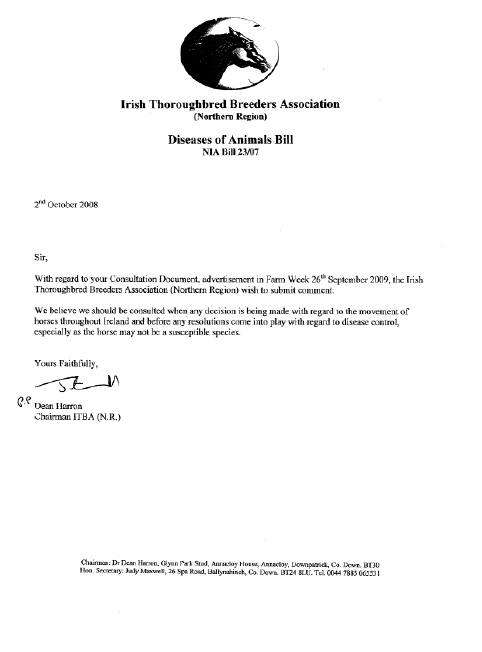
Consultation on DOAB
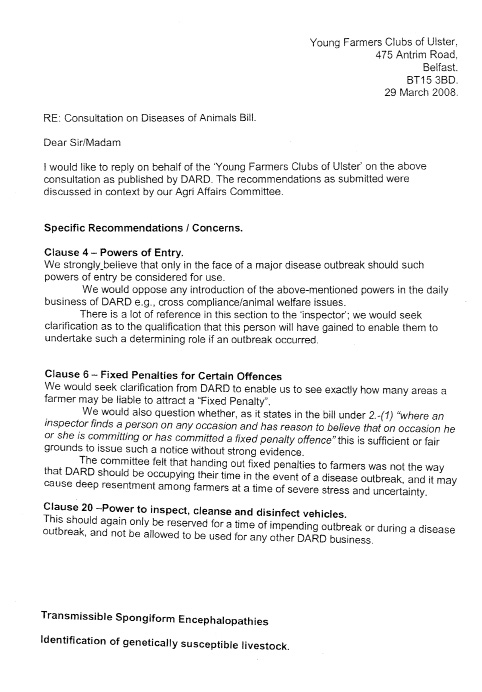
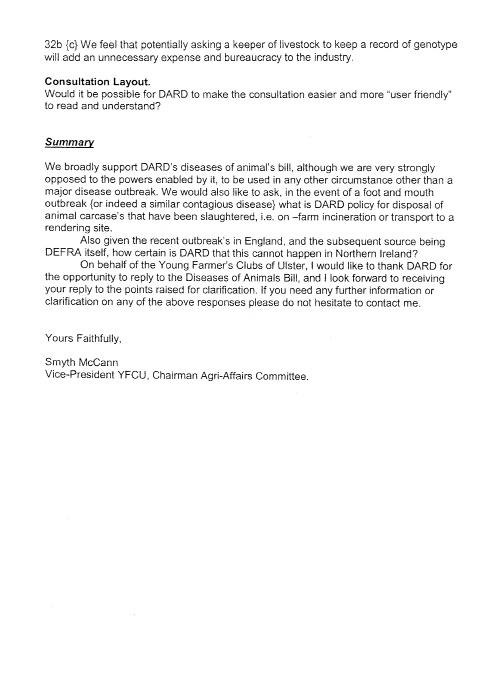
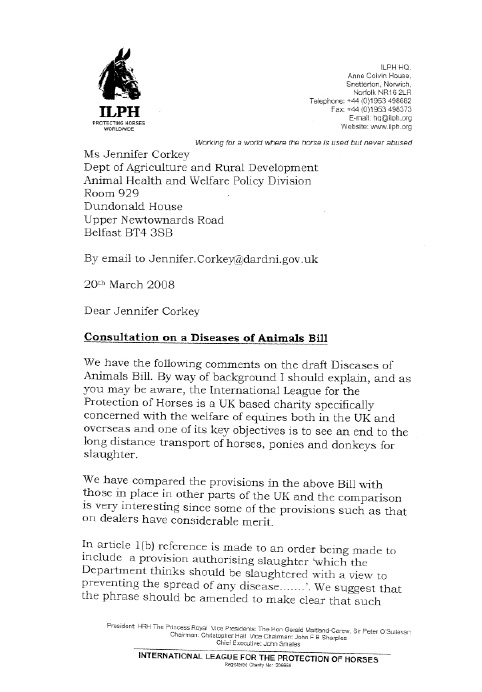
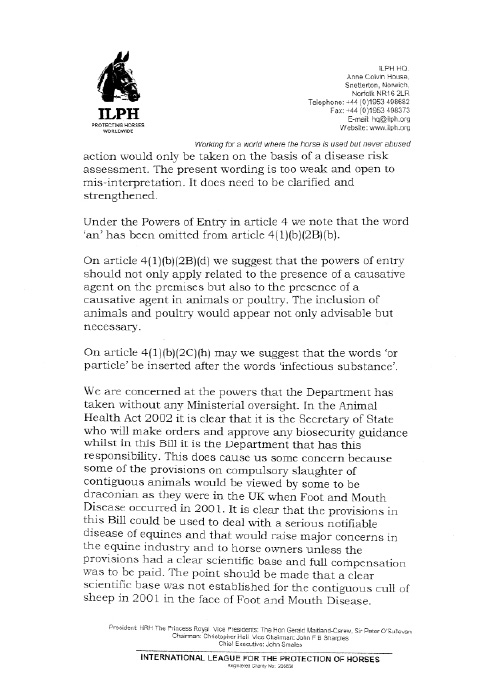
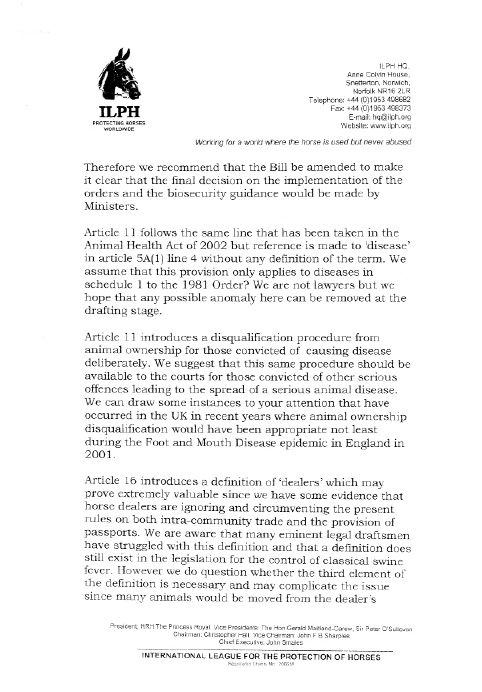
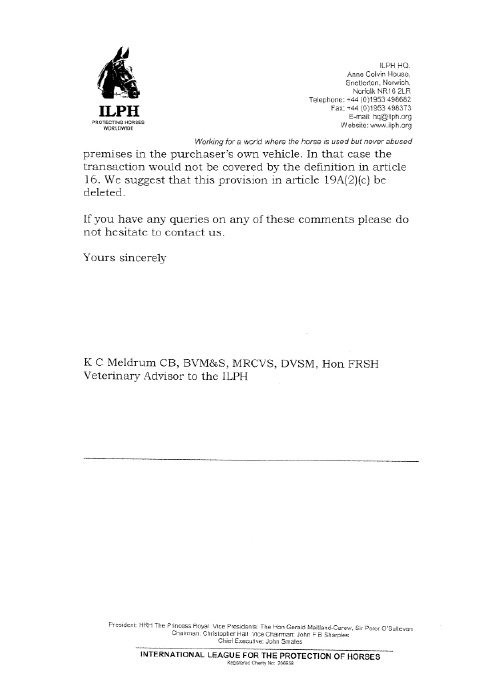
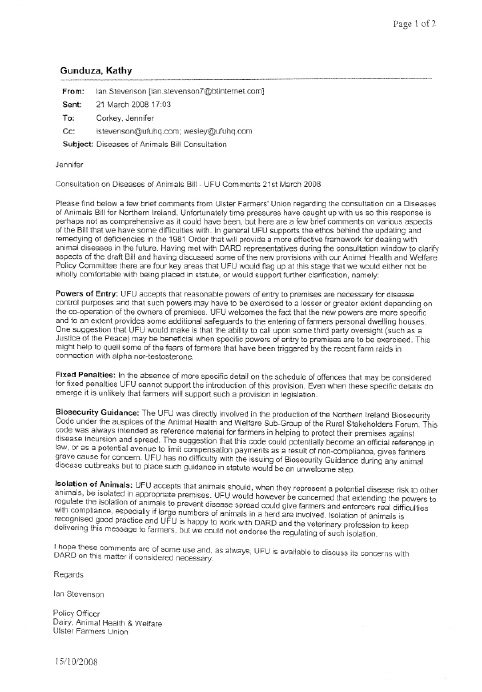

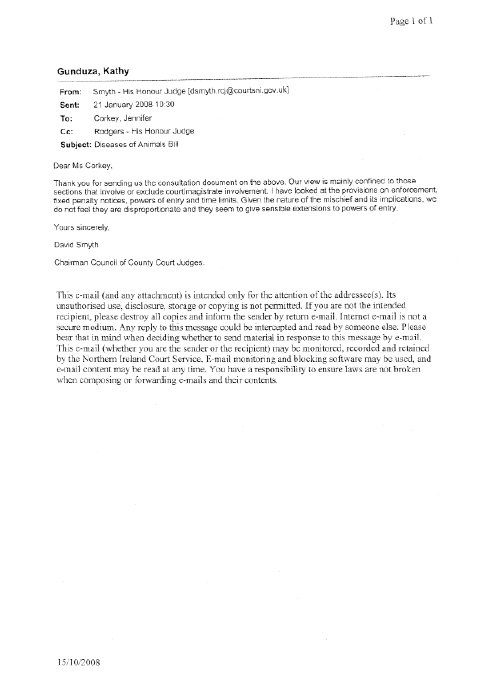
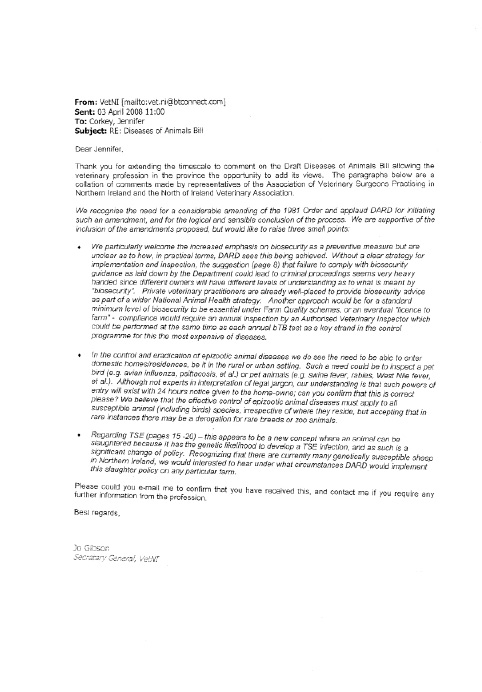
Appendix 4
Other Documentation Relating to the Report
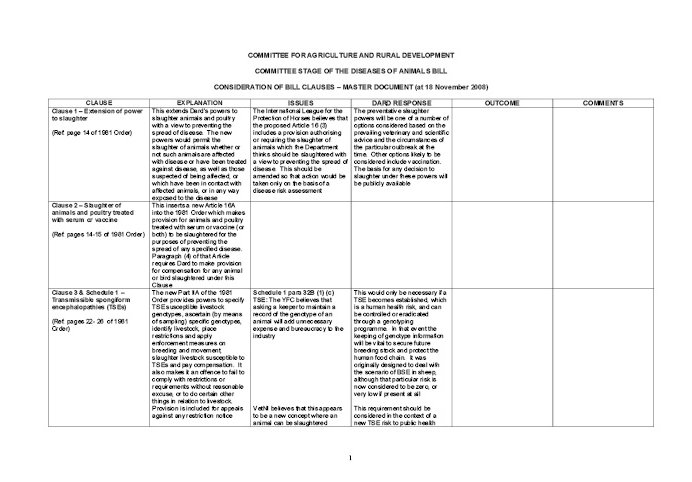
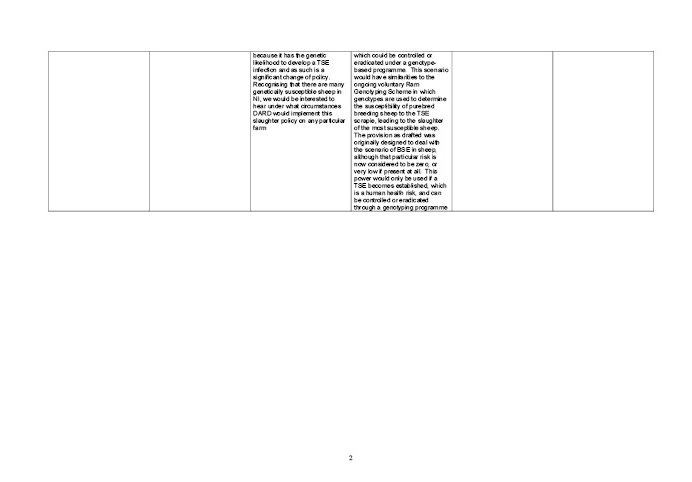
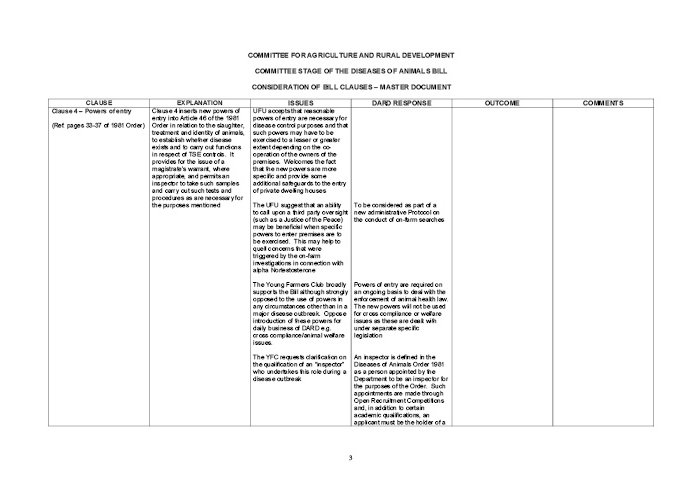
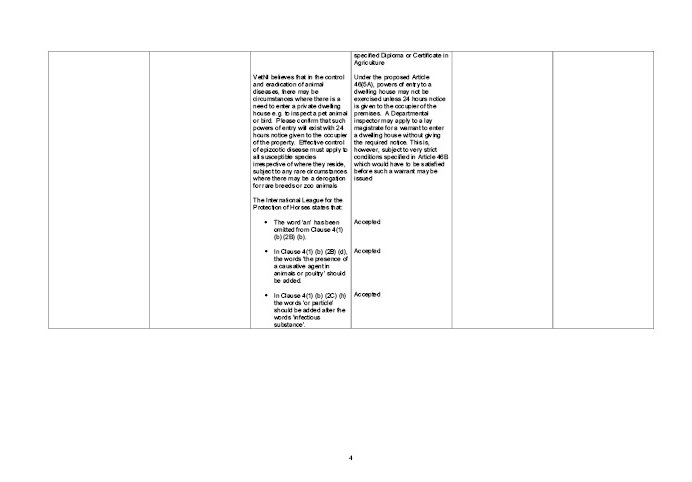
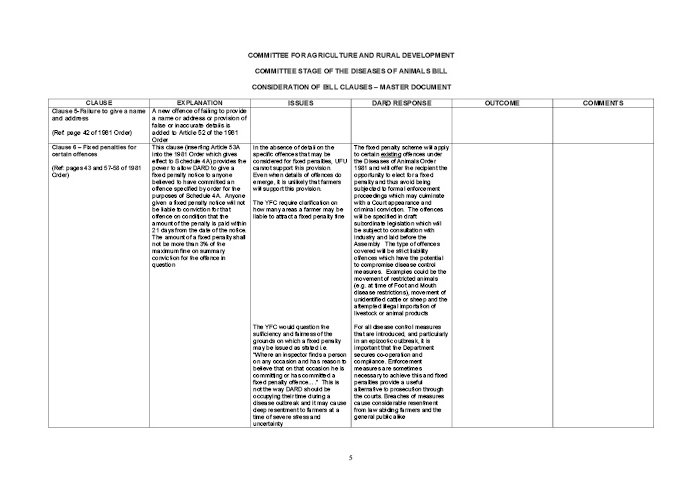
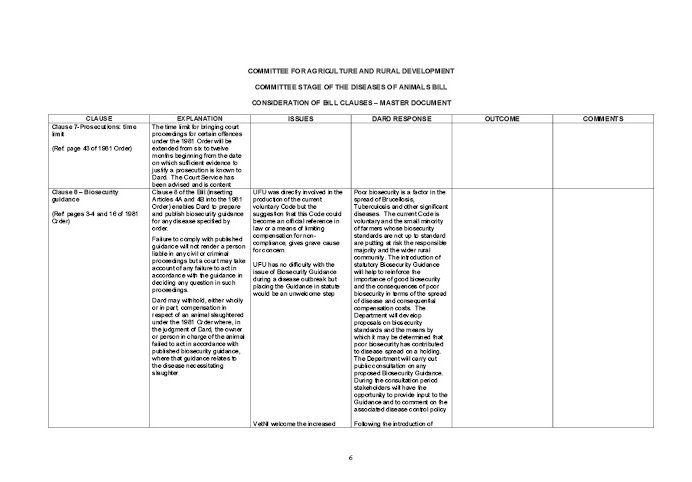
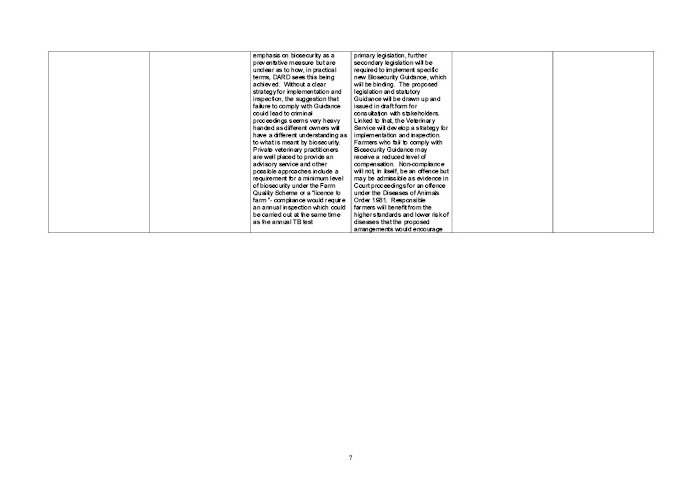

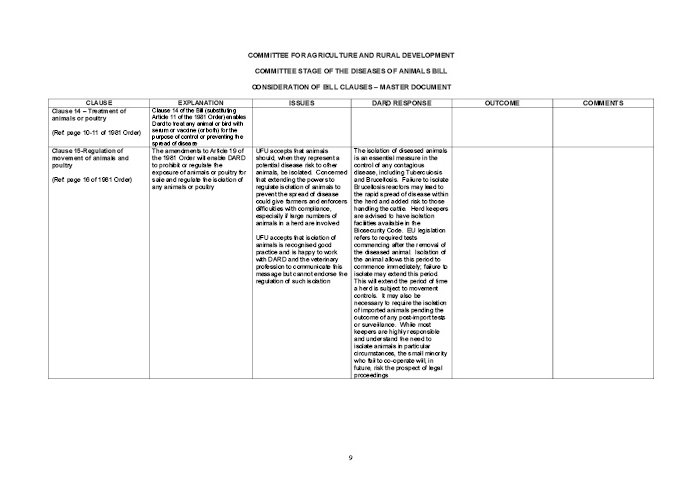
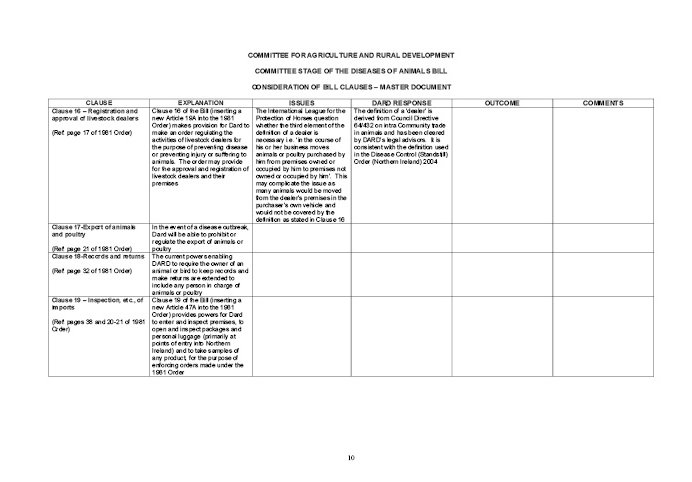
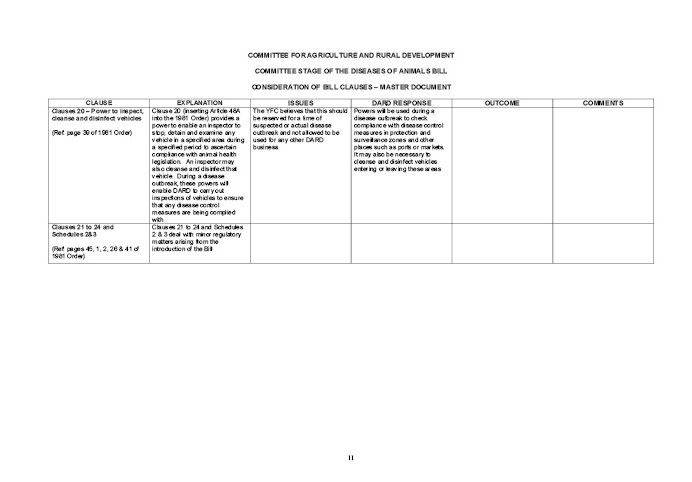
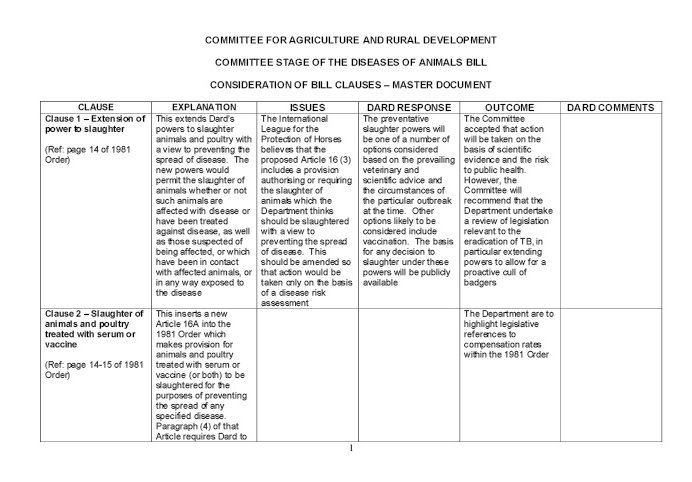
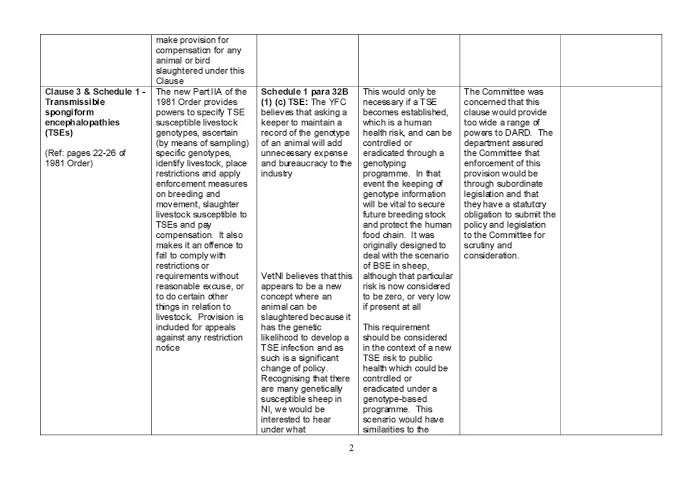
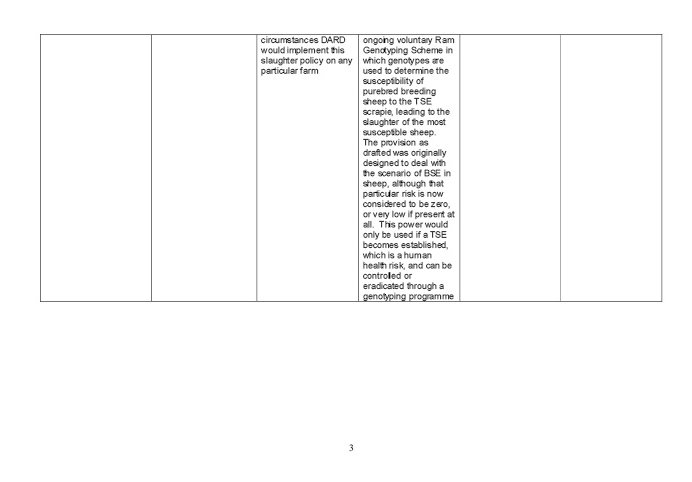
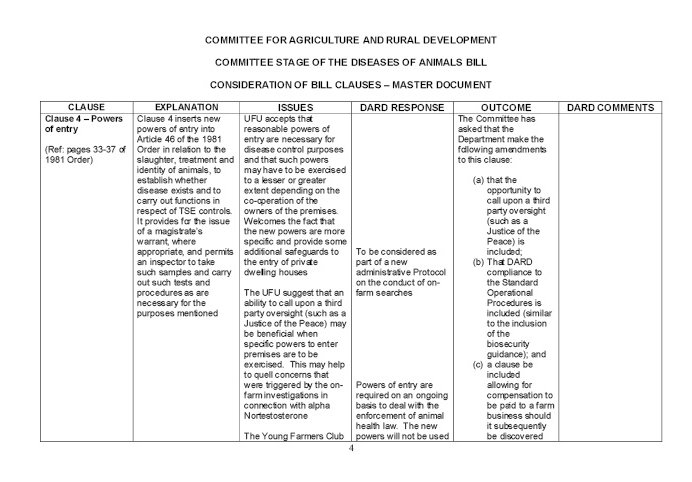
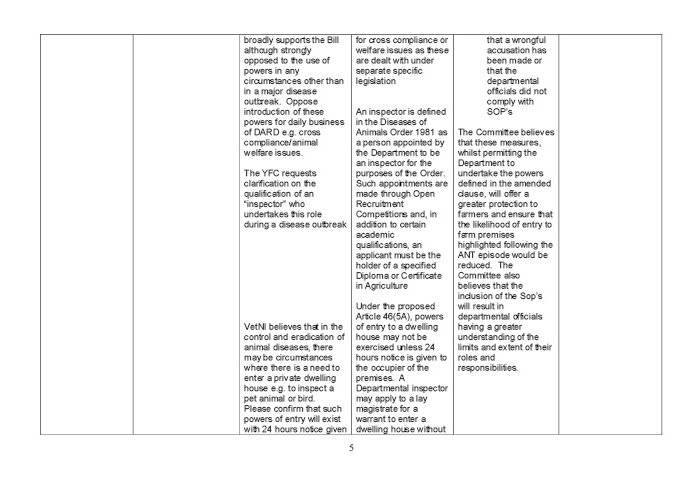
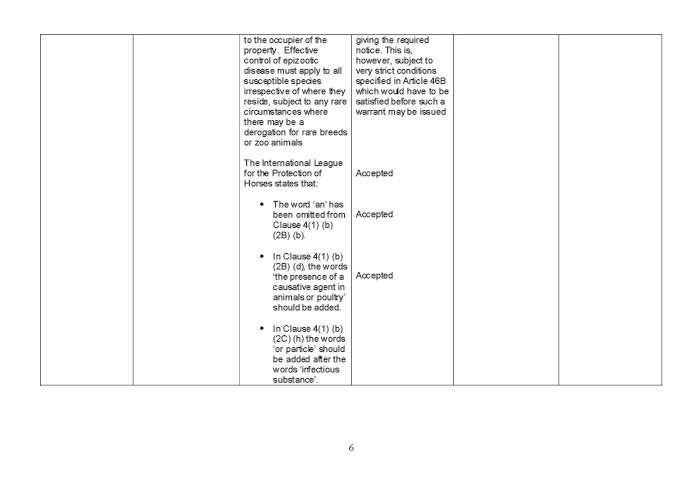
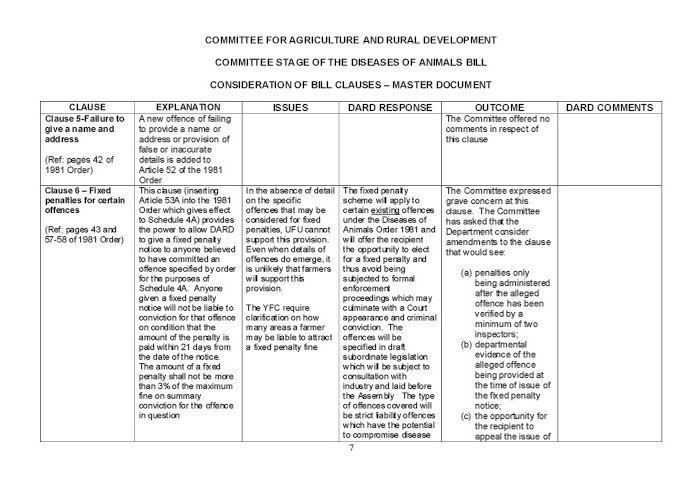
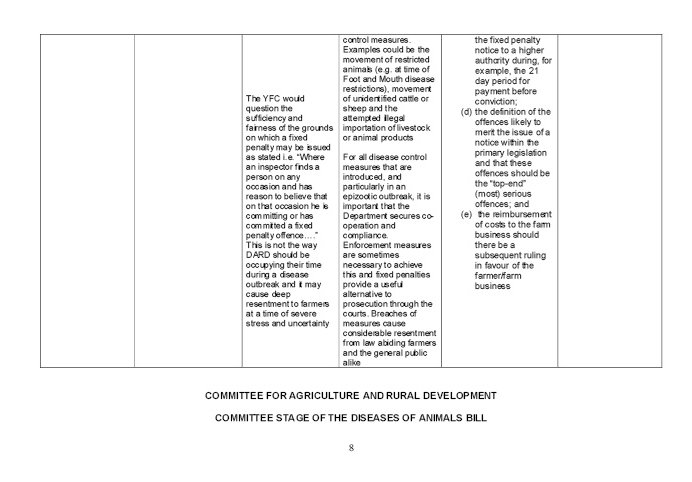
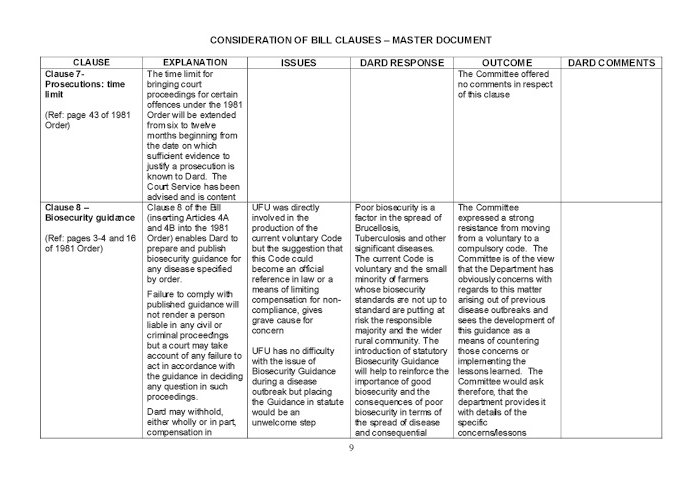
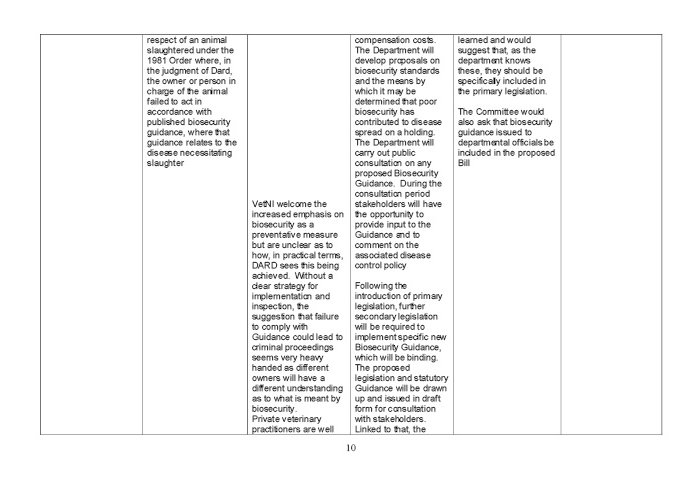
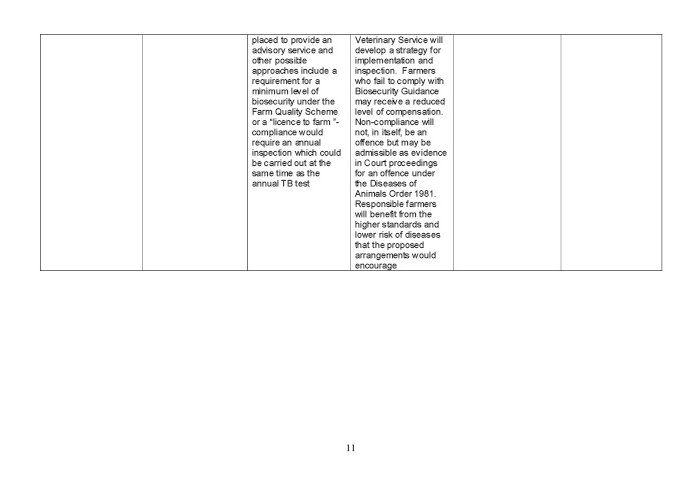
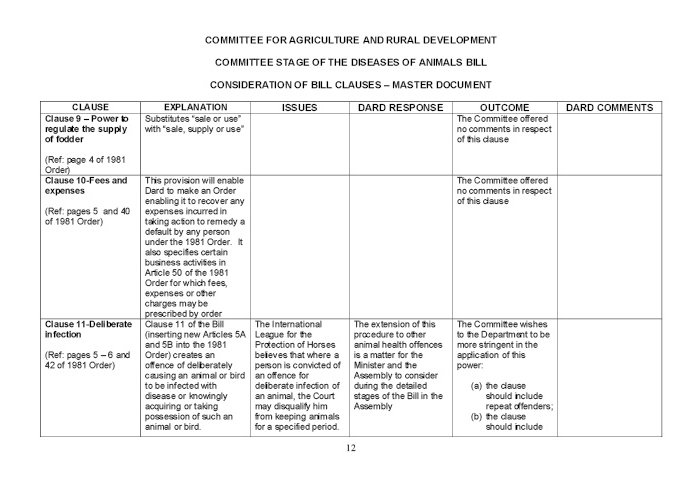
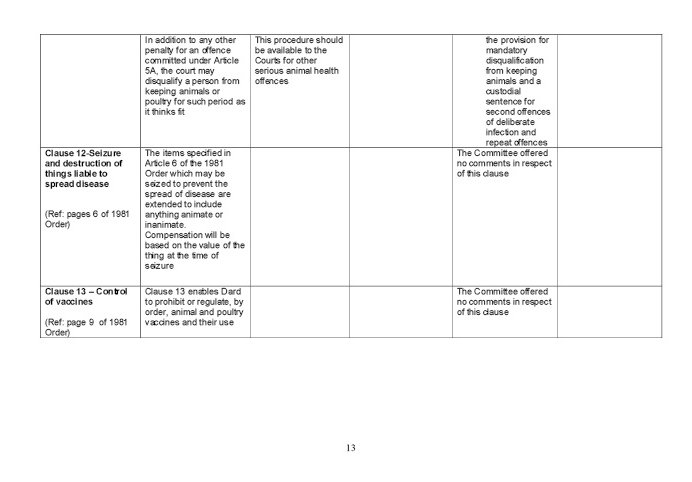
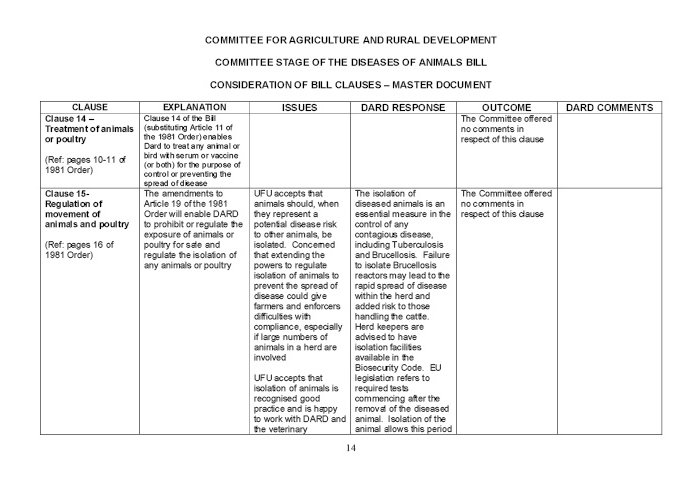
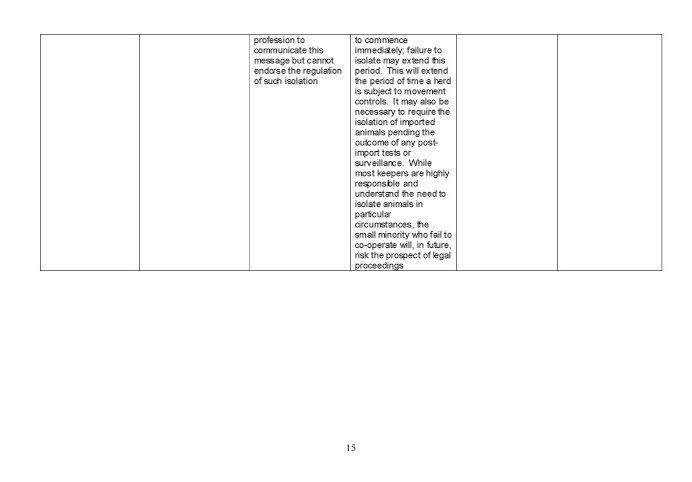
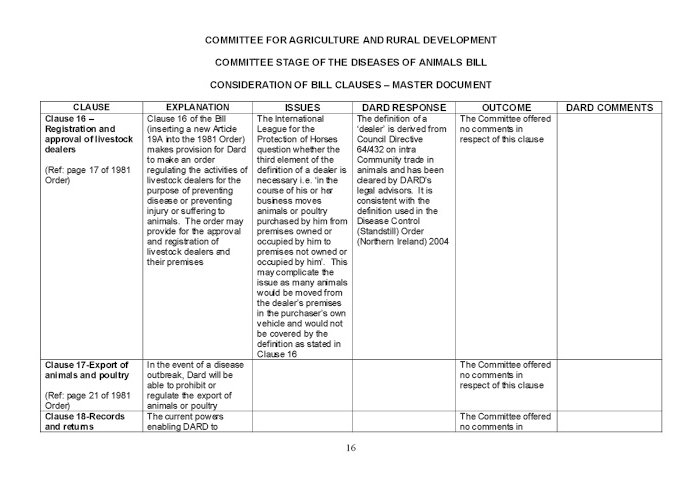
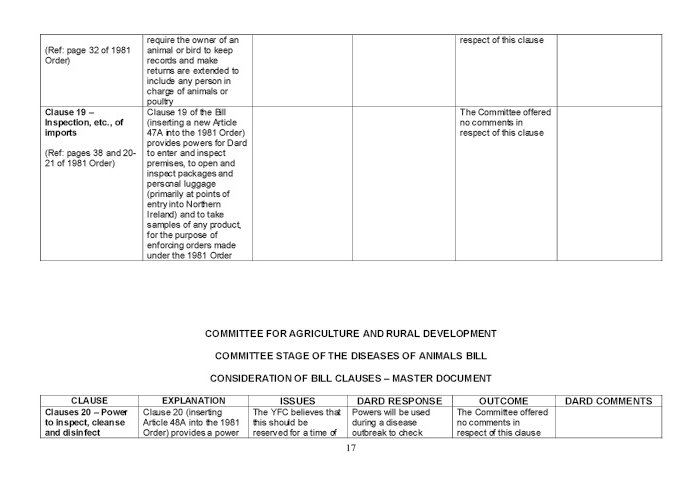
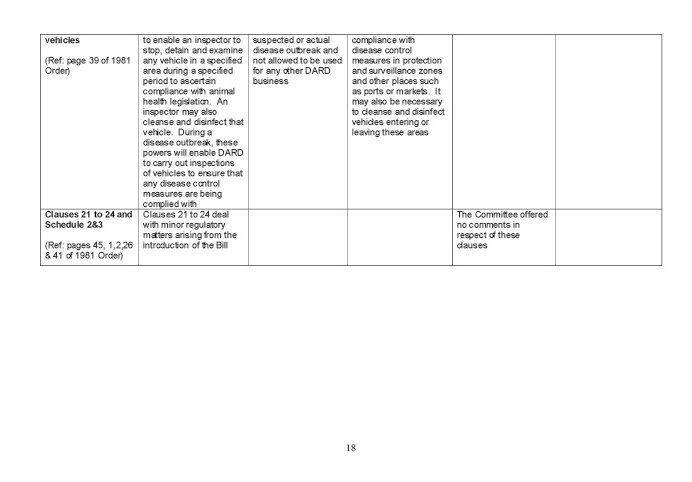
![]()
Corporate Policy Division
Central Management Branch
Dundonald House
Upper Newtownards Road
Belfast BT4 3SB
Tel: 028 90524331
Fax: 028 90524884
Email: joe.cassells@dardni.gov.uk
Your reference
Our reference
Date: 4 December 2008
Paul Carlisle
Clerk to the Committee for Agriculture and Rural Development
Room 284
Parliament Buildings
Belfast
BT4 3XX
Dear Paul
Committee Meeting – 18 November 2008
Your letter of 19 November 2008 refers.
With regard to the Diseases of Animals Bill, the Department has sought advice from the Departmental Solicitor on the issues raised by the Committee. Our comments are attached at Annex A, along with a copy of the Standard Operating Procedure for a Search of Premises under Warrant, attached at Annex B. The Committee may wish to seek its own legal advice on these important matters. Officials will meet the Committee on the 6 January 2009.
You will be aware that a separate letter issued on 25 November 2008 regarding the Department’s position on Total Allowable Catch.
I would be grateful if this could be brought to the Committee’s attention as soon as possible.
If you require any further information please let me know.
Yours sincerely
Joe Cassells
Departmental Assembly Liaison Officer
DOA Annex A
Clause 1 - Extension of Power to Slaughter
The Committee accepted that action will be taken on the basis of scientific evidence and the risk to public health.
However, the Committee will recommend that the Department undertake a review of legislation relevant to the eradication of TB, in particular extending powers to allow for a proactive cull of badgers.
Dard Comments:
There are powers available in the Diseases of Animals Order 1981 under Articles 13, 47 and Schedule 2 Part I paragraph 4 to deal with TB and to destroy wild life including badgers. Additionally, Clauses 1 (Slaughter to prevent the spread of disease) and 14 (Treatment of animals and poultry) of the Bill would also be available to deal with the slaughter of badgers to prevent the spread of disease and the vaccination of badgers for the purpose of controlling or preventing the spread of disease.
Proposals for the way forward in NI on TB, including the issue of badgers, are currently under Ministerial consideration.
Clause 2 - Slaughter of Animals and Poultry
TREATED WITH SERUM OR VACCINE
The Department is to highlight legislative references to compensation rates within the 1981 Order.
Dard Comments:
Compensation rates for animal and poultry diseases are specified in the following legislation.
Bovine Tuberculosis: Article 11 of the Tuberculosis Control Order (NI) 1999.
Brucellosis: Article 16 and Schedule 1 of the Brucellosis Control Order (NI) 2004.
TSE: Schedule 3 and 4 of the Transmissible Spongiform Encephalopathies Regulations (NI) 2006.
All other diseases: Schedule 2, Part II of Diseases of Animals (NI) Order 1981.
The relevant legislative provisions above are attached at Annexes A to D for ease of reference.
Under the new Article 16A (3) [as inserted by Clause 2 of the Bill] the Department is required to make provision in an order for compensation in respect of the slaughter of animals or poultry treated with vaccine or serum. The draft legislation will be subject to consultation with industry and will be brought to the attention of the Committee for consideration and scrutiny.
Clause 3 - Transmissible Spongiform Encephalopathies
The Committee was concerned that this Clause would provide too wide a range of powers to DARD. The Department assured the Committee that enforcement of this provision would be through subordinate legislation and that they have a statutory obligation to submit the policy and legislation to the Committee for scrutiny and consideration.
Dard Comments:
The TSE controls in Clause 3 and Schedule 1 of the Bill are contingency measures which can only be brought into operation by means of subordinate legislation. Similar contingency measures are included in the GB Animal Health Act 1981. This will enable a co-ordinated UK approach in the event that action is required to deal with any TSE. Should such action be necessary, the relevant policy issues and draft subordinate legislation (a draft Statutory Rule) will be submitted to the Committee for scrutiny and consideration. The draft legislative proposals will also be discussed with the industry.
Clause 4 - Powers of Entry
1. The Committee has asked that the Department make the following amendments to this clause:
(a) that the opportunity to call upon a third party oversight (such as a Justice of the Peace) is included;
(b) that DARD compliance to the Standard Operational Procedures is included (similar to the inclusion of the biosecurity guidance); and
(c) a clause be included allowing for compensation to be paid to a farm business should it subsequently be discovered that a wrongful accusation has been made or that the departmental officials did not comply with SOPs.
2. The Committee believes that these measures, whilst permitting the Department to undertake the powers defined in the amended clause, will offer a greater protection to farmers and ensure that the likelihood of entry to farm premises highlighted following the ANT episode would be reduced. The Committee also believes that the inclusion of the SOPs will result in Departmental officials having a greater understanding of the limits and extent of their roles and responsibilities.
Dard Comments:
1(a) Powers of entry may be exercised by DARD staff to carry out routine inspections e.g. annual BR herd test. These are the normal inspection duties which farmers are familiar with. The legal authority for such inspections is contained in Article 46 of the Diseases of Animals Order 1981. Clause 4 (1) of the Bill is a restatement of these powers with modifications to take account of provisions in the Bill on slaughter, identification, vaccination and control of TSEs. In practice, what this means is that inspectors will be authorised to enter premises for the specific purposes specified in the Bill as part of their normal inspection and enforcement duties.
A different and more exceptional situation arises where inspectors may need to undertake a search of premises as part of an investigation into illegal activity under the Diseases of Animals Order 1981. Where entry is required to a dwelling house, 24 hours notice must be given to the occupier unless a warrant has been issued by a lay magistrate under the strict conditions specified in Clause 4(3) of the Bill. It is in these circumstances, where a farm search is to be undertaken, that there is a role for a third party oversight and the Department has incorporated this requirement in the Standard Operating Procedure for a Search of Premises under Warrant (SOP) document. The Committee has been provided with a copy of the SOP and will note the requirement in paragraph 8 for the appointment of a Search Liaison Officer (SLO). The SLO will be a senior DARD officer not connected with the case under investigation or the officials carrying out the search. The Department has noted the Committee’s suggestion that this role could be undertaken by a Justice of the Peace (now know as a “lay magistrate”). The lay magistrate has a clearly defined legal role under Clause 4 of the Bill in relation to the issue of the warrant but this would not extend to supervision of farm searches.
The Department’s aim is to ensure that it can respond quickly to a disease situation while respecting the rights of individuals whose premises are under investigation. The safeguards provided by the legal warrant system and the role of the independent DARD Search Liaison Officer will offer protection to all those involved in such cases. It is also the case that every DARD inspection, whether routine or investigative, is open to scrutiny by the Courts by way of Judicial Review. There is also the option of making a complaint to the Ombudsman.
1(b) The Standard Operating Procedure (SOP) is an administrative document which DARD personnel must comply with when undertaking an investigation into an alleged offence. The procedures apply to all legislation enforced by DARD such as the Diseases of Animals Order, the Welfare of Animals Act and, in the case of ANT, the Food Safety Order. Every enforcement officer has a copy of the SOP and is trained in how to conduct on farm searches. Any failure by staff to comply with the SOP would be an internal disciplinary matter. Nor do the Departmental Solicitors feel it would be advisable to create the precedent of making the SOP a legal document. The Committee has been provided with a copy of the SOP document. The Department will, of course, be happy to discuss this with the Committee. We will also be happy to consider any amendments which the Committee wishes to put forward on the SOP document and, if the Committee felt appropriate, to give regular updates on the work and operational activities of the Central Enforcement Team.
DARD shares the Committee’s view that every individual is protected against any misuse of the law. That is why the Bill is very specific as to the reasons why powers of entry may be exercised. There needs to be evidence to demonstrate that in each case the Department acted in accordance with the law. The Department is also bound by the general principles of administrative law and the requirements of the Human Rights Act both of which are enforceable by the Courts.
1(c) The Department enforces a wide range of legislation in an impartial manner and free of any consideration as to whether compensation may be payable in the event that evidence is not found to uphold a conviction. Our lawyers have advised against the inclusion of a provision on compensation. In the event of a complaint about the unlawful use of powers or unacceptable conduct of staff a remedy is available through the Courts under Judicial Review and the Human Rights Act. If the complaint is upheld, the Judge will decide if compensation should be awarded, and the amount. Our Lawyers have advised that it would not be appropriate for the Department to usurp the role of the Court and that of the Criminal Justice system by making provision in the Bill for compensation in such circumstances.
Clause 6 - Fixed Penalties for Certain Offences
The Committee expressed grave concern at this clause. The Committee has asked that the Department consider amendments to the clause that would see:
(a) penalties only being administered after the alleged offence has been verified by a minimum of two inspectors;
(b) departmental evidence of the alleged offence being provided at the time of issue of the fixed penalty notice;
(c) the opportunity for the recipient to appeal the issue of the fixed penalty notice to a higher authority during, for example, the 21 day period for payment before conviction;
(d) the definition of the offences likely to merit the issue of a notice within the primary legislation and that these offences should be the “top-end” (most) serious offences; and
(e) the reimbursement of costs to the farm business should there be a subsequent ruling in favour of the farmer/farm business.
Dard Comments:
(a) We have given careful consideration to the proposal that a fixed penalty offence should be verified by a minimum of two inspectors. We have looked at other fixed penalty regimes operating in NI e.g. the Litter (NI) Order 1994 and the Street Trading Act (NI) 2001. We have, however, been unable to identify any scheme which operates on the basis of two officers having to verify the notice. It is the Department’s view that responsibility for the issue of a fixed penalty notice should rest strictly with one officer who will be fully accountable, rather than a combination of two officers.
The purpose of the Fixed Penalty Scheme is to allow a person who accepts that he is guilty of an offence to avoid going to Court. The Scheme provides that if an officer believes a person has committed a fixed penalty offence, he may issue a fixed penalty notice. The notice will give full details of the circumstances alleged to constitute the offence and the person will have 21 days to pay the penalty or have the case referred for Court proceedings. Insisting on a second officer being present is impractical in disease control situations.
(b) This is covered under Clause 6, Schedule 4A paragraph 2(5) which provides that the form of the fixed penalty notice shall be specified in subordinate legislation. A draft Statutory Rule would be brought before the Committee for scrutiny. The industry would be consulted on any legislative proposals (see paragraph 6(d) below). The notice must give particulars of the circumstances alleged to constitute the offence.
(c) Our Lawyers have advised that an appeals system is not a feature of penalty notice regimes, nor would it be advisable to make such provision. The Scheme provides for a fixed penalty to be paid thus avoiding Court proceedings. Every notice will have to be justified in terms of the law and will include full details of the offence. Acceptance of the notice is optional, and if not accepted, the case will proceed to Court where the evidence will be considered and a decision will be made by the Magistrate. An interim appeal system would have to operate to the standard of a Judicial Hearing and would be both bureaucratic and costly to administer. It would also be contrary to the objectives of the Fixed Penalty Scheme which provides a quick and efficient way to deal with clearcut offences where no excuse or reasonable defence can be made.
(d) Clause 6 Schedule 4A paragraph 1 provides that the fixed penalty offences shall be specified in subordinate legislation. These will be certain existing offences under the Diseases of Animal Order 1981. The Scheme is not creating new animal health offences. The Department will wish to consult with stakeholders and the Committee about the particular offences which may attract a fixed penalty. The fact that the offences will be specified in subordinate legislation will enable the Department to carry out full consultation procedures before designating a fixed penalty offence. It will also enable changes to be made to the legislation in response to emerging disease situations.
(e) If an individual pays a fixed penalty there is no Court procedure and consequently no costs. If the individual opts for a prosecution and is found not guilty, the question of costs is a matter for the Courts to determine. In his summing up and judgment, the Magistrate will decide if costs should be awarded, and the amount. Our Lawyers have advised that it would not be appropriate for the Department to usurp the role of the Court and that of the Criminal Justice system by making provision in the Bill for costs in such circumstances.
Clause 8 - Biosecurity Guidance
1. The Committee expressed a strong resistance from moving from a voluntary to a compulsory code. The Committee is of the view that the Department has obviously concerns with regards to this matter arising out of previous disease outbreaks and sees the development of this guidance as a means of countering those concerns or implementing the lessons learned. The Committee would ask therefore, that the department provides it with details of the specific concerns/lessons learned and would suggest that, as the department knows these, they should be specifically included in the primary legislation.
2. The Committee would also ask that biosecurity guidance issued to Departmental officials be included in the proposed Bill.
Dard Comments:
Biosecurity is an important and integral part of the panoply of measures to prevent, control and - where possible - eradicate disease. With globalisation and increased movement of animals, people and goods, biosecurity is becoming ever more important.
Biosecurity on the farm is a vital tool in achieving the safest possible balance between the need to allow the movement of animals against the risk of contracting and/or spreading disease. It is, however, recognised that farmers can never totally isolate their farms from external contact, particularly from wind borne, vector or wildlife disease spread. But they can take various measures to ensure disease does not enter their holdings either through human contact, new animal consignments, food and water supply, etc. Farm biosecurity measures may also vary greatly between holdings and farm business types. Intensive farming systems may be able to achieve higher levels of defence against disease due to the isolation techniques used but, against this, there is consumer encouragement towards free-range systems.
It is, therefore, recognised that any effective means of biosecurity needs to reflect the variety in the range, type and scale of farming systems, the dynamic of risk, etc. There is also a need to be proportionate in terms of activity and costs with measures adopted that are appropriate to normal and heightened risk being identified, as well as those to take during any disease outbreak.
Development of meaningful and targeted biosecurity guidance requires considerable investment of time and resources by DARD and stakeholders. Voluntary biosecurity guidance has been provided in the “Biosecurity Code for Northern Ireland Farms”, which was published by DARD in May 2004 following constructive engagement with and endorsement by industry stakeholders. However, investment by DARD and the industry to maximise biosecurity may be invalidated by non-compliance by a minority of farmers. Even the most simple actions or omissions could lead to a major disease outbreak. This would be most true of Epizootic diseases, but Brucellosis could also be spread through poor biosecurity. Some actual examples of poor biosecurity that have led to spread of Brucellosis infection are as follows:
- Inadequate fencing allowing animals to stray;
- Sharing of bulls with other herd owners;
- Sharing of housing with other herd owners;
- Taking land/housing in high incidence Brucellosis areas;
- Moving stock without a pre-movement test;
- Not isolating cows at calving;
- Non-reporting of abortions;
- Allowing personnel or equipment or vehicles that are linked to breakdowns to contact stock;
- Allowing vermin access to aborted foetuses;
- Failure to isolate high risk animals;
- Failure to cleanse and disinfect infected areas.
The impact of such lapses in biosecurity may be immediate and dramatic and contribute to the spread of Brucellosis, and also TB, over the long term. Where attention is focussed, e.g. in an Epizootic disease outbreak, it may be less likely to happen but here the impact can be immediate. While the list above illustrates some examples that have occurred in relation to Brucellosis, it is illustrative and representative, but not exhaustive.
It is for these reasons that DARD proposed Clause 8 of the Bill enabling the preparation and publication of biosecurity guidance for any disease specified for that purpose in a subordinate order; guidance which any failure to comply with may be taken into account by a court and which may permit DARD to withhold all or part of statutory compensation relating to slaughter for disease control purposes. It should be noted that non-compliance with the guidance would not in itself be an offence, but would be admissible as evidence in connection with an offence under the Diseases of Animals Order 1981. Such action would be envisaged in relation to the most blatant cases of biosecurity negligence, or where repeated poor biosecurity occurs, or where lapses in biosecurity have far-reaching consequences.
The Department is not yet in a position to provide a definitive list of the diseases it is minded to produce guidance on, or what the content of that guidance is likely to be. That is why it would be referred to a DARD/Industry Working Group for consideration. However, it would be inconceivable that diseases known to present real risks to our industry should they come here – e.g. Foot and Mouth Disease or Avian Influenza – or diseases that are already present with significant economic consequences – e.g. Brucellosis and bovine Tuberculosis – were not to be covered by such guidance.
As indicated, DARD would propose the establishment of a DARD/Industry Working Group(s) to develop the targeted biosecurity guidance, which should apply to specific diseases. DARD will take advice from the industry on the format the guidance will take and how best to balance the generic and disease-specific aspects thereof. The guidance would need to reflect that which is appropriate in different disease risk situations, be concise and be user-friendly. Disease specific guidance would be promoted during particular risk situations: as an example DARD would issue a Press Release to draw bird-keepers’ attention to the appropriate guidance during heightened Avian Influenza risk situations.
Any proposals in relation to the publication of such guidance would be drafted in liaison with key industry stakeholders and would be issued in draft form to the industry for their consideration and comment. A 12 week consultation exercise would normally be envisaged when new guidance is being introduced, except where a disease outbreak situation required immediate issue or revision of guidance.
Part 3 of the current Biosecurity Code is “Advice for official visitors to farm properties”. This deals with such visits from the farmers’ perspective and the standards they should expect from visiting DARD officials, including at enforcement visits. This could be reconsidered and, as necessary, expanded by the DARD/Industry Working Group(s) and included in the guidance prepared under the proposed legislation. The Committee for Agriculture and Rural Development would, as is established practice, have the opportunity to comment on any proposals before, and as part of, any consultation exercise.
Clause 8, therefore, seeks the provision of permissive powers. The proposals for subordinate legislation to specify the disease(s) to which biosecurity guidance will apply and the preparation of the guidance will be the subject of detailed discussion with the industry, consultation, and scrutiny by the Committee for Agriculture and Rural Development, prior to introduction.
Edwin Poots, MLA sought clarification on how we would make the distinction between every day good practice, heightened measures, and emergency measures. While not wishing to prejudge the consideration of this important area by the DARD/Industry Working Group or the consultation suggestions, there are current examples which may serve to illustrate this differential application. For instance, in relation to Avian Influenza there are different levels of biosecurity, depending on the level of risk, to minimise contact between wild birds and poultry. In heightened risk situations, preventive measures may need to be taken to a higher level in response to heightened risk. Everyday steps are about maintaining the biosecurity arrangements accepted as industry good practice to prevent contact between the flock and wild birds, prevent contamination of feedingstuffs and water, etc. In heightened risk situations it may require the feeding of free range birds indoors, etc. Also in a disease outbreak situation it may require all birds at risk to be housed.
The biosecurity advice for each level of risk could be drawn up in advance. Subject to the veterinary risk assessment, heightened measures may be required for a specific time period in line with the risk. This would be publicised in a heightened risk situation by Press Release and would be stepped down again in line with the revised veterinary risk assessment, again by Press Release. All of these procedural arrangements would be agreed with stakeholders. That said, it will be recognised that we need appropriate flexibility to update advice quickly in evolving disease situations as new information emerges and technology advances, so it would not be appropriate to put the specifics into primary legislation.
Another area where statutory guidance would be useful is to inform the voluntary action the industry can take in a disease crisis situation. For example, birdkeepers voluntarily agreed not to hold shows/sales before we had the legal basis to ban shows/sales when Avian Influenza first emerged as a threat. Also, industry stakeholders have reiterated the advice not to import animals from Bluetongue regions. For Brucellosis, as we move towards eradication we may agree with stakeholders the need to introduce heightened biosecurity measures in any hotspot areas based on the veterinary assessment, but which may not be necessary to apply across the whole countryside.
Clause 11 - Deliberate Infection
The Committee wishes the Department to be more stringent in the application of this power:
(a) the clause should include repeat offenders;
(b) the clause should include the provision for mandatory disqualification from keeping animals and a custodial sentence for second offences of deliberate infection and repeat offences.
Dard Comments:
Clause 11(1) of the Bill provides that it is an offence to deliberately infect an animal with disease. Under Clause 11(2), which inserts Article 52(7) into the Diseases of Animals Order 1981, a person found guilty of such an offence is liable to imprisonment and/or a fine. In addition, under the new Article 5B the Court may, by order, disqualify the person from keeping or dealing in animals for a specified period. The Department is grateful for the Committee’s comments and proposes to seek an amendment to Article 5B so that in the case of a second or subsequent offence, it will be mandatory for the Court, by order, to disqualify the person from keeping or dealing in animals for a specified period.
Annex A
Extract from Tuberculosis Control Order (Ni) 1999
“Valuation and compensation
11— (1) Where the Department slaughters or causes an animal to be slaughtered under Article 10(1), the compensation payable by the Department for the animal shall be the market value of the animal.
(2) For the purposes of this Order the market value of an animal means the price which might reasonably have been obtained for it, at the time of valuation in accordance with this Article or Article 11A, from a purchaser in the market if it had been free from disease.
(3) Upon service of a notice in respect of an animal under Article 10(2), the Department shall (unless the notice has previously been revoked) make an initial assessment of the market value of the animal for the purposes of paragraph (1) and shall notify the owner of that assessment.
(4) Subject to the following paragraphs and Article 11A, the market value of an animal which the Department proposes to cause to be slaughtered shall, for the purposes of compensation under paragraph (1), be determined before slaughter by agreement, between the Department and the owner of the animal, if the agreement is reached within 3 working days of the Department informing the owner of its initial assessment of the market value under paragraph (3).
(5) If the Department and the owner of an animal fail to agree the market value of the animal in accordance with paragraph (4), the Department shall submit a list of independent valuers, approved by it for the purposes of this Article, to the owner and, within 2 working days of receiving this list, the owner shall—
(a) nominate a valuer (hereinafter referred to as the “nominated valuer”) from the list; and
(b) notify the Department of the name and address of the nominated valuer.
(6) Within 8 working days of the owner of the animal notifying the Department of the name and address of the nominated valuer in accordance with paragraph (5)—
(a) the owner shall arrange for the nominated valuer to determine the market value of the animal and shall be liable for any costs, fees or other expenses incurred by the valuer in carrying out the valuation; and
(b) the nominated valuer shall carry out the valuation and shall give to the Department and the owner a certificate in writing of his determination of the market value of the animal.
(7) Where the owner of an animal or the nominated valuer fails to comply with, in the case of the owner, paragraphs (5) or (6) (a) or, in the case of the nominated valuer, paragraph (6) (b), the Department shall determine the market value of the animal.
(8) The calculation of the market value of an animal under this Article or Article 11A shall not take account of any sum to which the owner might have become entitled in respect of the animal under any other statutory or any Community provision.
(9) The amount of compensation payable to the owner of the animal under this Article shall be without prejudice to any entitlement of that person to any payments in respect of the animal under any other statutory or any Community provision.
(10) Notwithstanding any other provisions of this Article, the Department may cause an animal, in respect of which a notice under Article 10(2) is in force, to be slaughtered prior to the determination of its market value under this Article or Article 11A—
(a) where such slaughter is necessary to prevent the spread of disease;
(b) to establish if there has been interference with any sample taken or test carried out under this Order or the Scheme, as the case may be, whereby the result of the test is intended to be affected; or
(c) where in the judgement of the Department the keeper has been guilty of an offence tending to prejudice the due control of the disease.
(11) Notwithstanding any other provisions of this Article the market value of an animal to which paragraph (10) applies shall be determined by the Department.”
Annex B
Extract from Brucellosis Control Order (NI) 2004
“Valuation and compensation
16. - (1) Where the Department causes an animal to be slaughtered in accordance with Article 15 the compensation payable by the Department shall be -
(a) in the case of a reactor an amount equal to 75% of either –
(i) the animal’s market value, or
(ii) a figure calculated in accordance with the provisions of Schedule 1, whichever is the less;
(b) in every other case, an amount equal to its market value.
(2) For the purposes of this Order the market value of an animal means the price which might reasonably have been obtained for it, at the time of valuation in accordance with this Article or Article 17, from a purchaser in the market if it had been free from disease.
(3) Upon service of a notice in respect of an animal under Article 15(2), the Department shall (unless the notice has previously been revoked) make an initial assessment of the market value of the animal for the purposes of paragraph (1) and shall notify the owner of that assessment.
(4) Subject to the following paragraphs and Article 17, the market value of an animal which the Department proposes to cause to be slaughtered shall, for the purposes of compensation under paragraph (1), be determined before slaughter by agreement, between the Department and the owner of the animal, if the agreement is reached within 3 working days of the Department informing the owner of its initial assessment of the market value under paragraph (3).
(5) If the Department and the owner of an animal fail to agree the market value of the animal in accordance with paragraph (4), the Department shall submit a list of independent valuers, approved by it for the purposes of this Article, to the owner and, within 2 working days of receiving this list, the owner shall -
(a) nominate a valuer (hereinafter referred to as the “nominated valuer”) from the list; and
(b) notify the Department of the name and address of the nominated valuer.
(6) Within 8 working days of the owner of the animal notifying the Department of the name and address of the nominated valuer in accordance with paragraph (5) -
(a) the owner shall arrange for the nominated valuer to determine the market value of the animal and shall be liable for any costs, fees or other expenses incurred by the valuer in carrying out the valuation; and
(b) the nominated valuer shall carry out the valuation and shall give to the Department and the owner a certificate in writing of his determination of the market value of the animal.
(7) Where the owner of an animal or the nominated valuer fails to comply with, in the case of the owner, paragraphs (5) or (6)(a) or, in the case of the nominated valuer, paragraph (6)(b), the Department shall determine the market value of the animal.
(8) The calculation of the market value of an animal under this Article or Article 17 shall not take account of any sum to which the owner might have become entitled in respect of the animal under any other statutory or any Community provision.
(9) The amount of compensation payable to the owner of the animal under this Article shall be without prejudice to any entitlement of that person to any payments in respect of the animal under any other statutory or any Community provision.
(10) Notwithstanding any other provisions of this Article the Department may cause an animal, in respect of which a notice under Article 15(2) is in force, to be slaughtered prior to the determination of its market value under this Article or Article 17 -
(a) where such slaughter is necessary to prevent the spread of disease;
(b) to establish if there has been interference with any sample taken or test carried out under this Order or Scheme whereby the result of the test is intended to be affected; or
(c) where in the judgement of the Department the keeper has been guilty of an offence tending to prejudice the due control of the disease.
(11) Notwithstanding any other provisions of this Article the market value of an animal to which paragraph (10) applies shall be determined by the Department
Schedule 1
Compensation for Reactors
1. For the purpose of this Schedule -
“animals” means commercial grade cows and in-calf heifers both of which are intended for use for the production of milk;
“average price” means a price calculated by the Department in accordance with paragraph 4;
“4 week period” means a period of 4 weeks ending on a Saturday which is 7 days or more before the last day of the month in which that Saturday falls;
“month” means the month in which a notice in respect of an animal was issued in accordance with Article 15(2);
“return” means a document furnished to the Department by a person operating a market for the sale of animals which shows for a week ending on a Saturday the number of animals sold at that market and the total sale price for such animals in that week at that market.
2. A return shall be furnished to the Department within 7 days from the end of the week to which that return relates, by any person operating a market in animals at any of the following places, that is to say –
Ballymena
Ballymoney
Markethill
Omagh
Saintfield.
3. The Department shall, in accordance with paragraph 4, calculate an average price from the information contained in the returns forwarded to it in accordance with paragraph 2, as it considers relevant.
4. - (1) Subject to sub-paragraph (2), the average price shall be such amount as may be obtained by dividing the total amount of the prices shown in returns, furnished under paragraph 2, for a 4 week period as having been paid for animals by the total number of the animals stated in those returns to have been sold.
(2) Before the Department proceeds to make a calculation of an average price it shall have obtained returns for sales of not less than 100 animals during a 4 week period.
(3) Where in any 4 week period the requirements of sub-paragraph (2) are not met, the average price for that 4 week period shall be the same amount as the most recent average price calculated in accordance with sub-paragraphs (1) and (2).
5. In any month the figure for a non-pedigree reactor shall be 125% of the average price for the most recently preceding 4 week period rounded down to the nearest multiple of £4.
6. In any month the figure for a pedigree reactor shall be the figure for a non-pedigree reactor plus £300.
7. The Department shall take such steps as it considers appropriate for the purpose of bringing to the notice of persons concerned the figures for non-pedigree reactors and pedigree reactors referred to in paragraphs 5 and 6 respectively.”.
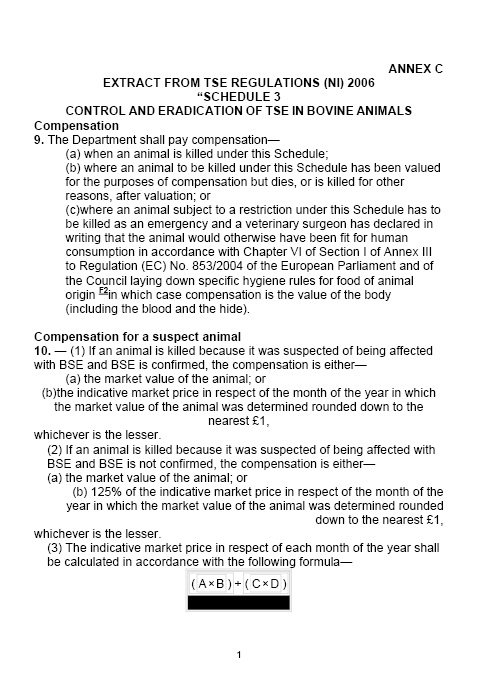
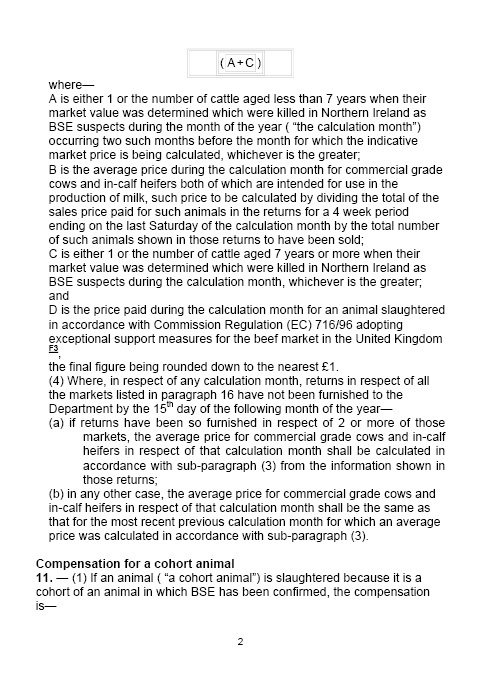
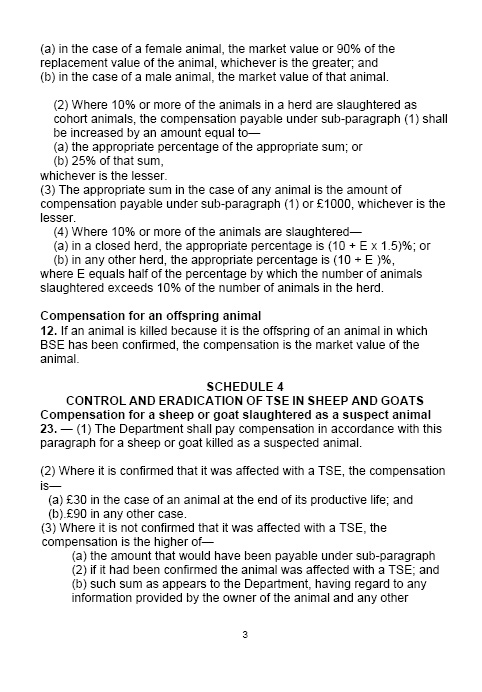
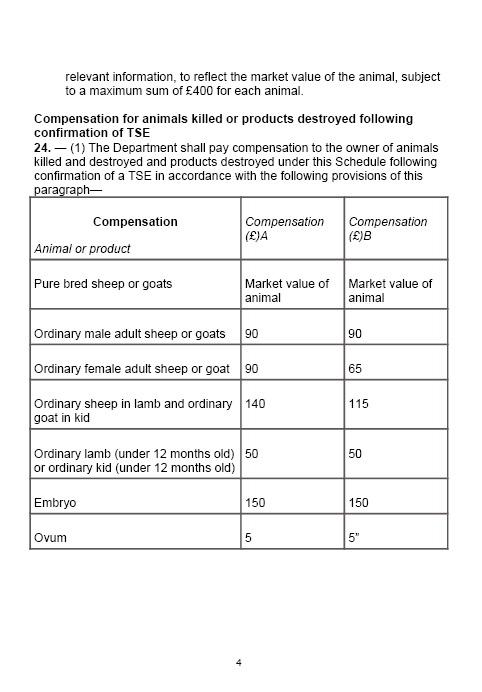
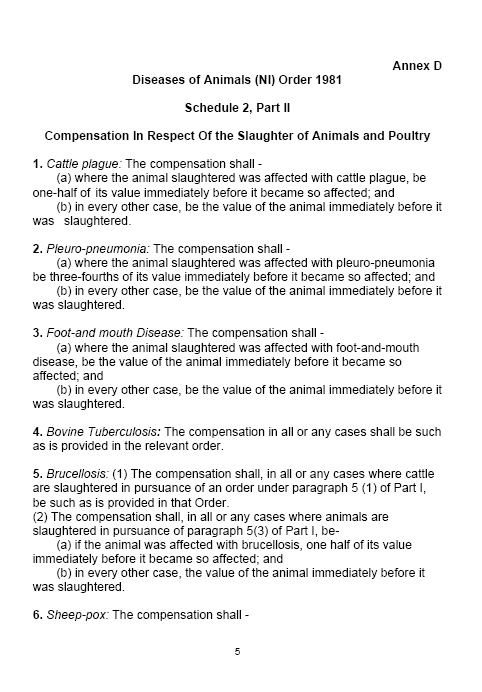
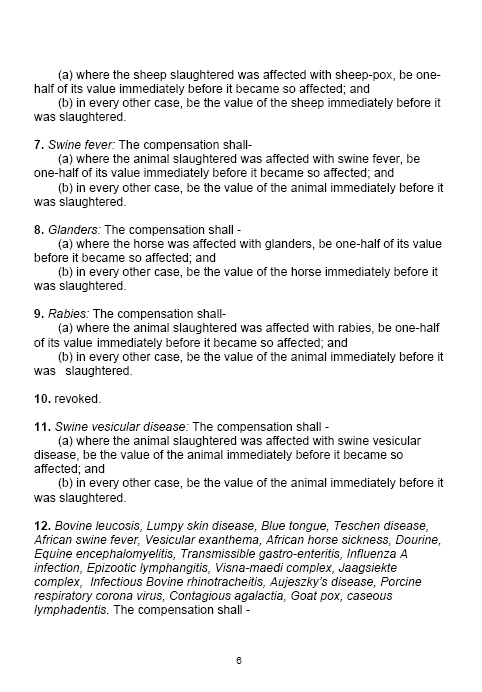
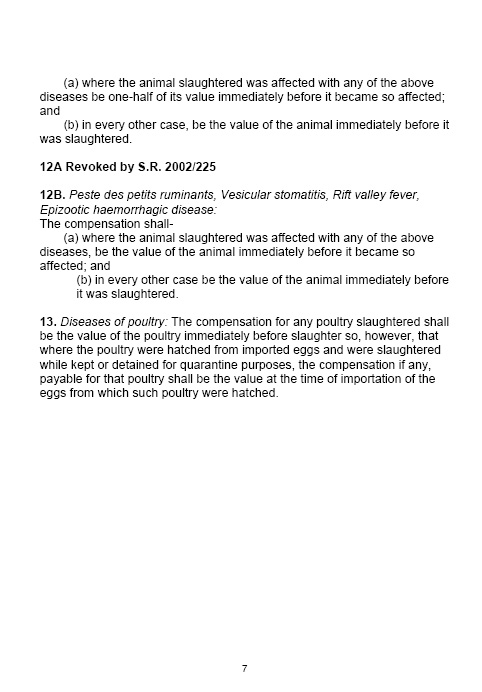
Standard Operating Procedure Annex B
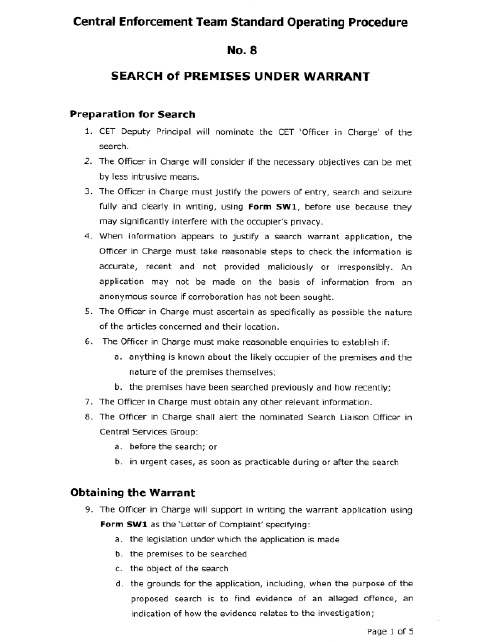
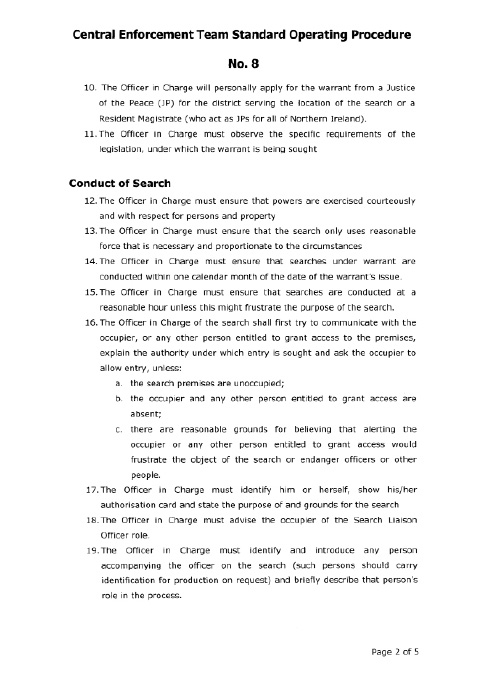
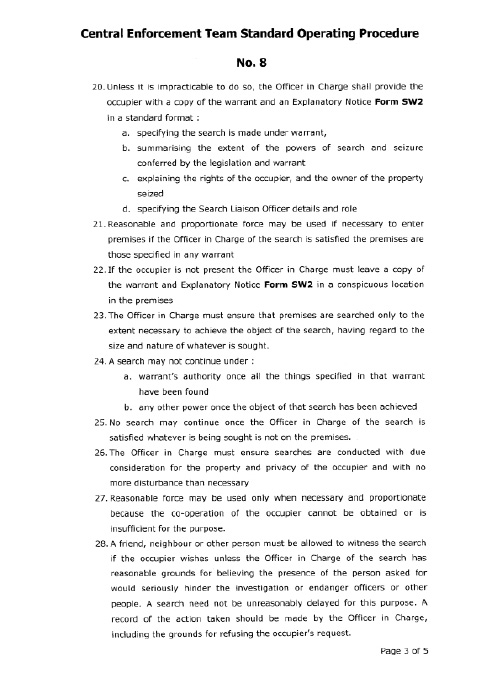
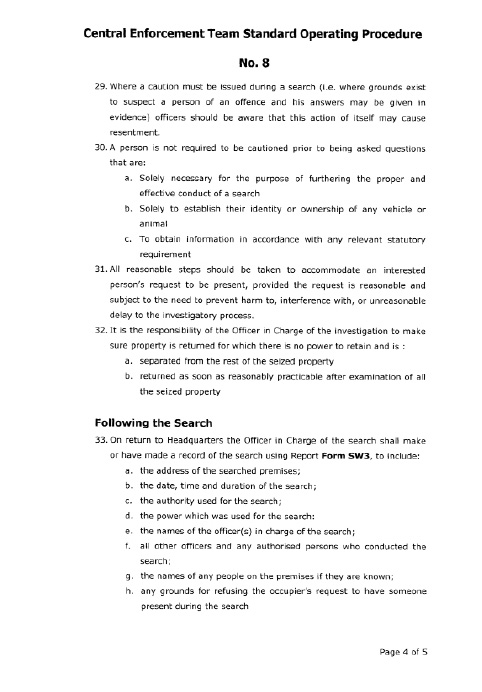
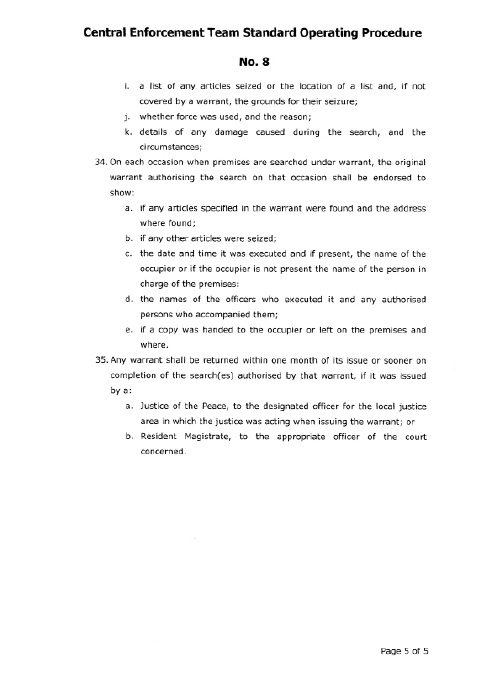
DOA Clause
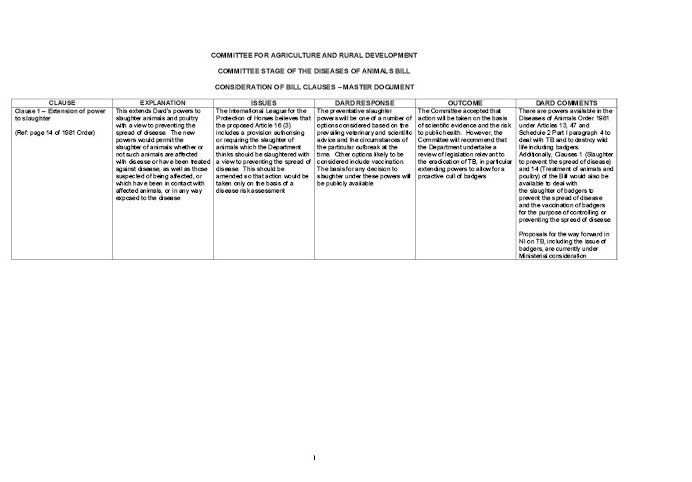
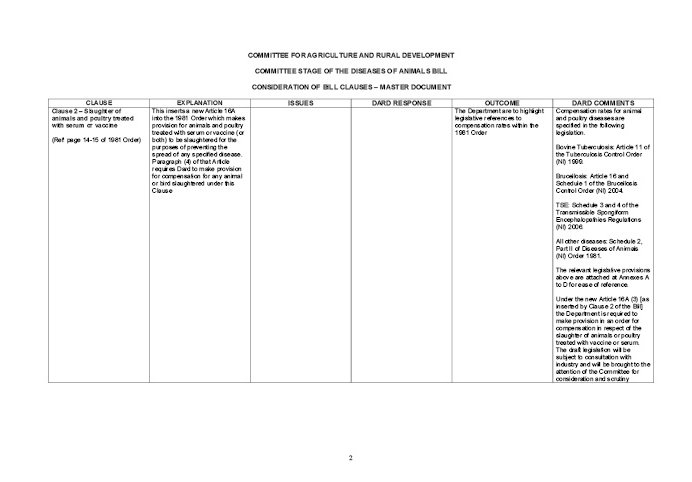
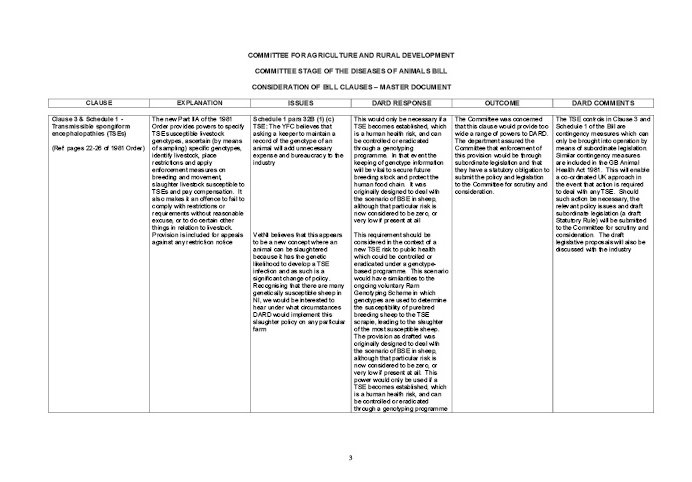
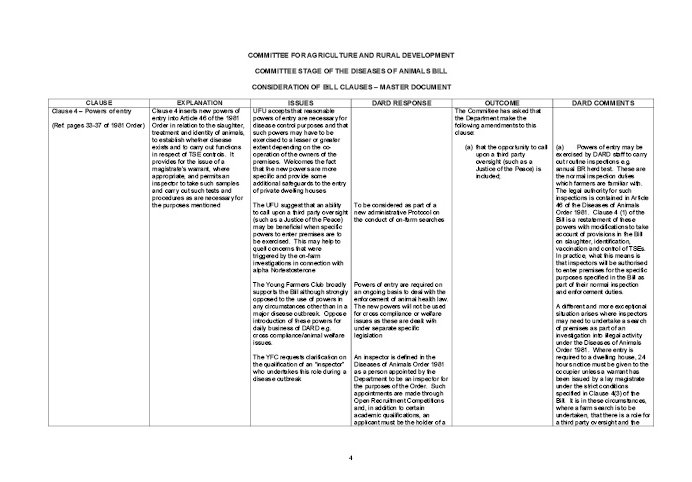
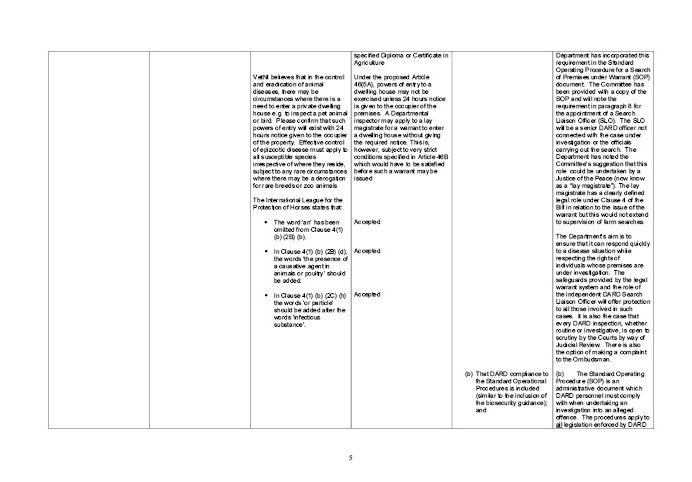
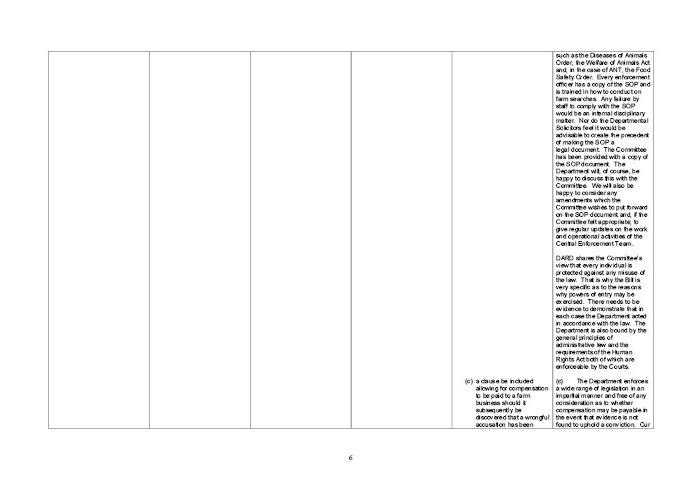
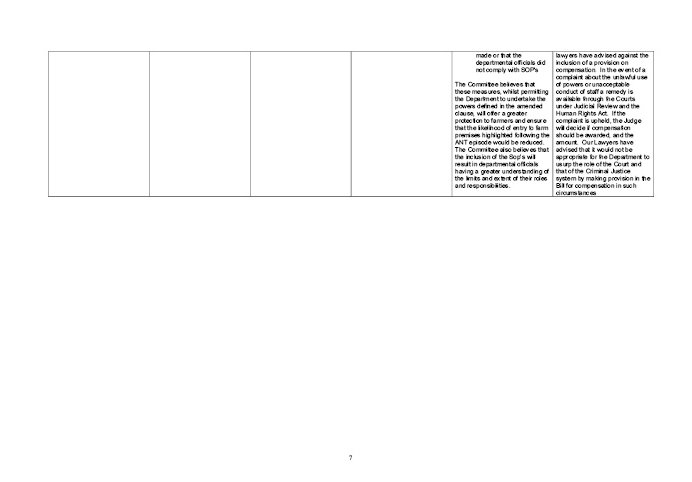
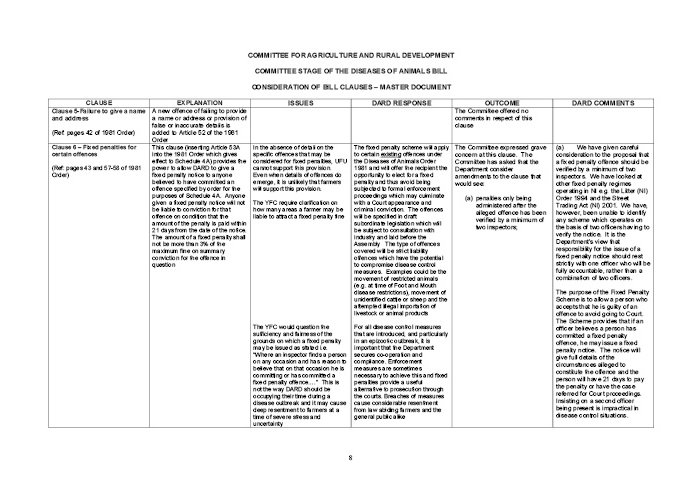
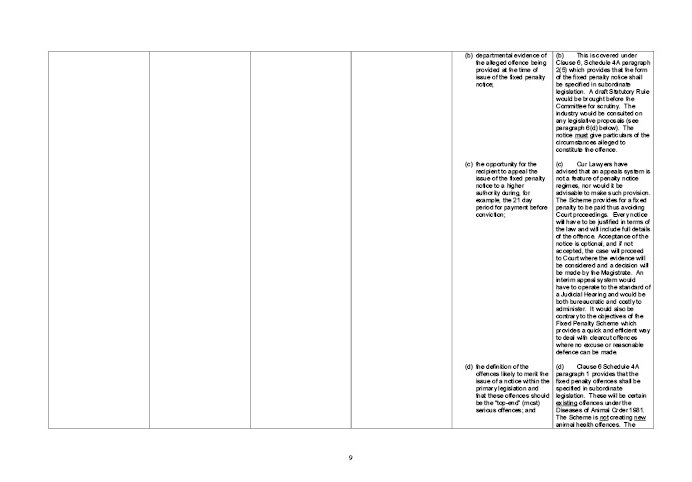
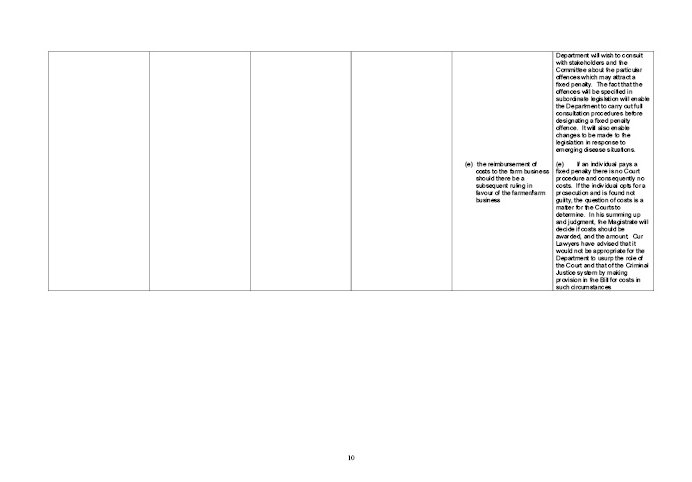
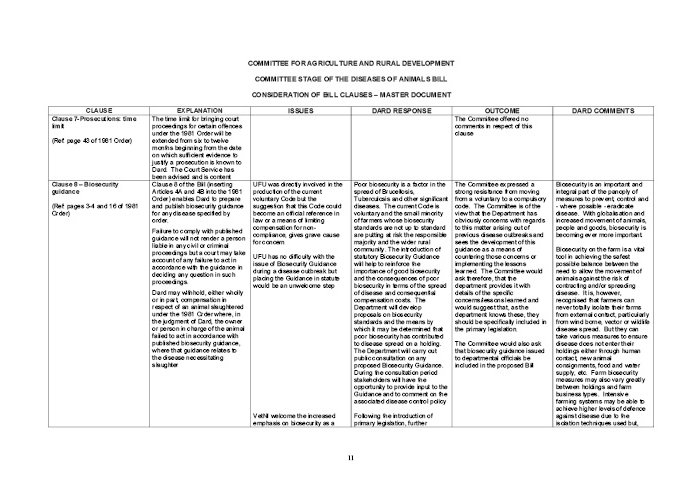
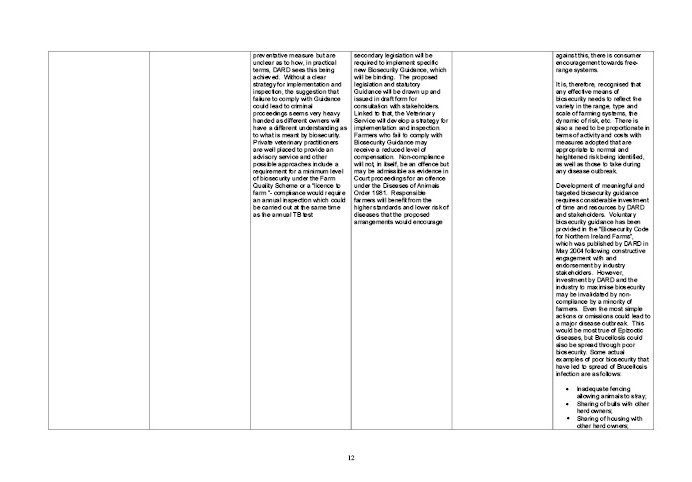
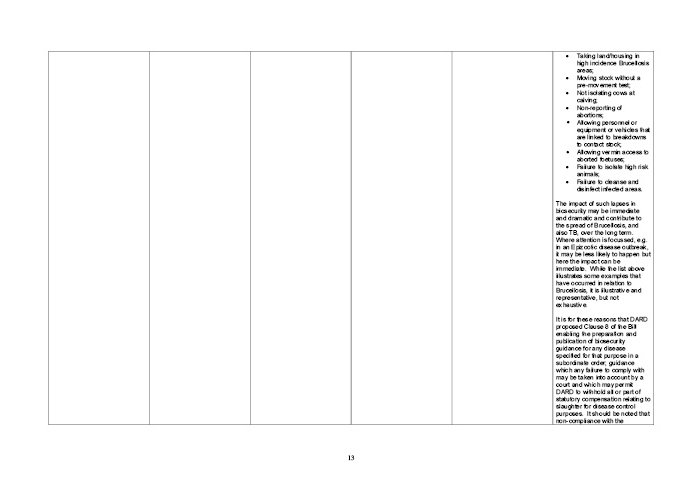
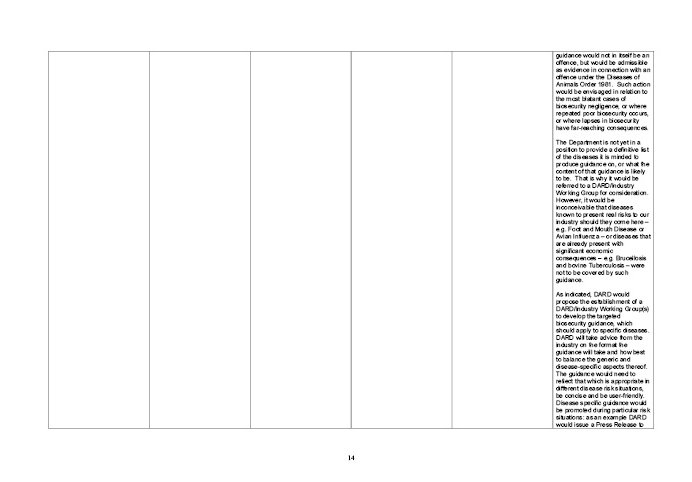
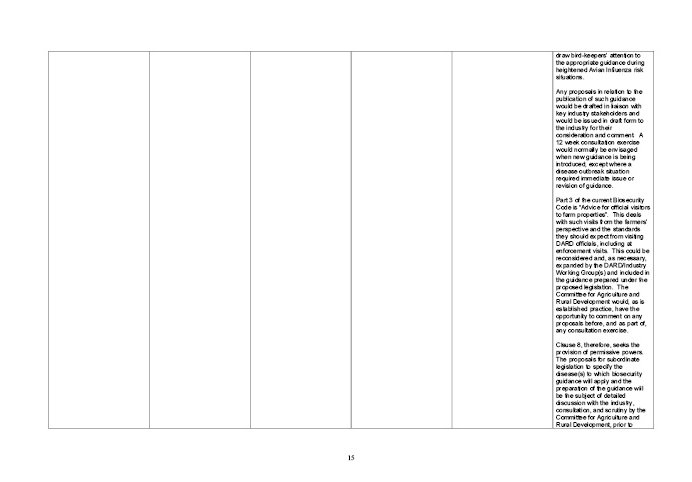
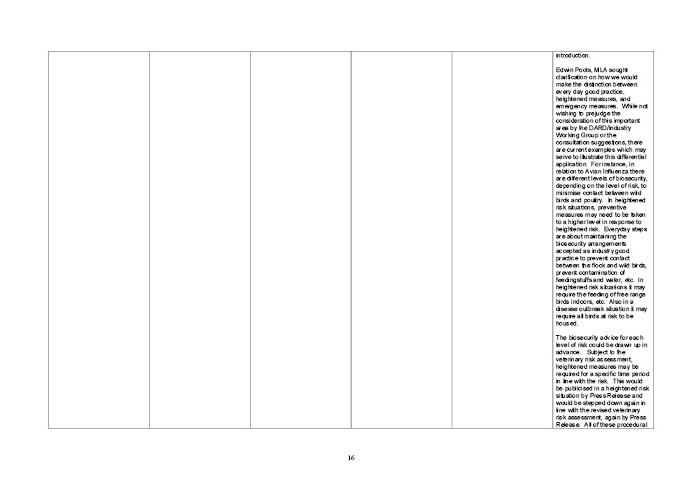

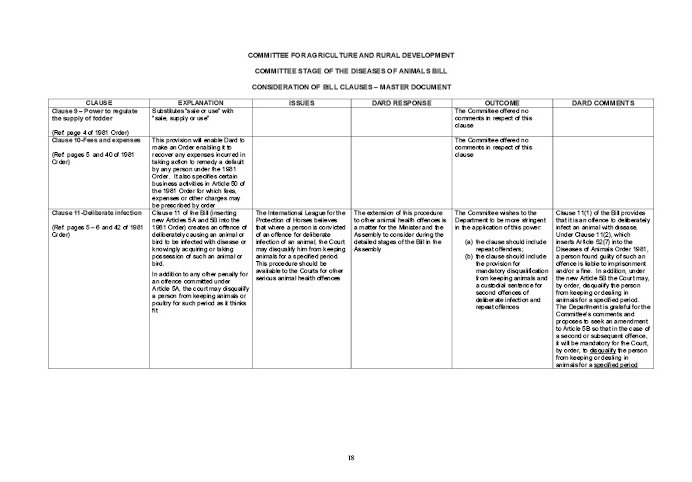
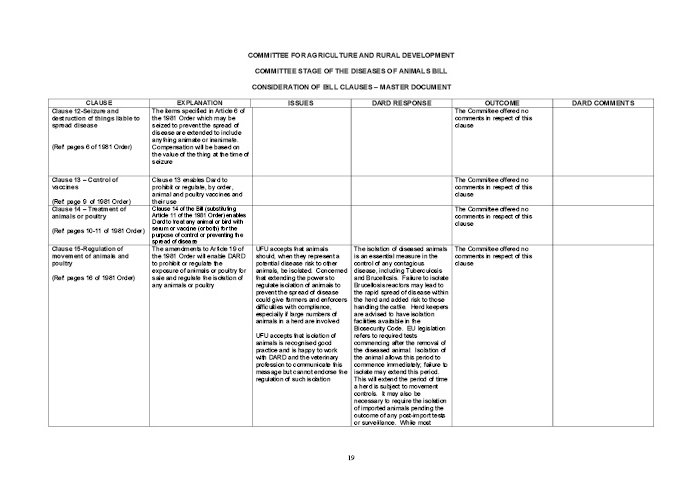
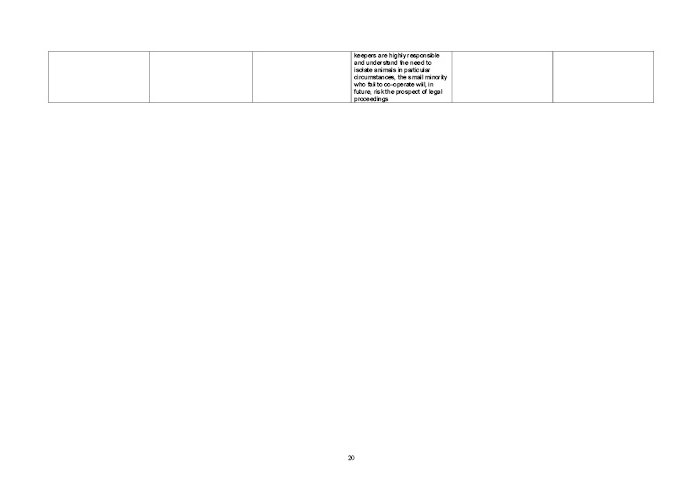
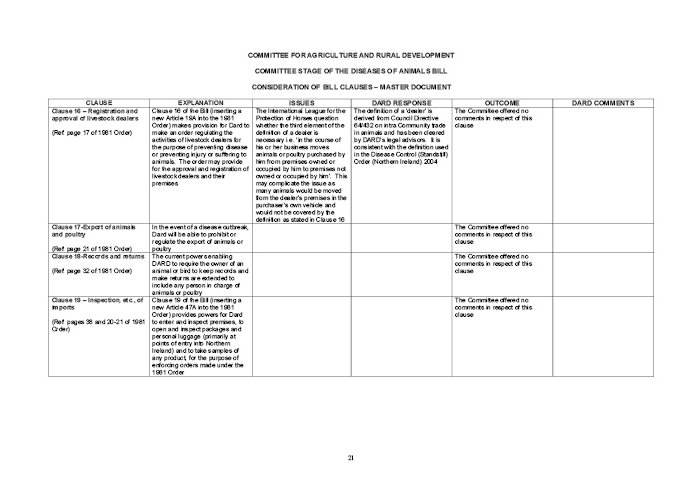


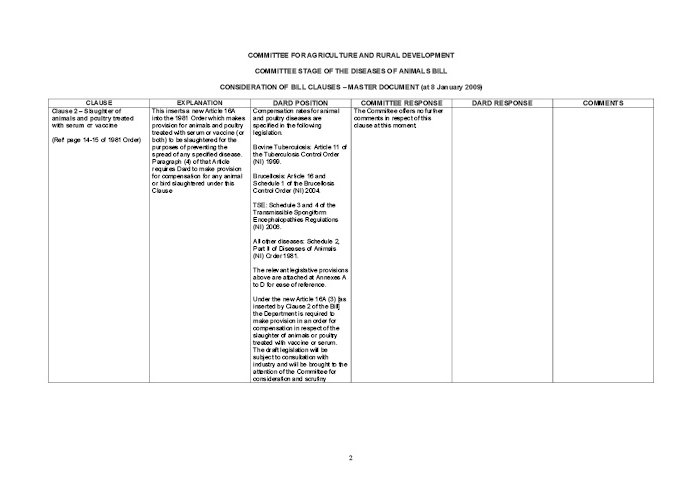
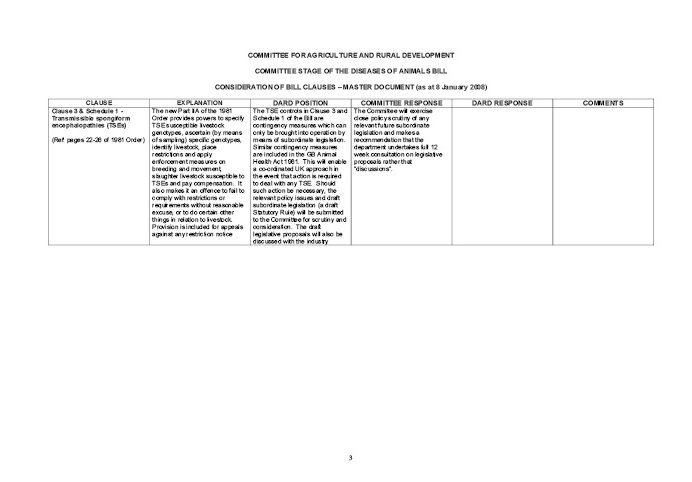
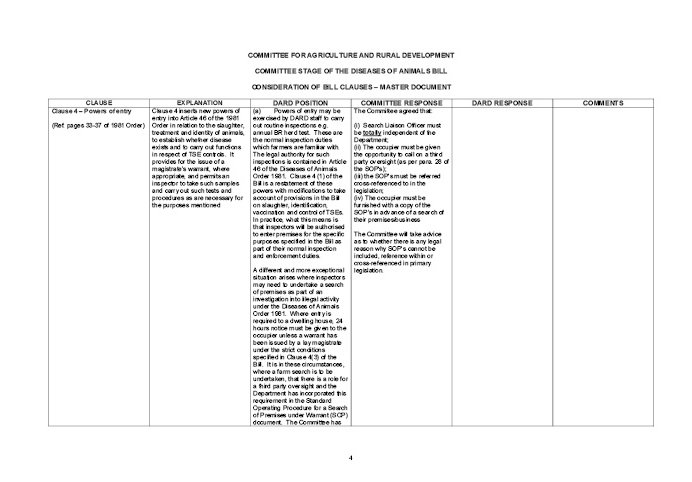
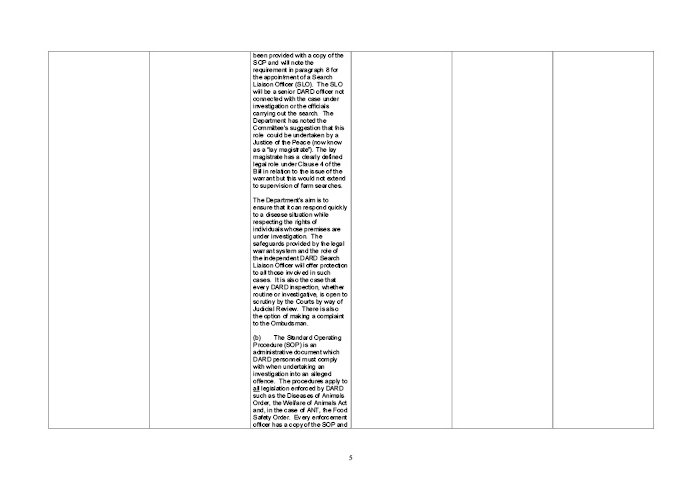
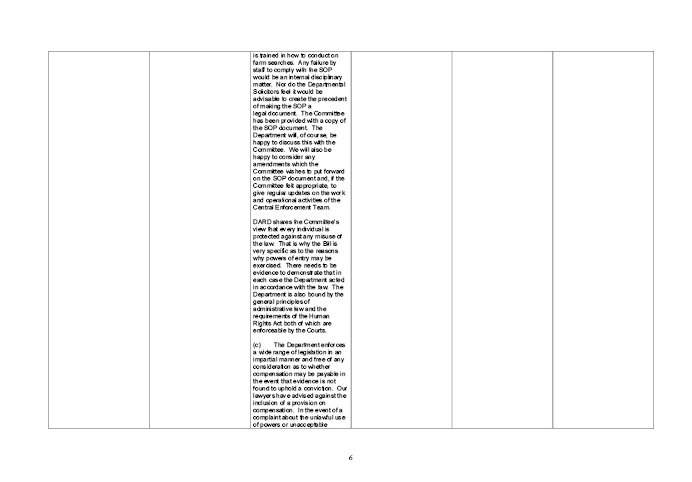

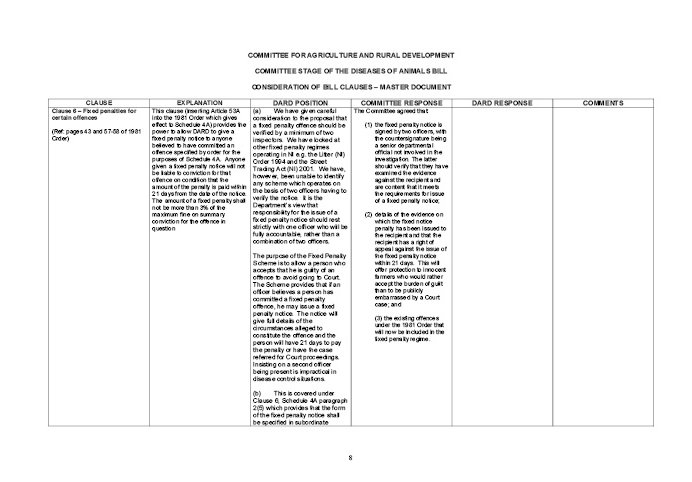
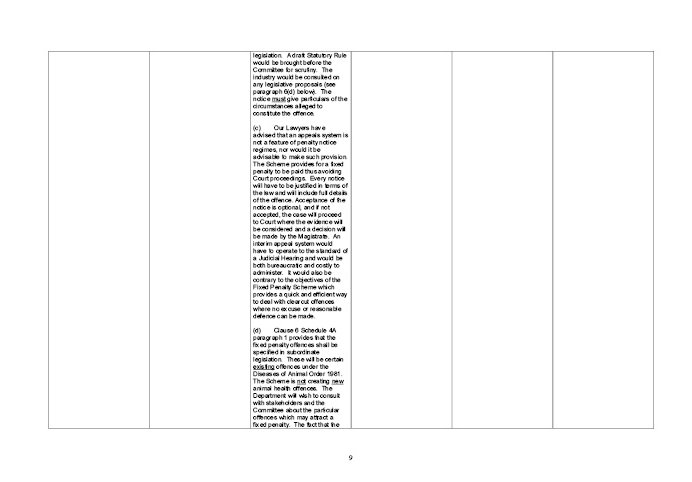
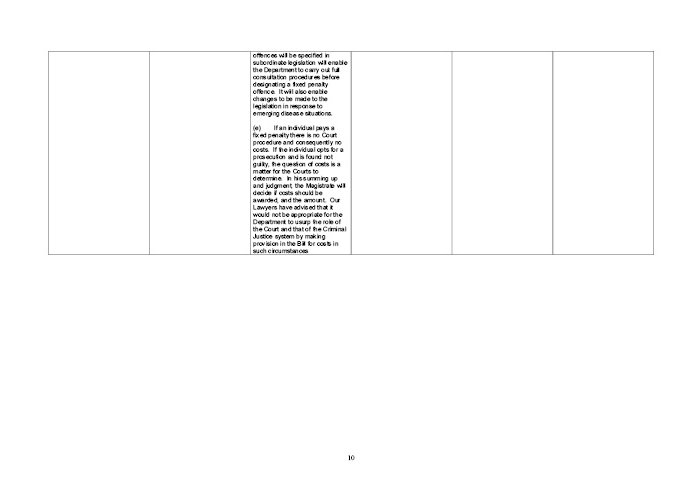
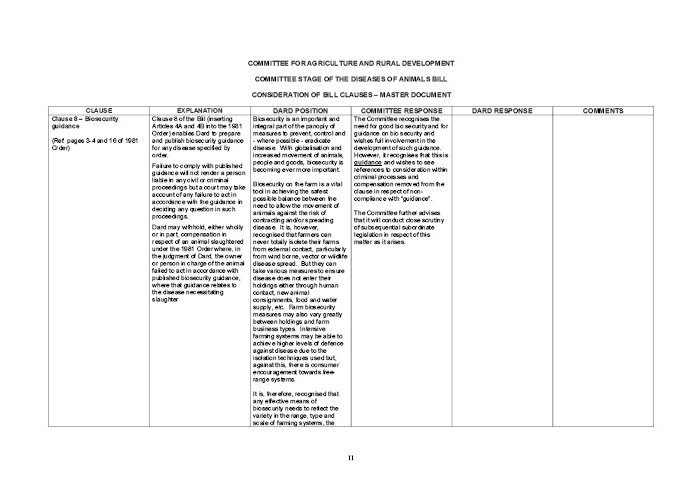
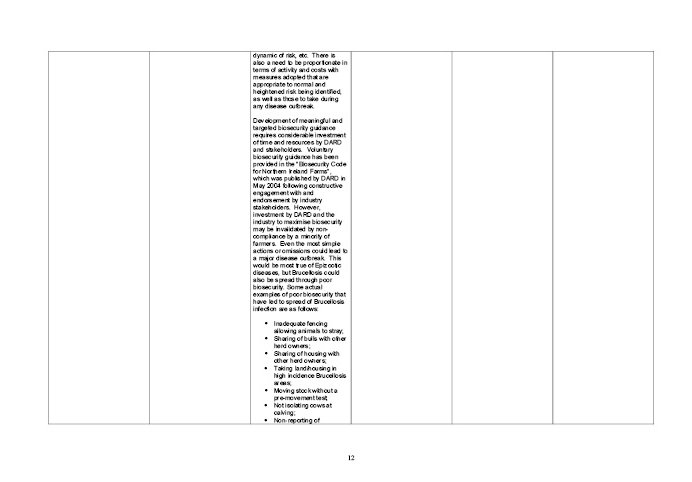
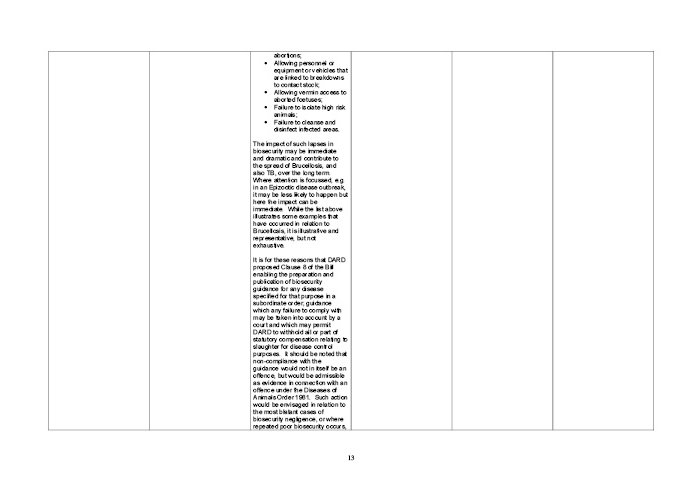
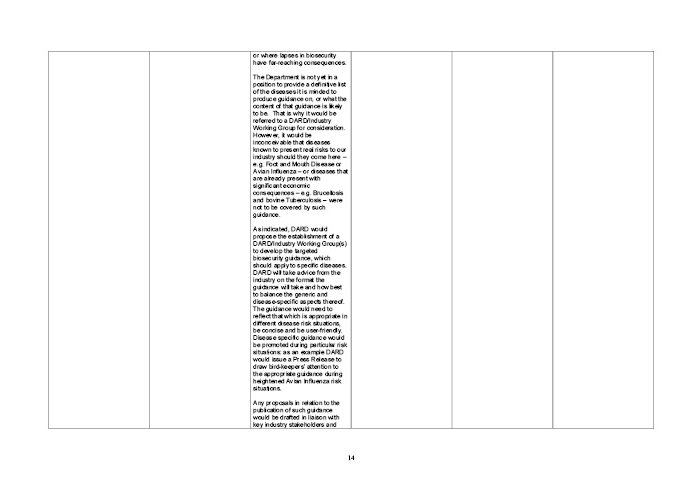
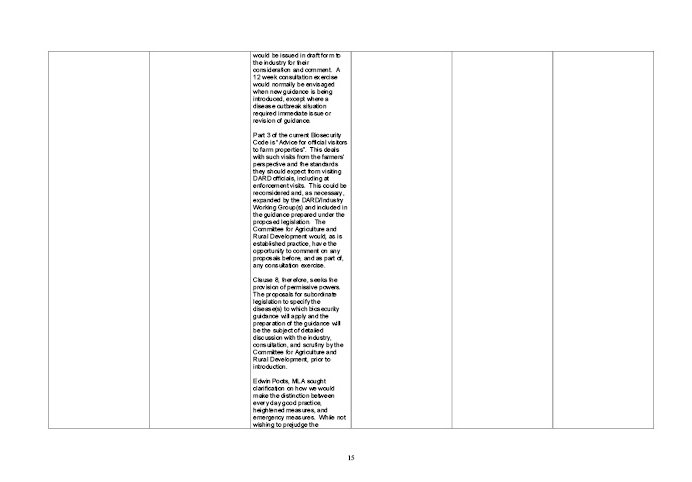
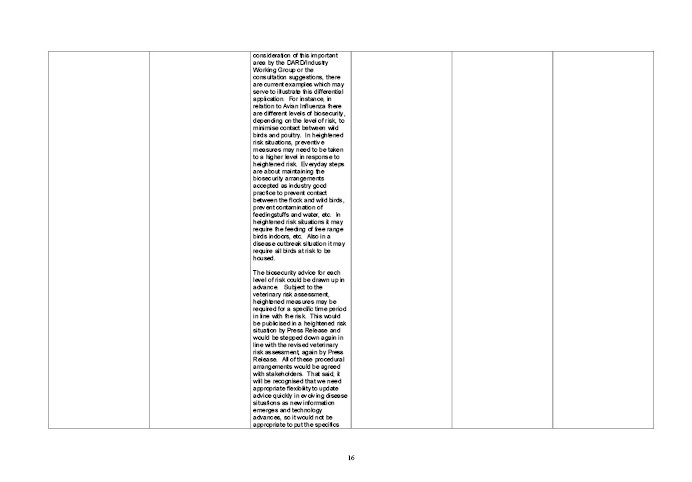
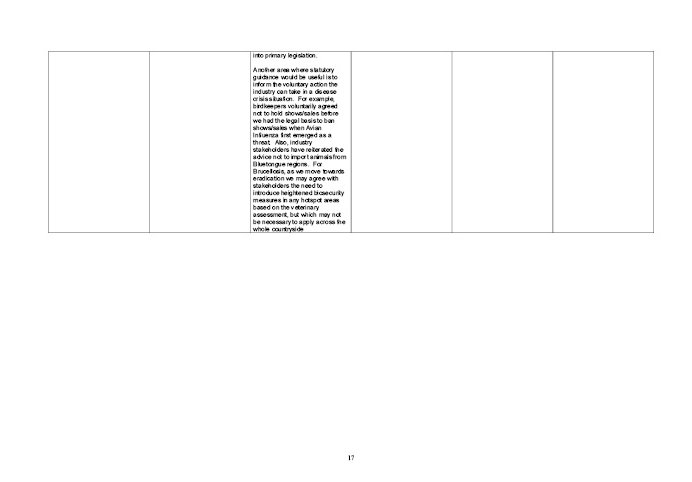
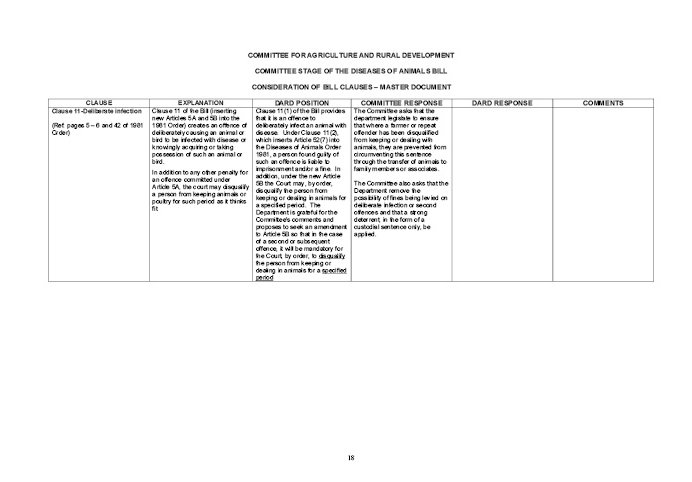

Paul Carlisle
Clerk to the Committee for
Agriculture and Rural Development
Parliament Buildings
Stormont
Belfast
BT4 3XX
Joe Cassells
Departmental Assembly Liaison Officer
Department of Agriculture and
Rural Development
Room 509
Dundonald House
Belfast
BT4 3SB
8 January 2009
Dear Joe
Diseases of Animal Bill – Meeting of 6 January 2009
I refer to the above.
I have attached, for information, a copy of the Committee recommendations for amendment of clauses contained within the Disease of Animals Bill. I would appreciate if you could bring these to the attention of your colleagues as soon as possible.
You will be aware that the Committee will return to this matter on 20 January 2009. I would be grateful if the Department’s considered response to these recommendations could be returned to me no later than noon, 15 January 2009.
I am happy to discuss.
Yours sincerely
Paul Carlisle
Clerk to the Committee for
Agriculture and Rural Development
![]()
Corporate Policy Division
Central Management Branch
Dundonald House
Upper Newtownards Road
Belfast BT4 3SB
Tel: 028 90524331
Fax: 028 90524884
Email: joe.cassells@dardni.gov.uk
Your reference
Our reference
Date: 16 January 2009
Paul Carlisle
Clerk to the Committee for Agriculture and Rural Development
Room 284
Parliament Buildings
Belfast
BT4 3XX
Dear Paul
Diseases of Animals Bill - Meeting of 6 January
I am replying to your letter of 8 January 2009 concerning the recommendations of the Committee for amendments to the Diseases of Animals Bill. Our comments on the issues raised are set out below.
Clause 1 – Extension of power to slaughter
We note that the Committee intends to seek legal advice on an amendment to this Clause whereby the Department would be required to enact existing powers, under the Diseases of Animals Order 1981, whenever disease levels are identified by the Department. If following legal advice the Committee presses for an amendment to this Clause we would need to have their position clarified on the nature of the amendment required.
Clause 3 – Transmissible Spongiform Encephalopathies
I can confirm that a full 12 week consultation will take place on subordinate legislative proposals under this Clause. An exception may arise in the case of emergency legislation to deal with a human or animal health risk but in this event the Committee and the industry would be fully briefed and involved in the development of the necessary legislation.
Clause 4 – Powers of Entry
(i) We accept that the Search Liaison Officer (SLO) should be “totally independent” of DARD and will amend paragraph 8 of the Standard Operating Procedure (SOP) to reflect this. We will consult the Public Appointments Unit in OFMDFM on the procedure for appointing a panel of SLOs who can be called upon to undertake this role as and when required.
(ii) We agree that the occupier should have the opportunity to have present a third party oversight of his choice (e.g. relation, neighbour, solicitor). Exceptionally, where for example, the health and safety of staff or animals is at risk or there is such a risk to the discovery and preservation of evidence as would undermine the investigation it may not be possible to have a third party present. These cases will be very limited. The SOP will be amended to reflect this.
(iii) Having considered the matter further, regrettably the Department has concluded that it is unable to agree to the Committee’s proposal to include the Standard Operating Procedure (SOP) within the Bill, whether as a Schedule to the Bill or as a cross-reference.
The SOP is an internal, administrative, departmental document - the Department is of the view that it is a document which is inappropriate for inclusion in primary legislation. Nor does the Department believe that it would be appropriate to give such a document a “statutory” status. We do not believe that the face of the Bill is the right place to set out the practical enforcement procedures of the Central Enforcement Team. These procedures, by their very nature, require flexibility and the ability to respond, proactively and reactively, to the changing operational reality. By confining these matters to the Bill we would risk tying CET to outdated and counter-productive enforcement measures, which may not be fit for purpose. The Department is also influenced by the fact that there is no legislative precedent for the Committee’s proposal.”
(iv) The SOP will be published on the DARD website and a copy will be given to the occupier in advance of the search taking place.
Clause 6 – Fixed Penalties
(i) We have considered the proposal that the Fixed Penalty notice should be countersigned by a senior DARD official. We can find no precedent for this in other fixed penalty regimes. The onus of responsibility is on the officer on the ground who actually sees the offence taking place and issues the notice at that time. In terms of fairness and accountability it is difficult to see what the role of an officer at another location would be. He could not, for example, adjudicate on whether or not an offence had been committed as this can only be determined by a Court of law. The Fixed Penalty Scheme is intended to apply to designated clear-cut offences which occur during epizootic outbreaks or at ports and airports. It is a quick and effective way of dealing with illegal activities which compromise the disease situation and undermine the efforts of law abiding farmers. It remains the Department’s view that in line with other fixed penalty regimes the notice should be signed by the officer who observed the offence and issued immediately to the recipient. The Department would also wish to make it clear that paragraph 5(b) of new Schedule 4A makes it clear that the notice has to set out the “evidence” giving rise to the offence.
(ii) Having conducted further research, the Departmental Solicitor’s Office representative is reinforced in his view that an appeal system is not a feature of fixed penalty notices (“FPN”). During the previous meeting several members of the Committee raised the example of the appeal procedure applying to contraventions of the parking regulations, however notices issued in connection with the contravention of parking regulations are not fixed penalty notices but “fixed charge notices” (“FCN). The Department would respectfully suggest that any comparison between the system associated with parking enforcement is not a valid comparison. The difference between a FCN and a FPN is that in the latter you are given a choice of paying the fine or opting for Court, while in the former you are simply instructed to pay a monetary fine, refusal or failure to do so pay can result in the amount being sought through civil debt proceedings. Another distinction between the two is the fact that parking offences have been de-criminalised, no criminal offence is committed if you contravene parking Regulations, there is no risk of subsequent prosecution - in these circumstances provision has been made for an appeal to the Northern Ireland Traffic Penalty Tribunal.
Every circumstance of a FPN is not accompanied by the provision of an appeal, the only option open is to either pay the required sum in discharge of the notice or to opt for a Court appearance. The Department would refer to the Litter (NI) Order 1994, the Street Trading Act (NI) 2000, as well as Non-Endorsable and Endorsable FPN issued by the PSNI.
While the Departmental Solicitors Office representative indicated, at the last Committee hearing, that an appeal mechanism was something that he thought could be provided for, following additional research he has informed the Department that he has concluded he is unable to sustain this previous statement. In the absence of any legislative precedent for the provision of an appeal in fixed penalty notice regimes the Department is unable to agree to the Committee’s proposal.
The Department is also of the view that the creation of a statutory appeal process, as a means to determine guilt or innocence, would usurp the role of the Court.”
(iii) The Scheme will apply to certain existing offences under the Diseases of Animals Order 1981. The Department will carry out formal written consultation (12 weeks) with stakeholders about the particular offences which will attract a fixed penalty. The draft subordinate legislation specifying the offences will be submitted to the Committee for consideration.
Given the Committee’s concerns about the fixed penalty clause, the Department will propose an amendment to ensure that the order specifying the offences to which the fixed penalty regime will apply will be subject to the affirmative resolution procedure in the Assembly.
This will mean that the secondary legislation which is necessary for the fixed penalty regime to operate will have effect only when it has been approved by a resolution of the Assembly. The affirmative resolution procedure is laid down in Section 41(4) of the Interpretation Act 1954.
Clause 8 – Biosecurity Guidance
The Department notes that the Committee accepts the need for Biosecurity Guidance. The draft Guidance for specific diseases will be drawn up jointly with industry and will be submitted to the Committee for consideration. There is also a statutory requirement on the Department to issue the draft Guidance to stakeholders for comments.
In the pro-forma you provided, the Committee has asked for references to the criminal process and withholding of compensation to be removed from the Bill. However, I understand that during your recent discussion with DARD officials you agreed to check your notes and Hansard again as there is some confusion surrounding this Clause.
We note from the Hansard record of the meeting on 6 January that while the Committee is not content with linking the biosecurity guidance with compensation and criminal court cases it wishes to be fully involved in the compilation of biosecurity guidance. The Committee has stated that it will conduct extremely close scrutiny of any subordinate legislation relating to that guidance.
We recognise the Committee’s concerns on these aspects and we would like to provide the Committee with some further clarification as to the rationale for including the links to compensation and criminal court cases and the implications of removing the links.
The removal of both links would mean that there is no deterrent for non-compliance with the Guidance and no sanction for failure to comply with the Guidance. The existing gap in disease control powers would remain unfilled, i.e. the small number of farmers who currently do not adhere to the voluntary Code, could continue without sanction to undermine and put at risk the majority who are conscientious about maintaining good biosecurity practice on their farms.
The retention of the link to the admissibility of evidence of failure to comply with the Guidance in court proceedings for another statutory offence, without the link to compensation, would be a partial solution. This sanction would apply only in circumstances where a farmer has also committed a statutory offence. In the event that there is no other offence under the 1981 Order, evidence of a serious breach of biosecurity will not go before the courts, even if there are repeated serious breaches of biosecurity. There will be no penalty for a farmer whose reckless approach to biosecurity results in serious disease spread and risk to others.
Given the limitations of the admissibility in court sanction, we believe the link to compensation is the main deterrent to promote compliance with the biosecurity guidance, and an appropriate sanction in cases where the reckless actions of a farmer lead to serious disease consequences.
We recognise that the Committee is concerned in particular about the possible misuse of the powers to link the biosecurity guidance with compensation. We can assure the Committee that this power would only be used in the most extreme circumstances.
The link to compensation would be an add-on to how we currently consider the withholding of compensation under Article 18 (6) (a) in cases where a statutory offence has been committed. We would like to outline for the Committee the existing way that such decisions are made. The process is based on the following key principles. A decision to withhold compensation is not made by an individual Departmental official, or by anyone who has had direct involvement with the case. The decision is a matter for a panel of senior officials of the Department who have not previously been involved in the case. There are a number of steps before a case is referred to a panel for consideration. The first step is an investigation of the circumstances of the outbreak of disease. If the investigation indicates that a breach of the animal health legislation has been a significant factor in this outbreak of disease, the Department formulates a detailed document setting out the full background and circumstances of the case. This document is sent to the farmer to seek his/her comments. The case is then considered by the panel of senior officials. The panel has before it all the relevant information, including any representations made by or on behalf of the farmer, and will fully take into account these representations. In coming to its decision, the panel takes account of considerations such as the seriousness of the breakdown in disease control that has occurred, the extent to which the farmer’s actions were reckless of the consequences (e.g. did the farmer deliberately intend to breach the legislation, or was the breach more in the nature of carelessness?), whether this is a first “offence”, or if there has been a history of breaches of animal health legislation. The herdkeeper receives a written record of the decision made by the Panel.
We intend to adopt a similar process in the case of a serious breach of biosecurity. We emphasise that the powers are intended to be used only when the most blatant or repeated biosecurity negligence has occurred or where the lapses in biosecurity have far-reaching consequences for the farming community. As we see it, the main value of the powers will be as a deterrent.
The Committee had asked about actual examples where lapses in biosecurity have resulted in serious outbreak of disease. During the Committee meting on 6 January, the Department mentioned actual examples involving Brucellosis in Northern Ireland and the possible risk involving epizootic disease if there was an outbreak here in the future. As further background information for the Committee, we provide at Annex A some actual examples of breaches of biosecurity, which are not statutory offences but that have resulted in serious outbreak of disease here and in Great Britain.
The European Commission, has, in its strategy for 2007-2013, highlighted its desire to encourage member States to develop EU biosecurity guidelines and will consider implementation of legal standards. That work is ongoing and the current timetable would see integration of such procedures into Animal Health Law starting in 2010.
Clause 11 – Deliberate Infection
The Department has considered the Committee’s request that a person disqualified from keeping animals should be unable to circumvent the law by transferring them to family members or business associates. The Department is of the view that it is unable to agree to the Committee’s proposal, placing such restrictions on family members, who are not themselves guilty of the offence would amount to a breach of Article 1 Protocol 1 (Right to Property) and Article 8 (Right to Private Life) of the European Convention on Human Rights, incorporated into the law of Northern Ireland by the provisions of the Human Rights Act 1998. Given this such provision would be outside the legislative competence of the Assembly under section 6 of the Northern Ireland Act 1998.
We are unable to place such a restriction in law as it would be contrary to the Human Rights Act in terms of preventing an innocent person taking possession of animals. The term “disqualification” means that the person shall not:-
- Keep or deal in animals
- Have custody or control of an animal
- Be concerned in the management or control of a body whose activities include keeping or dealing with animals.
This reflects the legal position in GB.
We propose to go further than GB by expanding the definition of “keeping or dealing” in animals or birds” by amending new Article 5B (8) (a) so that it includes having custody, control or possession of an animal or bird. We are proposing to amend Clause 5B so that in the event of second or subsequent offence it will be mandatory for a Court to disqualify the person from keeping animals for a specified period. However, this is a matter for the NIO and we have raised this issue with them.
We note that the Committee wishes to have custodial sentences only for offences of deliberate infection. It is a matter for a Court to determine whether in any particular case a fine, imprisonment or both are appropriate. Again we have raised this with the NIO.
I would be grateful if this could be brought to the Committee’s attention as soon as possible.
Yours sincerely
Joe Cassells
Departmental Assembly Liaison Officer
Annex A
Examples of breaches of biosecurity, which are not statutory offences but which have resulted in serious outbreak of disease here and in Great Britain.
The following have been factors in Brucellosis outbreaks:
1. Moves to conacre/housing in high incidence areas
A herd keeper in Coleraine division, a low incidence division, used a herd keeper in Armagh division, traditionally a high incidence division, to rear his young dairy stock and then return them to his home premises for calving. The Armagh herd keeper was one of several farms in his immediate vicinity depopulated for confirmed brucellosis infection in 2004. When disease resurfaced in this area in 2007, because of latent infection, the cattle reared there became infected just before they moved back to Coleraine DVO. They were not isolated at calving and spread infection into the main herd which required depopulation costing £953,373. From this herd, infection spread to two other herds in the area, both requiring depopulation.
2. Sharing of bulls/housing
A herd keeper in Newry DVO was found to have multiple reactors at a herd test. Six weeks later his brother’s herd, in Armagh division, had multiple reactors at his herd test. They had shared housing and also shared a bull.
3. Not isolating bought-in animals
A herd keeper in Dungannon DVO bought in 19 females from an Enniskillen herd. When the Enniskillen herd was found to have multiple reactors at a herd test, the 19 were traced to Dungannon and a restriction and isolation notice issued for them. The moved in animals were already infected and had been mixing with the herd since their purchase 3 weeks previously. Infection had spread to the main herd and resulted in depopulation of almost 550 animals.
4. Allowing personnel/vehicles/equipment with links to breakdowns to contact stock
A herd keeper in Londonderry DVO, a very low incidence division, had a dealer buy and transport animals on his behalf, then unload these and load other of his (herd keeper’s) animals at his (herd keeper’s ) home premises; on several occasions. The dealer had infection on his own premises with multiple reactors. Infection was found in the Londonderry herd keeper’s cattle and the entire herd was depopulated.
The Coleraine herd keeper mentioned at the first example above was also assisting a neighbouring herd keeper with his cattle fertility work, while his own herd was infected. The neighbouring herd became infected and was depopulated.
All the above examples have occurred in the last 2 years. There are more examples in each category.
The following have led to spread of epizootic disease:
- Movement of vehicles that have been contaminated by infected material and therefore spread disease. Although under the Transport of Animals and Poultry (C&D) Order (NI) 2007 it is an offence to move animals in vehicles that have not been cleansed and disinfected, it is not an offence to knowingly move potentially contaminated vehicles not carrying animals. There is still a risk that such vehicles could spread disease as was the case in England with the spread of FMD virus in 2007.
- Movement of infected material between farms by staff. An example of this was a case of Avian Influenza in England in which low pathogenic avian influenza virus was transferred to other flocks by workers who had not taken adequate measures to change clothing between the premises. The virus mutated to highly pathogenic avian influenza at the third infected premises.
- Sharing of animals, machinery or equipment between farms without proper C&D.
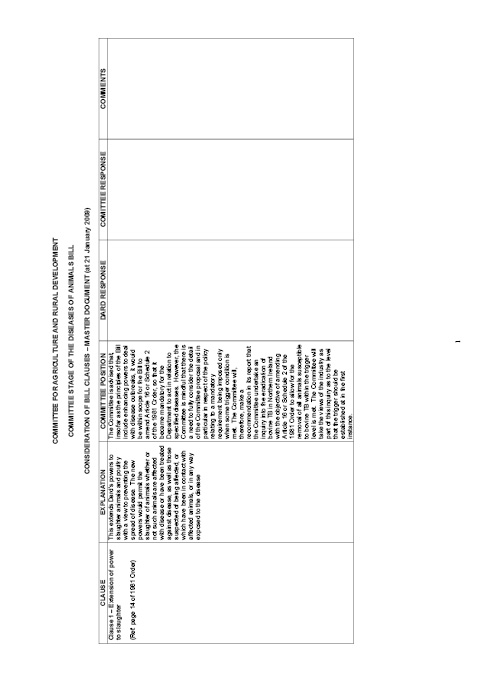
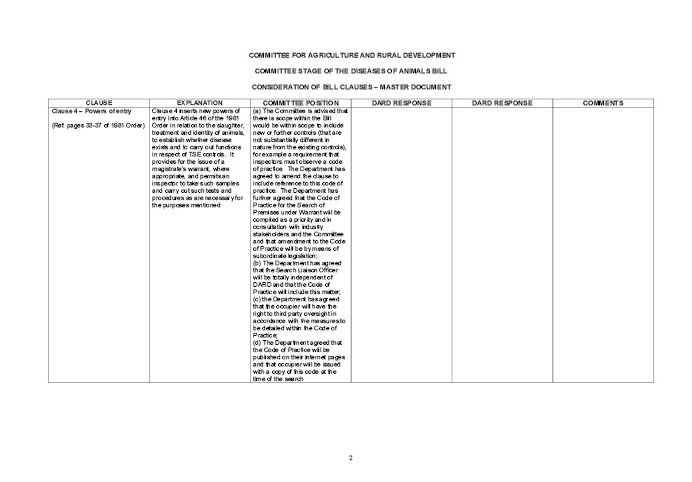
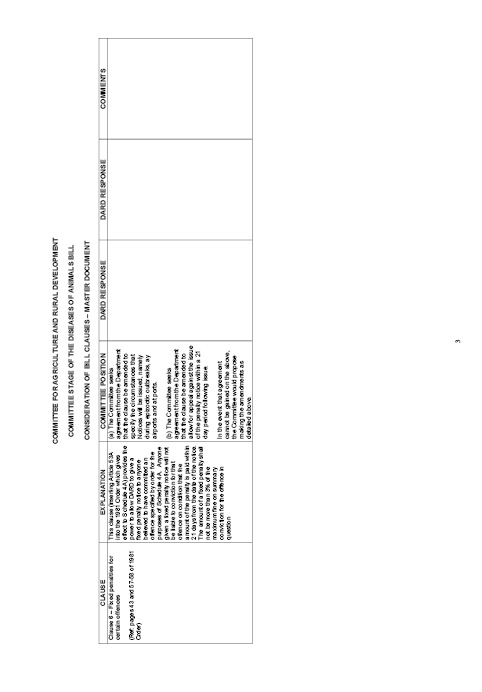
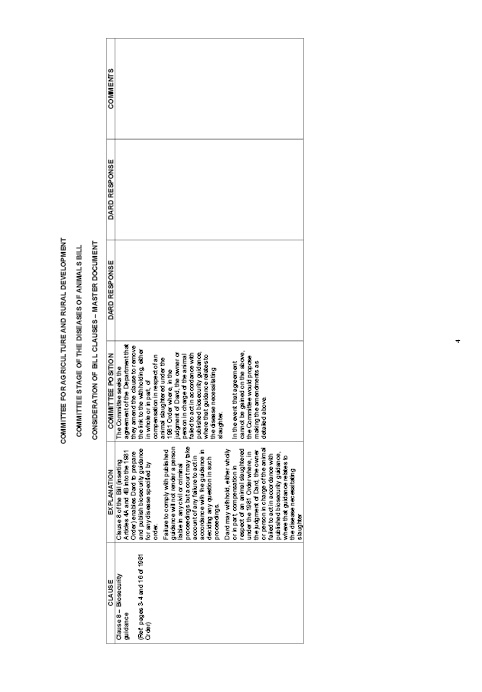

Corporate Policy Division
Central Management Branch
Dundonald House
Upper Newtownards Road
Belfast BT4 3SB
Tel: 028 90524331
Fax: 028 90524884
Email: joe.cassells@dardni.gov.uk
Your reference
Our reference
Date: 26 January 2009
Paul Carlisle
Clerk to the Committee for Agriculture and Rural Development
Room 284
Parliament Buildings
Belfast
BT4 3XX
Dear Paul
Diseases of Animals Bill - Meeting of 20 January
I am replying to your letter of 20 January 2009 concerning the recommendations of the Committee for amendments to the Diseases of Animals Bill. Animal Health colleagues are grateful for your discussion with them on Thursday 22 January. Our comments on the issues raised are set out below.
Clause 1 Extension of Power to Slaughter
We have noted that the Committee will make a recommendation in its report to undertake an Inquiry into the eradication of bovine TB. We look forward to participating in the Inquiry and seeing the outcome of that. DARD officials will provide evidence and witnesses as required. Given the scope of the Inquiry, we would ask that the Terms of Reference are drafted as widely as possible to take into account all the available evidence on badgers and bovine TB in cattle, and to include the views of all interested stakeholders, i.e. cattle and badger interests, and Departments as this is a cross-cutting issue. As there could be very significant financial implications for the public purse, we would hope that the Committee will provide clear evidence in its report as to the cost-effectiveness of any measures that would be made a mandatory requirement.
Clause 4 Powers of Entry
On the grounds of openness and transparency the Department will amend the Bill to include a reference to the Code of Practice. Officials will need to discuss the terms of any Clause with the Office of Legislative Counsel, as legal advice from the Department Solicitor’s Office has indicated there will most likely be a need for additional wording in order to place a statutory obligation upon the Department to produce the Code of Practice in the first instance.
While we accept that the Code should only be amended in full consultation with the industry and the Committee, to have amendments made only by subordinate legislation can be a lengthy process. In addition, legal advice has also indicated that the procedure in place for subordinate legislation may not be the appropriate mechanism for the amendment of any Code of Practice given the Code is not itself a piece of subordinate legislation. Again we will have to await the terms of any draft clause. We would want to include a statutory obligation in the Bill to require the Department to consult with the Committee and such person and organisations as necessary on the Code of Practice and any subsequent amendments to it.
We can confirm that:
(a) The Search Liaison Officer (SLO) will be totally independent from DARD;
(b) The occupier will have the right to have a third party present; and
(c) The Code of Practice will be published on the DARD Website, will be available on request, and copies will be given to SLO and Occupier.
Clause 6 Fixed Penalties
Having considered this Clause, the Department cannot accept the Committee’s request that an appeals process is introduced. The Department has already informed the Committee why it cannot introduce an appeals mechanism for Fixed Penalties and would refer Committee Members back to the detailed reply it provided on 15 January 2008.
The Department will remove this Clause from the Bill.
Clause 8 Biosecurity
We will amend Clause 8 to remove the link to the withholding compensation. However, the Committee should be made aware that we have serious concerns about this, as we believe the link to compensation would be a strong deterrent to promote compliance with the biosecurity guidance, and an appropriate sanction in cases where the reckless actions of a farmer lead to serious disease consequences.
We would wish to point out to the Committee that it is our intention to reserve the right to revisit the withholding of compensation issue at a later date when the biosecurity guidance has been published. If we find significant levels of non-compliance with the new biosecurity guidance resulting in serious disease outbreak, and it appears that admissibility on its own is not a sufficient deterrent, we will raise this matter with the Committee again with a view to strengthening the deterrent.
Clause 11 Deliberate Infection
I would refer you back to the comments that I made in my letter to you dated 16 January.
We will report back to you when the Minister receives a reply from Paul Goggins, Minister of State, NIO.
Yours sincerely
Joe Cassells
Departmental Assembly Liaison Officer
![]()
Corporate Policy Division
Central Management Branch
Dundonald House
Upper Newtownards Road
Belfast BT4 3SB
Tel: 028 90524331
Fax: 028 90524884
Email: joe.cassells@dardni.gov.uk
Your reference
Our reference
Date: 26 January 2009
Paul Carlisle
Clerk to the Committee for Agriculture and Rural Development
Room 284
Parliament Buildings
Belfast
BT4 3XX
Dear Paul
DISEASES OF ANIMALS BILL - MEETING OF 27 JANUARY
Following last Tuesday’s Committee meeting I am attaching a revised copy of the Draft Diseases of Animals Bill which incorporates the recommendations of the Committee for amendments to Clause 4 (Powers of Entry) and Clause 8 (Biosecurity).
With regard to the Code of Practice, officials are still working on this. However, a draft copy will be presented to the Committee shortly. I have had discussions with the Ulster Farmers’ Union and the Northern Ireland Agricultural Producers’ Association and both will provide input and advice.
Clause 6 Fixed Penalties
At the Consideration Stage of the Bill, the Minister will give notice of her intention to oppose the question that Clause 6 stand part of the Bill. At that time Clause 6 will be removed from the Bill as indicated in the draft copy of the Bill.
Clause 11 Deliberate Infection
We have amended this Clause to those having custody, control or possession of an animal or bird.
The Committee has indicated that this Clause should be amended to include a power to stop a person disqualified from keeping animals from transferring them to family members or business associates. As we have advised the Committee, we have concerns that such an amendment will be in breach of the Convention of Human Rights. We also wish to introduce a power, where in the event of a second or subsequent offence of deliberate infection, it will be mandatory for a court to give a Custodial sentence. The Clause has not been amended as we are awaiting a reply from the Northern Ireland Office.
[Extract]
Yours sincerely
Joe Cassells
Departmental Assembly Liaison Officer

Paul Carlisle
Clerk to the Committee for
Agriculture and Rural Development
Parliament Buildings
Stormont
Belfast
BT4 3XX
Joe Cassells
Departmental Assembly Liaison Officer
Department of Agriculture and
Rural Development
Room 509
Dundonald House
Belfast
BT4 3SB
4 February 2009
Dear Joe
Committee Meeting – Diseases of Animals Bill
I refer to the above.
The Committee conducted formal scrutiny of the clauses contained within the above Bill at it’s meeting of 3 February 2009. Following this, two items remain unresolved:
Clause 4 – Powers of Entry
The Committee believes that this clause does not match with the proposed amendments agreed at the meeting of 27 January 2009. At this meeting, the Committee agreed with the Department that the amended clause would include a statutory obligation in the Bill to require the Department to consult with the Committee and such persons and organisations as necessary on the Code of Practice and any subsequent amendments to it. This was also proposed by the Department in correspondence dated 26 January 2009 which was tabled at the meeting of 27 January 2009 and considered by Members before agreement was reached.
The Department advised the Committee that subsequent legal advice indicated that it was not now possible to include reference to the Committee in the face of the Bill. The Committee agreed at the meeting of 3 February 2009 to seek its own legal advice in respect of this matter but indicated that they remained of the view that, rather than name the Committee in the Bill, reference could be made, for example, “to the relevant statutory committee established under Standing Orders, persons and organisations”.
In addition, the Committee is concerned that paragraph (7) of the proposed amended clause provides the Department with the opportunity to review and amend the code of practice without recourse to the Committee or other stakeholders. The Committee accepts that serious disease outbreaks may from time to time require a variance in established procedures. However, the Committee believes that the codes, which define how the Department is to conduct searches under warrant, should include reference to the need to occasionally vary from the code in the event of serious disease outbreaks and that the nature of these variances could be described in the code. The Committee believes that including these in the code will result in greater support from the industry, as contributors to the codes of practice, rather than legislating in the manner proposed.
Clause 11 – Deliberate Infection
The Committee notes that the Minister is awaiting response from the Minister of State in respect to including mandatory custodial sentences within the Bill. The Committee would remind the Department that the Committee Stage for consideration of the Bill ends on 17 February 2009 and that Committee will require time to consider the amendment. The Committee would appreciate, therefore, if the Department could remind the Northern Ireland Office of the urgency in respect of this matter and asks that the amendment be presented to it for consideration at the meeting of 10 February 2009.
In order that the Committee can complete scrutiny of the outstanding clauses at the meeting of 10 February 2009 I would appreciate if a response on these matters is forwarded the Committee Office by 17:00 on Friday 6 February 2009.
I am happy to discuss.
Yours sincerely
Paul Carlisle
Clerk to the Committee for
Agriculture and Rural Development

Animal Health and Welfare Policy Division
Animal Identification, Legislation and Welfare Branch
Dundonald House
Upper Newtownards Road
Belfast BT4 3SB
Tel: 028 90524290
Your reference
Our reference
Date: 6 February 2009
Paul Carlisle
Clerk to the Committee for Agriculture and Rural Development
Room 284
Parliament Buildings
Belfast
BT4 3XX
Dear Paul
Diseases of Animals Bill - Meeting of 3 February 2009
I am replying to your letter of 4 February to our Departmental Assembly Liaison Officer, concerning outstanding issues on Clauses 4 and 11.
Clause 4 – Powers of Entry
We note that the Committee intends to seek its own legal advice on a specific requirement for the Department to consult with the Committee on the draft code of practice. It is not appropriate for the Agriculture and Rural Development Committee or “the relevant committee” to be referred to in primary legislation. The Department is required to consult on the terms of the draft code and given the statutory position of the Committee in matters concerning agriculture and rural development, it is inconceivable that any consultation could be deemed satisfactory if it did not include the Committee. On the basis of the legal advice received, the Minister is not prepared to table an amendment to Clause 4 to include a specific reference to the Committee. This does not, of course, preclude the Committee from tabling its own amendment in consultation with its legal advisors. In this event we would suggest that the Committee may wish to take responsibility for tabling the new Article 46D. In order to assist the Committee we have included a suggested form of wording for reference to the Committee. However, in view of our concerns on this issue, particularly on the precedent that will be created by referring to a Statutory Committee on the face of a Bill, we would urge you to seek legal advice on this matter.
In view of the Committee’s concerns about the procedure for amending the code we have removed paragraph (7) from Article 46D. In accordance with paragraph (6) of that Article, if changes are required to the code, the Department will be required to follow the procedure set out in paragraphs (2) – (4).
Clause 11 – Deliberate Infection
The Minister wrote to Paul Goggins on 27 January regarding changes to the penalties for an offence of deliberately infecting an animal with disease. We understand that Minister Goggins is still considering the matter and a reply is not expected in time for next Tuesday’s Committee meeting. To assist the Committee’s consideration, NIO officials are content for the necessary changes to be made to the draft Bill on the strict understanding that these are subject to the agreement of their Minister. Clause 11 has, therefore, been amended to include a new Article 5B (2) which will make it mandatory for a Court, in the case of a second or subsequent offence, to disqualify a person from keeping or dealing in animals for a specified period.
Paragraph (9) extends the term “keeping or dealing in an animal” to include custody, control or possession of an animal, which was agreed by the Committee at Tuesday’s meeting.
Our Minister has also raised the issue of a mandatory custodial sentence for deliberate infection but it is unlikely that this will be agreed by Minister Goggins on the grounds that it is a matter for the Judiciary to determine in each case whether a fine, imprisonment or both are appropriate.
An unofficial version of the Bill is enclosed with draft amendments highlighted for consideration by the Committee at next Tuesday’s meeting.
A copy of this letter has gone to Joe Cassells, DALO.
Yours sincerely

Colette Connor
Diseases of Animals Bill Team
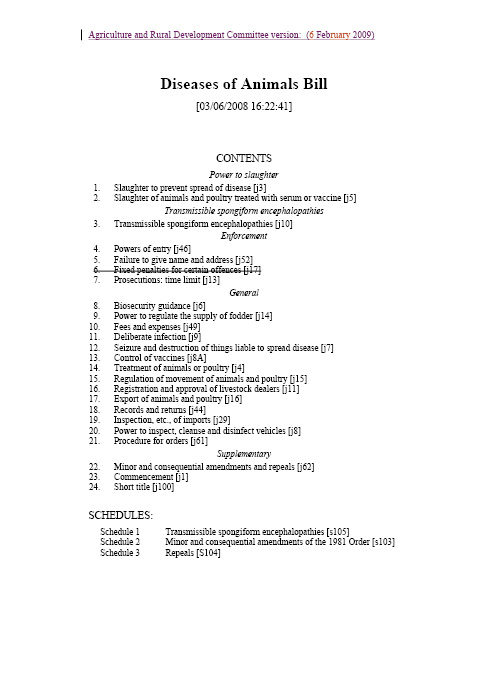
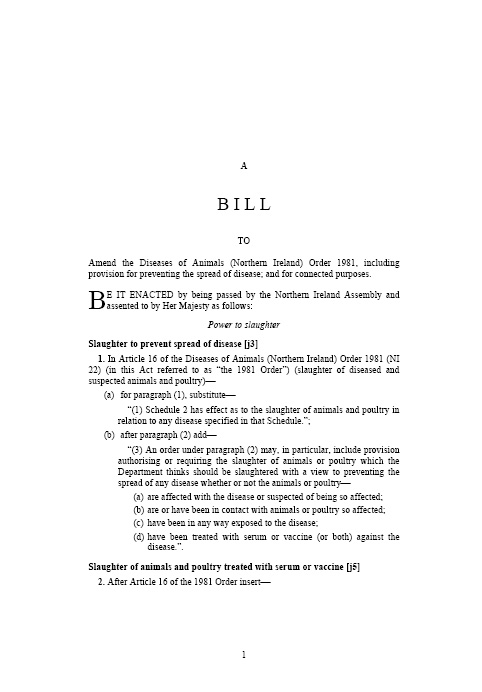
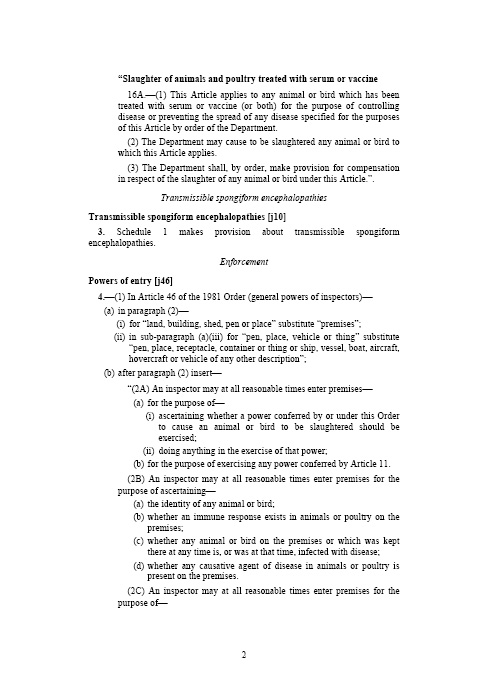
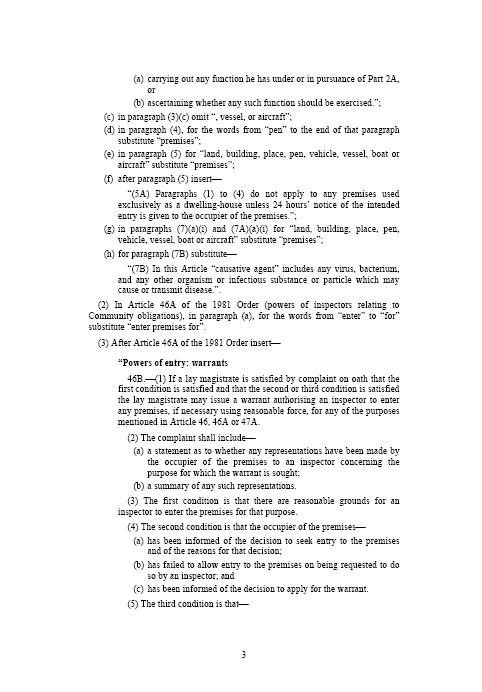
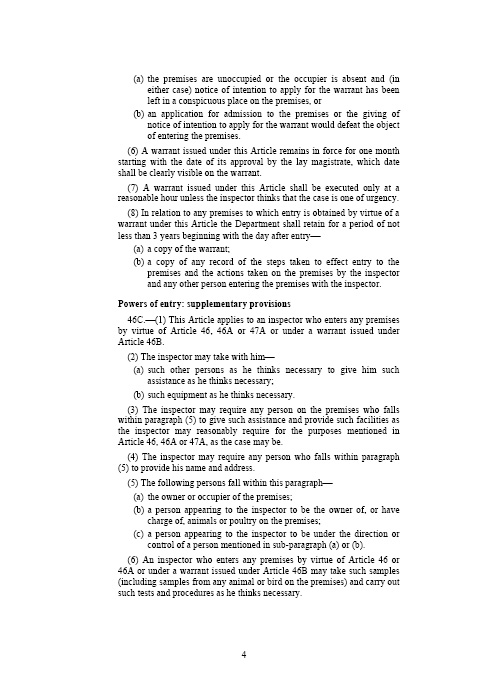
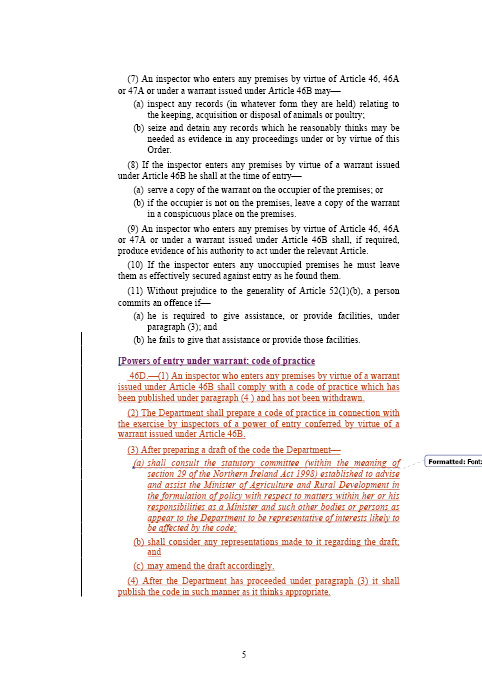
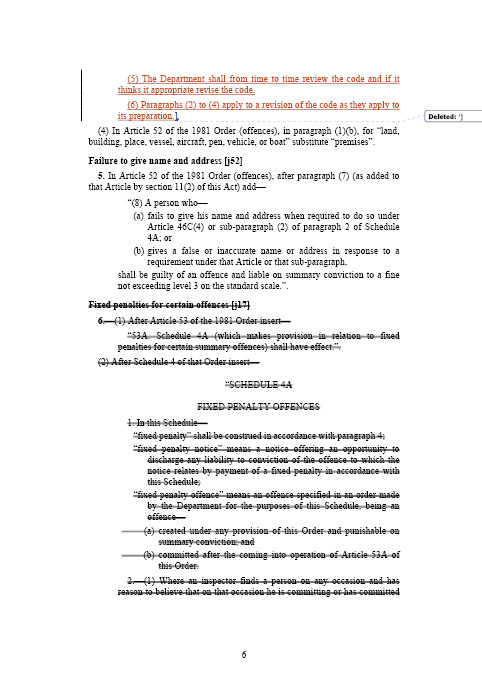
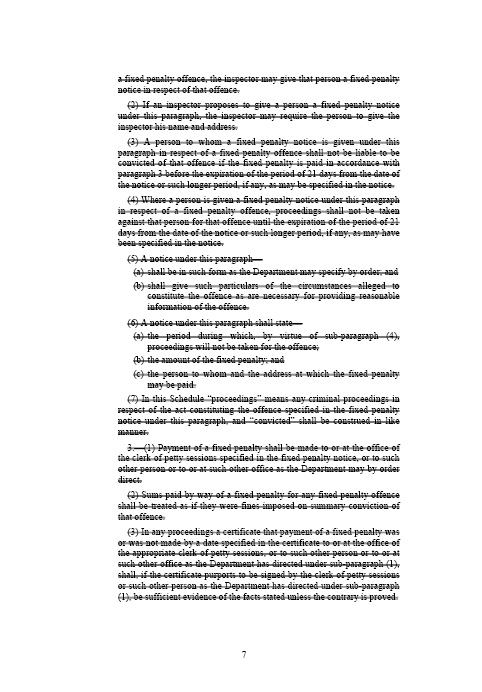
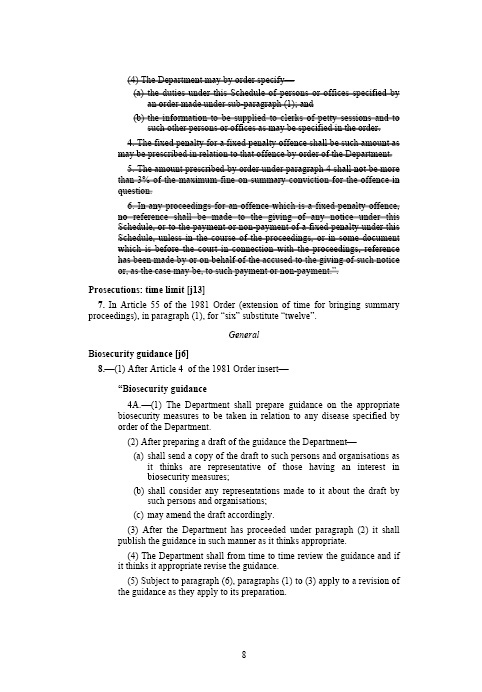
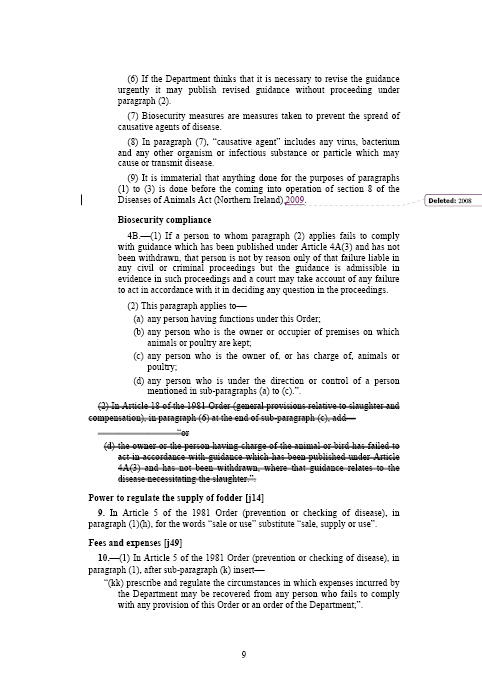
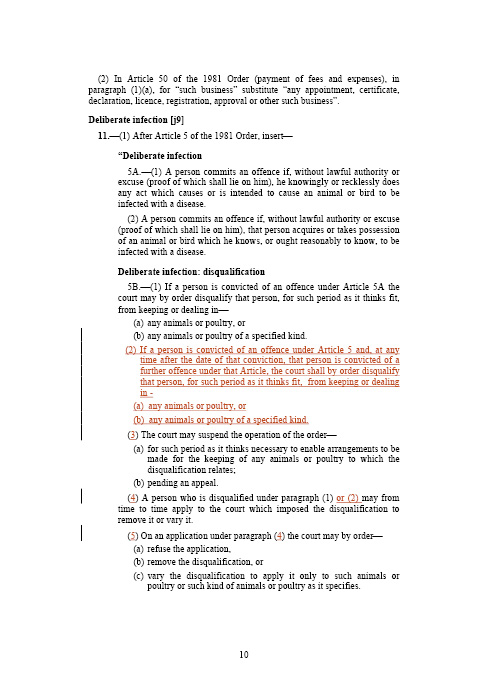
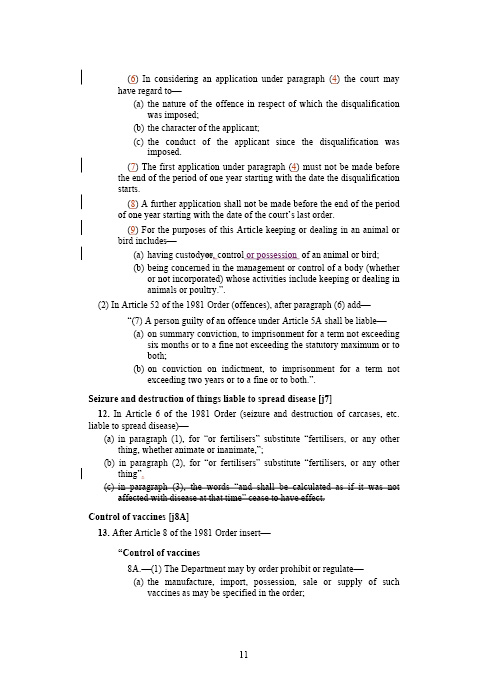
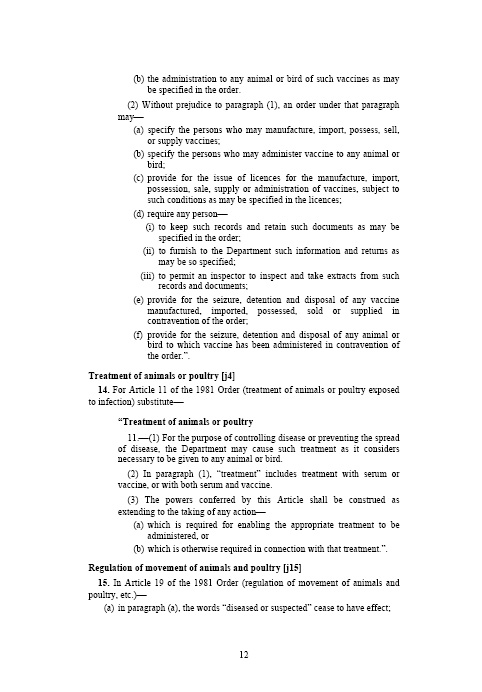
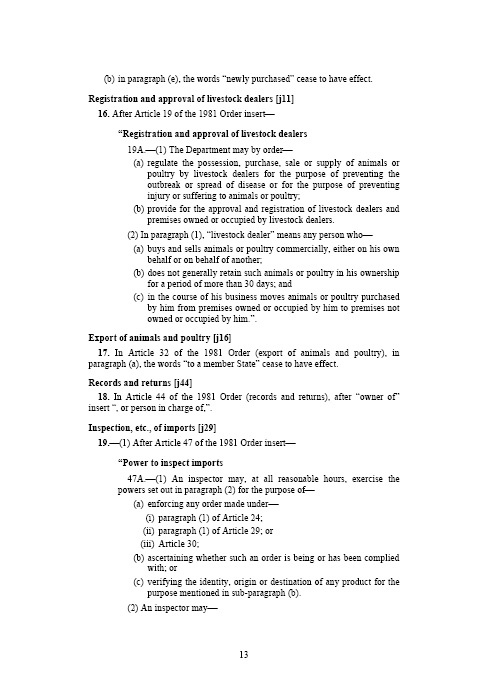
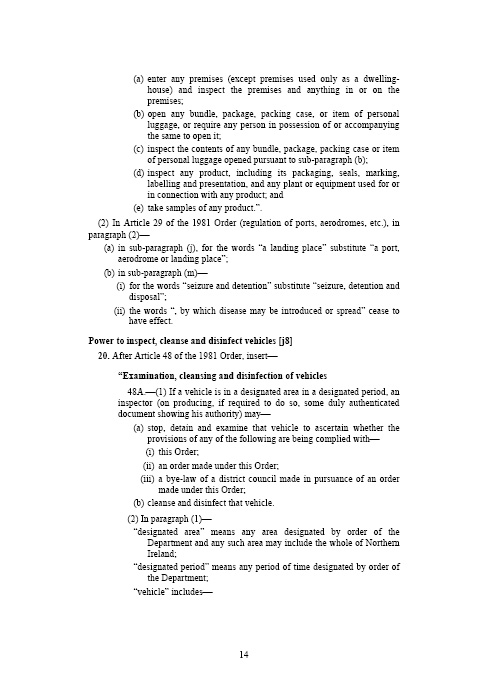
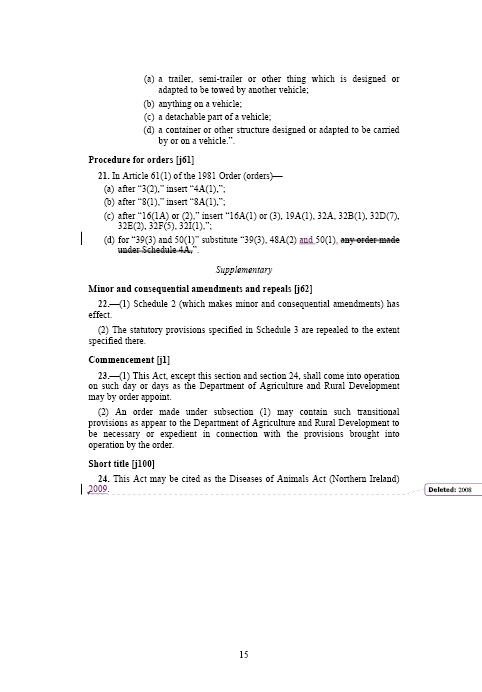
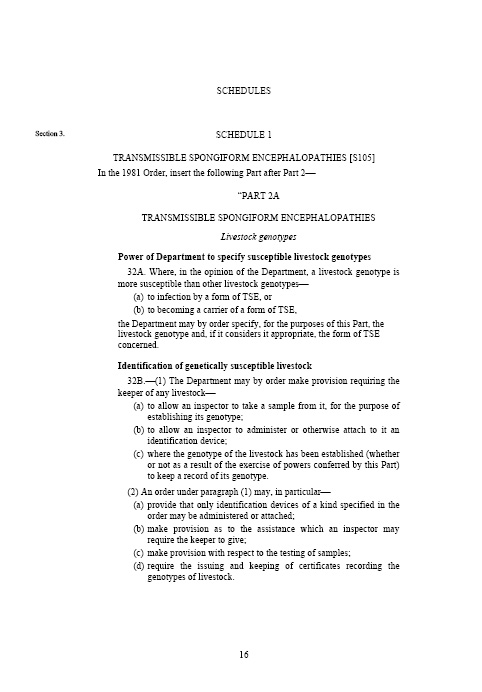
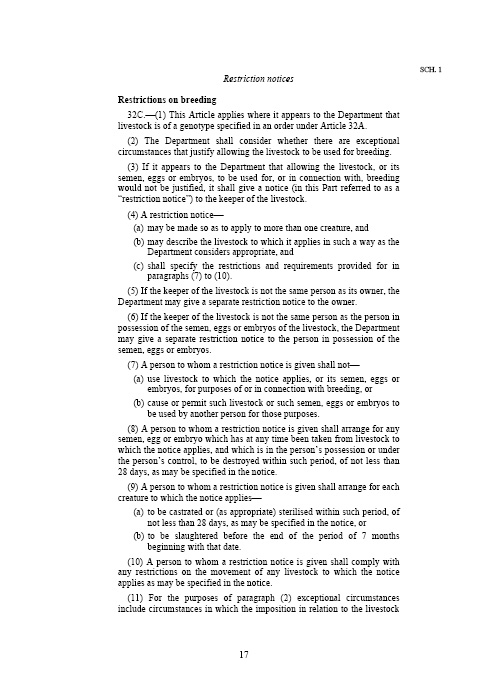
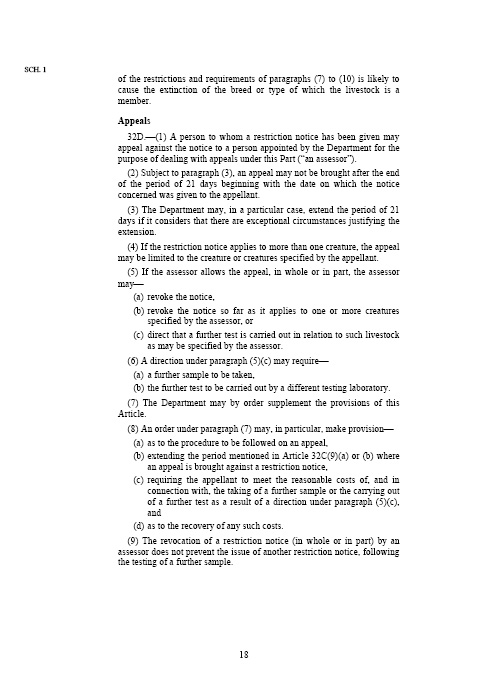
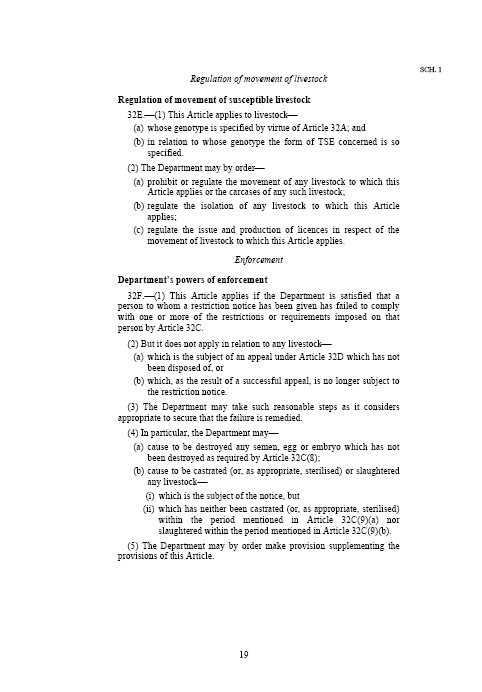
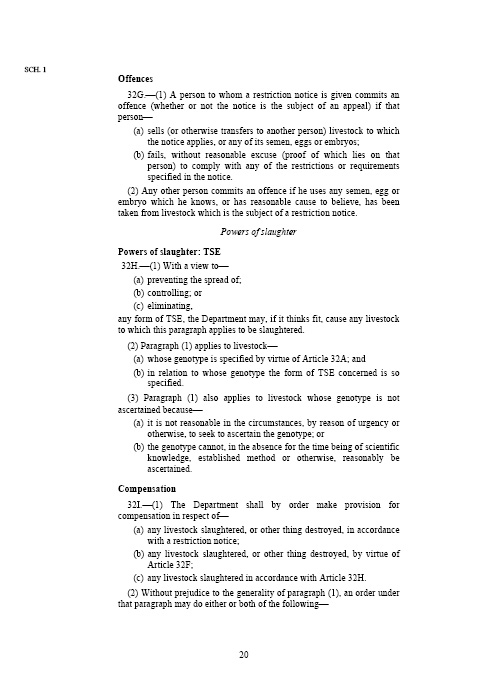
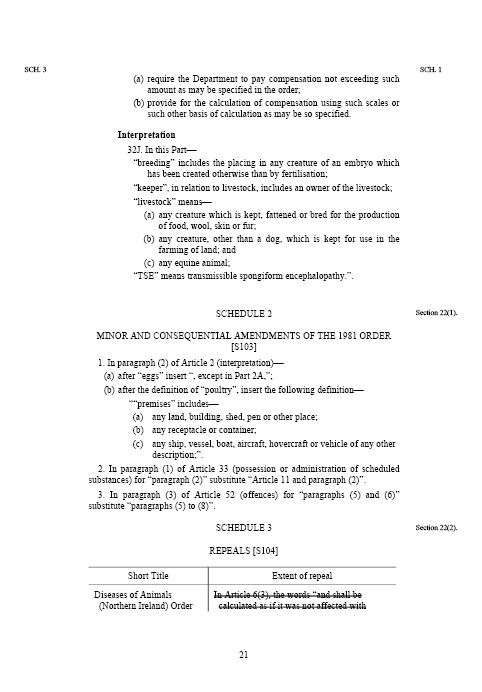
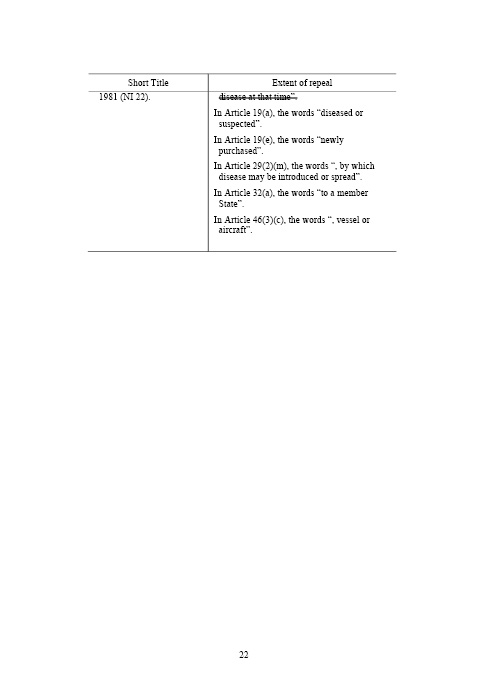

Northern Ireland Assembly
Paul Carlisle
Clerk to the Committee for
Agriculture and Rural Development
Parliament Buildings
Stormont
Belfast
BT4 3XX
Joe Cassells
Departmental Assembly Liaison Officer
Department of Agriculture and
Rural Development
Room 509
Dundonald House
Belfast
BT4 3SB
11 February 2009
Dear Joe
Committee Meeting – Diseases of Animals Bill
I refer to the above.
The Committee concluded its formal scrutiny of the Diseases of Animals Bill at the above meeting and will lay a manuscript copy of the report in the Business Office by 16 February 2009. A full copy of the report, including Minutes of Proceedings, Correspondence and the Hansard, will be forwarded to the Minister and the Departmental Board for information following printing.
I would appreciate if you could pass the thanks of the Committee and the Committee Office to the Department’s Bill Team and officials for their help, guidance and advice during the course of these deliberations.
Yours sincerely
Paul Carlisle
Clerk to the Committee for
Agriculture and Rural Development
Appendix 5
List of Witnesses
Department of Agriculture and Rural Development officials:
Colette Connor
Jennifer Corkey
Kate Davey
Sandra Dunbar
Danny Gray
Michael Hatch
Roly Harwood
Andrew Kell
Ian McKee
Colette McMaster
Patrick Millen
Jackie Robinson
Mike Steel
